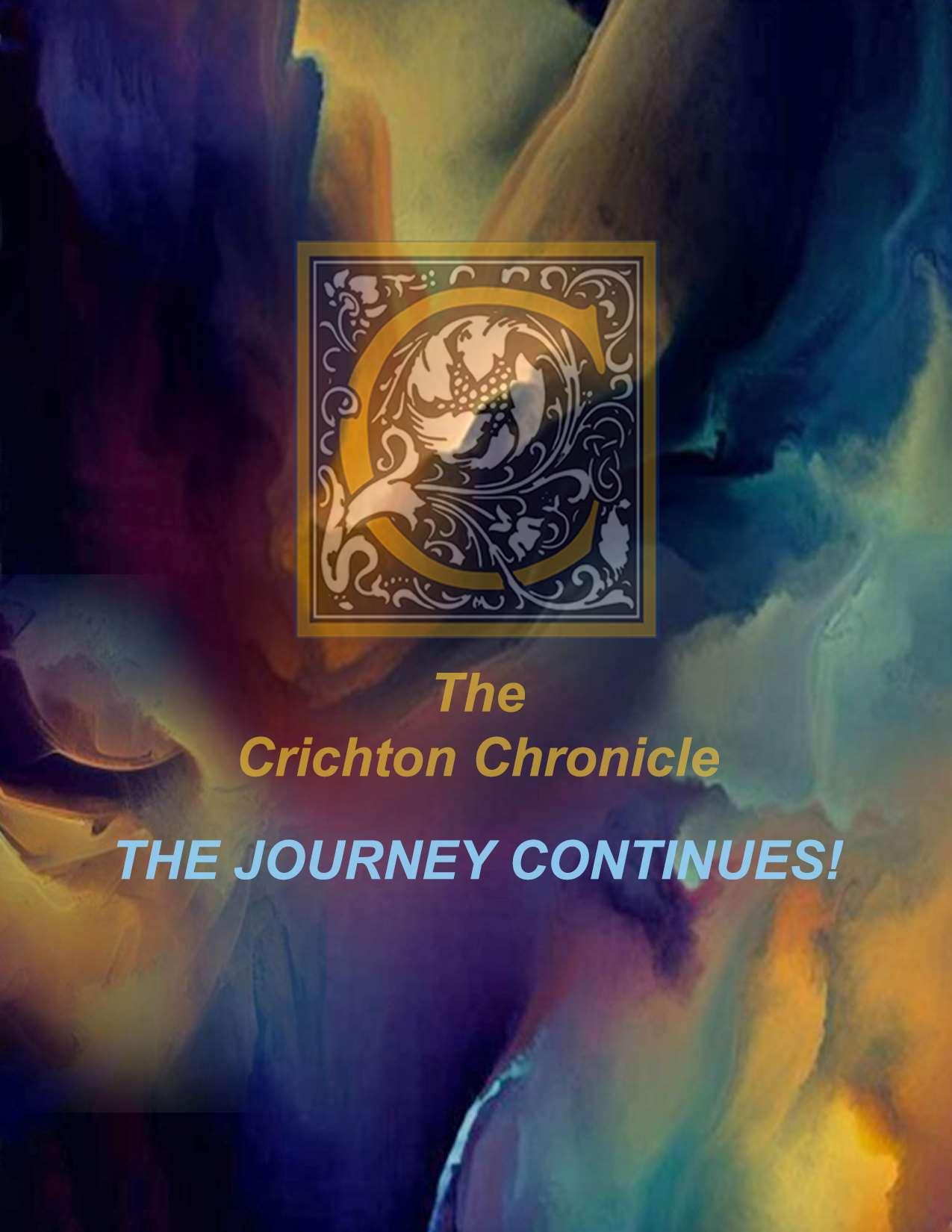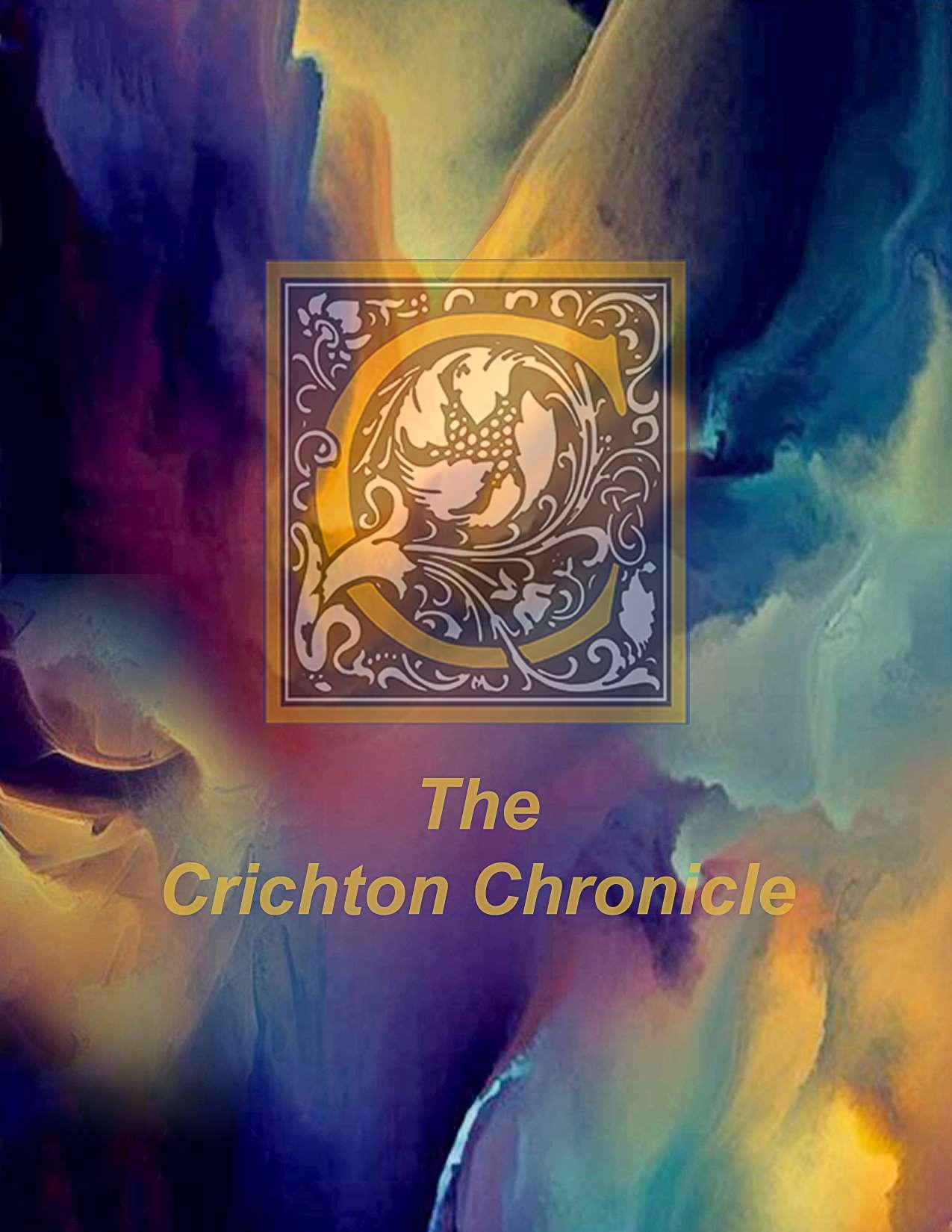

The Crichton Chronicle
The story of the Crichton Club’s Journey from our founding to the present.
The Crichton Chronicle is for private educational purposes only. © 2023 by Crichton Club of Columbus, Ohio
All rights reserved. No part of this publication may be reproduced, stored on a retrieval system, or transmitted in any form, or by any means, electronic, photocopying, mechanical, recording, or otherwise without the prior written permission of the Crichton Club. crichtonclub@gmail.com
Original Accession (Deed of Gift) to Ohio Historical Society, October 28,1975 Delivered by Virginia Ebinger, agent for Crichton Club, 1920-1975 (MSS 487)
February 28, 1995, by Marilyn Scanlan. 1960-1989
February 24, 1998, by Unknown
April 2013, by Gary Ness
December 8, 2023, by Mark Krausz
Dedication
It has been our privilege to be part of this historic project. It would not have been possible had we not been able to stand on the shoulders of those who dutifully collected the speaker signatures over the years and those selfless and devoted leaders and members who created the seminal 90th Anniversary of “Our History” from our founding to 2009-2010. The original autograph book is archived at the Ohio History Connection.
Enjoy the Chronicle as we all proudly fulfill the mission of the Crichton Club into our second century: To invite the world’s leading voices to enlighten and engage curious minds with thought-provoking and relevant topics of the day.
Mark Krausz and Darlene Yeager-Torre Co-Editors
FOREWORD
“History is a jangle of accidents, blunders, surprises and absurdities, and so is our knowledge of it, but if we are to report it at all we must impose some order upon it.”
-Henry Steele Commager, Distinguished Historian Crichton Club Guest Speaker in 1968
In 1922, the Crichton Club began the custom of collecting autographs from our speakers. That custom became a cherished tradition.
As one of many efforts to mark the 90" anniversary celebration in 2009-2010, President Laurie Hill, led an effort to preserve and, using modern technology, capture all the signatures from the original autograph book in a new 90th Anniversary Edition Of the hundreds of speakers, two autographs were missing and two were indecipherable.
That edition included a timeline and biographical notes about each speaker, and a timeline listing of club presidents. The autographs in the original book were not in chronological order. It was possible to see a speaker autograph from 1922 on the same page as one from 1965. Consequently, the Anniversary Edition speaker biographies are presented in the order in which the signatures appear, – not chronologically. Fortunately, the book had a cross-reference section for locating the page number for each speaker’s signature and biographical notes in the book.
Most notably the Anniversary Edition featured a first-ever written history of the club's founding based on many hours of historical research and scholarship. One does not have to be a researcher or historian to appreciate the enormous amount of time, skill, and dedication it took to create this anniversary gift to the club. Those who contributed mightily should be, and are, recognized in the Chronicle just as they were in the Anniversary Edition.
In the interim between the publication of 500 copies of the Anniversary Edition and our centennial in 20192020, it became apparent that we were in danger of losing part of our history as there was no way to update the Anniversary Edition. There were very few copies left and reprints would be extremely expensive and still lack the option to regularly update it. The club continued to collect autographs in the original signature book until the COVID pandemic hit in 2020.
By 2020, with the common use of digital storage, many archival institutions were no longer interested in reams of paper taking up vast amounts of storage space, and our beloved autograph book was increasingly fragile after decades of handling After a century, the pages were beginning to show their age. In 2019, in recognition of the fragility of the autograph book, the board authorized board member, Diane Driessen to oversee an effort to digitize it. That digital version is now available at the Ohioana Library. https://digital-collections.columbuslibrary.org/digital/collection/memory/id/77578
As the club approached its centennial, board members began to conduct further research on our history by visiting historic websites and doing a deep dive into the extensive archives at the Ohio History Connection. That effort revealed an amazing trove of the club's founding documents, newspaper clippings, etc. However, there appeared to be a significant drop-off in archived materials from the period after the publication of the 90th Anniversary book.
In spring 2022, the stars aligned and with the support President Mabel Freeman and a boost from Centennial season President, Jane Forbes, the board gave the go-ahead to create a new method for recording our history which came to be known as The Crichton Chronicle.
ABOUT THE CRICHTON CHRONICLE
The Chronicle is much more than a scrapbook. It is a living, educational document that enables us to get a first-hand look at the issues, concerns, and temperament of many decades of social, economic, scientific. and cultural evolution in the minds of our forebears.
Although there are updates and enhancements in The Chronicle, every effort has been made to incorporate the elements of the original autograph book and the 90th Anniversary Edition to retain their original character. Beginning with the 2009-2010 season, with the increased availability of contemporary photos and materials, a different format is introduced.
The Crichton Chronicle is based on a modern digital publishing platform as a web-based e-book. The platform provides the opportunity to offer enhanced features:
• Easily editable and updatable for future years.
• Low cost - no printing charges.
• Speakers’ signatures, biographical information, and seasons are now in chronological order.
• The club’s story has been enhanced with color, photographs, historical news clippings and other pertinent graphics.
• The e-book platform allows the incorporation of audio and video clips.
• Hyperlinks can be inserted.
• A magnifier widget enables the viewer to get a closeup look at historic documents.
• It has an excellent search mechanism to make The Chronicle a convenient, educational, research, and membership asset.
• Documents can be emailed, printed, shared, and downloaded.
Share the Memories
Members are encouraged to contribute to The Crichton Chronicle. If you take pictures/videos at our events, have an interesting story, or find some old club pictures in the attic, we’d love for you to share them with us. Corrections are welcome.
crichtonclub@gmail.com
1920
John Drinkwater: Abraham Lincoln
Crichton Club Speakers
1920 to Present Day
Stephen Graham: The Genius of the Russian People
Hugh Walpole: Modern English Novelist
Nina Tarasova: Singing of Russian Folk Songs in Costume
1920-21
W. L. George: Love and Marriage
Herbert A. Gibbons: The Challenge to European Eminent Domain
G. K. Chesterton: The Ignorance of the Educated
Mr. and Mrs. Ongawa: Performance of Japanese Songs and Dances
1921-22
William Beebe: Pheasant Hunting in Borneo and India
Isaac Marcosson: The World in Transition
Margot Asquith: Reminiscences of Eminent Englishmen
Bruno Roselli: Dante: A Replica of the Typical Italian
1922-23
Emma C. Ponafidine: My Experiences in Soviet Russia
Basil Thomson: My Experiences at Scotland Yard
Olivia R. Agresti: Recent Developments in European History
Ruano Boglislav: Singing of Gypsy and Hungarian Songs
1923-24
Lord Birkenhead: Reminiscences of an English Statesman
Arthur Weigal: Tutankhamen, Recent Discovery in Egypt
Henry Fairfield Osborn: Social and Racial Progress in America
J. C. Faunthorpe: Jungle Life in India
1924-25
Catherine Karoly: Hungary Yesterday and Today
Performance: Von Flotow's Opera "L'Ombre"
Andre Morize: (Unavailable)
John Cowper Powys: (Unavailable)
1925-26
Alexander Wolcott: Behind the Scenes
Manley O. Hudson: The League of Nations in 1925
Timothy Smiddy: Ideals and Activities of the Irish Free State
Thomas F. Lee: Dons, Dictators and Duenas
1926-27
Richard E. Byrd: First Flight to North Pole
Phillip Guedalla: The Political and Industrial Situation in England
Samuel Arthur King and Readings accompanied by Horace Alwyne on the Piano
Michael I. Pupin: Fifty Years Progress in Electrical Communication
1927-28
Bertrand Russell: European Chaos
William Beebe: Beneath Tropic Seas
Emil Ludwig: Bismarck and the German Republic
Sherwood Picking: Submarines and Their Operation
1928-29
Arthur Compton: What Things are Made Of Angna Enters: Episodes: A Series of Pantomines
Cornelia Otis Skinner: Character Sketches
Thornton Wilder: The Bridge of San Luis Rey
1929-30
Grand Duke Alexander: Out of My Life
Ernest Dimnet: The Art of Thinking
Lowell Thomas: With Lawrence in Arabia and Allenby in Palestine
1930-31
Randolph Churchill: Can Youth Be Conservative?
Richard E. Byrd: The South Pole Expedition
George E. Russell (AE): Some Personalities of Modern Ireland
J. B. Priestley: An Englishman's View of Contemporary American Literature
1931-32
Rafael Sabatini: Fiction in History and History in Fiction
Oliver R. Baldwin: The Future of British Politics
Stuart Chase: The End of an Epoch?
Joseph Wood Krutch: The Modern Theatre
1932-33
Margit Bethlen: History in the Making and Personalities Who Made It
William Butler Yeats: The New Ireland
Victoria Sackville-West: Changes in English Social Life
Auguste Piccard: The World From Ten Miles Up
1933-34
Raymond Ditmars: Strange Animals I Have Known
R. D. Blumenfeld: The Destiny of America and Great Britain
Clemence Dane: Drama in Life and On the Stage
P.F.M. Fellowes: The Conquest of Everest
1934-35
Thomas Craven: Modern Art
Ernest Gruening: Democracy's Challenge to Fascism and Communism
Carl E. Guthe: The Greeks of the New World
Cyril A. Alington: The English Public Schools
1935-36
Asgeir Asgeirson: My Country (Iceland) and Its People
Paul Horgan: The Fault of Angels
Robert M. Hutchins: Education in Time of Crisis
Sarah Wambaugh: Europe, What Now?
1936-37
Andre Geraud: Can European Peace be Saved?
Gordon Enders: The Story of Tibet
Clifton Fadiman: Why Best Sellers Sell
E. M. Delafield: The Provincial Lady in Moscow
1937-38
Mai-Mai Sze: Modern Woman in China
Victor Heiser: More of an American Doctor's Odyssey
John Langdon-Davies: Behind the Spanish Barricades
Sinclair Lewis: It Has Happened Here
1938-39
Paul Van Zeeland: How Can International Disorganization Be Remedied?
Bhicoo Batlivala : Influence of the West on Ancient Indian Culture
John Gunther: Inside Europe Now
Andre Maurois: French Wit, English-American Humor
1939-40
Ernest A. Hooten: An Anthropologist Looks at the Belligerents
Alfred Duff Cooper: The Survival of Liberty
Erwin Edman: Fashions in Ideas
Hugh Gibson: An American Diplomat's Approach to Present European Problems
1940-41
H. R. Knickerbocker: At the Ringside of History
Margaret Webster: Shakespeare without Tears
William L. Shirer: German Today
Robert A. Millikan: Science and War
1941-42
Hugh R. Wilson: America's Role in the World Crisis
J. R. Ybarra: Friends and Foes in Latin America
Hallett Abend: How We Can Beat the Japanese
Margaret Bourke-White: Lenses Behind the News
1942-43
Walter Duranty: When East Meets West in Battle
Francis B. Sayre: The Road Forward
Hermann Rauschning: The Secret Aim of National Socialism
Cornelia Otis Skinner: Character Sketches
1943-44
Otto Tolischus: History in Action
Michael Karpovich: Russia and the Postwar World
Robert St. John: The Balkans, Powder Keg of Europe
Alexander Loudon: Some Postwar Problems
1944-45
Reinhold Niebuhr: The End of an Era
Maria Osmena: The Heart of the Philippines
Frank Lloyd Wright: The Architecture of Democracy
1945-46
R.V.C. Bodley: The Truth About the Arabs
Owen Lattimore: A Practicable Treatment of Japan
John Farrar: The Development of American Writing Between Two Wars
Henry Cabot Lodge, Jr.: The National Outlook
1946-47
Walter Duranty and Debate: Can Russia Be Part of One World?
H.R. Knickerbocker
Sumner Slichter : The Problem of Industrial Relations
Eve Curie: France in the Postwar World
1947-48
Harlow Shapley: The One World of Science
Herbert Agar: England Today
Cord Meyer, Jr.: World Federation or World War III?
1948-49
Norman Cousins: The Siege of Berlin
Robert Magidoff: Report on Russia Today
Finn Ronne: Antarctica Adventure
1949-50
Mark F. Ethridge: The Middle East
Mary Garden: Music - Yesterday and Today
David E. Lilienthal: Atomic Energy for Peace
1950-51
Edith and Osbert Sitwell: Readings from Their Own Poems
Arthur Schlesinger, Jr.: The Crisis of Our Time
James Michener : The Real South Pacific
1951-52
Edward Weeks: In the Editor's Chair
Jan Papanek: United Nations Report
Paul Bigelow Sears: What Kind of a Country Do We Want?
1952-53
Robert Ruark: Life Among the Curious Natives of America
Carlos Romulo: America's Stake in the Far East
Margaret Mead: Anthropology in Action
Lydia Kirk: Life in Russia Today
1953-54
Joyce Cary: A Novel as a Picture of Society
Erwin D. Canham: Business at Bat: In Washington and on Main Street
John C. Caldwell: Our Program Toward Asia
1954-55
Ruth Draper: A Program of Original Sketches
J. W. Fulbright: The United States and World Affairs
Hanson Baldwin: Danger from the East
1955-56
Henry Hull: An Evening with Mark Twain
George E. Mylonas: Mycenae. The Capital City of Agamemnon
Hans Kohn: Is Modern Western Civilization in Decline?
1956-57
Hubert W. Alyea: Atomic Energy - Weapon for Peace
Barbara Ward: The Unity of the Free World
Robert Frost: An Evening with Robert Frost
1957-58
Catherine Drinker Bowen: A Biographer Looks for News
Walter Sullivan: South Pole
Peter Viereck: The Unadjusted Man: A New Hero for Americans
1958-59
John Gielgud: The Ages of Man
K. C. Wu: An Appraisal of Red China
J. B. Glubb : The Middle East: Storm Center of the World
1959-60
Margaret Webster: An Evening with George Bernard Shaw
Madam Pandit: Eastern Ideas and Western Values
Paul Tillich: The Meaning of Health
1960-61
Dorothy Stickney: Portrait of Edna St. Vincent Millay
Anthony Wedgewood Benn: A Britisher Looks at the African Revolution
Arthur Larson: World Rule of Law
1961-62
C. P. Snow and Pamela Hansford Johnson: Personal Views of the Two Cultures
Santha Rama Rau: New Voices of the Far East
Henry Kissinger : Strategy and Foreign Policy
1962-63
Aldous Huxley: Human Potentiality
Dexter Perkins: Reflections on the Foreign Policy of a Democracy
Cilli Wang: The World of Cilli Wang
1963-64
Terence Hanbury White: The Pleasure of Learning
Pierre Mendes-France: A Modern Conception of Democracy
Cleveland Amory: Who Killed Society?
1964-65
William Patterson: A Profile of Holmes
Alfred Kazin: The Fascination of Henry Adams
John Kenneth Galbraith: A Modern Foreign Policy
1965-66
Phillip Burton and Christian Alderson: Pageant of Kings
David Schoenbrun: The Three Lives of Charles DeGaule
Nelson Gleuck: Deities and Dolphins: The Story of the Nabataens
1966-67
William Mauldin: Political Satire and the Cartoonist
E. O. Reischauer: United States, Japan and Asia
Marietta Tree: Internationalism versus Nationalism
1967-68
Emlyn Williams: Dylan Thomas Growing Up
Henry Steele Commager: Was America a Mistake?
Malcolm Muggeridge: English and Americans
1968-69
Morris B. Abrams: The University in the Vortex
Lord Harlech: Great Decisions, 1969
Archibald MacLeish: Readings and Reflections
1969-70
Harrison Salisbury: America, Russia, China. Triple Alliance or Three-way War?
Willie Morris: The National Magazine in American Life Today
John Archibald Wheeler: A Few Glimpses of an Open World
1970-71
Lord Caradon: What Hope for Peace in the Middle East?
Rene Dubos: The Living Past
Pierre Berton: Why Canadians are Different
1971-72
Jon M. Lindbergh: The Oceans: Conservation or Exploration?
Carl M. Loeb, Jr.: Victims of Crime - All Honest Victims
Daniel Patrick Moynihan: The American Presidency
1972-73
Ross Terrill: China Today: A Firsthand Account
Barbara Ward Jackson: Basic Conditions for Tomorrow's World
Richard Wilbur: A Reading of His Poems with Commentary
1973-1974
Thomas Hoving : Present and Future Developments at the Metropolitan Museum of Art
Joseph C. Harsch: State of the Nations
Max Lerner and R. Buckley: Will the American Republic Survive Into the 21st Century?
1974-75
Duncan Williams: Trousered Apes: Sick Literature in a Sick Society
Dixie Lee Ray: U.S. Involvement in Science and Technology
S. Dillon Ripley: Facing Problems of the Environment
1975-76
Winston S. Churchill: The Soviet Threat in the Middle East and Western Europe
John R. Silber: Bicentennial Reflections on the No-Fault Life
Alexander Scourby: An Evening with Alexander Scourby
1976-77
Richard Adams: Education for Literature
Rosamond Bernier: Great Artists in Close-up
Willard R. Johnson: The American Stake in the Achievement of Freedom in Southern Africa
1977-78
Hedrick Smith: The Texture of Russian Life
Helmut Sonnenfelt: An Appraisal of our Foreign Policy
David Atlee Phillips: Secret Intelligence: An American Dilemma
1978-79
John Cairney: The Robert Burns Story
William H. Webster: Tasking the FBI in a Free Society
Elmo R. Zumwalt, Jr.: The World and Regional Tensions
1979-80
Francis Robinson: The Night the Opera Stopped
David Halberstam: The Media-ization of America
Walter Sullivan: Black Holes - The Edge of Space, The End of Time
1980-81
La Condesa de: Romanones y Quintanilla: - American Women in International Politics
Jack Reynolds: Asia Today
Daniel Bell : The U.S. in the 1980's: The Problems Ahead
1981-82
Iris Love: Archaeology Today
Alfred Kahn: Solving the Economic Issues of the Eighties
Joseph Engelberger: Robotics: An Executive Overview
1982-83
John Cairney and Alannah O'Sullivan: "Two for a Theatre"
Robert J. Ryan, Jr.: Caribbean Basin Initiative
Donald C. Johanson: In Search of Man's Origins
1983-84
Jonathan B. Gans: The Middle East
Robert Hughes: The Face of Power: Art, Politics and Propaganda
Mouza Coutelais-du-Roche Zumwalt: China Revisited
1984-85
Strobe Talbott: Nuclear Arms Control: The Current Stalemate and the Prospect for the Future
James Q. Wilson: Private Virtue and the Public Good
James S. Trefil: The Moment of Creation
1985-86
Roger Fisher: Negotiating with the Russians: What would be a Successful Summit?
Peter Eisenman: The State of Architecture
Albert Shanker: The Future of American Education: What Direction Will We Take?
1986-87
Heywood Hale Broun: The Art of Winning
Charles Murray: New Perspectives on Social Policy
Sherman Lee: The Significance of Far Eastern Art
1987-88
Michael Duffy: A Reporter in Washington: Stumbling Through the Mine Field
Lee H. Hamilton: The Iran-Contra Affair as Viewed by the Co-Chairman of the Investigative Committee
Seyned H. Nasr: The Islamic World View: Sunni and Shia
1988-89
Diana Eck: Religion at the Crossroads: The Challenge of Religious Diversity Today
Charles Kaiser: 1968 In America
Paul Goldberger: Buildings Versus Cities: The Struggle for a Sense of Place
1989-90
Howard Nemerov: A Reading of His Poems with Informal Comments
John Brooks Slaughter: Putting Integrity Back into Athletics
S. Frederick Starr: Is the Soviet Union Collapsing? If so, What Then?
1990-91
Lisbeth Schorr: The Anomaly of an American Underclass: What Can Be Done?
John Seigenthaler: Freedom of the Press: A 200-Year-Old Luxury or Liability?
Helen Thomas: Watchdog at the White House: Covering Presidents from Kennedy to Bush
1991-92
Edward L. Warner III: The Disintegration of the Soviet Union: Is the Sum of the Parts Greater than the Whole?
Bernard C. Watson: Changes and Choices: Are We Prepared to Face Reality?
John E. Frohnmeyer: The War on Culture
1992-93
James O. Freedman: Higher Education and the Promise of American Life
Charlotte Ray: An Evening with Charlotte Ray
Jerrold M. Post: The Mind of the Terrorist
1993-94
Paul E. Peterson: Intergenerational Conflict: Should Children have the Right to Vote?
Anna Kisselgoff: The Arts in the 21st Century
Martin Marty: Uncommon Faiths and the Common Good: Religion and American Multiculturalism Today
1994-95
Paul M. Kennedy: Reforming the United Nations: Problems and Opportunities
Patricia Neighmond: Whatever Happened to Health Care Reform? Medicine and Politics in the United States
Robert P. Kirshner: Taking the Measure of the Universe
1995-96
John Galvin: United States Strategy- -Post Cold War
Charles Gwathmey: Architecture: A Process of Discovery
David Warren: Riding the Tiger of Change
1996-97
Mark Tushnet: The First Amendment into the 21st Century
Catherine Stimpson: Who Is Creative Now?
Elizabeth Langland: Jane Austen and the Silver Screen
1997-98
Elliot Engle: The Charles Dickens We Never Knew
Charles Hermann: The Multi-Dimensional Legacy of George Bush: The Good, The Bad, and the Uncertain
Brian Urquhart: The United Nations and International Relations
1998-99
Richard Bangs: 21st Century Exploration: Worldwide Expeditions Using the Internet as Ice Axe and Paddle
Brock Evans: Squandering Our "Real" Wealth
Philip Wilcox, Jr.: Terrorism: Strategic Threat or Psycho Drama
1999-2000
Stephen Jay Gould: Charles Darwin's Revolution in Human Thought
Anthony Lewis: The Press: Friend or Foe
Judah Folkman: The Best Laid Plans of Mice for Men and Women
2000-01
Anne Fadiman: What Kind of Reader Are You?
Jean Kirkpatrick: The Changing World: The New NATO, The Balkans and The Middle East
2001-02
Arthur Golden: The Deception of Fiction: A Novelist's Sleight of Hand
C. J. Peters: Emerging Infections and Society: Push and Pull
General Lewis Mackenzie: Message to America: Stay Off the Front Line of Peacekeeping
2002-03
Carl Djerassi: Sex and Fertilization: Ready for Divorce?
Judy Richardson: Will the Circle Be Unbroken: Lessons from the Civil Rights Movement
James Fallows: Iraq, What's Next?
2003-04
Stephen Pinker: The Blank Slate, The Modern Denial of Human Nature
Henry Petroski: Success and Failure in Engineering Design
William McGlaughlin: A Tale of Two Cities: Music in New York and Paris, 1892-1929.
2004-05
Salman Rushdie: Step Across This Line: An Evening with Salman Rusdie
Henry Greenspan: REMNANTS
Louise Leakey: Passion for Discovery: Continuing the Family Tradition
2005-06
Spencer Wells: The Journey of Man
Siegfried Hecker: The North Korean Nuclear Crisis
Mira Nair: Between Two Worlds
2006-07
Lewis Lapham: The Role of Dissent in Vital Democracies: A Historical Perspective
Colum McCann: The Literary Journey of an International Mongrel
Wade Davis: Life at the Edge of the World
2007-08
Eric Foner: The Story of American Freedom, 1776-2007
Stephen Prothero: Religious Literacy: What Every American Needs to Know...And Doesn't
Michio Kaku: The Physics of the Impossible
2008-09
David Brancaccio: America Now - The Longview on Politics, Culture and Business
Michael Shermer: Why People Believe Weird Things - Science, Pseudoscience and the Paranormal
Charles Wheelan: Economic Priorities of the New Presidency (or What the heck is going on?)
2009-10
Eleanor Clift: Inside Washington: Women in Politics and the Media
Andrea Elliott: Muslims in America
Annie Griffith Belt: A Camera, Two Kids, and a Camel
2010-11
Edward Humes: Eco Barons: The New Heroes of Environmental Activism
Lisa Shannon: A Thousand Sisters
Matt Bai: The Generational Changes in American Politics and Society: Obama and Beyond
2011-12
Susan Stamberg: Why Museums Matter/Why The Arts Are Important
David Eagleman: Incognito: the Secret Lives of the Brain
James M. McPherson: When will this cruel war be over?
2012-13
Laurie Garrett: Betrayal of Trust: Critical Issues in Global Health
Matt Taibbi: Griftopia: Bubble Machines, Vampire Squids, and the Long Con that is Breaking America
Chris Abani: "Stories of Struggles, Stories of Hope: Art, Politics, and Human Rights"
2013-14
Rachel Moore: Why are there no black swans?
John Hall: The Importance of being civil
Nassir Ghaemi MD MPH: Between madness and greatness
2014-15
Benjamin Hufbauer Ph.D. America's Pyramids: Presidential libraries in the 20th and 21st centuries
Bonnie Magness-Gardiner: Missing a masterpiece?
Kenneth Feinberg: Putting a price on life
2015-16
Bob Orr: Evolving threats to America foreign and domestic
Denis Belliveau: On the Trail of Marco Polo
Mary Norris: Between you and me, confessions of a comma queen
2016-17
Kevin Kallaugher: Where to Draw the Line?
Mr. Greg Lukianoff - Campus Censorship: Unlearning Liberty and Freedom
Jill Tarter: The 21st Century: The Century of Biology on Earth and Beyond
2017-18
Greg Harris: Rock and Roll: America's Greatest Revolution
Annette Gordon Reed, Harvard Professor and Pulitzer Prize Winning Author: "Jefferson and the Hemmings."
Daryl Baldwin, Director, The Myaamia Center: "The Miami People and Their Language, Reclaiming an Endangered Treasure."
2018-19
Andrew Zimbalist, Chair, Smith College Economics Department: "The Economics of Collegiate Sports."
Robert Daly, Director, US China Studies, Wilson Institute: "The Future of US China Relations."
Kathy Spahn, CEO, Helen Keller International: "Be Brave: International NGOs and Healthcare."
2019-20
Abby Smith Rumsey, Author, historian, Library of Congress National Digital Information Infrastructure and Preservation Program: "We Are What We Remember: Curating Memory in the Digital Age."
Laurence C. Smith, Climate scientist and Guggenheim Fellow: "The New North: The World We Are Making
Neil Bush, Chairman of Points of Light Foundation, International Businessman, son of the 41st and brother of the 43rd Presidents of the United States. Mr. Bush canceled due to the Coronavirus pandemic.
2020-21
Kathy Sullivan, Scientist, educator, astronaut: "From the Stars to the Sea: An Explorers Life."
Michael Duffy, Journalist, author, opinions editor of the Washington Post: “What the November 3rd Election Means for Our Country.”
Lisa Funderburke Hoffman. National arts leader, Director of the Alliance of Artists Communities: "The Future of the Creative Arts in a Diverse World."
2021-22
Amy Vitale, National Geographic photographer: "Photography of Hope."
Daniel Pink, Best-selling author: "The Science of Regret and What it Teaches Us About the Good Life."
Erica Armstrong Dunbar, Historian, and author: "The Case for Harriet Tubman on the $20 Bill."
2022-23
Dr. Lonnie Thompson, Paleoclimatology and glaciology expert, and Dr. Ellen Mosley-Thompson, Climatologist: “Icy Secrets and Retreating Glaciers: Past, Present and Future Societal Impacts. ”
Robert Wittman, FBI investigative expert in cultural property crimes: “The United States vs Art Thieves – True Tales from the FBI’s Real Indiana Jones. ” Haben Girma, Author and first deafblind person to graduate from Harvard Law School: “A Conversation with Haben Girma: The Deafblind Woman Who Conquered Harvard Law "
2023-24
Anne “Dede” Neal Petri, President/CEO of the Olmsted Network: “The Genius of Place: A look at the legacy of Frederick Law Olmstead ”
Anthony Jack, Assistant Professor of Education at Harvard and Author: “How Do Poor Students Manage at Prestigious Universities?”
Catherine Grace Katz, Historian and author: “The Daughters of Yalta: The Churchills, Roosevelts, and Harrimans – Love and War.”
Crichton Club Presidents
1919-1921 Elizabeth Taylor (Mrs. John Myers)
1921-1924 Laura Gilbert (Mrs. Henry Lathrop)
1924-1925 Grace Arnold (Mrs. Harry B.)
1925-1926 Martha Bell Bush (Mrs. Samuel Prescott)
1926-1929 Grace McClure (Mrs. Charles F. W.)
1929-1933 Helen Rockwood (Mrs. Robert)
1933-1935 Margaret Edmonds (Mrs. Rolland)
1935-1938 Sekush Baldwin (Mrs. Hugh)
1938-1940 Kathryn Wright (Mrs. Francis)
1940-1942 Florence Jeffrey (Mrs. M. D.)
1942-1944 Lelia Fenton (Mrs. Gerald)
1944-1946 Mary Johnson (Mrs. Stanley)
1946-1948 Constance Reel (Mrs. Philip)
1948-1950 Margaret Platt (Mrs. Joseph)
1950-1952 Katherine B. McClure (Mrs. Robert)
1952-1954 Helen Kirk (Mrs. Robert)
1954-1956 Dallas Mathews (Mrs. Robert G.)
1956-1958 Mary Carlile (Mrs. William, Jr.)
1958-1960 Elizabeth R. Williams
1960-1962 Molly Caren (Mrs. John)
1962-1964 Dallas Mathews (Mrs. Robert G.)
1964-1965 Molly Caren (Mrs. John)
1965-1966 Elizabeth R. Williams
1966-1968 Jane Mykrantz (Mrs. Peter)
1968-1970 Gilly Ludden (Mrs. Franklin M.)
1970-1972 Mary Janata (Mrs. Rudolph)
1972-1974 Sally Morris (Mrs. W. Frank)
1974-1976 Virginia Ebinger (Mrs. Robert)
1976-1978 Louise McCulloch (Mrs. Hugh H.)
1978-1980 Molly Morris (Mrs. Frank R.)
1980-1982 Dorothy Sehring (Mrs. Dewey)
1982-1984 Sheila Feinknopf (Mrs. Mark)
1984-1985 Ann Follansbee
1985-1986 Joanne Frantz (Mrs. David)
1986-1988 Anne McNealey Larrison (Mrs. Larry)
1988-1989 Judith Clovis (Mrs. Albert)
1989-1991 Susan Quintenz (Mrs. Kenneth)
1991-1993 Lou Briggs
1993-1995 Marilyn Scanlan (Mrs. James P.)
1995-1997 Muriel Tice (Mrs. Richard)
1997-1999 Jane Werum (Mrs. J. Ralston)
1999-2001 Nina Hoppes (Mrs. Joseph E.)
2001-2002 Ellen Bachmann (Mrs. James)
2002-2004 Trish Tweel (Mrs. Charles)
2004-2006 Louisa Green (Mrs. J. Ronald)
2006-2008 Carole Schuller (Mrs. David)
2008-2010 Laurie Ann Hill (Mrs. Thomas W.)
2010-2012 Melinda Sadar (Mrs. Edward)
2012-2014 Ida Copenhaver
2014-2016 Sheila Cohen
2016-2018 Katharine Moore
2018-2020 Jane Forbes
2020-2022 Mabel Freeman
2022-2024 Marilyn Pritchett
In 1922 a leather-bound autograph book was purchased for dignitaries' signatures and comments. Although John Drinkwater, Hugh Walpole, G. K. Chesterton, and William Beebe were among those who appeared before the Club prior to the purchase of the book, all of their signatures have been secured. Below is a digital scan of the cover of the original Crichton Club autograph book.
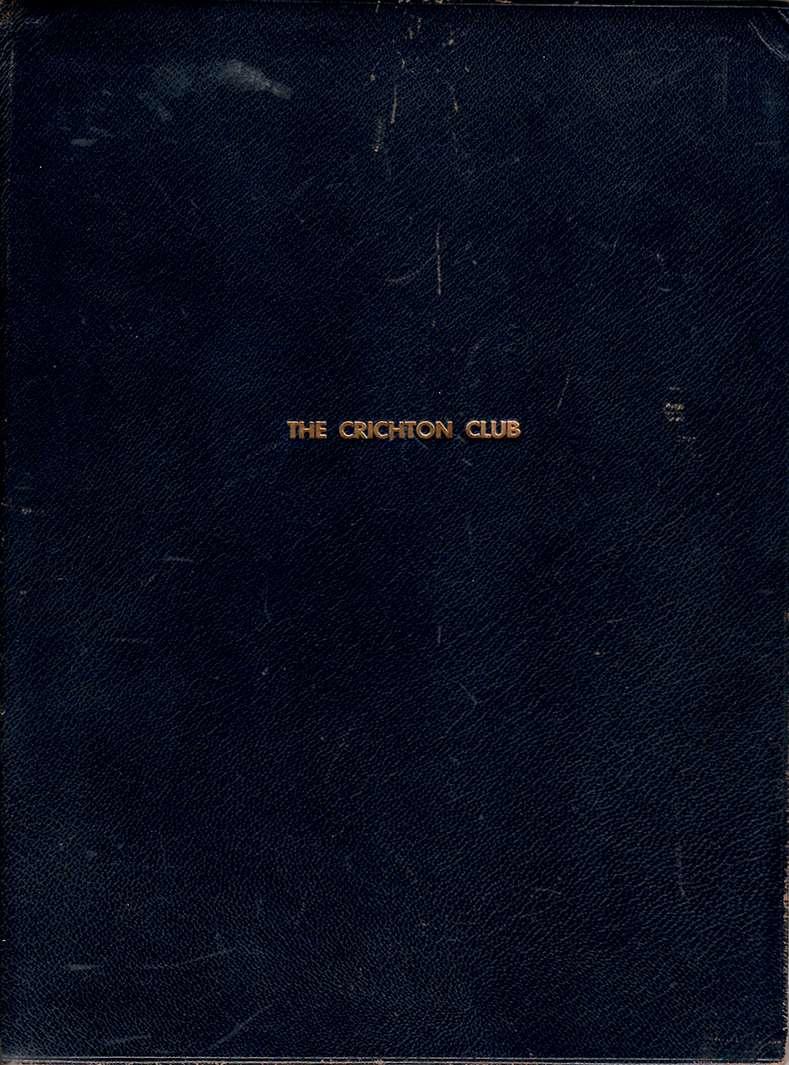
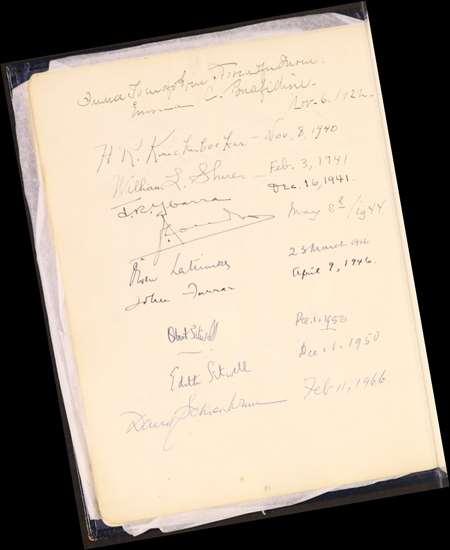
Two pages from the autograph book.
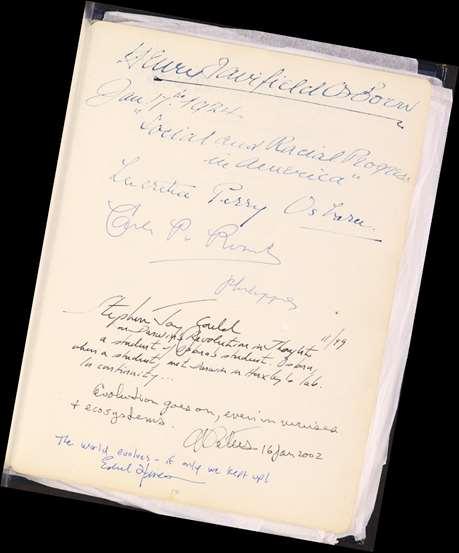

Adopted via mail vote on/about January 5, 1920.
The original document was distributed at the January 12 lecture in the form of a 4.25” X 5.5” pamphlet. The single remaining copy is at the Ohio History Connection in: Crichton Club MSS 487 Box 1 Folder 1
History 1919-2010
by Marilyn Scanlan, President 1993-1995
The History of Crichton Club information was gleaned from club minutes, letters, programs, and newspaper clippings housed in the archives of the Ohio Historical Society to publish a 75th anniversary history in 1994. A second edition was issued in 2010 in celebration of the club’s 90th anniversary. The many members who contributed to these projects did so with the hope that readers will receive information, some pleasure, and perhaps amusement from the collection. The Crichton Club autograph book is digitally archived at the Columbus Metropolitan Library. It contains the comments and signatures of all our distinguished lecturers from our founding in 1920 to 2010. The autograph book is key word searchable.
HOW CRICHTON CLUB GOT ITS NAME
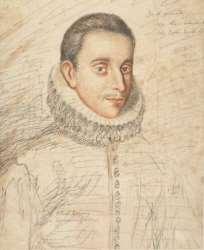
James Crichton
COLUMBUS REACHES OUT
Born in Scotland in 1560, son of Robert, the Lord Advocate of Scotland, and Elizabeth Stewart of the House of Beith, Crichton received a B.A. at age 14 from the University of St. Andrews and an M.A. one year later. He was slain during a street quarrel in Mantua at the age of 22.
Aldus Manutius, the grandson and namesake of the famed Venetian printer (who invented italic type, among other accomplishments), dedicated his 1581 edition of Cicero's Paradoxia to Crichton: "You have attained before your 21st year the knowledge of ten languages, of many dialects, of all sciences; and you have coupled the studies of swordsmanship, of jumping, of riding, and of all gymnastic exercises with such alertness of disposition, such humanity, mildness and easiness of temper that nothing could be more amiable or admirable." Crichton was given the sobriquet, The Admirable Crichton, by the 19th century authors William Thackeray and James Barrie.
Following World War I, there was a great increase in travel to the United States by foreign celebrities, many of them on lecture tours. The Head Mistress of the Columbus School for Girls, Miss Grace Latimer Jones (later to become Mrs. Charles F. W. McClure) was one of the first to realize the benefits and pleasure the Columbus community could reap from hosting these interesting individuals. In May of 1919, Miss Jones attended a meeting of the Present-Day Club, founded in 1895 by fifteen local women to explore the leading questions of the day. She discussed the possible need for a proper forum which would afford Columbusians an opportunity to meet and hear such visitors. The members of the Present-Day Club enthusiastically endorsed this suggestion and voted to pursue the possibilities of such an organization.
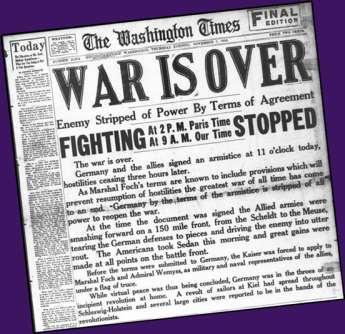
The Present-Day Club called upon the Monday Art Club, a women’s group founded in 1905, and the men’s Literary Review Club, founded in 1897, to appoint three members each to discuss with three members of the Present-Day Club the development of such a forum.
According to the records in the archives of the Ohio Historical Society, the representatives of the three organizations met in November of 1919 and decided to form a lecture club "for the purpose of bringing to Columbus, and entertaining, distinguished men and women, particularly foreigners, whom the people of Columbus would probably not otherwise have the opportunity of seeing and meeting."
The organizers composed a list of possible members and sent out invitations, hoping that possibly 200 people would seek membership. Within a few days 400 people had joined and the decision was made to limit the membership to 500. Due to the demand by relatives and friends, however, the club expanded to 600 and eventually 700, with a waiting list. There was a $1.00 initiation fee and dues were $5.00 a year per person for four meetings with a lecture, reception, supper, and dancing to a live orchestra.

Mrs. John Myers Taylor (daughter of Governor James Campbell) was elected the first president of the Board, Miss Grace Latimer Jones secretary, and Mr. Walter H. Martin treasurer. The organization was to be a lecture club but "the content of the lecture was not to be as important as the personality of the lecturer." The lecture was to be the excuse for a pleasant social gathering of friends and colleagues for an evening of conversation, supper, and dancing. The distinguished guest did not have to make a presentation if he did not wish, but only one guest has refused to perform (Angna Enters in 1928 over a dispute regarding advance payment). The format agreed upon was to hold four meetings a year beginning with January and ending in June. The meetings were to be held at the Deshler Hotel with a sit-down dinner and dancing following the lecture.
The name for the club was suggested by Mrs. Henry L. Gilbert, who thought the life of the Scotsman Crichton reflected the goals of this fledgling organization. The new members were informed by mail of the name that had been selected as well as the following explanation: "James Crichton, styled the Admirable Crichton, was a scholar and adventurer celebrated for his extraordinary accomplishments and attainments in the languages, arts and sciences."
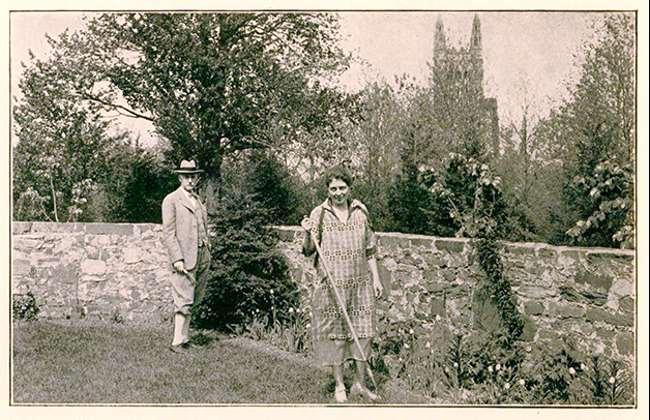

Grace Latimer Jones McClure with her husband in their garden at Princeton, ca. 1924.
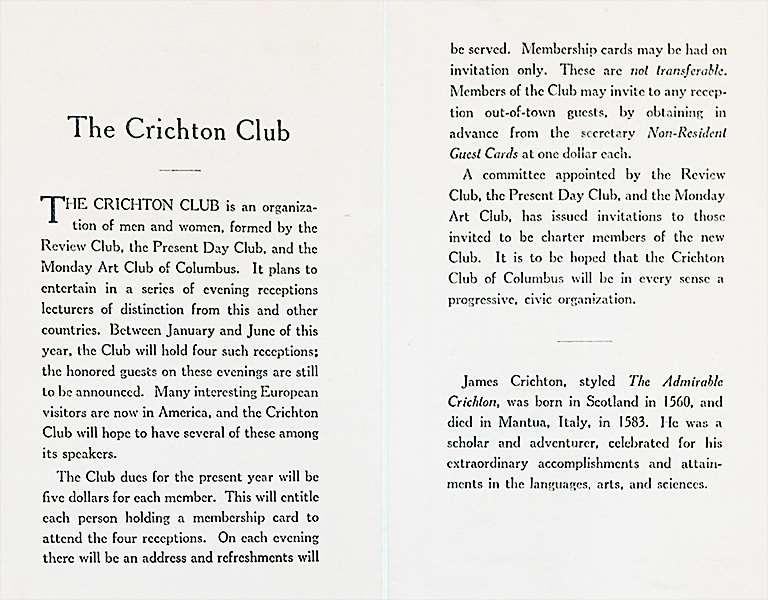
The original Crichton Club brochure was a pocket-sized edition.
Right: List of members of the Review Club, Present Day Club, and Monday Art Club.

Lower Left: An original, blank invitation to membership in the Crichton Club of Columbus.
Lower Right: An original, blank application for membership to the newly formed Crichton Club.


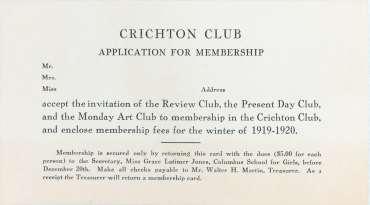
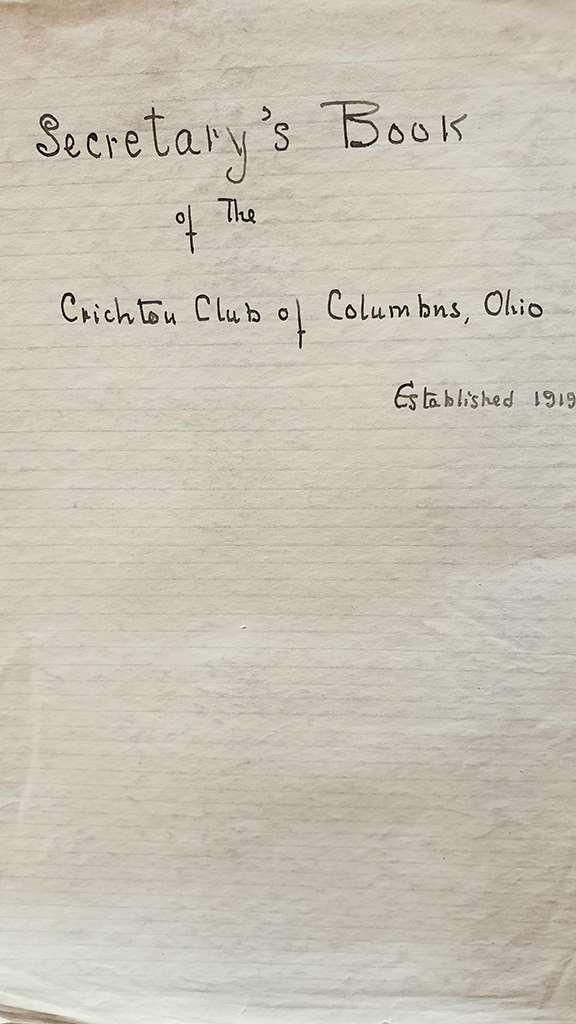
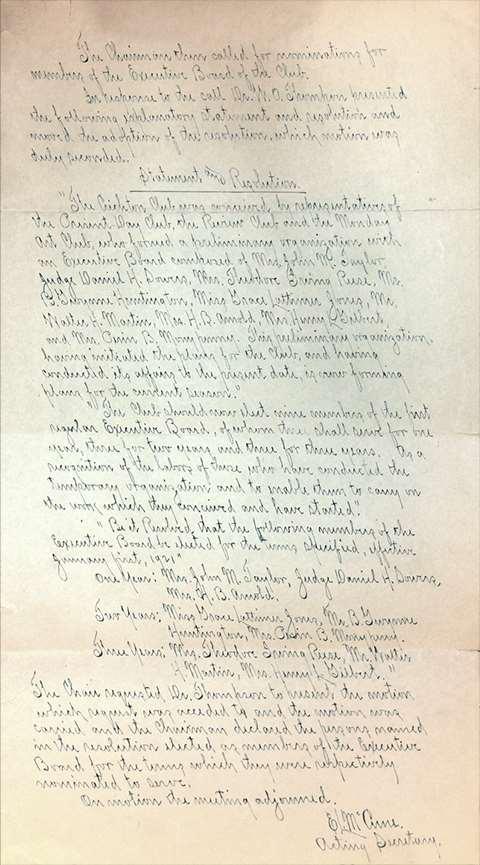
Minutes of the election of the first executive board.
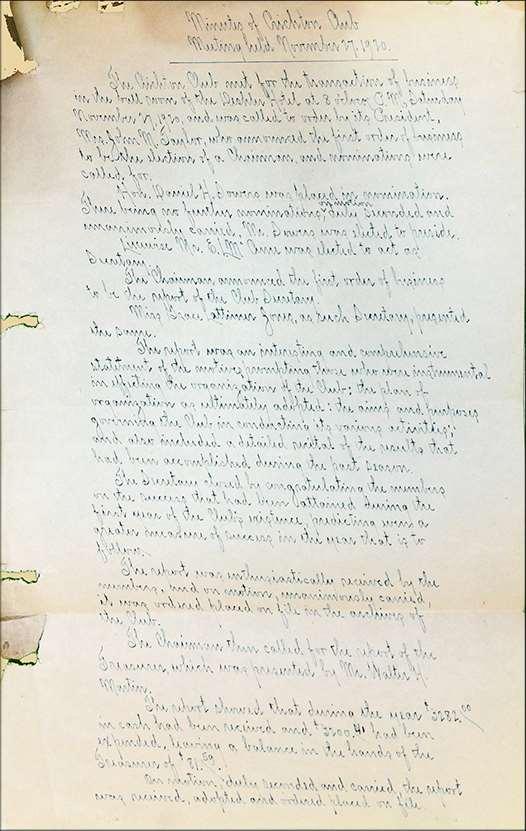
Minutes from the first meeting, November 27, 1920
Crichton Club was formally launched on January 12,1920 with the British author, John Drinkwater, founder of the Birmingham Repertory Theatre, and chronicler of plays, who presented "Abraham Lincoln." Two speakers – Stephen Graham and Hugh Walpole – and a Russian folk singer Nina Tarasova – rounded out the year. The distinguished guests were introduced by the Honorable Daniel H. Sowers and not by the newly elected president, Mrs. Taylor. At this time, and for several years following, a prominent male member of the Board introduced the speakers; the Club's female president presided at the Board meetings.
The organizers were well pleased with the results of their planning and decided to go forward with arrangements for a second year. A constitution was drawn up and sent to the members with a list of the Charter Members. A call for membership renewals went out; the returns were overwhelming and included numerous suggestions of others who would be glad to join. Membership cards were made strictly nontransferable "to preserve the social character of the Club." Members were able to purchase tickets for out-of-town guests twice a year. It was estimated that between three-quarters and four-fifths of the members attended each event.
During the second year, the Board appointed a paid secretary-treasurer "since their work had become so onerous," whose salary would not exceed $150.00 a year. Later, in the mid-1980's, it was decided to divide the position between two people and to discontinue the salary, which by then was $300 a year. Today, Board membership remains strictly voluntary.
In 1922 a leather-bound autograph book was purchased for dignitaries' signatures and comments. Although John Drinkwater, Hugh Walpole, G. K. Chesterton, and William Beebe were


Treasurer’s report for the first year.
John Drinkwater, the first speaker.
among those who appeared before the Club prior to the purchase of the book, all of their signatures have been secured. The Club is probably indebted to a traveling Board member or past president for these signatures! All the past presidents have felt a keen sense of responsibility for the care of this very special book, now in a special archival box, and always make sure their speakers "sign in" before leaving town.
After two successful years, the Board decided to ask the membership for an increase in dues of $1.00 per year for a "sinking fund." The membership turned down the proposal.
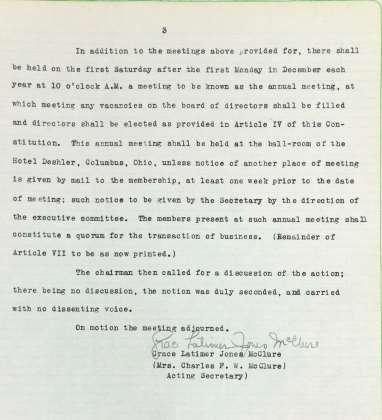
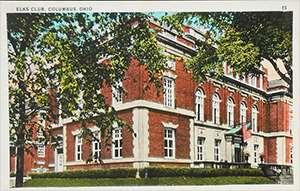
Left: Annual meeting established.
Below: The first meeting was held in the ballroom of the Elks Club on East Broad Street.
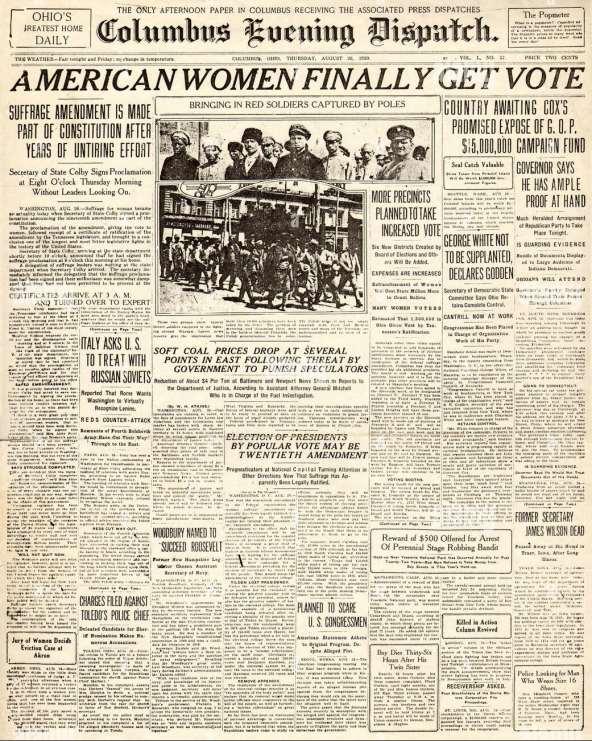
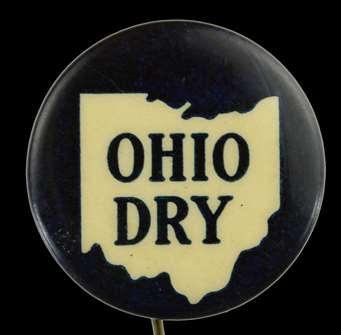
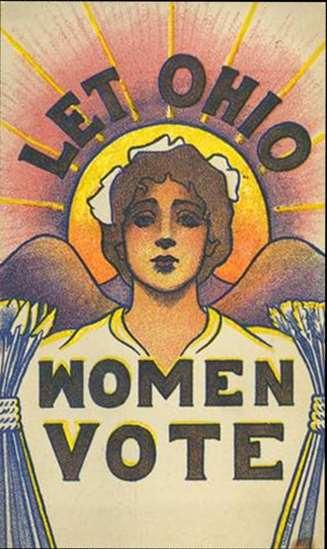
The Crichton Club began during one of the most significant periods in American history. The founding of what is now Planned Parenthood by Margaret Sanger, the passage of the Nineteenth Amendment giving women the right to vote, and the start of Prohibition, all occurred in 1920.
RIDING OUT THE STORMS
The minutes of 1932 proudly announce that "the Crichton Club continues to show its ability to ride out the present storm." The Board was hesitant to raise dues at that time in light of the economic situation, and instead reduced the number of programs from four to three, with dancing after only two. The minutes continue with the good news that "the Deshler was persuaded to enter into a somewhat more favorable contract. This contract provided that one dollar per plate would be charged only for suppers actually served plus $50.00 for the use of the ballroom."
In 1940 the constitution was revised to allow for an increase of dues to no more than $7.00 a year. The membership agreed to a $1.00 increase in l940, and in 1951 the $7.00 limit was reached. Needless-to-say, the constitution has been revised over the years and the dues are $175.00 a year per person in 2023.
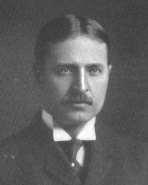

During World War II there was a dearth of speakers and unpredictable revenue, which led the Board to consider whether the Club should disband or suspend meetings for the time being. The president, Mrs. Stanley Johnson, asked for the opinion of Board members. Mr. Samuel Prescott Bush (grandfather of President George H. W. Bush) stated that "the Crichton Club is unique in character and an outstanding organization in the city, and although I recognize the serious handicaps of trying to maintain the quality of past meetings, I should hate to see the Club suspend for even a brief space of time." His feeling was shared by others and the Club decided to weather the storm. Until the end of the war, supper was served only after the final meeting of the year. During these lean years, the question of doing without the meal became a topic for discussion but was quickly dismissed due to the consensus that it would be a mistake to dispense with such an important part of the program.
A one-year leave of absence had been inaugurated four years after the founding, but it really came into play during the war when gas was rationed and members outside Franklin County found it difficult to attend. Any members either in the armed forces or performing government service were given unlimited leaves of absence, and refunds if they had paid their dues. Included in the program announcements beginning in the fall of 1942 was this notice: "The Crichton Club will welcome as guests of members all men who serve in the armed forces." Presumably they would have also welcomed all women who served in the armed forces.
At the end of the war in 1945, the three meetings a year continued with the possibility of having a fourth. Dancing and supper were reinstituted. Servicemen were returning and the membership rolls grew to over 600. The decision was made not to accept any new members. Gradually membership began to decline, and the Board made no effort to increase it but preferred to see it settle into the original plan of 500 members. Membership was always constrained in part by the size of the meeting place. In the early years, just as today, there were concerns for keeping a balance in membership: young, middle-aged, and old; men and women; town and gown. The secretary in 1923 summed it all up this way: "Upon consideration the members must agree that the election of new members is a perplexing and sometimes a harassing matter."
As tastes, prices, and social customs changed, the sit-down dinners and buffets with lobster Newburg at one end of the table and chicken à la king at the other were abandoned, as eventually were the dances. Dancing with a full orchestra had become a tradition and was popular with some members, but others felt it did not fit the "tone" of the evening. Piano music replaced the orchestra in 1960, and the following year an area of the corridor was set aside for those who still yearned to dance. Dancing gradually faded away.
Samuel Prescott Bush
In 1952, the Crichton Club made its first break with the Deshler by holding two of its three meetings at the Athletic Club. This was to be the last year for the Deshler because of scheduling problems. To the disappointment of many and the distress of others, Crichton Club began its move east down Broad Street, first to the Seneca Hotel and eventually on to the Columbus Gallery of Fine Arts (now the Columbus Museum of Art). At about this same time,1957, a dinner in honor of the speaker with members of the Board, their spouses, and a few guests was introduced. Originally the dinners were held at private clubs but later the entire evening dinner, lecture, and reception was held at the Museum.
The secretary's minutes of 1923-24 indicate that many of the plusses and some of the minuses still exist 80 years later. The following colorful account of the Club's first five years is worth repeating: "So far as the Secretary knows, there has never been any personal unpleasantness among the members regarding any Club matter that has arisen during the five years. The Directors have often felt very proud and happy in the appreciation that has come from various members, who state that the membership gets a very large return for its dues.... With this opinion the members of the Board of Directors themselves concur.
There have been times, however, when life has not been made so happy for the members of the Executive Board. They have sometimes received resignations from those who have been grieved and incensed at the poor quality of the lectures...... Some have felt that the lectures were very dull, and that there should be more entertainments of an amusing nature. Others have protested against the musical programs saying that the musical organizations of the city gave them all the music they cared to hear… Some have felt it very foolish to wear evening dress at the meetings and have reported that some members who wished to wear hats had been wear evening dress has come to them only since the Crichton Club was organized.
To all these criticisms, favorable and unfavorable, the members of the Board have listened; but since the membership of the Club has not fallen off, and since the waiting list never grows less, they conclude that the amount of satisfaction felt by the members is, on the whole, greater than the amount of dissatisfaction they experience in the meetings. They are even inclined to believe that the pleasure some of the members get out of what is impolitely called 'kicking' is worth to them the price of admission."
Dedicated Board members and officers kept the Club afloat through the Great Depression and World War II, managing with very little change to keep its major purpose, "To bring together four evenings in the year when men and women of all ages and many interests, who could share in the pleasure of seeing a man or woman of accomplishment and distinction."
Crichton Club, in many ways, is a family affair. President Ann Follansbee Wright (1984-85) remembers her parents, Austin and Elizabeth McElroy, dressed in evening clothes, going off to the Deshler Wallick to hear famous people lecture and then enjoy a buffet supper and dancing. Although the buffet supper and dancing are long since gone, the evening is still black tie optional, famous people continue to mount the dais, and by tradition, the president is still a woman.
RECORDS AND RECOLLECTIONS
Recollections of past presidents and club archival records, preserved at the Ohio Historical Society, provide a rich review of some of the personalities the Club has been privileged to host over the years. In retrospect, each president is certain her speakers were the best, but the following highlights from the past 93 years prove that not only were there many pleasant and amusing moments, but there was a smattering of aggravations and frustrations mixed in.
Since the beginning of the Club, the dress of both speakers and members has been a topic for discussion. The tradition of black tie for members has been reviewed by the Board and secret ballots have even been taken at Board meetings to see if it should be discontinued. The Board has always voted to continue. A few years ago, when a new member inquired of her sponsor if it would be acceptable to wear a tuxedo pant suit, she was advised against it. That evening, the archeologist, Iris Love, was the speaker and she appeared in gold lamé knickers.
Terence Hanbury White spoke to the Club in 1963 and recalled his visit in his book, America at Last: "We dressed for dinner, I am glad to say, and everything was civilized and pleasant and as warmhearted as ever. The critical standard of the club was higher than what I usually have to face." White loved being in James Thurber's hometown and couldn't believe that the dam really broke (referring to My Life and Hard Times where Thurber wrote “…that frightful and perilous afternoon in 1913 when the dam broke…). Few will forget the handsome appearance of the tall, elegant White in a full-length cape. Twenty years later White's sartorial splendor was equaled by the Scottish kilt of James Trefil.
The Club also had its share of nonconformists. Emil Ludwig surprised the press at his news conference when he appeared barefoot and in pajamas. Arthur Schlesinger, Jr. (as remembered by former President Katie McClure (1950-1952) "chose to go out on the town with a local cousin, arriving late at the Board dinner when he did breeze in, he sidled into his seat in his trench coat – no tuxedo beneath – and instead of getting into stride with the meal, ordered a Scotch and water." President Louise McCulloch (1976-1978) also remembers picking up one of her speakers whose tan trousers were visible under his raincoat. He never commented on his attire nor was he asked about it. One of the staider board members wanted to know if he had been told it was black tie - he had.
All the finery could at times be the cause of disappointment. Mrs. Herman Hoster always regretted missing a chance to dance with J. B. Priestly at the spring 1931 meeting because she feared someone might step on the long chiffon train of the black beaded gown she had recently purchased in Paris at Lanvin.
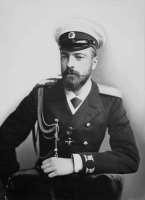
Grand Duke Alexander of Russia set an alltime attendance record.

The membership always seemed to be interested in speakers from abroad, especially those with titles. When such an eminence was announced, a great rush for guest tickets and renewing of memberships ensued. The Grand Duke Alexander of Russia drew an audience of 520, which set an all-time record in 1929. The enthusiasm for the booking of Lord Harlech 40 years later led the Board to defy the fire laws and stack folding chairs outside the doors of the auditorium. Much to the relief of the president, Gilly Ludden, they were not needed.
The second appearance before the Crichton Club in l930 of the renowned Admiral Richard Byrd is well documented by the secretary's report: "Admiral Byrd's lecture provided an opportunity for the Club to do a generous and publicspirited thing for Columbus, which involved a departure from our customary procedure. Because it was felt that the experience of hearing Admiral Byrd should be shared with a larger group, the meeting was held in Memorial Hall. Each member was given one guest ticket. The remaining seats were sold for the nominal sum of one dollar in order to encourage the natural interest of young people in the Byrd expedition. Every seat in Memorial Hall was sold and we were able to sell, in addition, about fifty standing-room tickets." Byrd's manager was annoyed that only one dollar was charged for what he considered a three-dollar event!
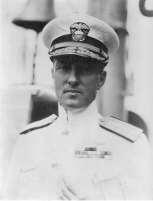
Admiral Richard Byrd spoke two different times.

Professor Auguste Piccard's visit came at the time of the bank holidays in 1933 and it was felt "it would be in better taste to have only a lecture without refreshments." The meeting was held in Mees Hall, and each member was allowed to bring a guest. Professor Piccard had two requests: no one was to smoke, and his identical twin brother was to share the stage with him. After the lecture, no one was certain as to which Piccard they had heard.
Kathryn Wright wrote in her minutes of 1928 that it was "a year of considerable trials and perplexities for the directors of the Crichton Club." Ray Chapman Andrews and Angna Enters were two of her "trials" that year. Andrews broke his contract at the last moment but luckily could be replaced by Cornelia Otis Skinner. The dancer and pantomimist, Angna Enters, refused to perform without being paid in advance; she spent the evening in her dressing room, while the members enjoyed an evening of dancing.
The pantomimist Cilli Wang forwarded a long list of properties that needed to be constructed for her performance. The Board worked diligently to get everything ready for her, only to have her decide on arrival that she would build her own. The exhausted Board forgave all as they watched her transform herself into a flower on stage.
In 1950, President Katie McClure had her "trial" with the visit of the Sitwells. The Sitwells had been met at Union Station by Joe Platt (husband of Margaret Platt, president 1948-50) and taken to their rooms at the Deshler-Wallick Hotel. It had been established in advance that they did not want to be guests at our traditional dinner, but Joe had presumably explained that the lecture would take place at 8:30 in the Deshler ballroom. They didn't appear, and frantic calls to their room went unanswered. A search of the busy Deshler lobby by an energetic Board member disclosed our guests sitting in regal, but lonely, splendor on two decorative lobby chairs – Dame Edith in a theatrically medieval costume. Thus, the reading of the Sitwell poetry – heavy going at best and in an uncompromising British accent – began about a half-hour late. Unfortunately, Dame Edith and Sir Osbert had decreed that their reading would be interrupted by a ten-minute intermission, and this arrangement proved disastrous. Many of the audience took the welcome opportunity to go home, and Board members had a difficult time cajoling others back to the ballroom for the remainder of the ponderous program."
There have been several temporarily missing speakers besides the Sitwells during these eight decades. Molly Caren Fisher who served three terms as president recalls the missing Henry Kissinger: "My husband, John Caren, and I went to the Deshler Hotel, wearing full evening dress at 5:30 p.m. to escort Dr. Kissinger to the Columbus Club for dinner. Mr. Caren double parked at Broad and High Streets while I went in to locate Dr. Kissinger. Nowhere was he to be found. After about 20 minutes he appeared, having been stuck in an elevator that was stalled between floors."
Alfred Kazin and his problems of getting to Columbus are also recalled by Mrs. Fisher: "About 2:00 p.m. of the day of his lecture, he called from La Guardia where he was already on a plane that had engine trouble. He said he would be late. At intervals he called all afternoon, finally running out of quarters, and asked if he might reverse the charges. I gladly accepted the charges. His last call came during dinner at the Club, saying his plane should take off after a while. We had dinner, and then drove to the art museum – without a speaker. Everyone assembled in the auditorium, and I learned that the plane was due at Port Columbus in half an hour. So, Bill Young, then Director of the Museum, turned on all the lights in the upper galleries, and invited us to go up and view a new exhibition which had just been hung. In due course this very tired speaker wearing a rumpled pink shirt appeared, and greeted me with open arms, because by now we were old friends. He made a superb speech, which brought down the house, and was well worth the wait."
The President of Oberlin College, S. Frederick Starr, had no trouble getting to Columbus, but his luggage did. The dinner guests were very surprised to see him in a ski sweater. His suitcase was delivered in time for him to change for the lecture.
Molly Morris also recalls the very late arrival of Admiral Elmo Zumwalt and his wife. She persuaded a reluctant but gracious professor from Ohio State University to serve as a last-minute substitute, but just as the program was about to begin, the Admiral entered the auditorium. After his talk the Admiral was surprised and pleased to discover his first questioner to be a fellow admiral and good friend. A long and pleasant reunion followed at the Morris home that evening.
Cartoonist Bill Mauldin arrived late and had to borrow both tie and suspenders before going on to enrapture the audience with his quick sketches of world leaders and his famous wartime duo, Willie and Joe. Although Sinclair Lewis and Frank Lloyd Wright were not really "trials," they did seem to enjoy tweaking their audience with insults. Lewis proclaimed the audience to be a bunch of "stuffed shirts" and then charmed a group of male members into late-night drinks at one of the favorite masculine retreats in town. Wright could not keep from making disparaging remarks about Columbus architecture and annoyed people with the flippancy with which he answered young listeners' serious questions.
And then there were those who could do no wrong. The members were enthralled with John Gielgud's "Evening of Shakespeare," Margaret Webster's excerpts from Shaw, and the gracious Madam Pandit who sent back saris for Miss Williams and Mrs. Wright. Everyone expected a very outspoken Margaret Mead but, in fact, she endeared herself to both men and women unlike another speaker, a nutritionist who believed that everyone should eat grass.
Strobe Talbott's 1984 visit could not have been better timed his book Deadly Gambits had just been featured in the New York Times Book Review section and had won the Times annual best book award. President Ann Follansbee Wright carried the book to the airport as identification. Talbott had not seen the review and did not know about the prize. Ann had great fun introducing him that evening and announcing his great honor.
The winter of the 75th anniversary year was one of the most severe in Ohio history. The city was encased in ice on February 8,1994 and Mayor Greg Lashutka urged residents to stay home. Almost 100 Crichton Club members disobeyed the mayor and ventured out to hear Anna Kisselgoff, dance critic for the New York Times, deliver a lecture on "The Arts in the 21st Century."
From the mid-90s, the themes closing out the 20th Century were dominated by social and political issues, with a few topics on the arts and sciences woven in. Three speakers referred to the 21st Century in the titles of their lectures, and comparatively new terms such as internet, multi-culturalism, multi-dimensional, terrorism, and psychodrama were introduced into the Crichton Club lexicon. The Club's continuing vitality was fittingly shown when the last lecture of the millennium, Stephen Jay Gould's talk on Charles Darwin, drew the largest crowd of recent years.
Gould’s purpose was to provide a well-known intellectual speaker to rekindle interest and excitement in Crichton Club. The lecture of Dr. Judah Folkman, a Columbus-grown medical hero, brought a standing room only crowd for his lecture.
The goal of the new millennium was to expand and retain membership to somewhere between 300 and 400 members. New, larger venues instead of the Art Museum were explored – the Fawcett Center, the First Congregational Church, and Mees Auditorium at Capital University. Beverly Sills, the Metropolitan Opera singer, was scheduled for Mees for the 2001-02 season. She unexpectedly cancelled and the Board tried to call everyone who had responded. Only two people showed up! Sills was then rescheduled for Spring, and she cancelled AGAIN two days before her lecture.
Early in the new century, the Board made a momentous decision and voted to make black tie “optional” for the men. For several years, pre-lecture dinners were held in a large room upstairs at Lindey’s in German Village. The Board realized that having the dinners at the Art Museum was infinitely easier for all concerned and the Museum especially appreciated our patronage. A website promoting the Club, its history and program was established at www.crichtonclub.org. As the Club’s membership grew because of good programming, the mailing expenses became prohibitive given our budget constraints. The Board decided to explore email invitations, and a majority of the members were able to accommodate this change. Even the lecture responses became electronic.
One of the most controversial lecturers of the new millennium was Salman Rushdie who spoke the day after the presidential election in 2004. He began his talk by stating that the election had been a black day for the United States, which promptly alienated half the audience. That unfortunate opening sentence overshadowed an otherwise interesting and reasoned commentary on world affairs, including an analysis of the Muslim world. For many weeks members voiced opinions pro and con. At a Board meeting nearly a year later, Rushdie’s lecture came up again, and the Board realized that they had fulfilled the goal of Crichton Club – raising issues, discussing differences, and expanding our interests while we learn about the world from challenging speakers. One of the strongest assets of Crichton Club is the diversity of background and opinion of our members that can lead to vibrant, impassioned conversations and, sometimes disagreement.
During the Art Museum’s renovation in 2009-2010, Crichton Club's venue moved to the Renaissance Hotel. Taking advantage of the ballroom space, the Board planned a 90th year Gala for the last lecture of the year. Historical exhibits and books written by lecturers were featured. All past presidents who were able to attend were honored for their leadership. The highlight of the event was the publication of the 90th Year History and Autograph Book of Crichton Club. Each couple or member was given one.
The Columbus Dispatch wrote a feature article about the Club’s 90th anniversary, including information from an article printed 50 years ago in the Dispatch about celebrating the 50th anniversary event. At the gala retiring President Laurie Hill announced the creation of a fund called the Supplemental Speakers Fund which the Board established with a $600 seed donation from the directors. This Fund will be used to provide additional monetary support for outstanding speakers through the years. As speaker prices continue to escalate, the Board realizes it will need to subsidize expenses to maintain the quality of the programming yet keep annual dues low. Members can donate to this new Supplemental Speakers Fund when they pay their annual dues, in memoriam tributes, or even in their wills.
In 1920, women were finally given the right to vote, the American Professional Football League was formed, and Crichton Club membership renewals were sent through the mail. But just because the organization is 97 years old, our systems don’t have to be! As Crichton Club begins its 97th membership year, our members spend more time online than at the kitchen table reading mail, and we felt certain that information that is up-todate and easy to respond to would be much appreciated.
Like so many of our leaders and members, Professor Jones-McClure was heavily involved in education and the general improvement of the community, particularly children and those less fortunate. She was also an accomplished writer and playwright.
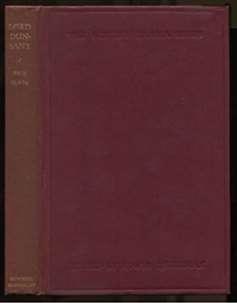

DUNSANY, Lord. (Grace Latimer Jones)

Five Plays: The Gods of the Mountain. The Golden Doom. King Argimenes and The Unknown Warrior. The Glittering Gate. The Lost Silk Hat. Price: $200.00 Rare Books Hardcover. First American edition. 12mo. 116pp. Maroon cloth. Spine is lightly rubbed, else a near fine copy. Playwright Grace Latimer Jones'' copy, with her contemporary ink signature on front flyleaf. Interleaved throughout the book, neatly tipped into the book, are twelve pages of stage directions including a few pencil sketches of stage layouts, in pencil by Jones, and with her extensive annotations throughout the text. She was the headmaster of the Columbus School for Girls in Columbus, Ohio. Founded in 1898, it was considered 'one of the most vigorous and progressive in the Midwest. https://archive.org/details/whatmakeschristm00jone/mode/2up
A Remarkable Roster of Guest Speakers
John Drinkwater: Abraham Lincoln
1920-1921
Stephen Graham: The Genius of the Russian People
Hugh Walpole: Modern English Novelist
Nina Tarasova: Singing of Russian Folk Songs in Costume
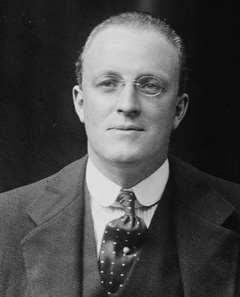

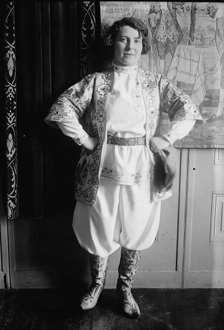
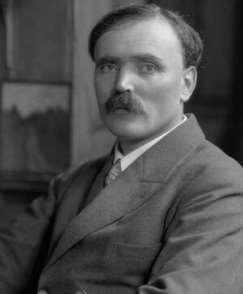

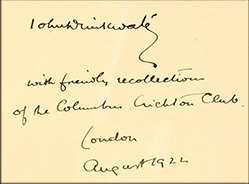
Nina Tarasova
Stephen Graham
1920-1921
JOHN DRINKWATER (1882-1937) – 1920 speaker: “Abraham Lincoln.” Born in London, Drinkwater worked as an insurance clerk during his early years. Just prior to WW l, he was associated with the Dymock group of poets, including Rupert Brooke. His success as an English poet and playwright began with the publication of an historical, Abraham Lincoln, in 1918. Considered a man of letters of the Georgian era, he published volumes of poetry and critical studies and additional historical plays such as Mary Stuart and Oliver Cromwell. He later promoted and managed the Birmingham Repertory Theater, one of the most influential companies in the history of the English stage.
STEPHEN GRAHAM (1884-1975) - 1920 speaker: “The Genius of the Russian People.” A Freelance English journalist, Graham was in Russia at the start of World War I. His articles about the war appeared in The London Times and in his books, Russia and the World (1915) and Through Russian Central Asia (1916). Upon returning to England he joined the Scots Guards and arrived on the Western Front in April 1918. He wrote of his war experiences in A Private in the Guards (1919). In The Challenge of the Dead (1921) Graham recorded his observations upon later revisiting those battlefields. Other books by Graham include Tramping with a Poet (1922) and an autobiography, Part of the Wonderful Scene (1964).
SIR HUGH SEYMOUR WALPOLE (1884-1941)- 1920 speaker: “Modern English Novelist.” Walpol was a prolific English novelist, critic, film writer and playwright who was educated at Cambridge University, where he began writing as an undergraduate. His first success came in 1913 with the publication of Fortitude As a best-selling author of the 1920’s and 1930’s, he enjoyed great success on numerous lecture tours in Britain and the U.S. He is best known for a series of novels covering two hundred years of English social history; Rogue Merries, Judith Paris, The Fortress, and Vanessa. King George VI knighted Walpole at his coronation in 1936.
NINA TARASOVA (1894-1967) - 1920 performance: “Singing of Russian Folk Songs in Costume.” The Russian-born chanteuse’s repertoire included the peasant songs she had heard as a chid on her grandmother’s estate in Crimea. Tarasova’ss versatile voice had a smooth cello-like quality that accounted for her becoming a concert celebrity in St. Petersburg. Her career in the United States included numerous performances in Carnegie Hall. She married socialite sportsman Stuart Fitzhugh Voss of Long Island whom she had met during is service at the American Embassy in Russia. The marriage ended in divorce. Tarasova eventually made her home in New York City. She co-authored two books dealing with Russian culture: Nicholas and Alexandra, The Last Tsar and Tsarina and The Hermitage.

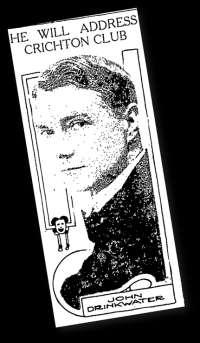
1920-1921
W. L. George: Love and Marriage
Herbert A. Gibbons: The Challenge to European Eminent Domain
G. K. Chesterton: The Ignorance of the Educated
Mr. and Mrs. Ongawa: Performance of Japanese Songs and Dances
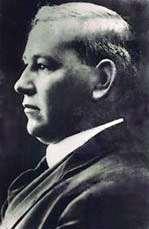

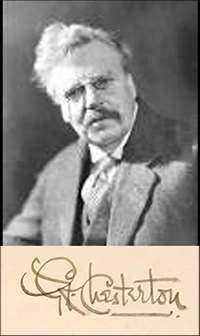
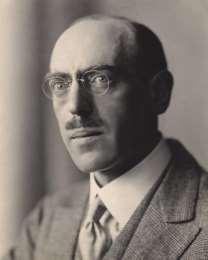
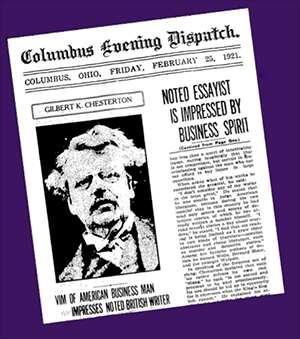
Walter L. George
Herbert A. Gibbons
1920-1921
W.L. GEORGE (1882-1926) - 1920-21 speaker: “Love and Marriage.” Paris born and bred, Walter Lionel George was an English writer known for his novels and writings on feminism. After working as a journalist in London, he was afforded the opportunity to write full time with the success of his novel, A Bed of Roses (1911) which chronicled a woman’s descent into prostitution. Though commercially successful, he was unpopular in the literary world because of his subject matter, his hack journalism, and his left-wing views. George authored thirty-two additional works.
HERBERT ADAMS GIBBONS (1880-1934) - 1920-21 speaker: “The Challenge to European Eminent Domain.” A journalist, Gibbons served as a foreign correspondent from 1909-1916 in Greece, Spain, Turkey and other near Eastern countries. In 1917-18 he served with the American Expeditionary Forces in France. Following World War 1, from 1920-1931, he was a correspondent for various American magazines reporting on happenings in Europe, Africa, and the Orient.
G.K. (GILBERT KEITH) CHESTERTON (1874-1936) - 1920-21 speaker: “The Ignorance of the Educated.” A prolific English author of books, poems, essays, plays and short stories, Chesterton was a literary and social critic, and a Catholic theologian and apologist. His newspaper writings and comments on the world, government, politics, economics, philosophy, theology, and many other topics were characterized by wit and humor. As a political thinker, Chesterton commented on liberalism and conservatism, saying, “The whole modern world has divided itself into Conservatives and Progressives. The business of Progressives is to go on making mistakes. The business of the Conservatives is to prevent the mistakes from being corrected.” An expert on Charles Dickens, his best-known novel is The Man Who Was Thursday, 1908; he is also known for the Father Brown detective stories. Chesterton’s reputation was marred by the Anti-Semitism in some of his writing. In 1934, after the Nazi Party took power, Chesterton wrote, “In our early days Hilaire Belloc and myself were accused of being uncompromising Anti-Semites. Today, although I still think there is a Jewish problem, I am appalled by the Hitlerite atrocities. They have absolutely no reason or logic behind them. It is quite obviously the expedient of a man who has been driven to seeking a scapegoat and has found with relief the most famous scapegoat in European history, the Jewish people.”
MR. AND MRS. ONGAWA - 1920-21 performance: “Japanese Songs and Dances.” Crichton Club members were entertained with the Ongawas’ songs, ceremonial bows, costume poses and dances with delicately sandaled feet, all done to bits of verse illustrative of the poetic drama and music of Japan.
Margot Asquith's appearance in 1922 prompted the issuing of 50 guest tickets, a waiting list, and the following firm note to an offending member:
"Mr. and Mrs. are notified by the President and the Directors of the Crichton Club that in bringing to the meeting of February 18 a guest for whom a card of admission had repeatedly been refused, they have, in the opinion of the Board, overstepped the courtesies permitted to members of Crichton Club, and are requested in future to observe the rules and regulations announced by the Directors, in order that the Club may be conducted in a regular and orderly manner."
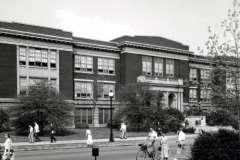
Mrs. John Myers Taylor (daughter of Governor James Campbell) was elected the first president of the Crichton Club Board Campbell Hall, at OSU, was built to house the rapidly expanding home economics department. At one time, half of female undergraduates took classes in the department. In 1921, the Board of Trustees named the building for Elizabeth Owens Campbell, mother of our first president and wife of former Ohio Governor James F. Campbell.
1921-1922
William Beebe: Pheasant Hunting in Borneo and India
Isaac Marcosson: The World in Transition
Margot Asquith: Reminiscences of Eminent Englishmen
Bruno Roselli: Dante: A Replica of the Typical Italian
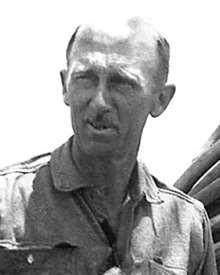

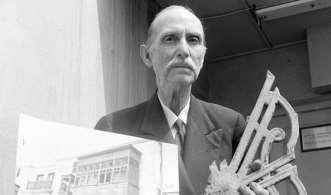

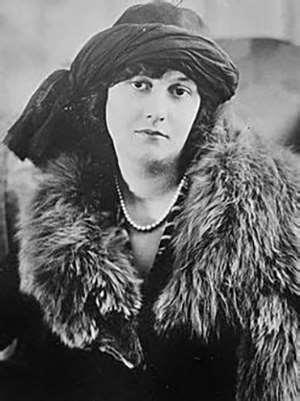

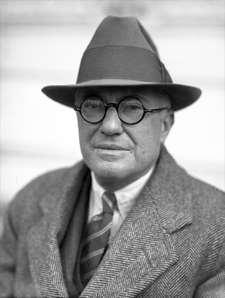
Isaac Marcosson
1921-1922
WILLIAM BEEBE (1877-1962) - 1921-22 speaker: "Pheasant Hunting in Borneo and India." 1927-28 speaker: "Beneath Tropic Seas." Charles William ("Will”) Beebe was a naturalist and explorer. He was Curator of Ornithology with the New York Zoological Society for more than 50 years. A regular contributor to National Geographic magazine, he also authored a number of popular books describing his various expeditions, particularly in tropical regions. He is especially known for his underwater explorations and (in the 1930’s) his involvement in the development and use of the bathysphere to probe previously unreachable oceanic depths.
ISAAC MARCOSSON (1877-1961) - 1921-22 speaker: “The World in Transition.” Bom in Louisville, Kentucky and educated in local schools, Isaac Frederick Marcosson was a journalist and editor of various publications: The World’s Work (1903), The Saturday Evening Post (1907) and Munsey's Magazine (1910). His works include: The War After the War (1916), The Rebirth of Russia (1917), The Business of War (1917), Adventures in Interviewing (1919), and An African Adventure (1921).
MARGOT ASQUITH, COUNTESS
OF OXFORD
AND
ASQUITH
(1864-1945) - 1921-22 speaker: “Reminiscences of Eminent Englishmen.” Born Emma Alice Margaret Tennant, Asquith was an author and socialite known for her outspoken opinions and acerbic wit: “She tells enough white lies to ice a wedding cake.” She grew up as an adventurous and uninhibited child, roaming the moors, riding, and playing golf. She entered London society in 1881 and, along with her sister Laura, became the center of an intellectual group known as “The Souls.” In 1894 Margot married Herbert Henry Asquith, who served from 1908-1916 as Prime Minister. She introduced her husband to a glittering social world, but her outspoken opinions and unconventional high society connections may also have contributed to his downfall. Asquith published several works, but her writing style was not admired by all critics; the American critic Dorothy Parker acidly noted that, “The affair between Margot Asquith and Margot Asquith will live as one of the prettiest love stories in all literature.” Her works include A/7 Autobiography, 1922; Oclavia, 1928; and More or Less About Myself, 1934. One of the most memorable Asquith quips is her response to American actress Jean Harlow who repeatedly mispronounced her first name - “No, no; the ‘t’ is silent as in ‘Harlow’.”
BRUNO ROSELLI (1887-19??) – 1921-22 speaker: “Dante: A Replica of the Typical Italian.” As a professor of Italian and an archaeologist at Vassar, Roselli participated in the 1920 observance of the 600th anniversary of Dante’s death with an address at the university. He later took part in the excavations of Leptis Magna, a Roman city buried under the sands of Tripoli. He defended Italian fascism in lectures, including at Harvard University in 1923. According to an article in the New York Times of February 8, 1930, Dr. Roselli delivered a lecture in which he told club women to “… uplift [their] husbands. The hours and days which the American woman devotes to bridge parties and club meetings could better be given to the care of her husband.” He is an author of volumes on the teaching of the Italian language; his most widely held books by libraries are Italy and the Italians in Washington’s Time, 1933; Our Italian Immigrants, 1927; and The Century of Failure, 1929.
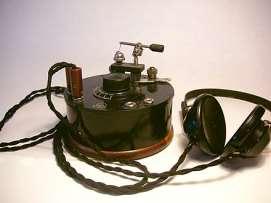
1922: WOSU, the First Radio Station in Columbus

In 1920, Columbus got its first radio station, WVSG (the voice of St. Gabriel). In 1921, that frequency was licensed to OSU as WEAO, “Willing, Energetic, Athletic, Ohio,” with the call letters changed to WOSU in 1922. Fans of OSU football were thrilled to be able to listen to Ohio State football and other sports programming. “Buckeyes” has been the official Ohio State football team’s nickname since 1950, but it had been in common use for many years before.
1922-23
Emma C. Ponafidine: My Experiences in Soviet Russia
Basil Thomson: My Experiences at Scotland Yard
Olivia R. Agresti: Recent Developments in European History
Ruano Bogislav: Singing of Gypsy and Hungarian Songs
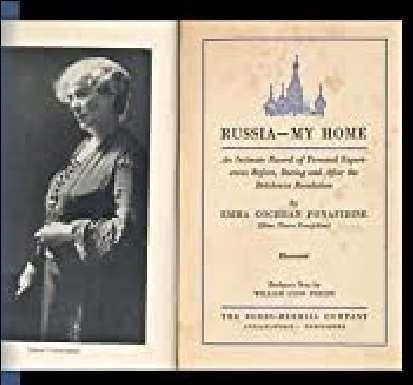

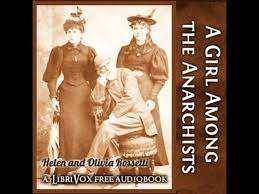





1922-23
EMMA (COCHRAN) PONAFIDINE (1863-1958) - 1922-23 speaker: “My Experiences in Russia.” Raised in Persia, Ponafidine, daughter of an American missionary, married a Russian diplomat serving in Ottoman Turkey and Persia. Returning to Russia in 1912, her family suffered greatly during the Russian Revolution. She was author of numerous magazine articles and of Russia: My Home, an Intimate Record of Personal Experiences Before, During, and After the Bolshevist Revolution, 1931.
SIR BASIL HOME THOMSON, KCB (1861-1939) - 1922-23 speaker: “My Experiences at Scotland Yard.” A talented British colonial administrator, writer, prison governor, intelligence officer, criminologist, Thomson became assistant Commissioner of Scotland Yard. He earned a reputation as a “spy catcher” due to his involvement in the arrests of several high-profile cases including Mata Hari, famous Dutch exotic dancer and courtesan. His career ended in 1925 when he was charged with public indecency with a woman in London’s Hyde Park. He may have been set up by his enemies within the Yard to thwart his move from assistant to full Commissioner.
OLIVIA ROSSETTI AGRESTI (1875-1960) - 1922-23 speaker: “Recent Developments in European History.” Agresti was a British activist, author, editor, and interpreter. A member of one of England's most prominent artistic and literary families, her unconventional political trajectory began with anarchism, continued with the League of Nations, and ended with Italian fascism. Her involvement with the latter led to an important correspondence and friendship with Ezra Pound, who mentions her twice in his Cantos. She was a staff interpreter (Italian) for the League of Nations from 1922 to 1930.
RUANO BOGISLAV (1855-1956) - 1922-23 speaker: “Recent Developments in European History.” Agresti was a British activist, author, editor, and interpreter. A member of one of England’s most prominent artistic and literary families, her unconventional political trajectory began with anarchism, continued with the League of Nations, and ended with Italian fascism. Her involvement with the latter led to an important correspondence and friendship with Ezra Pound, who mentions her twice in his Cantos. She was a staff interpreter (Italian) for the League of Nations from 1922 to 1930.)
This residence in Bexley, Ohio was commissioned by Malcolm Jeffrey. He and wife, Florence, were charter members of the Crichton Club. It was designed by Robert Gilmore Hanford, a Columbus-based architect. Ground was broken for the house in 1923 and it was completed in 1925. The Jeffreys occupied the home until Malcolm Jeffrey's death in 1930. It was then sold to Florence Jeffrey Carlile, Malcolm Jeffrey's sister. Under Mrs. Carlile's ownership the house gained a master suite on the second floor as well as a screened porch. Upon Mrs. Carlile's death in 1954, the house was turned over to the Very Reverend Charles U. Harris, who in turn offered the residence to the state. The house has been occupied by Ohio governors ever since.
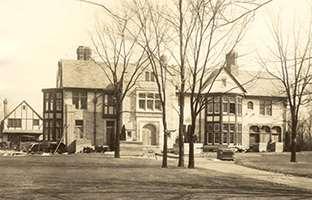
1923-1924
Lord Birkenhead: Reminiscences of an English Statesman
Arthur Weigal: Tutankhamen, Recent Discovery in Egypt
Henry Fairfield Osborn: Social and Racial Progress in America
J. C. Faunthorpe: Jungle Life in India
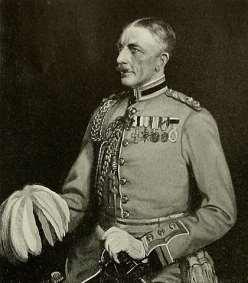
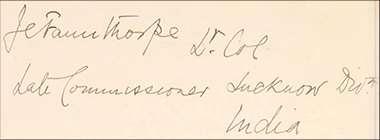
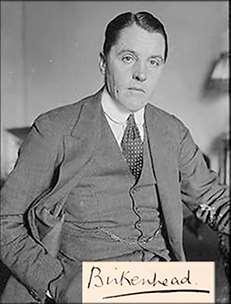

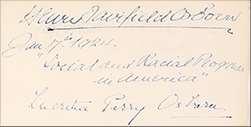


1923-1924
LORD BIRKENHEAD (1872-1930) - 1923-24 speaker: “Reminiscences of an English Statesman.” Frederick Edwin Smith, 1st Earl of Birkenhead, is best known to history as F. E. Smith. He was a British Conservative statesman and lawyer of the early 20th century. He was a skilled orator, noted for his staunch opposition to Irish nationalism, his wit, pugnacious views, and hard living and drinking. He is perhaps best remembered today as Winston Churchill's greatest personal and political friend until Birkenhead's death at age 58. Eleanor Smith accompanied Lord Birkenhead.
ARTHUR WEIGALL (1880-1934) - 1923-24 speaker: “Tutankhamen, Recent Discovery in Egypt.” Weigall was an English Egyptologist, stage designer, journalist and author whose works span the histories of Ancient Egypt through historical biographies, guidebooks, popular novels, screenplays and lyrics. A youthful fascination with genealogy led him to the pharaohs of Ancient Egypt and so into Egyptology. At the age of 25, he was appointed Chief Inspector of Antiquities for Upper Egypt in Luxor. In London during World War I, he became a successful set-designer for the London revue stage. In the 1920’s he was appointed film critic for the Daily Mail Journalism brought him back to Egypt where he covered the opening of the tomb of Tutankhamun as correspondent for the Daily Mail.
HENRY FAIRFIELD OSBORN (1857-1935) - 1923-24 speaker: “Social and Racial Progress in America.” Osborn was an American geologist, paleontologist, and eugenicist. In 1891 he was hired jointly by Columbia University as a professor and the American Museum of Natural History where he served as President until 1933. During that time, he accumulated one of the finest fossil collections in the world. Some of his contributions are less celebrated. Osborn's belief in the now discredited idea of orthogenesis is one such contribution, his promotion of eugenics, another. His best-known publication might be his two-volume work of 1936, The Proboscidea: A Monograph of the Discovery, Evolution, Migration and Extinction of the Mastodons and Elephants of the World. A second volume appeared in 1942, after his death. He also authored The Origin and Evolution of Life (1916). He is also known for his theories on intelligence and racial differences, particularly his work The Evolution of Human Races. Lucretia Perry Osborne accompanied Henry Fairfield Osborn for his 1923-24 speech on “Social and Racial Progress in America.”
J. C. FAUNTHORPE (1871-1929) - 1923-24 speaker: “Jungle Life in India.” Colonel John Champion Faunthorpe was a British sport shooter who competed in the 1924 Summer Olympics. He spent many years in the British Indian civil service returning to England for World War I. After that he went in Washington D.C. as attaché of the British Embassy. He was a hunter and co-leader of the Vernay- Faunthorpe Expeditions Employment from 1920 to 1928 on behalf of the American Museum of Natural History. He and Arthur S. Vernay conducted six expeditions to collect animal specimens in India, Burma (now Myanmar), and Siam (now Thailand). The specimens were donated to the museum.
Lord Birkenhead, one of England’s finest legal minds, absorbed too much Crichton hospitality enroute to the lecture platform. Governor James Campbell, who was to introduce the distinguished jurist, was urged to extend his introduction to allow the speaker a little time to recover. The governor launched into a lengthy discussion of British-American relations throughout the nineteenth century, while his daughter, Mrs. John Myers Taylor, the first president of the club, unaware of the situation, sat in the audience quietly puling to bits her feathered fan. When the governor finally yielded the platform, Lord Birkenhead, although still appearing a bit befuddled, proceeded to answer the governor, point by point.
1924-1925
Countess Catherine Karoly: Hungary Yesterday and Today
Performance: Von Flotow's Opera "L'Ombre"
Andre Morizé: (Topic Unavailable)
John Cowper Powys: (Topic Unavailable)
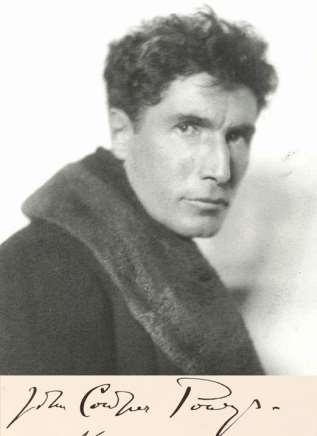




1924-1925
COUNTESS CATHERINE KAROLYI (1898-1985) - 1924-25 speaker: “Hungary, Yesterday and Today.” The countess and her husband, the onetime President of the Republic of Hungary, were responsible for the establishment of the Hungarian Republic in 1918. Next year, their enemies claimed, they "sold the country to the Bolsheviki." The countess maintained that she and her husband were socialists but that did not mean that they were communists. She arrived in the US in 1924 to lecture for three months at the invitation of a committee of American women. Her lecture subjects were “Hungary and European Peace,” “Why I am an Exile” and the “Last Three Hungarian Revolutions.” In granting her husband a visa, the State Department stipulated that he could not make political speeches, since he was believed to be a Communist.
VON FLOTOW’S OPERA “L’OMBRE” - 1924-25 performance. This performance was a comic opera in three acts. The composer Friedrich von Flotow was from an aristocratic family. He studied at the Paris Conservatory under the tutelage of such greats as Rossini, Meyerbeer, Donizetti and later Gounod and Oflenbach all of whose influences are evident in von Flotow’s works. Librettists were Jules Henri Vemoy de Saint-Georges and Adolphe Charles de Leuven. “L’Ombre” was premiered on July 7,1870 in Paris,
ANDRE MORIZE (1884-1957) - 1924-25 speaker: topic unavailable. Andre Morize was the dean of at Harvard University overseeing the French literature faculty. In 1917, he published the first critical edition of Candide. Following this, he arrived at Harvard as a dashing French lieutenant assigned to teach trench warfare to ROTC students but stayed and made a career teaching literature. Author of Problems and Methods of Literary History (1922).
JOHN COWPER POWYS (1872-1963) - 1924-25 speaker: topic unavailable. John Cowper Powys, a British novelist and lecturer was a prolific writer of novels, short stories, essays, poetry and letters whose works spanned over 50 years. His first novel, Wood and Stone, was published in 1915 and dedicated to Thomas Hardy. He achieved critical acclaim and financial success with Wolf Solvent in 1929. One of his most admired novels, A Glastonbury Romance (1933), was the subject of an expensive libel lawsuit.
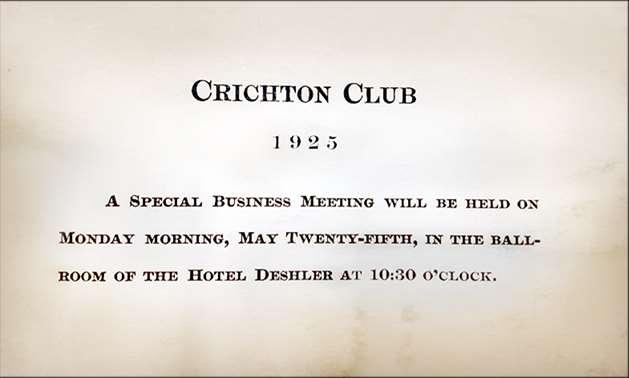
Alexander Woolcott: Behind the Scenes
1925-1926
Manley O. Hudson: The League of Nations in 1925
Timothy Smiddy: Ideals and Activities of the Irish Free State
Thomas F. Lee: Dons, Dictators and Duenas


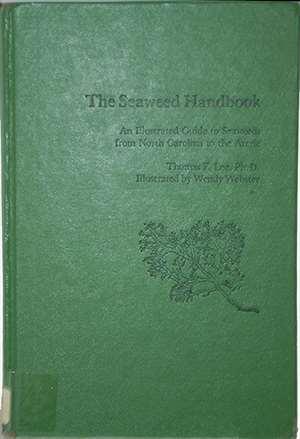





1925-1926
ALEXANDER HUMPHREYS WOLCOTT (1887-1943) - 1925-26 speaker:"Behind the Scenes.” Wollcott was an American critic and commentator for The New Yorker magazine, The New York Times, and CBS radio. He was also a member of the Algonquin Roundtable and his close friends included Harpo Marx and Dorothy Parker. He was one of the most quoted men of his generation and was renowned for his savage tongue. He also appeared on Broadway and in several films.
MANLEY OTTMER HUDSON (1886-1960) - 1925-26 speaker; "The League of Nations in 1925.” Hudson was an attorney who specialized in international law. The American Society of International Law named a medal after him, and Harvard University named a professorship after him. In addition to serving as a professor at Harvard, where he led the department of international law for over 30 years, he was also a guest lecturer at the Hague Academy of International Law, the University of Calcutta, and the Graduate Institute of International Studies. Twice nominated for the Nobel Peace Prize, he served as an advisor to the League of Nations and the United States Department of State.
TIMOTHY SMIDDY (1875-1962) - 1925-26 speaker: "Ideals and Activities of the Irish Free State.” Smiddy was an Irish academic, economist, and diplomat. He was Ireland's first Ambassador, serving as Minister Plenipotentiary and Envoy Extraordinary to the United States of America for the Irish Free State. This appointment represented Ireland’s first formal diplomatic relations with another country following its independence from the United Kingdom.
THOMAS F. LEE - 1925-26 speaker: "Dons, Dictators and Duenas.”
A 1925 copy of a letter admonishing a member who had broken two rules of the Crichton Club.
FYI
In 1925 the club constitution was revised.
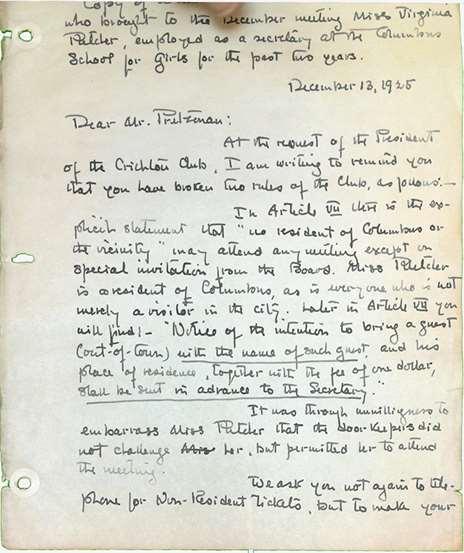
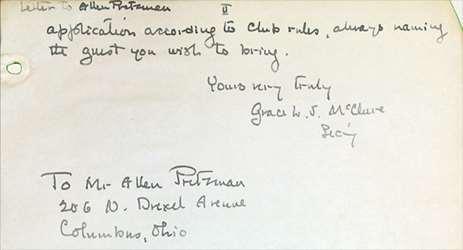

Our first printed program.
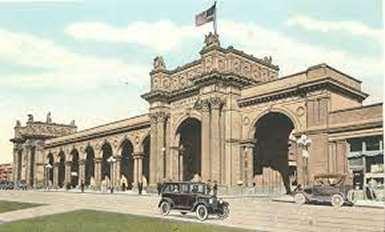
In the days before commercial flight, many of our speakers arrived via train at the Union Station on High Street.
Richard E. Byrd: First Flight to North Pole
1926-1927
Phillip Guedalla: The Political and Industrial Situation in England
Samuel Arthur King and Horace Alwyne: Readings Accompanied by Piano
Michael I. Pupin: Fifty Years Progress in Electrical Communication
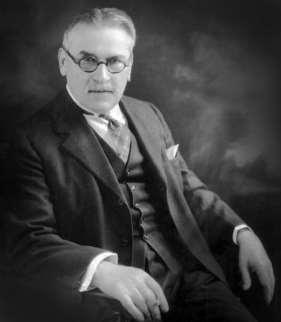



No photographs available For Samuel A. King and Horace Alwyne.




Phillip Guedalla
1926-1927
RICHARD E. BYRD (1888 - 1957) - 1926-27 speaker: “First Flight to North Pole.” Rear Admiral Byrd was born in Virginia and graduated from the US Naval Academy in 1912. He learned to fly during World War I. In 1926 he claimed to have flown to the North Pole, but much doubt has been cast on this claim. In 1929 he flew to the South Pole and his recognition as a polar explorer became part of history. He was awarded the Medal of Honor and the Navy Cross among his 22 citations.
PHILIP GUEDALLA (1889-1944) - 1926-27 speaker: “The Political and Industrial Situation in England.” Guedalla was a London born British barrister educated at Rugby School and Balliol College, Oxford. After ten years of practicing law, he turned to writing and is remembered as a popular biographer, history, and travel writer and for his wit and epigrams e.g., “History repeats itself Historians repeat each other.” Guedalla dabbled in politics and five times was an unsuccessful Parliamentary candidate! He served in the Royal Air Force during World War I and died prematurely at age 55 of an illness contracted during his RAF service. His writings include thirty-three works mostly dealing with aspects of British and European history.
SAMUEL ARTHUR KING (1918-) 1926-27 speaker: "Readings Accompanied by the Piano." King, of Bryn Mawr College, wrote a book in 1905 entitled, Graduated Exercises in Articulation. He wrote the book because of the "undue prevalence of slovenly articulation, not only among the younger generation, but also amongst those charged with the duties of teaching and public speaking."
MICHAEL IDVORSKY PUPIN (1858-1935) - 1927-28 speaker: “Fifth Years Progress in Electrical Communications.” An American physicist and inventor, Pupin was born in Austria-Hungary. He immigrated to the United States in 1874 and received an undergraduate degree from Columbia University in 1883. He returned to Europe for his Ph.D. in physics at the University of Berlin. Upon his return to the United States, Columbia University became his academic home where he taught electro-mechanics for forty years. His research focus was to improve the quality of long-distance telephone and telegraph transmission. By experimenting with coils, he found that inserting them in the lines at various intervals made transmission quality better. His oscillating circuit made it possible for simultaneous transmission of several messages. He also discovered that matter struck by x-rays is stimulated to radiate other x-rays. For his work he received thirty-four patents. In 1924 he was given the Pulitzer Prize for his autobiography From Immigrant to Inventor.
1926-1927

Announcement of the first meeting of the year for the 1926-27 season.
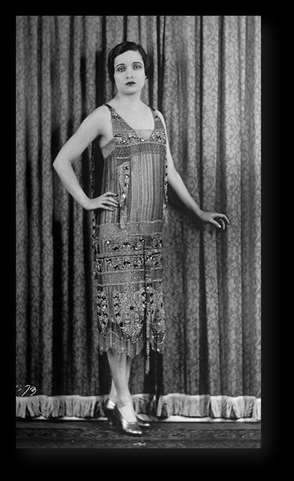
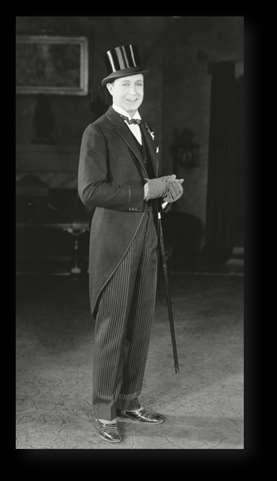
Our early events were dressy affairs featuring full-course dinners and dancing with an orchestra in addition to the lectures. Dinners in the Deshler Hotel ballroom cost $1.00 per person.
Some have felt it very foolish to wear evening dress at the meetings and have reported that some members who wished to wear hats had been driven from the Club by the fine clothes of those present at the meetings; while others say the opportunity to wear evening dress has come to them only since the Crichton Club was organized.
To all these criticisms, favorable and unfavorable, the members of the Board have listened; but since the membership of the Club has not fallen off, and since the waiting list never grows less, they conclude that the amount of satisfaction felt by the members is, on the whole, greater than the amount of dissatisfaction they experience in the meetings. They are even inclined to believe that the pleasure some of the members get out of what is impolitely called 'kicking' is worth to them the price of admission."
-Secretary’s minutes, 1923
Bertrand Russell: European Chaos
William Beebe: Beneath Tropic Seas
1927-1928
Emil Ludwig: Bismarck and the German Republic
Sherwood Picking: Submarines and Their Operation
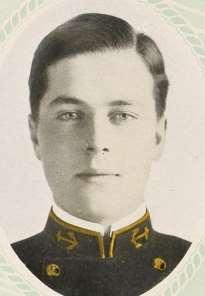

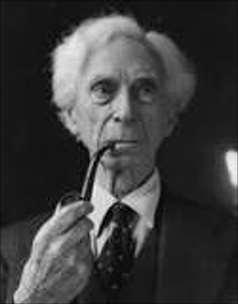

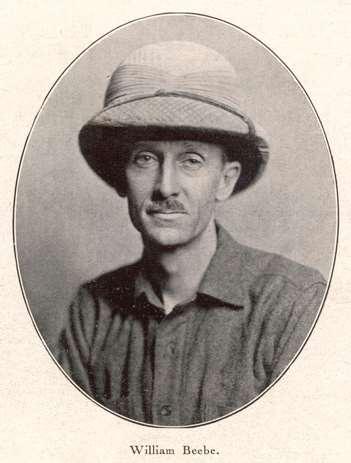

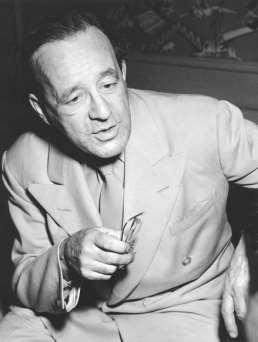

1927-1928
BERTRAND RUSSELL (1872-1970) - 1928-29 speaker: “European Chaos.” Bertrand Arthur William Russell, the 3 Earl Russell was a British philosopher, logician, mathematician, historian, socialist, pacifist and social critic. He spoke to the Crichton Club between the wars. During World War I he was a pacifist and spent six months in prison. Following his release, he founded the experimental Beacon Hill School in 1927 with his second wife Dora. He then moved to the United States to pursue academic interests and taught at the University of Chicago, University of California Los Angeles, and at the City College of New York. In 1950 he received the Nobel Prize in literature “in recognition of his varied and significant writings in which he champions humanitarian ideals and freedom of thought.”
WILLIAM BEEBE (1877-1962) - 1927-28 speaker: "Pheasant Hunting in Borneo and India." "Beneath Tropic Seas." Charles William ("Will”) Beebe was a naturalist and explorer. He was Curator of Ornithology with the New York Zoological Society for more than 50 years. A regular contributor to National Geographic magazine, he also authored a number of popular books describing his various expeditions, particularly in tropical regions. He is especially known for his underwater explorations and (in the 1930’s) his involvement in the development and use of the bathysphere to probe previously unreachable oceanic depths. Beebe also spoke to the Club in 1921-1922.
EMIL LUDWIG (1881-1948) - 1927-28 speaker: "Bismarck and the German Republic." During World War I, German author Emil Ludwig was in Vienna and Istanbul as a correspondent for a Berlin newspaper. In the 1920’s, he attracted international attention for his well-received quasi biographies of Goethe (1920), Bismarck (1922-24), and Jesus (1928); these portrayals were an attractive blend of historical fact, fiction, and psychological analysis of the subject presented in a clear crisp prose. His books were translated into several languages; this exposure enhanced his reputation so that he was able to earn a comfortable living when he left Germany for Switzerland (where he became a citizen in 1932) and, later, when he emigrated to the United States in 1940. He returned to Germany as a journalist after World War II.
SHERWOOD PICKING
(1890-1941) - 1927-28 speaker: "Submarines and Their Operation." Born in Baltimore, Maryland, Sherwood Picking graduated from the U.S. Naval Academy in 1911. During the Great War (19141918), the use of submarines was increasingly widespread and controversial. The "unrestricted" use of submarine warfare i.e., against both armed and unarmed vessels, by the German Navy was one of the principal factors prompting American entry into the conflict. Picking was decorated for heroism as a sub commander during the war, and he was the ranking officer of the American submarine base in Panama during the years between the two world wars.
Emil Ludwig surprised the press at his news conference when he appeared barefoot and in pajamas.
Arthur Compton: What Things are Made Of
1928-1929
Angna Enters: Episodes: A Series of Pantomimes
Cornelia Otis Skinner: Character Sketches
Thornton Wilder: The Bridge of San Luis Rey
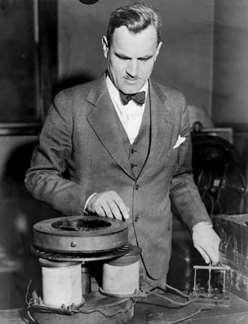

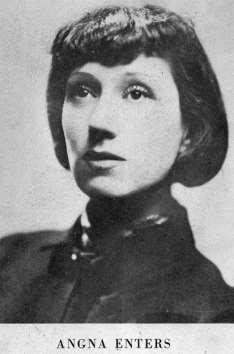
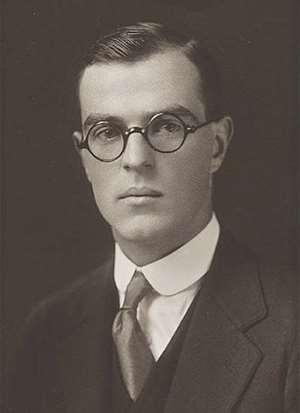

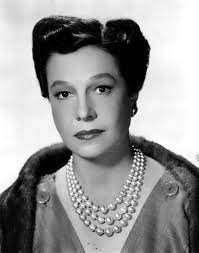

1928-1929
ARTHUR COMPTON (1892-1962) - 1928-29 speaker: “What Things Are Made Of.” Crichton Club was privileged to host Ohio-born Arthur Compton at an important early point in his distinguished career as a scientist. Winner of the 1927 Nobel Prize in Physics Compton’s research and theorizing about the nature of x-rays, especially their scattering and ensuing loss of energy, subsequently known as the “Compton Effect,” moved him into the front rank of what has come to be known as particle physics. After earning the Ph.D. at Princeton (1916) and a brief stint with Westinghouse, Compton embarked upon an academic career, first at Washington University but principally at the University of Chicago. At the latter institution, he agreed to help lead secret federal efforts to accelerate the development of the atomic bomb.
ANGNA ENTERS (1897-1989) - 1928-29 performance: “Episodes: A Series of Pantomimes.”
Born Anita Enters in New York City, her youth was spent in Milwaukee where she first saw Les Ballets Russes. She determined to be a dancer and moved to her birthplace in 1919 to begin her study with Michio Ito. In 1924 she changed her name to Angna and took her solo program, “The Theatre of Angna Enters” on tour throughout the United States and Europe until 1939 and periodically thereafter until 1960. Enters was a dancer, mime, painter, writer, novelist, and playwright. She created a large body of museum-quality visual art including sketches, landscape drawings, archeological studies, costume plates, watercolors, and oil portraits. Enters wrote three volumes of autobiography, a novel, a book on mime, two plays and co-wrote two Hollywood film scripts.
CORNELIA OTIS SKINNER (1899-1979) - 1942-43 speaker: "Character Sketches." The child of two theatrical parents, Cornelia Otis Skinner became a well-known writer and actress in both film and television in the 1950’s. In the late 1920’s, she wrote and presented several character sketches in a highly regarded onewoman performance which toured widely. This experience was, presumably, the inspiration for her appearance at Crichton Club. One of her better-known books, Our Hearts Were Young and Gay, was published in 1942. She was a renowned character actress and a gifted writer of humor and social commentary.
THORNTON WILDER (1897-1975) - 1928-29 speaker: "The Bridge of San Luis Rey." Thornton Wilder was an American novelist and playwright. The recipient of three Pulitzer Prizes and the first National Medal for Literature (since discontinued), he first won critical acclaim for The Bridge of San Luis Rey (1927). Later works included The Skin of Our Teeth (1942) and, perhaps his most famous play, Our Town (1938). Later, Our Town was made into a film, as was his play. The Matchmaker (1954), which became Hello Dolly! A student of the classics, he attended Oberlin College and graduated from Yale University, earning his M.A. in French from Princeton University.
The distinguished guests did not have to make a presentation if they did not wish, but only one guest has refused to perform. Angna Enters in 1928 over a dispute regarding advance payment. The dancer and pantomimist refused to perform without being paid in advance. She spent the evening in her dressing room, while the members enjoyed an evening of dancing.
Ray Chapman Andrews broke his contract at the last moment, but luckily could be replaced by Cornelia Otis Skinner.
1929-1930
Grand Duke Alexander: Out of My Life
Ernest Dimnet: The Art of Thinking
Lowell Thomas: With Lawrence in Arabia and Allenby in Palestine
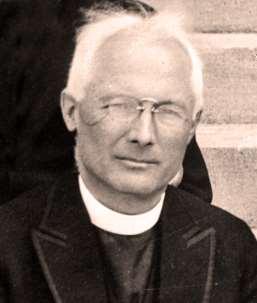



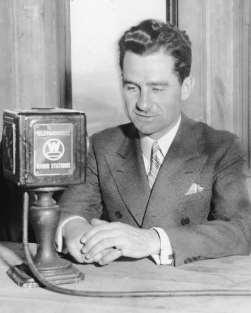

1929-1930
GRAND DUKE ALEXANDER OF RUSSIA (1866-1933) - 1929-30 speaker: "Out of My Life." Alexander Mikhailovich of Russia was a member of the Russian royal dynasty and brother-in-law and advisor to Nicholas II, the last czar of Russia. He served as a Russian naval officer in his youth. Following the Russian revolution of 1917, he lived in Paris and spoke on the international lecture circuit. He wrote his memoirs, Once a Grand Duke (1932) and Always a Grand Duke, telling about court life in Imperial Russia's last half-century.
ERNEST DIMNET (1866-1954) - 1929-30 speaker: "The Art of Thinking." Ernest Dimnet was a French priest, Latin scholar, writer, philosopher, and lecturer. His gained fame in America with The Art of Thinking (1928), a popular book about the nature of true creativity and reasoning. His other books include France Herself Again, Bronte Sisters (1921), What I’ve Live By (1922), My Old World (1935), and My New World
LOWELL THOMAS (1892-1991) - 1929-30 speaker: "With Lawrence in Arabia and Allenby in Palestine." Lowell Thomas was an American newscaster, adventurer, journalist, and writer. He first earned fame after World War I, narrating his film, "With Allenby in Palestine and Lawrence in Arabia" before some 4 million people on a worldwide tour. His book. With Lawrence in Arabia (1924), was the first of his 56 publications. His four-decade long broadcasting career began in 1930 and included both television and radio as well as movie newsreels. In 1976, he was the recipient of the Presidential Medal of Freedom.
The membership always seemed to be interested in speakers from abroad, especially those with titles. When such an eminence was announced, a great rush for guest tickets and renewing of memberships ensued. The Grand Duke Alexander of Russia drew an audience of 520, which set an all-time record in 1929.
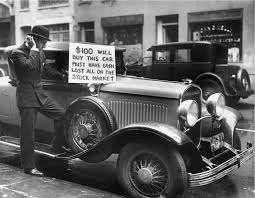
1930-1931
Randolph Churchill: Can Youth Be Conservative?
Richard E. Byrd: The South Pole Expedition
George E. Russell (AE): Some Personalties of Modern Ireland
J. B. Priestley: An Englishman's View of Contemporary American Literature
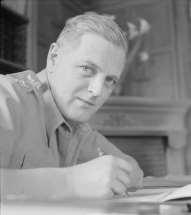

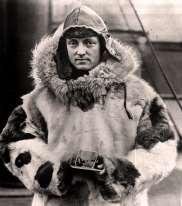


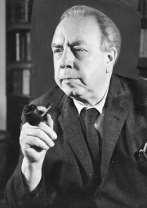
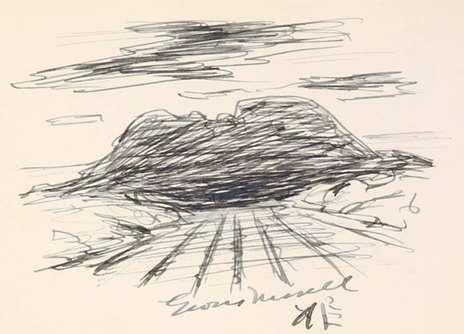
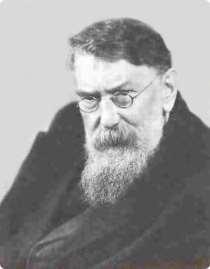
1930-1931
RANDOLPH CHURCHILL (1911 - 1968) - 1930-31 speaker: "Can Youth Be Conservative?”. Randolph Churchill, author, journalist, and politician was the only son of British Prime Minister Winston Churchill. Educated at Eton College and Christ Church, Oxford, Mr. Churchill was a popular journalist in the 1930’s. During WW II, he served as an intelligence officer in the Middle East and Yugoslavia. His books on controversial topics included What I Said About the Press (1957), The Rise and Fall of Sir Anthony Eden”(1959), and The Fight for the Tory Leadership (1964). He wrote a historical study. Lord Derby: King of Lancashire (1960), and by his death had published two volumes of a definitive biography of his father. Youth, 1874-1900 (1966) and Young Statesman, 1901-1914 (1967).
RICHARD E. BYRD (1888-1957)- 1930-31 speaker: “The South Pole Expedition”. An explorer, naval officer, author, aviator and writer, Richard Byrd graduated from the U.S. Naval Academy in 1912 and commanded an air station in Nova Scotia during WW l. In 1926, Byrd’s first polar expedition was to the Arctic, where he claimed territory for the United States and made the first flight over the North Pole. From 1928 to 1947, he led four major expeditions to this continent. From 1928 to 1930, Byrd led his first Antarctic expedition, mapped a large part of this continent, made the first flight over the South Pole and established a research base called Little America. At the end of the first expedition, he was made rear admiral of the U.S. Navy. In 1955, Richard Byrd directed Operation Deep Freeze, the first phase of United States operations in the Antarctic; and in 1956, Byrd made his last flight over the pole.
GEORGE E. RUSSELL (A.E.) (1867-1935) - 1930-31speaker: "Some Personalities of Modern Ireland.” George Russell, better known as A.E., has been described as "The Socrates of Dublin." Mr. Russell was editor of The Irish Homestead from 1905-23 and The Irish Statesman from 1923-30. Believing village communities would grow and prosper around cooperative creameries, Mr. Russell devoted much of his life organizing such cooperatives throughout Ireland under the auspices of the Irish Agricultural Organization Society. Mr. Russell lectured extensively in the U.S. and received honorary doctorates from Yale University and Trinity College.
J.B. PRIESTLEY (1894-1984) - 1930-31 speaker: "An Englishman’s View of Contemporary American Literature." John Boynton Priestly, O.M. was an English novelist, playwright, and broadcaster. Publishing more than 100 novels, including The Good Companions (1929) and Angel Pavement (1930), Priestley also wrote plays including Dangerous Corner (1932), An Inspector Calls (1946), and The Thirty-first of June (1957). On the BBC during WW II, Priestley was second in popularity only to Winston Churchill. Politically a Socialist, Priestly refused both knighthood and peerage, but accepted the prestigious Order of Merit (O.M.), in 1977.
The second appearance before the Crichton Club in 1930 of the renowned Admiral Richard Byrd is well documented by the secretary's report: "Admiral Byrd's lecture provided an opportunity for the Club to do a generous and public-spirited thing for Columbus, which involved a departure from our customary procedure. Because it was felt that the experience of hearing Admiral Byrd should be shared with a larger group, the meeting was held in Memorial Hall. Each member was given one guest ticket. The remainder of the seats were sold for the nominal sum of one dollar in order to encourage the natural interest of young people in the Byrd expedition. Every seat in Memorial Hall was sold and we were able to sell, in addition, about fifty standing-room tickets." Byrd's manager was annoyed that only one dollar was charged for what he considered a three-dollar event!
All the finery could at times be the cause of disappointment. Mrs. Herman Hoster always regretted missing a chance to dance with J. B. Priestly at the spring 1931 meeting because she feared someone might step on the long chiffon train of the black beaded gown, which she had recently purchased in Paris at Lanvin.
1931-1932
Rafael Sabatini: Fiction in History and History in Fiction
Oliver R. Baldwin: The Future of British Politics
Stuart Chase: The End of an Epoch?
Joseph Wood Krutch: The Modern Theatre
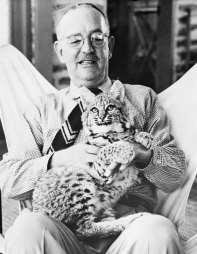

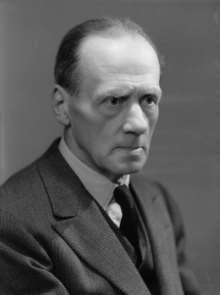



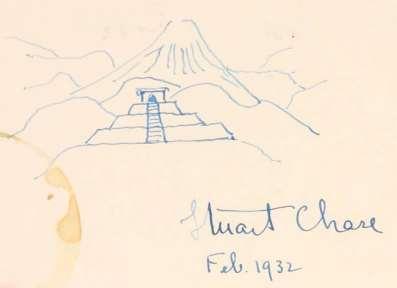
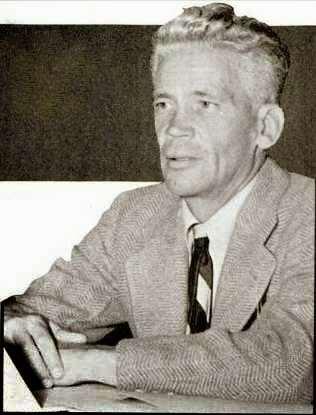
1931-1932
RAFAEL SABATINI (1875-1950) - 1931-32 speaker: "Fiction in History and History in Fiction." Sabatini was born in Italy of an English mother and Italian father. Fluent in six languages, Sabatini exclusively used English in writing more than 30 novels, a dozen collections of short stories and several books of non-fiction. His bestknown works include The Sea Hawk (1915), Scaramouche (1921), and Captain Blood (1922), all of which were made into films.
OLIVER R. BALDWIN (1899-1958) - 1931-32 speaker: "The Future of British Politics”.
STUART CHASE (1888-1985) - 1931-32 speaker: "The End of an Epoch." Chase was an American economist and engineer, trained at MIT. Believed to be the originator of the expression, "A New Deal", Chase's writings covered diverse topics from semantics to labor negotiations. Some of his writings include The Tragedy of Waste (1925), Men and Machines (1929), A New Deal (1932), and The Tyranny of Words (1938).
JOSEPH WOOD KRUTCH (1893-1970) - 1931-32 speaker: “The Modem Theatre.” Krutch was an American writer, critic, and naturalist. Bom in Tennessee, Krutch studied at the University of Tennessee and received a master’s degree and Ph.D. from Columbia University. After travelling in Europe, Krutch became a theater critic for The Nation and received acclaim for his book, “The Modern Temper” (1929). From 1937 to 1953 Krutch was a professor at Columbia University. Krutch wrote a dozen volumes of literary biography and theatrical history and wrote thirty-five books including, “Edgar Allan Poe: A Study in Genius” (1926), The Desert Year (1951), The Measure of Man (1954), The Grand Canyon: Today and All Its Yesterdays (1951).
Professor Auguste Piccard's visit came at the time of the bank holidays in 1933 and it was felt "it would be in better taste to have only a lecture without refreshments." The meeting was held in Mees Hall, and each member was allowed to bring a guest. Professor Piccard had two requests: no one was to smoke, and his identical twin brother was to share the stage with him. After the lecture, no one was certain as to which Piccard they had heard!
1932-1933
Margit Bethlen: History in the Making and Personalities Who Made It
William Butler Yeats: The New Ireland
Victoria Sackville-West: Changes in English Social Life
Auguste Piccard: The World from Ten Miles Up
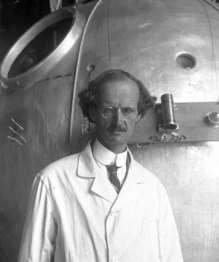

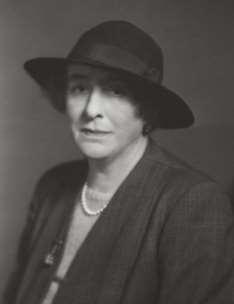



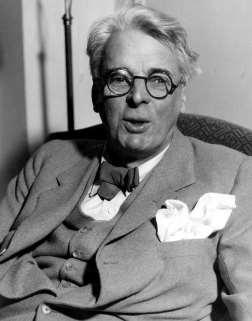

1932-1933
COUNTESS MARGIT BETHLEN (1882-1970) - 1932-33 speaker: "History in the Making and Personalities Who Made It." Countess Margit Bethien, wife of Count Istvan Bethlen, the former Prime Minister of Hungary from 1921-1931, was a writer and the first Hungarian woman Presbyterian Elder in the United States. The noble Bethlen family was a great force in Hungary delivering the first edict of liberty for all religious denominations in Transylvania. The Count brought Hungary into the League of Nations in 1922 and started the Hungarian Quarterly, an English-language journal, which Countess Margit wrote short stories for. In 1932 at her ordination, while in the US on a lecture tour, she said, "In our actions, is the reflection of a nation on the other side of the sea. With us has been vested a solemn duty: that of assimilating and propagating a culture. The people of Hungary may rest satisfied that in this newer environment we have conducted ourselves as a highly cultured group."
WILLIAM BUTLER YEATS (1865-1939) - 1932-33 speaker: "The New Ireland.” William Butler Yeats, an Irish poet, playwright, and one of the foremost figures of 20 century literature, was born and educated in Dublin, Ireland, but spent his childhood in County Silo. He studied poetry and was fascinated by Irish legends and the occult. He was awarded a Nobel Prize in Literature in 1923 for his "inspired poetry." In his later years, he served as an Irish senator for two terms. Yeats is generally considered one of the few writers whose greatest works were completed after being award the Nobel Prize. Those works include The Tower (1928), and The Winding Stair and Other Poems (1929). In 1933, Yeats participated in his first of many BBC broadcasts.
VICTORIA (Vita) SACKVILLE-WEST (1892-1962) -1932-33 speaker: "Changes in English Social Life." An English poet and novelist, she was born into an old aristocratic family, proprietors of Knole House in Kent. Vita Sackville-West wrote about the Kentish countryside, and she was the chief model for Orlando in Virginia Woolf’s novel of that same title from 1928. Between 1906 and 1910, Vita Sackville-West produced eight novels and five plays. Sackville-West's best-known poem, “The Land”, was awarded the Hawthorne Prize in 1927. In the 1930s Sackville-West published The Edwardians, All Passion Spent, and Family History, all bestsellers and portrayed English upper-class manners and life. Her passionate gardening at Sissinghurst was honored in 1955 by the Royal Horticultural Society.
AUGUSTE PICCARD (1884-1962) - 1932-33 speaker: “The World from Ten Miles Up.” Bom in Basel, Switzerland, Auguste Piccard was a physicist, inventor, and explorer. He attended the Swiss Federal Institute of Technology in Zurich and became a professor of physics in Brussels. He was a member of the 1927 Solvay International Conference of Electrons and Protons, where Niels Bohr and Albert Einstein clashed over Heisenberg’s “Uncertainty Principle.” In 1930, an interest in ballooning and a curiosity about the upper atmosphere led him to design a spherical, pressurized aluminum gondola that would allow ascent to great altitude. In May 1931, he took off from Augsburg, Germany and reached an altitude of 51,775 ft.
Raymond Ditmars: Strange Animals I Have Known
R. D. Blumenfeld: The Destiny of America and Great Britain
Clemence Dane: Drama in Life and On the Stage
P.F.M. Fellowes: The Conquest of Everest
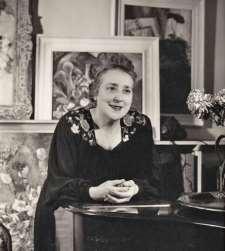

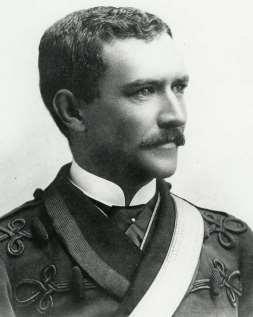



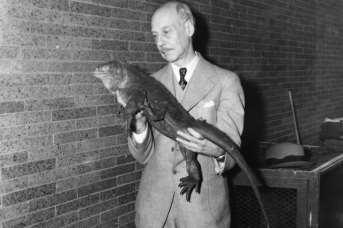

1933-1934
RAYMOND LEE DITMARS (1876-1942) - 1933-1934 speaker: “Strange Animals I Have Known.” A member, employee, and benefactor of New York Zoological Society and the Bronx Zoo whose collection is a permanent part of the Bronx Zoo natural history museum, Ditmars helped create the anti-venom centers in both the United States and Brazil and published several books, including The Reptile Book (1907), Reptiles of the World (1910), Snakes of the World (1931), Reptiles of North America (1936), Strange Animals I Have Known (1931).
RALPH DAVID (R.D.B.) BLUMENFELD (1864-1948]) - 1933-1934 speaker: "The Destiny of America and Great Britain." Blumenfeld was a journalist, writer, and newspaper editor who was at the helm of the British Daily Express from 1902 to 1932. Born in Wisconsin, he began his journalistic career working with his father before moving to the Chicago Herald in 1884. He worked for the United Press in 1885 and visited the U.K. to report on the Golden Jubilee of Queen Victoria. In 1894 Blumenfeld moved to Britain permanently and joined the Daily Mail as news editor. In 1902 he moved to the Daily Express, becoming the managing editor in 1909. Blumenfeld handed over management of the paper to his protege Beverley Baxter in 1929 and in 1932 became Chairman of its Board. He was active in politics and set up the Anti-Socialist Union and was president of the Institute of Journalists.
CLEMENCE DANE (pseudonym of WINIFRED ASHTON) (1888-1965) - 1933-1934 speaker: "Drama in Life and on the Stage.” An English novelist and playwright, Dane was educated in England, then studied art in London and Germany. She began writing while teaching at a girl’s school after World War I. She took the pseudonym "Clemence Dane" from the church, St Clement Danes on the Strand, London. She wrote more than 30 plays and 16 novels. Her first play, Regiment of Women, written in 1917, is a study of life in a girls' school. Her 1921 play, A Bill of Divorcement, the story of a daughter who cares for her deranged father, was adapted for film starring Katharine Hepburn and John Barrymore in 1932. In addition to her novels, she co-wrote screenplays, including Anna Karenina, starring Greta Garbo, and, Vacation from Marriage, released in the United Kingdom as Perfect Strangers, starring Robert Donat and Deborah Kerr, for which she won an Academy Award. She co-wrote three detective novels featuring the character Sir John Saumarez. The first, Enter Sir John, was filmed by Alfred Hitchcock in 1930 as Murder!. She is believed to be the template of Madame Arcati, the eccentric medium in her friend Noel Coward's play, Blithe Spirit.
PEREGRINE FORBES MORANT (P.F.M.) FELLOWES
(1883-1955] - 1933-1934 speaker: "The Conquest of Everest”. Born in St. Kilda, Victoria, Australia, Fellowes attended the Britannia Naval College. Beginning as a Midshipman in the Royal Navy in 1898, he progressed through promotions and service as a pilot until his retirement from the Royal Navy as a Wing Commander in 1917. Then he became active in the fledgling Royal Air Force where he began service as a Lieutenant Colonel. While leading a raid against Zeebrugge, in 1918, he was wounded, and crash landed in the North Sea. Rescued by the Germans he spent the remainder of the war as a prisoner. He was permanently commissioned as a Lieutenant Colonel in 1919. From 1920 through 1924 he saw service with the RAF in the Middle East, Palestine, and Constantinople. He surveyed and opened the world's first regular air route between Cairo and Baghdad and led the 1933 Everest Air Expedition, which made the first successful flight over Mt. Everest.
1934-1935
Thomas Craven: Modern Art
Ernest Gruening: Democracy's Challenge to Fascism and Communism
Carl E. Guthe: The Greeks of the New World Cyril Cyril A. Alington: The English Public Schools
Cyril A. Alington:
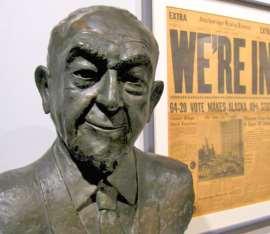

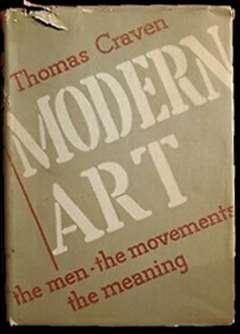

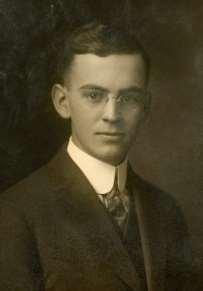

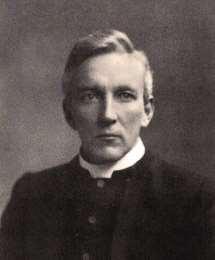

1934-1935
THOMAS CRAVEN (1888-1969) – 1934-1935 speaker: “Modem Art.” An anti-modernist art critic and historian, Craven graduated from Kansas Wesleyan University in 1908. After studying art in Paris, he settled in Greenwich Village and became acquainted with the American realist artists working there. He roomed with Thomas Hart Benton and was friends with regionalist painters John Stuart Curry, George Grosz, Reginald Marsh, and Grant Wood. In 1927 Craven published an article, "Have Painters Minds?" in H. L. Mencken's magazine The Mercury. In 1931 he published his first and most influential book, Men of Art, an art-historical survey of painting in the Western world.
ERNEST HENRY GRUENING (1887-1974) – 1934-1935 speaker: "Democracy’s Challenge to Fascism and Communism." Gruening graduated from Harvard University in 1907 and from Harvard Medical School in 1912, but became a journalist with the Boston American, the Boston Evening Herald, the Boston Evening Traveler, and the New York Tribune. After serving in World War I, he became editor of The Nation from 1920 to 1923 and the editor of the New York Post from 1923 to 1933. He then switched careers and gained several political appointments culminating in an appointment as Governor of the Territory of Alaska from 1939 to 1953. He served in the United States Senate from 1958 to 1968.
CARL E. GUTHE (1893-1974) – 1934-35 speaker: "The Greeks of the New World.” Guthe was born in Kearney, Nebraska. He received an undergraduate degree from the University of Michigan in 1914 followed by a B.A. and Ph.D. from Harvard. He became the first anthropologist on the faculty of the University of Michigan faculty in 1922 and later the first director of the Museum of Anthropology and chair of the Anthropology Department. In 1944 he was appointed Director of the New York State Museum which he headed until 1953. He then became a research associate for the American Association of Museums in Washington, visiting 500600 museums and organizations housing collections to gather data on their programs. Most of the data was lost in a fire that nearly destroyed his son’s home in 1959.
CYRIL A. ALINGTON (1872-1955) –1934-35 speaker: "The English Public Schools.” Alington was an English educator, scholar, cleric, and prolific author, who came from a long line of British clerics. He was educated at Marlborough College and Trinity College, Oxford, and was elected a fellow of All Souls College, Oxford in 1896. He was ordained as an Anglican priest in 1901. Alington’s educational career began when he became sixth-form master at Marlborough College in 1886. He moved to Eton College in 1899 and became headmaster of Shrewsbury School in 1908. In 1917 he returned to Eton as headmaster until his retirement from teaching in 1933. He became a Doctor of Divinity at Oxford in 1917 and served as chaplain to the king of England from 1921-33. He was made an honorary fellow of Trinity College, Oxford in 1926, and an honorary DCL at Durham University in 1937.
1935-1936
Asgeir Asgeirson: My Country (Iceland) and Its People
Paul Horgan: The Fault of Angels
Robert M. Hutchins: Education in Time of Crisis
Sarah Wambaugh: Europe, What Now?


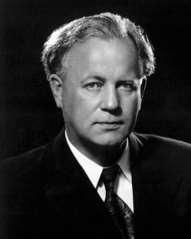

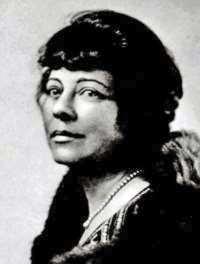

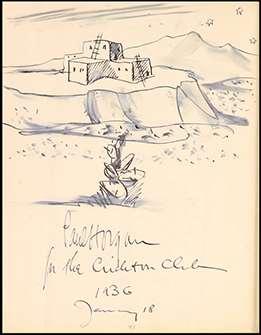

1935-1936
ASGEIR ASGEIRSON (1894-1972) - 1935-36 speaker: "My Country (Iceland) and Its People.” The second president of Iceland from 1952 to 1968, Asgeirson was educated as a theologian and graduated with honors from the University of Iceland in Reykjavik in 1915. First elected to office at the age of 29 for the Progressive Party, he became minister of Finance in 1931 and Prime Minister in 1932. Asgeirson was elected the second President of Iceland in a closely contested election in 1952. He was re-elected unopposed in 1956,1960 and 1964.
PAUL HORGAN (1903-1995) - speaker 1936-37; "The Fault of Angels." Paul Morgan was an American author of fiction and non-fiction, mostly set in the Southwestern United States. He was born in Buffalo, New York, but moved to Albuquerque, New Mexico in 1915. He attended New Mexico Military Institute in Roswell where he formed a lifelong friendship with artist Peter Hurd. Morgan enrolled in the Eastman School of Music in Rochester, New York in 1923. There he became part of a fledgling opera company that evolved within three years into a professional organization, the American Opera Company. Horgan first came to prominence when he won the Harper Prize in 1933 for The Fault of Angels. He twice won the Pulitzer Prize for History, first in 1955 with Great River: The Rio Grande in North American History and then once again in 1967 with Lamy of Santa Fe. Great River is considered a classic in the historical literature of the American Southwest. Horgan served as president of the American Catholic Historical Association at the Catholic University of America. His later years were spent as a writer in residence at Wesleyan University in Middletown, Connecticut.
ROBERT MAYNARD HUTCHINS (1899-1977) - 1935-36 speaker: "Education in Time of Crisis." Hutchins was an educational philosopher, dean of Yale Law School (1927-1929) and president of the University of Chicago (1929-1945) and its chancellor (1945-1952). Hutchins attended Oberlin College and after two years served in the U.S. Army during World War 1. After the war he attended Yale University and Yale Law School. He moved to Chicago and became president of the University of Chicago at the age of 30. He was the husband of novelist Maude Hutchins. He was an educator who criticized over-specialization and sought to balance the college curriculum and to maintain the Western intellectual tradition. He was active in forming the Committee to Frame a World Constitution (1945), led the Commission on Freedom of the Press (1946) and vigorously defended academic freedom. From 1943 until his retirement in 1974 Hutchins was chairman of the Board of Editors of Encyclopedia Britannica and a director for Encyclopedia Britannica Inc. His later books include The University of Utopia (1953) and The Learning Society (1968).
SARAH WAMBAUGH (1882-1955) - speaker 1935-36: "Europe, What Now?” Wambaugh was and American political scientist, born in Cincinnati, Ohio, the daughter of legal scholar Eugene Wambaugh. She graduated from Radcliffe College where she later taught. Wambaugh eventually became recognized as the world's leading authority on plebiscites. She was an advisor to the Peruvian government for the Tacna-Arica Plebiscite (1925-26), to the Saar Plebiscite Commission (1934-35), to the American observers of the Greek national elections (1945-46) and to the U.N. Plebiscite Commission to Jammu and Kashmir (1949). During World War II she was a consultant to the director of the enemy branch of the Foreign Economic Administration.
1936-1937
Andre Geraud: Can European Peace be Saved?
Gordon Enders: The Story of Tibet
Clifton Fadiman: Why Best Sellers Sell
E. M. Delafield: The Provincial Lady in Moscow


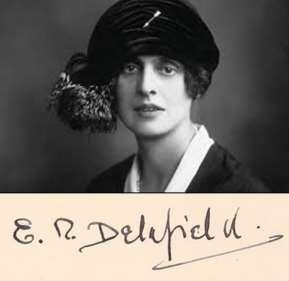
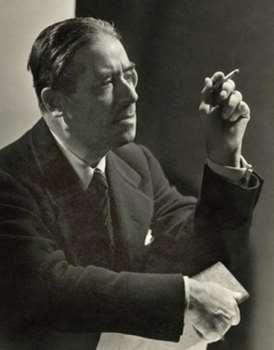

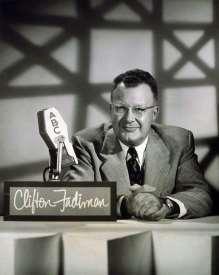

1936-1937
ANDRE GERAUD (1882- 1974) - speaker 1936-37: “Can European Peace Be Saved?” A French journalist, Geraud wrote for the “Echo de Paris ” In 1938 he started a weekly journal of his own, L'Europe Nouvell. Later in exile in America he wrote The French Rats and The Sinking Ship. Geraud used the pen name Pertinax and in 1943 published an authoritative book on his country’s betrayers, “The Gravediggers of France.”
GORDON ENDERS (1897-1978) - speaker 1936-37: "The Story of Tibet.” Enders, son of a teacher, who was born in Iowa but grew up along the India-Tibet border at the turn of the century. He recounted his adventuresome childhood in the shadow of the British incursion in Tibet in the book “Nowhere Else in the World.” He eventually established a close relationship with the Panchen Lama, becoming the only foreigner to ever be appointed to a high position in the Tibetan government. At the behest of the Panchen Lama, he flew an estimated $100 million in gold out of Tibet to fund the modernization of the country. An enterprising aviator he later became the U.S. military attaché at Kabul and one of the fathers of the Afghan air force.
CLIFTON FADIMAN (1902-1999) - 1936-37 speaker: “Why Best Sellers Sell.” This New York native was a prime example of a witty and elegant intellectual, author, and radio/ television personality. He is best-known as host of the erudite quiz show “Information, Please.” Son of Russian immigrants, graduate of Columbia University (1925), his encyclopedic mind propelled him in numerous literary directions: chief editor at Simon & Schuster, editor of The New Yorker’s book review section, and judge for Book of the Month Club. He wrote thirteen books and over twenty anthologies. He co-wrote The Lifetime Reading Plan. He was adept at bringing great literature to the masses and was honored in 1993 with a National Book Award for his contributions to American letters.
E. M. DELAFIELD (1890-1943) - 1936-37 speaker: “The Provincial Lady in Moscow.” Properly named Edmee Elizabeth Monica Dashwood this prolific English author was regarded by some as successor to Jane Austen. Bom into wealth and privilege, she delighted in describing with “delicious humor” the affluents’ lives of comic desperation. Although best known for the Diary of a Provincial Lady series, she wrote thirty-six books, four short stories and two plays. She sought experiences beyond her country estate: as a novitiate in a convent and as a laborer on a pre-war Soviet collective farm.
Mai-Mai Sze: Modern Woman in China
1937-1938
Victor Heiser: More of an American Doctor's Odyssey
John Langdon-Davies: Behind the Spanish Barricades
Sinclair Lewis: It Has Happened Here


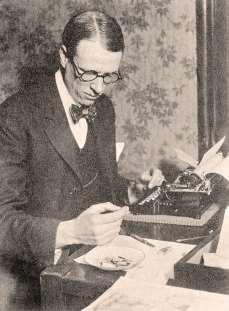

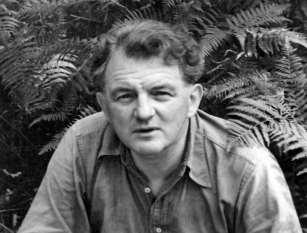

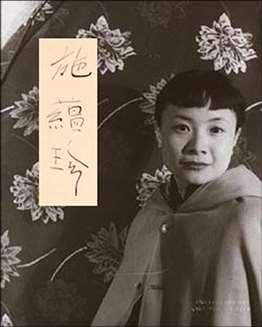
1937-1938
MAI-MAI SZE (1909-1992) - 1937-38 speaker: “Modern Woman in China.” Mai-Mai Sze achieved a significant level of accomplishment as a painter, author, actress, and advocate for Chinese humanitarian relief. The daughter of a Chinese ambassador to England and the United States, she spent her childhood in Great Britain and Washington, D.C. She was a 1931 graduate of Wellesley College. Her landscapes were exhibited in New York and European galleries, and she wrote a book about Chinese painting which is still referenced today. The Tao of Painting (1956). In the mid-1930’s she appeared in a popular Broadway show “Lady Precious Stream.” In the 1940’s her book China depicted her ancestral home, and she lectured extensively about China and the needs of its people. She was a well-known columnist for the New York Post, a book reviewer for the New York Times and a contributor to national magazines. She wrote two more books, her autobiography, Echo of a Cry: A Story Which Began in China, and a novel, Silent Stream
VICTOR G. HEISER (1873-1972) 1937-38 speaker: “More of an American Doctor’s Odyssey.” Orphaned at 16 when his parents perished in the 1889 Johnstown, Pennsylvania flood, he managed to complete his medical training at Philadelphia’s Jefferson Medical College. Ultimately, he became a world-renowned epidemiologist consulted on control of tropical diseases: leprosy, malaria, yellow fever, cholera, beriberi, hookworm, and other intestinal parasites. Heiser served as US Director of Health in the Philippines from 1905-1915 during which time he pioneered the mass treatment of lepers and enforced smallpox vaccinations. His best-selling autobiography “American Doctor’s Odyssey” (1936) documented his adventures in 45 countries and his 17 circumnavigations of the globe. As Associate Director of the International Health Division of the Rockefeller Foundation he promoted the idea that good nutrition decreased the handicaps of disease and lengthened lives. He lived to a ripe 99 years! His will established the Heiser Grant that contributes to research on the control of leprosy.
JOHN LANGDON-DAVIES (1897-1971) - 1937-38 speaker: “Behind Spanish Barricades.” Langdon- Davies was born in Zululand, now South Africa and educated in England. He became known as a British journalist, war correspondent during the Spanish Civil War, and author of 44 books. A man of boundless curiosity, his book subjects ranged from military, scientific, historical, and Spanish themes to studies on women and sex. In the early 1960’s Langdon-Davies created a series of history learning aids for schoolchildren. He founded Plan International, a refugee child sponsorship charity.
SINCLAIR LEWIS (1885-1951) 1937-38 speaker: “It Has Happened Here.” Third son of a country doctor in a Minnesota prairie village, Lewis’s early provincial life colored his writings. Though known as a social critic, his basic view of the “American human comedy” was optimistic. His total output was 22 novels and three plays. He is best known for his novel Main Street (1920), a satirical work pitting idealism against reality in a narrowminded small town. He was the first American to be awarded the Nobel Prize for Literature in 1930. Lewis was educated at Oberlin Academy and Yale University where he received his M.A. in 1908. His wide-ranging experiences included taking a cattle boat to England, seeking work in the Panama Canal Zone and even working as a janitor in Upton Sinclair’s socialist commune. That same restlessness played out in high living, heavy drinking, and multiple wives. His only son, Wells, was killed in France in World War II combat. Lewis died in Europe from complications of alcoholism.
Sinclair Lewis proclaimed the audience to be a bunch of "stuffed shirts" and then charmed a group of male members into late-night drinks at one of the favorite masculine retreats in town.
1938-1939
Paul Van Zeeland: How Can International Disorganization Be Remedied?
Bhicoo Batlivala: Influence of the West on Ancient Indian Culture
John Gunther: Inside Europe Now
Andre Maurois: French Wit, English-American Humor
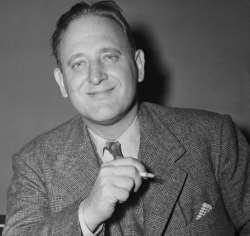



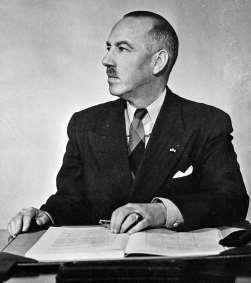



1938-1939
PAUL VAN ZEELAND (1893-1973) - 1938-39 speaker:
“How Can International Disorganization Be Remedied?”
Shown on a cover of TIME magazine in June,1937, van Zeeland was a Belgian lawyer, economist, Catholic politician, and statesman. He served as law professor and later director of the Institute of Economic Science at the Universite Catholique de Louvain. In 1935 he became 29th Prime Minister of Belgium where his measures helped abate an economic crisis. During his second term, Belgium adopted a policy of neutrality. In post-World War II, he oversaw repatriation of displaced Belgians, served as Belgium’s Minister of Foreign Affairs and was an economic advisor to Belgian government and NATO’s Council of Ministers. Van Zeeland was one of the founders of the European League for Economic Cooperation.
BHICOO BATLIVALA (1911- 1983) - 1938-39 speaker:
“Influence of the West on Ancient Indian Culture.” An Indian female anti-British colonialism activist, she undertook a U.S. lecture tour from November 1939 to September 1943 to address the issues of British occupation of her homeland. She was educated in England, studying law, and was called to the bar at age 21. After practicing law for two years in England, she returned to India to serve as personal assistant to the Minister of Education in the State of Baroda. A 1939 Washington Post article quotes her as saying: “If Gandhi dies, revolt is near.”
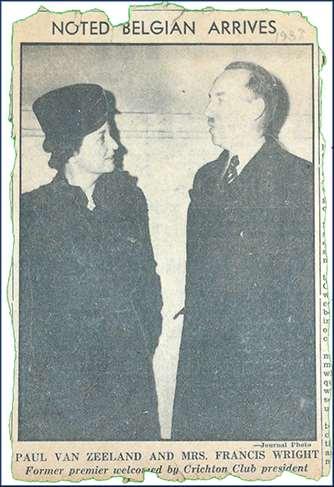
JOHN GUNTHER (1901-1970) - 1938-39 speaker: “Inside Europe Now. This hometown native was a Phi Beta Kappa at The University of Chicago where he was literary editor of the student newspaper. That experience led to an extended career with the Chicago Daily News. Gunther covered its London bureau during crucial years: “I saw firsthand the whole extraordinary panorama of Europe from 1924-1936” during which he accessed every country on the continent except Portugal. It was a time when three totalitarian dictators were seizing power. Gunther’s success came in 1940’s and 50’s with a series of a dozen popular sociopolitical works known as the “inside” books. He also wrote eight novels, three biographies and several children’s books. Now he is best known for his wrenching memoir Death Be Not Proud about the death of his teenage son from a brain tumor. For a year he hosted an ABC travelogue called “John Gunther’s High Road. ”
ANDRE MAUROIS (1885-1967) - 1938-39 speaker: "French Wit, English American Humor.” Born Emile Salomon Wilhelm Herzog, he was a French author of novels, biographies, histories, and children’s books. In World War I he joined the French army. His first novel, The Silence of Colonel Brambel was an account of that experience and was an immediate success as were his biographies of Disraeli, Byron, and Shelley. In World War II he served as the French Official Observer attached to the British General Headquarter. He wrote of the experience in his book, Tragedy in France. "Andre Maurois” was a pseudonym that became his legal name in 1947.
1939-1940
Ernest A. Hooten: An Anthropologist Looks at the Belligerants
Alfred Duff Cooper: The Survival of Liberty
Irwin Edman: Fashions in Ideas
Hugh Gibson: An American Diplomat's Approach to Present European Problems

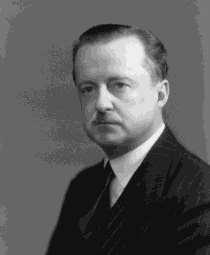

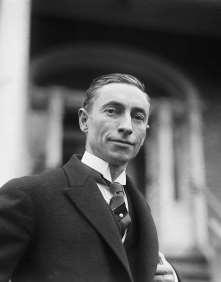

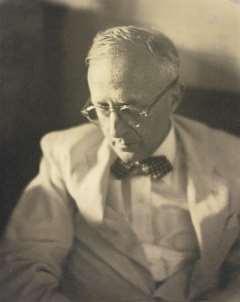

1939-1940
ERNEST A. HOOTON (1887-1954) - 1939-40 speaker: "An Anthropologist Looks at the Belligerents." Hooton was a physical anthropologist, known for his work on racial classification. He was so popular as a professor that he attracted a large number of students, and established Harvard as the center for physical anthropology in the United States. He taught there until his death in 1954. Many of Hooton’s research projects were based on his training in physical anthropology and focused on physiological variations between individuals. The "Harvard Fanny Study" involved measuring body proportions to make more comfortable chairs for the Pennsylvania Railroad. A gifted cartoonist and wit, his popular volumes included, Up from the Apes and Apes, Men and Morons
ALFRED DUFF COOPER (1890-1954) - 1939-40 speaker: "The Survival of Liberty." Viscount Norwich was a British Conservative politician, diplomat, and author. Known as Duff he enjoyed a typical gentleman’s upbringing. He was a descendant of King William IV. At Oxford, he was part of a famous circle of young aristocrats and intellectuals known as The Coterie. He served in many political posts including War Secretary in 1935. In 1944 he became ambassador to France and left office in 1947 when knighted. Cooper concentrated on writing literature until his death in 1954. Duff had quite a colorful life and cultivated a reputation for both eloquence and fast living. Diana Cooper accompanied her husband.
IRWIN EDMAN (1896-1954) - 1939-1940 speaker; “Fashions in Ideas.” An American professor of philosophy, Edman attended Columbia University, earning his bachelor’s degree in 1917 and his Ph.D. in 1920. He became professor and head of the philosophy department at Columbia, and was a visiting lecturer at Oxford, the Sorbonne, the London Athenaeum, Amherst College, University of California, Harvard University, and Wesleyan University. He frequently contributed to literary magazines and in 1953 was elected vice president of the National Institute of Arts and Letters.
HUGH S. GIBSON (1883-1954) - speaker 1939-40: "An American Diplomat’s Approach to Present European Problems." A career diplomat and career humanitarian, Gibson was actively involved in disarmament talks from 1925 to 1932. He was a leading proponent in the drive to establish a professional Foreign Service based on merit. Gibson was active in famine relief work in Europe during and after World War I, and pursued these efforts during and after World War II. His close friendship with Herbert Hoover began in this context. He retired from the foreign service in 1938 and worked in London for the Commission for Relief in Belgium. He then returned to the United States and went into publishing. After World War II he published among other things the journals of Joseph Goebbels, Galeazzo Ciano, and Ulrich von Hassell. The last years of his life were spent running the Intergovernmental Committee for European Migration in Geneva.
FYI
In 1940 the club constitution was revised.
1940-1941
H. R. Knickerbocker: At the Ringside of History
Margaret Webster: Shakespeare without Tears
William L. Shirer: German Today
Robert A. Millikan: Science and War
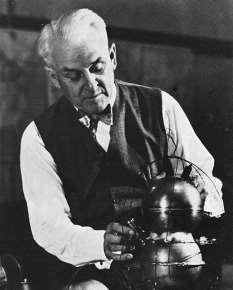



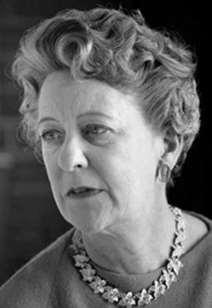

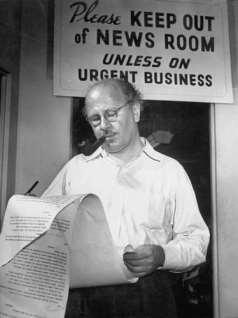

1940-1941
H. R. KNICKERBOCKER (1898-1949) -1940-41 speaker: “At the Ringside of History.” Hubert Renfro Knickerbocker was a brilliant American journalist who studied at Columbia University (1919-1920) where his papers are permanently archived. A veteran foreign correspondent, he covered nearly every war front in the world while working for the Chicago Sun, Philadelphia Public Ledger, New York Evening Post and W.R. Hearst’s International News Service. In 1931 he was awarded a Pulitzer Prize for a series of articles on the 5Year Plan in Russia. Knickerbocker authored seven books, best-known of which are, Danger Forward, Is Tomorrow Hitler’s? 200 Questions on the Battle of Mankind In 1949, at age 51, he was killed in an air crash in Jakarta, Indonesia.
MARGARET WEBSTER (1905-1972) - 1940-41 speaker: "Shakespeare without Tears." Margaret Webster was born in New York City, the daughter of two famous actors, Ben Webster and Dame May Whitty. She became well-known in the theatre as an actress, producer, and director. Her production of Othello ran for 296 performances, the longest run of a Shakespearean production on Broadway. She and her partner, actress Eva La Gallienne, co-founded the American Repertory Theatre in 1946. In 1950, she became the first woman to direct the New York City Opera.
WILLIAM LAWRENCE SHIRER (1904-1993) – 1940-41 speaker: “Germany Today.” Shirer was an American journalist and historian who was hired in 1937 by Edward R. Murrow to report on Germany for CBS radio broadcasts. As German censors increasingly restricted his reporting, he discovered that the Gestapo was about to move against him and fled in 1940. Shirer smuggled his diaries out of Germany and used them to write Berlin Diary (1941), which provides a first-hand account of events inside the Third Reich. He is best known for his 1960 comprehensive work, The Rise and Fall of the Third Reich.
ROBERT A. MILLIKAN (1868-1953) - 1940-41 speaker: "Science and War”. Robert A. Millikan was an American experimental physicist. Born in Iowa, Millikan received a bachelor’s degree in classics from Oberlin College and was the first to earn a doctorate in physics from Columbia University. During WW I, Millikan was Vice Chair of the National Research Council and helped in the development of anti-submarine and meteorological devices. In 1923, Millikan won a Nobel Prize for his measurement of the charge of the electron and for his work on the photoelectric effect. From 1921 to 1945, Dr. Milliken also served as President of Cal Tech.
During World War II there was a dearth of speakers and unpredictable revenue, which led the Board to consider whether the Club should disband or suspend meetings for the time being. The president, Mrs. Stanley Johnson (1944-1946), asked for the opinion of Board members. Mr. Samuel Prescott Bush (grandfather of President George H.W. Bush and great grandfather of President George W. Bush) stated that "the Crichton Club is unique in character and an outstanding organization in the city, and although I recognize the serious handicaps of trying to maintain the quality of past meetings, I should hate to see the Club suspend for even a brief space of time." His feeling was shared by others and the Club decided to weather the storm. Until the end of the war, supper was served only after the final meeting of the year. During these lean years, the question of doing without the meal became a topic for discussion but was quickly dismissed due to the consensus that it would be a mistake to dispense with such an important part of the program.
1941-1942
Hugh R. Wilson: America's Role in the World Crisis
J. R. Ybarra: Friends and Foes in Latin America
Hallett Abend: How We Can Beat the Japanese
Margaret Bourke-White: Lenses Behind the News
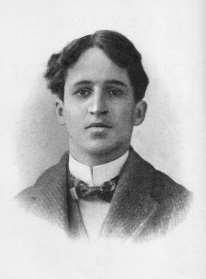

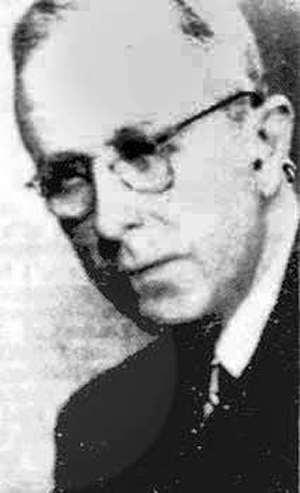

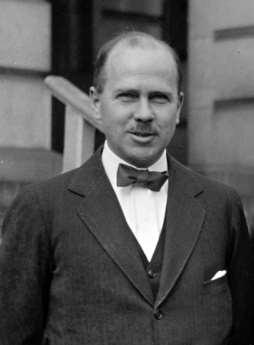



1941-1942
HUGH R. WILSON (1885-1946) - 1941-42 speaker: "America's Role in the World Crisis." Hugh R. Wilson was a career diplomat for the United States; his highest post was as Ambassador to Germany (1938-39), following which he served as Advisor to the Secretary of State until his retirement in January 1941. Wilson authored two books: Education of a Diplomat (1938) and Diplomat Between Wars (1941). He was uniquely qualified to speak on this topic in November 1941 because his earlier assignments included responsibilities with the American embassies in Berlin (1920-21) and Tokyo (1921-23).
THOMAS RUSSELL YBARRA (1880-1971) – 1941-42 speaker: “Friends and Foes in Latin America.” Ybarra was a Venezuelan-born American journalist and traveler who spent his youth in Caracas ad Boston. Knowledgeable about the culture of both Latin America and the United States, he wrote biographies, magazine articles, criticism, and film reviews.
HALLETT ABEND (1884-1955) -1941-42 speaker: “How We Can Beat the Japanese.’’ American journalist Hallett Abend was born in Oregon. As a correspondent for The New York Times, Abend lived in China from 1926-1941 and wrote extensively on relations between China and Japan. In 1938, Abend’s reports of the massacre in Nanking by the Japanese, shocked both readers and politicians. In 1940, two Japanese agents broke into Abend’s luxurious Shanghai apartment, where they robbed and tortured the journalist. Abend’s books include Japan Unmasked (1941), Pacific Charter: Our Destiny in Asia (1943), and My Life in China, 1926-1941 (1944).
MARGARET BOURKE-WHITE (1904-1971) - 1941-42 speaker: "Lenses Behind the News." Bourke- White graduated from Cornell University in 1927 and opened a commercial photography studio in Cleveland. Henry Luce was attracted to her photos and hired her to work for Fortune and then Life magazines. During World War 11 she was the first female correspondent allowed in the combat zones. Her photos taken during the Depression and in India and Pakistan are renowned. She is considered the first female photojournalist.
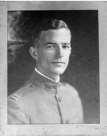
Florence Jeffrey, our 10th president and her husband, Malcom, are remembered today for their former home, the current governor’s mansion. Malcom’s company founded one of the first industrial infirmaries in the country for free medical care for employees, a cooperative store, an employee cafeteria, and a program which assisted employees in buying homes for their families. During World War I, he organized and led a unit of troops composed of employees of the Jeffrey company.


1942-1943
Walter Duranty: When East Meets West in Battle
Francis B. Sayre: The Road Forward
Hermann Rauschning: The Secret Aim of National Socialism
Cornelia Otis Skinner: Character Sketches
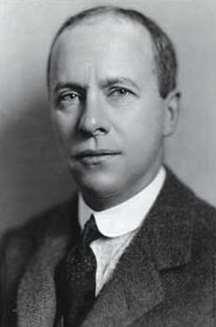



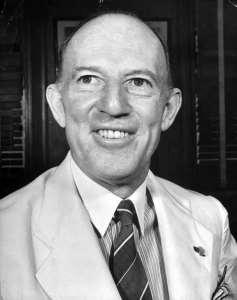
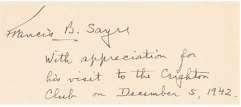
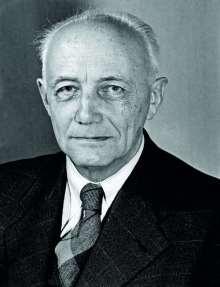

1942-1943
WALTER DURANTY (1884-1957) 1942-43 speaker: "When East Meets West in Battle." Duranty was a British born journalist who worked at the New York Times Moscow bureau chief from 1922-36. He received the Pulitzer Prize in 1932 for stories he wrote about the Soviet Union. In later years he was criticized for his favorable portrayals of Stalin and for not reporting the famine in the Ukraine. In 2003 the Pulitzer committee did not rescind the award because Duranty did not deliberately deceive.
FRANCIS B. SAYRE (1885-1972) - 1942-43 speaker: "The Road Forward." Francis Sayre was a professor at Harvard Law School where he taught international, maritime, and criminal law. His was the first course on labor law offered in any law school. He later served as ambassador to Siam, High Commissioner of the Philippines, U.S. Representative to the United Nations Trusteeship Council, and Assistant Secretary of State for Franklin Roosevelt. He married the daughter of President Woodrow Wilson at a ceremony at the White House.
HERMANN RAUSCHNING (1887-1982) - 1942-43 speaker: "The Secret Aim of National Socialism.” Rauschning was a prominent public official in Danzig, Poland, after the Great War. He became a harsh critic of alleged mistreatment of Prussian Germans by the Polish government established by the Treaty of Versailles. His strong opinions and words drew him to Nazism which he embraced in 1932. Once a prominent part of Hitler’s movement, he became so disenchanted that he renounced his membership and, fearing for his safety, fled Danzig in 1934. Moving from Switzerland to France and then to Great Britain in the late 1930’s, he came to the U.S. in 1941, where he directed his energies to warning Americans of the Nazi threat.
CORNELIA OTIS SKINNER (1899-1979) - 1942-43 speaker: "Character Sketches." The child of two theatrical parents, Cornelia Otis Skinner became a well-known writer and actress in both film and television in the 1950’s. In the late 1920s, she wrote and presented several character sketches in a highly regarded onewoman performance which toured widely. This experience was, presumably, the inspiration for her appearance at Crichton Club. One of her better-known books. Our Hearts Were Young and Gay, was published in 1942. She was a renowned character actress and a gifted writer of humor and social commentary.
Otto Tolischus: History in Action
1943-1944
Michael Karpovich: Russia and the Postwar World
Robert St. John: The Balkans, Powder Keg of Europe
Alexander Loudon: Some Postwar Problems
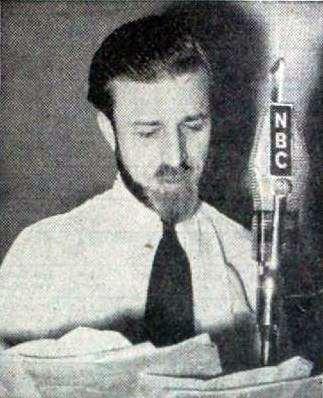
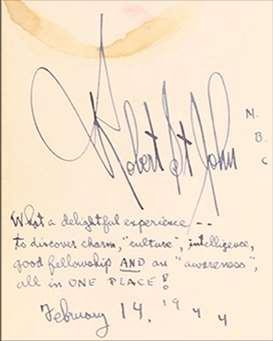


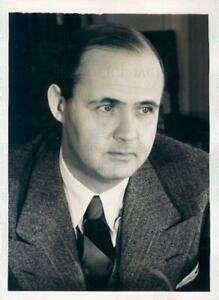



1943-1944
3-1944
OTTO D. TOLISCHUS (1890-1967) - 1943-44 speaker: "History in Action.” Tolischus was a Prussian-Lithuanian-born journalist at the New York Times and winner of the 1940 Pulitzer Prize for Correspondence for his writing in Berlin during World War II. He emigrated to the United States in 1907 where he attended the Columbia School of journalism. In 1923, he returned to Europe, working for Universal Service in Berlin until 1931 and for International News Service in London from 1931 to 1932 as chief correspondent. After returning to the U.S., he joined the Berlin bureau of the New York Times in 1933 where he chronicled the rise of Nazi Germany until he was expelled in March 1940. In 1941, Tolischus was assigned to Tokyo. A few hours after the Japanese attack on Pearl Harbor he was arrested and imprisoned for five months. He was sent to the U.S. as part of a prisoner exchange in 1942. He wrote three books on World War II; They Wanted War, Tokyo Record, and Through Japanese Eyes
MICHAEL KARPOVICH (1888-1957) - 1943-44 speaker: "Russia and the Postwar World" Michael Karpovich, a historian and writer, taught at Harvard University from 1927-1957, during which time he exercised the most profound influence upon the field of Russian studies in North America. Karpovich came to the United States during World War I as a representative of Russia's short-lived Provisional Government. He had an advanced degree from Moscow University with additional studies at the Sorbonne. The Bolshevik takeover in November 1917 might have deprived him of a job, but the ambassador’s optimism kept him in the embassy for five years. He returned to his historical profession when he was summoned to teach courses in Russian history at Harvard.
ROBERT ST. JOHN (1902-2003) - 1943-44 speaker: "The Balkans, Powder Keg of Europe." Robert St. John was a globetrotting journalist and prolific author. Born in Chicago, St. John lied about his age and joined the Navy to fight in World War 1. After expulsion from Trinity College for excesses as a student journalist, St. John became publisher of The Cicero Tribune. St. John joined the Associated Press and in the 1930’s worked in the AP bureau in Budapest. St. John reported from the Balkans until he was wounded during a German attack. Returning to the U.S., St. John wrote The Land of the Silent People (1942), which became a bestseller. St. John then worked for NBC Radio, heading its London bureau before returning to the U.S. to broadcast general war news. St John also wrote. The Silent People Speak (1948) and eight books about the Middle East.
ALEXANDER LOUDON (1893-1953) – 1943-44 speaker: “Some Postwar Problems.” A career Dutch diplomat, Loudon became the ambassador to Washington of the London[based Dutch government in exile under Queen Wilhelmina. During the war he wrote and lectured frequently on post-war planning.
Reinhold Niebuhr: The End of an Era
Maria Osmena: The Heart of the Philippines
1944-1945
Frank Lloyd Wright: The Architecture of Democracy
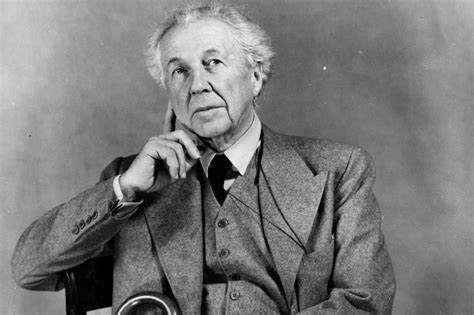



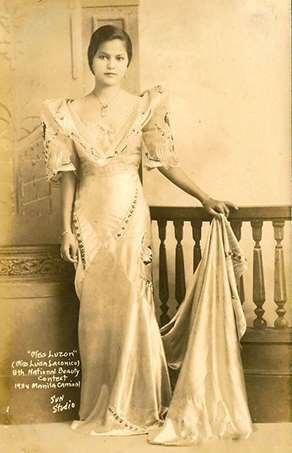

1944-1945
REINHOLD NIEBUHR (1892-1971) - 1944-45 speaker: "The End of an Era.” Karl Paul Reinhold Niebuhr was an American theologian. During his work as a pastor in Detroit, he was troubled by the demoralizing effects of industrialism on workers and became an outspoken critic of Henry Ford. He allowed union organizers to use his pulpit to deliver their message on workers' rights. Niebuhr also spoke out against the Ku Klux Klan, which had become a powerful force in Detroit in the 1920s. Niebuhr wrote about his experience in his Detroit church in Leaves from the Notebook of a Tamed Cynic (1930) and served as editor of the magazine Christianity in Crisis. In his 1933 article in the Christian Century, he attempted to sound the alarm within the Christian community over Hitler’s annihilation of the Jews. The earliest known version of the “Serenity Prayer” is attributed to Niebuhr.
MARIA OSMENA CHARNLEY (1917-2006) - 1944-45 speaker: “The Heart of the Philippines” Daughter of former President of the Philippines, Sergio S. Osmena (1944-46), she was a scholar and musician. She undertook lecture tours to acquaint U.S. citizens with the state-of-affairs in her homeland. She married an American musician, James Milne Charnley of Cleveland, Ohio.
FRANK LLOYD WRIGHT (1867-1959) - 1944-45 speaker: "The Architecture of Democracy." Frank Lloyd Wright was an American architect, interior designer, writer, and lecturer. During a remarkable 70-year career, he designed more than 1,000 projects resulting in some 500 completed works. Among his best-known innovative buildings are New York's Guggenheim Museum, Fallingwater in Pennsylvania, and Chicago's Unity Temple. He pioneered the Prairie School of architecture and developed the Usonian concept of democratic, affordable housing for everyday American citizens. He was recognized in 1991 by the American Institute of Architects as "the greatest American architect of all time."
Wright could not keep from making disparaging remarks about Columbus architecture and annoyed people with the flippancy with which he answered young listeners' serious questions. He did redeem himself a bit by showing his weakness for the lobster Newburg served at the buffet dinner.
R.V.C. Bodley: The Truth About the Arabs
1945-1946
Owen Lattimore: A Practicable Treatment of Japan
John Farrar: The Development of American Writing Between Two Wars
Henry Cabot Lodge, Jr.: The National Outlook
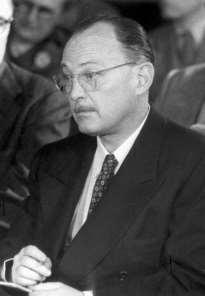



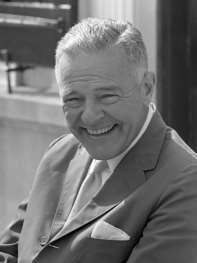


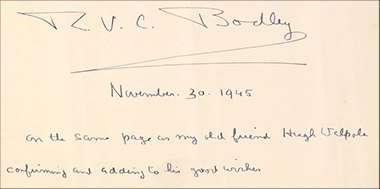
1945-1946
SIR R.V.C. (RONALD VICTOR COURTENAY) BODLEY, (1892-1970) - 1945-46 speaker: The Truth About the Arabs.” Bodley was a descendant of Sir Thomas Bodley, founder of the Bodleian Library, Oxford, and son of author John Edward Courtenay Bodley. After living with Algerian Nomads for seven years, he authored numerous works, most notably, Gertrude Bell, (1940), Wind in the Sahara, (1944), The Messenger: The Life of Mohammed, (1946), and The Warrior Saint (1953)
OWEN LATTIMORE (1900-1989) - 1945-46 speaker: “A Practicable Treatment of Japan.” Lattimore was an American author, educator, and scholar of Central Asia who, during WWII, was an influential advisor to Chiang Kai-shek and to the American government. Accused in 1950 by Senator Joseph McCarthy of being a Marxist and Russian espionage agent, the following years of Congressional investigations and controversy ended both Lattimore’s American career and influence.
JOHN CHIPMAN FARRAR (1895-1974) - 1945-46 speaker: “The Development of American Writing Between Two Wars.” Known in literary circles for founding and directing the Bread Loaf writing conference at Middlebury College in 1926, Farrar, already a seasoned publisher, went on to found the publishing house in 1945 that would become Farrar, Straus & Giroux.
HENRY CABOT LODGE, JR. (1902-1985) – 1945-46 speaker: “The National Outlook.” Lodge, a graduate of Harvard, spoke to Crichton Club between his two terms as a Republican Massachusetts Senator. He had resigned to return to active duty during World War II. He later lost his senatorial seat to John F. Kennedy. He then served as the U.S. ambassador to the United Nations, Vietnam, and the Vatican. He was the Republican nominee for Vice President in the 1960 Presidential election.
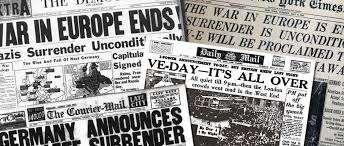

1946-1947
Walter Duranty and Debate: Can Russia Be Part of One World?
H.R. Knickerbocker: At the Ringside of History
Sumner Slichter: The Problem of Industrial Relations
Eve Curie: France in the Postwar World


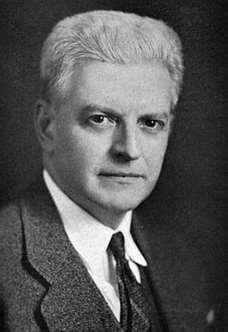

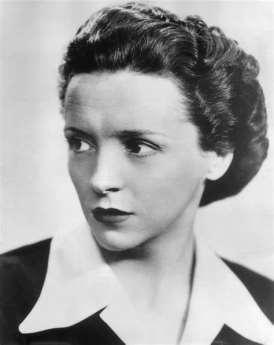

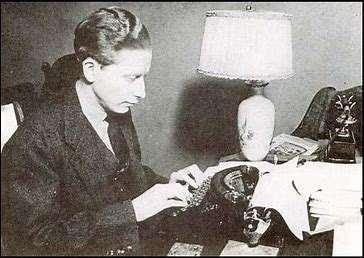

1946-1947
WALTER DURANTY (1884-1957) - 1946-47 speaker: "Debate: Can Russia Be Part of One World?” Duranty was a British born journalist who worked at the New York Times Moscow bureau chief from 1922-36. He received the Pulitzer Prize in 1932 for stories he wrote about the Soviet Union. In later years he was criticized for his favorable portrayals of Stalin and for not reporting the famine in the Ukraine. In 2003 the Pulitzer committee did not rescind the award because Duranty did not deliberately deceive.
H. R. KNICKERBOCKER (1898-1949) -1940-41 speaker: “At the Ringside of History.” Hubert Renfro Knickerbocker was a brilliant American journalist who studied at Columbia University (1919-1920) where his papers are permanently archived. A veteran foreign correspondent, he covered nearly every war front in the world while working for the Chicago Sun, Philadelphia Public Ledger, New York Evening Post and W.R. Hearst’s International News Service. In 1931 he was awarded a Pulitzer Prize for a series of articles on the 5Year Plan in Russia. Knickerbocker authored seven books, best-known of which are, Danger Forward, Is Tomorrow Hitler’s? 200 Questions on the Battle of Mankind. In 1949, at age 51, he was killed in an air crash in Jakarta, Indonesia. He also spoke in 1940-41.
SUMNER HUBER SLICHTER (1892-1959) - 1946-47 speaker: “The Problem of Industrial Relations.” Slichter was an American economist and the first Lament University Professor at Harvard University. He was considered by many to be the pre-eminent labor economist of the 1940’s and 1950’s. A regular lecturer and contributor to magazines, he was arguably the best-known economist in America at the peak of his career. Slichter’s textbook, Modern Economic Society, was a standard introductory economics textbook in America before 1950.
EVE CURIE (1904-2007) - 1946-47 speaker: “France in the Postwar World.” Eve Curie Labouisse was a French- American author and writer. She was the second daughter of Marie and Pierre Curie and wrote an acclaimed biography of her mother, Madame Curie. She was a journalist with the International Herald Tribune, publishing Journey Among Warriors, about her travels in WW ll. She returned to Paris after the war, and was co-publisher of a daily afternoon paper, Paris-Press. She was appointed a special adviser to the Secretary General of NATO in 1952 and served on NATO's international staff until she married Henry Richardson, U.S. Ambassador to Greece, in 1954.
1947-1948
Harlow Shapley: The One World of Science
Herbert Agar: England Today
Cord Meyer, Jr.: World Federation or World War III?
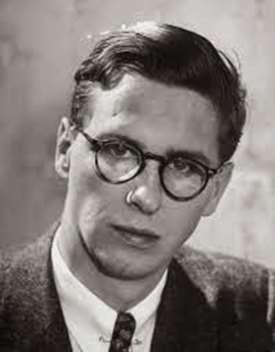

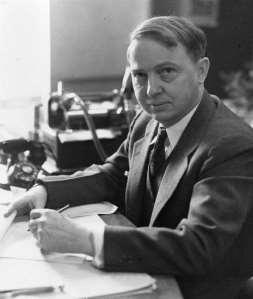



1947-1948
HARLOW SHAPLEY (1885 - 1972) - 1947-48 speaker: "The One World of Science." Shapley, an American astronomer, was born on a farm in Missouri. He graduated from the University of Missouri and went on to Princeton with a graduate fellowship. He was the first astronomer to realize the Milky Way was much larger than believed. He served as director of the Harvard College Observatory from 1921-1952. Shapley was a founding member of the National Science Foundation. He had a lifelong interest in myrmecology, the study of ants. A crater on the moon is named after him.
HERBERT AGAR (1897-1980) - 1947-48 speaker: “England Today.” Herbert Agar was an American journalist and editor of the Louisville Courier-Journal. Agar was known as a strong proponent of an Americanized version of the British distributist socioeconomic system, a system in which, “...private property is well distributed and as many people as possible are owners.” Agar won a Pulitzer Prize in 1934 for his book, The People’s Choice, about the American Presidency. Other Agar books include Land of the Free (1935), The Pursuit of Happiness: The Story of American Democracy (1938), and The Darkest Year- Britain Alone, June 1940-June I94I (1973).
CORD MEYER, JR. (1920-2001) - 1947-48 speaker: “World Federation or World War III?” The son of an extremely wealthy and influential family. Cord Meyer, Jr. was educated at Yale University. Upon graduating he fought with the Marines in World War II and shared these experiences writing for The Atlantic Monthly. After the war Meyer was a strong advocate of world government and helped found the United World Federalists. In 1949, Meyer began working for the Central Intelligence Agency (CIA), where he held various posts including London station chief, head of international organizations division, and as head of the Covert Action Staff. In 1977, Meyer became a syndicated columnist and wrote several books, including The Search of Security (1947), Peace or Anarchy (1948), and Facing Reality: from World Federalism to the CIA (reprint, 1982).
Norman Cousins: The Siege of Berlin
Robert Magidoff: Report on Russia Today
Finn Ronne: Antartica Adventure
1948-1949
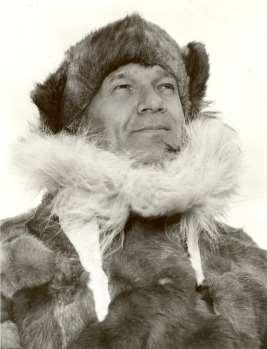



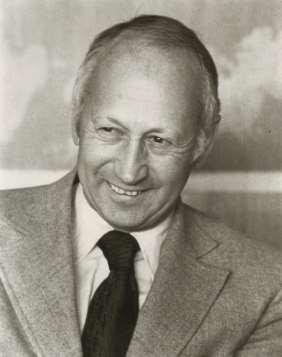

1948-1949
NORMAN COUSINS (1915-1990) - 1948-49 speaker: “The Siege of Berlin.” An American journalist, author, professor and world peace advocate, Cousins was educated at Columbia University. In 1934, Cousins began his journalism career at the “New York Evening Post”, now the “New York Post.” The following year, Cousins joined “Current History” as book critic and later became managing editor. In 1940, Cousins joined the “Saturday Review” where he was editor-in-chief until 1972. Under his direction, the Review grew in circulation from 20,000 to 650,000. Cousins was a strong advocate of nuclear disarmament and world peace and used diplomatic means to ease tensions between philosophically divided powers. Cousins also wrote several books on these topics including, Who Speaks for Man? (1953). In 1963 Cousins was awarded the Eleanor Roosevelt Peace Award and received U.N. Peace Medal in 1971.
ROBERT MAGIDOFF (1905-1970) 1948-49 speaker: "Report on Russia Today." Magidoff was a “World News” correspondent for McGraw Hill in Moscow when he was accused by his secretary of spying for the United States. He wrote a book in 1948 called In Anger and Pity: A Report on Russia, detailing his ordeal. A later book was entitled The Kremlin vs.The People.
FINN RONNE (1899-1980) - 1948-49 speaker: “Antarctica Adventure.” Ronne, bom in Norway, was a U.S. Antarctic explorer. He took part in two of Richard E. Byrd's expeditions to the South Pole. In 1939 Ronne served as Byrd's executive officer helping discover 1,000 miles of new coastline. The Ronne Antarctic Research Expedition from 1946 to 1948 mapped and explored the Weddell Sea coastline. Ronne covered 3,600 miles by ski and dog sled more than any other explorer in history. He became the scientific and military leader for a U.S. Weddell Sea base in the 1950s. He wrote several books on Antarctica and many scientific papers on Antarctic research.
1949-1950
Mark F. Ethridge: The Middle East
Mary Garden: Music: Yesterday and Today
David E. Lilienthal: Atomic Energy for Peace


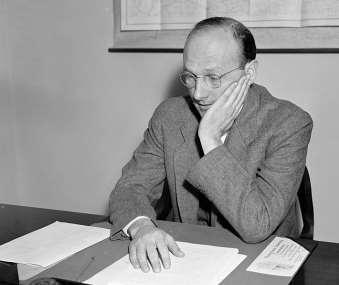

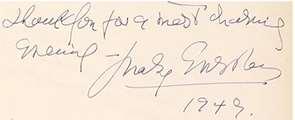
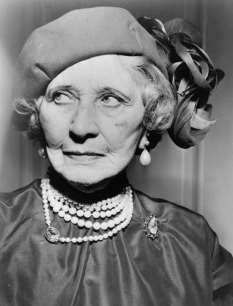

Mary Garden
1949-1950
MARK F. ETHRIDGE (1896-1981) - 1949-50 speaker: "The Middle East.” Mark Ethridge was a journalist who served as the editor and publisher of the “Louisville Courier Journal”, as the editor of “New York Newsday”, and as an instructor in journalism at the University of North Carolina. He wrote about various social and political issues of his time, including race relations, economic development, elections, freedom of the press, World War II, the Cold War, the creation of Israel, the spread of Communism. Ethridge was the U.S. delegate to the first peace conference relating to Palestine, which was held in Lausanne, Switzerland. When the peace talks ended in failure, Ethridge, in a top-secret report to the State Department, placed the primary blame on Israel.
MARY GARDEN (1874-1967) - 1949-50 speaker: “Music - Yesterday and Today.” Garden was a ScottishAmerican operatic soprano with a substantial career in France and America in the first third of the 20th century. After success in Europe, she joined the Manhattan Opera House in New York City in 1907. From 1910-1932, Garden worked in several opera houses in Chicago. She became Director of the Chicago Civic Opera in 1923 and performed roles until 1931. After retiring from the opera stage in 1934, Garden worked as a talent scout for MGM and gave lectures and recitals up through 1949.
DAVID E. LILIENTHAL (1899-1981) - 1949-50, speaker: “Atomic Energy for Peace ” A graduate of DePauw University and Harvard Law School, David Lilienthal was a controversial U.S. public official. In 1933, Pres. Franklin D. Roosevelt appointed Mr. Lilienthal as director of the Tennessee Valley Authority, where he served as TVA Chairman from 1941-1946. From 1947 to 1949, Lilienthal chaired the U.S. Atomic Energy Commission, where he played an important role in managing relations between science and the U.S. Government. Lilienthal wrote a number of successful books, including, TVA: Democracy on the March (1944), This I Do Believe (1949), Big Business: A New Era (1953), and Change, Hope and the Bomb (1963). Lilienthal was skillful in his use of words and invented the term, “multinational corporation.”
1950-1951
Edith and Osbert Sitwell: Readings from Their Own Poems
Arthur Schlesinger, Jr.: The Crisis of Our Time
James Michener: The Real South Pacific
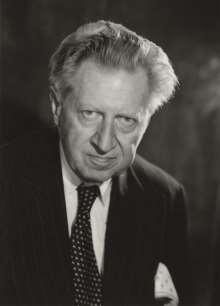

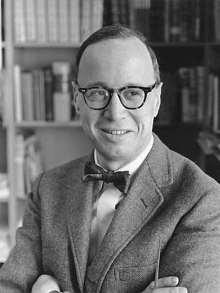



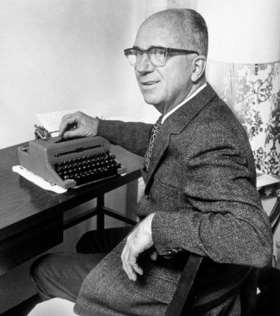

1950-1951
OSBERT SITWELL accompanied his sister, Dame Edith.
DAME EDITH SITWELL DBE (1887-1964) AND OSBERT SITWELL (1892-1969) – 1950-51 speakers: “Readings from Their Own Poems.” The Sitwells were a British sister and brother who were both distinguished authors and literary figures. In 1948 the Sitwells toured the United States, reciting their poetry, with Edith, notoriously, giving a reading of Lady Macbeth’s sleepwalking scene. Edith became a proponent and supporter of innovative trends in English poetry and was a supporter of Dylan Thomas.
ARTHUR SCHLESINGER, JR. (1917-2007) - 1950-51 speaker: "The Crisis of Our Time.” Arthur Schlesinger was born in Columbus, Ohio. He is known for his works as a Democratic activist, social critic, American historian, and writer. In addition to serving as special assistant and historian to President John F. Kennedy, he served as a speech writer for the campaigns of President Kennedy, Adlai Stevenson, Robert F. Kennedy and George McGovern. He was also active in Ted Kennedy’s 1980 presidential campaign. After President Kennedy’s death, he wrote a detailed account of the Kennedy Administration titled A Thousand Days: John F. Kennedy in the White House (1965), for which he won his second Pulitzer Prize. Years before that, he wrote his first Pulitzer Prize-winning book, The Age of Jackson (1945).

JAMES MICHENER (1907-1997) - 1950-51 speaker: "The Real South Pacific." James Michener was raised a Quaker by an adoptive mother, Mabel Michener, in Doylestown, Pennsylvania. He enlisted in the Navy during World War II, and his travels to the South Pacific became the setting for his breakout book “Tales of the South Pacific” (1948). This work won him a Pulitzer Prize and served as the basis for the Broadway and film musical, “South Pacific” by Rodgers and Hammerstein. Michener was a popular writer, and his novels sold an estimated 75 million copies worldwide. Many of his novels, including Hawaii (1959) and Centennial (1974), were based on detailed historical, cultural, and geological research.
Arthur Schlesinger, Jr., as remembered by former President Katie McClure (1950-1952), "chose to go out on the town with a local cousin, arriving late at the Board dinner...when he did breeze in, he sidled into his seat in his trench coat no tuxedo beneath - and instead of getting into stride with the meal, ordered a Scotch and water."
Edward Weeks: In the Editor's Chair
Jan Papanek: United Nations Report
1951-1952
Paul Bigelow Sears: What Kind of a Country Do We Want?
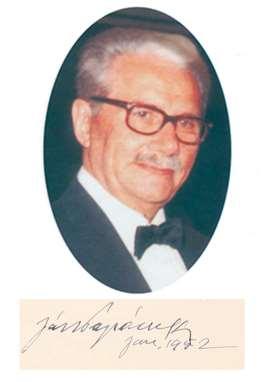

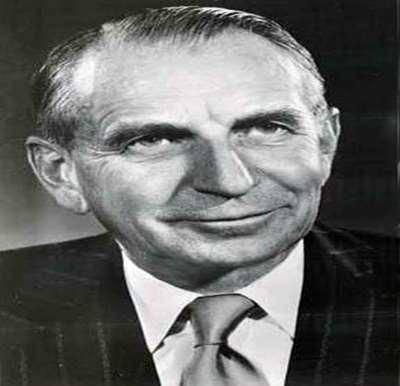


1951-1952
EDWARD WEEKS (1898-1989) - 1951-52 speaker: “In the Editor’s Chair.” Weeks was an author, essayist, and editor of The Atlantic Monthly for 28 years. He was the editor of the “Atlantic Monthly Press” from 1928 to 1937 and assumed editorship of its magazine in 1938. During his tenure, the longest of any editor at the publication, he nurtured the careers of many young writers who subsequently became famous. He was the author of more than 10 books, and also supervised The Atlantic Monthly book reviews for more than three decades.
JAN PAPANEK (1896-1991) - 1951-52 speaker: “United Nations Report.” Papanek was a prominent member of the democratic post-war government of Czechoslovakia. He made a dramatic exit as his country's United Nations delegate in 1948, denouncing the Soviet-engineered Communist takeover of his country. The new Soviet authorities promptly branded him a traitor and removed him as Prague's representative to the United Nations. He founded the American Fund for Czechoslovak Refugees, which helped thousands of refugees to find a new home
PAUL BIGELOW SEARS (1891-1990) - 1951-52 speaker; “What Kind of a Country Do We Want?” Sears was an American ecologist and writer. Early in his research career, he published an innovative series on the “Natural Vegetation of Ohio” (1925 to 1926). These papers are still widely cited by plant ecologists working in Ohio today. During the Dust Bowl era and his tenure at the University of Oklahoma, Sears wrote Deserts on the March, one of the first books to communicate ecological principles to the general public. Also, during the late 1920’s and 1930’s, Sears pioneered the study of fossil pollen as a cue to past vegetation and climate in the United States. In 1950 Sears accepted the chairmanship of a new graduate program in conservation at Yale University where he focused on conservation and land use. In the mid 1960’s Sears retired to Taos, New Mexico and continued his work to make this planet a better place.
1952-1953
Robert Ruark: Life Among the Curious Natives of America
Carlos Romulo: America's Stake in the Far East
Margaret Mead: Anthropology in Action
Lydia Kirk: Life in Russia Today


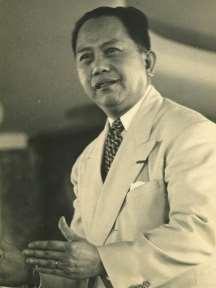

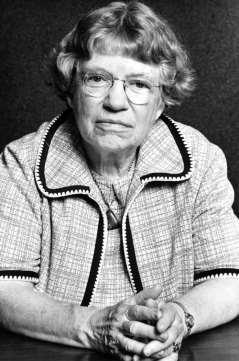

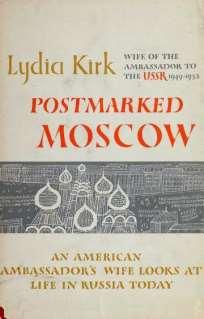

1952-1953
ROBERT RUARK (1915-1965) - 1952-53 speaker: "Life Among the Curious Natives of America.” Robert Ruark began his career as a writer working for two small town newspapers in North Carolina. He later wrote fiction for literary magazines and novels. His novels and articles were published in the Saturday Evening Post, Esquire and Field and Stream. His first bestselling novel, Something of Value (1955), told of the Mau Mau uprising by Kenyan rebels and drew from his personal knowledge and experiences on safari in Africa. It was adapted to a successful film of the same name in 1957. Several later works also detailed his hunts and adventures in Africa.
CARLOS ROMULO (1899 -1985) - 1952-53 speaker: “America’s Stake in the Far East.” Romulo was a Filipino diplomat, politician, soldier, journalist, and author. He was a reporter at 16, a newspaper editor by the age of 20, and a publisher at 32. Romulo served eight Philippine presidents from President Manuel L. Quezon to President Ferdinand Marcos. A cabinet member, a representative to the United States and to the United Nations, he served as the President of the Fourth Session of United Nations General Assembly from 19491950, and chairman of the United Nations Security Council. He had served with General Douglas MacArthur in the Pacific, was Ambassador to the United States, and became the first Asian to win the Pulitzer Prize in Correspondence in 1942. He was a strong advocate of human rights, freedom, and decolonization. Romulo wrote and published 18 books.
MARGARET MEAD (1901-1978) - 1952-53 speaker: “Anthropology in Action.” Margaret Mead, a cultural anthropologist, became well known as a writer and speaker in the 1960’s and 70’s. She was born a Quaker in Pennsylvania and received her PhD from Columbia University in 1929. She taught at The New School and Fordham in New York City. Her seminal works were, Coming of Age in Samoa (1928) and Sex and Temperament in Three Primitive Societies (1935). Her work focused on problems of childrearing, personality, and culture. She received the Presidential Medal of Freedom posthumously.
LYDIA KIRK (1896-1984) - 1952-53 speaker: "Life in Russia Today.” Lydia was born in Pennsylvania. Her life changed when her husband was posted as a naval attaché in London in 1939. Later he served as ambassador to the Soviet Union and Taiwan during the Cold War. She wrote four books capturing the places and times where she lived, including, Postmarked Moscow in 1952. She reported on a difficult time as a diplomatic spouse in Stalin's Moscow.
Everyone expected a very outspoken Margaret Mead but, in fact, she endeared herself to both men and women unlike another speaker, a nutritionist who believed that everyone should eat grass.
1953-1954
Joyce Cary: A Novel as a Picture of Society
Erwin D. Canham: Business at Bat: In Washington and on Main Street
John C. Caldwell: Our Program Toward Asia
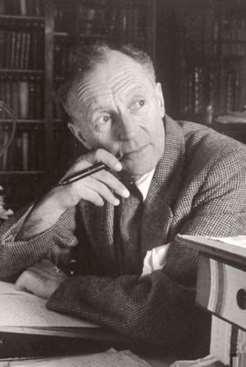

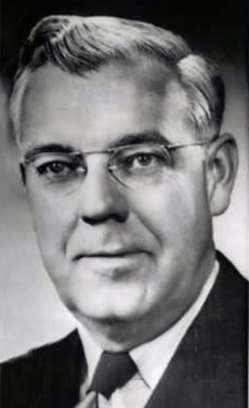

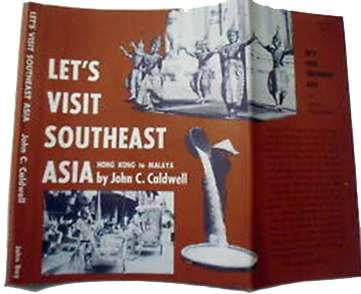

1953-1954
JOYCE CARY (1888-1957) - 1953-54 speaker; “A Novel as a Picture of Society.” Cary was an Irish novelist and artist. His experiences in government service in Africa were the basis for some of his early work. His more mature and successful writing focused on examining historical and social change in England during his own lifetime. Cary's mature work shows several consistent themes. First, the tension between creativity, which destroys the old as it fashions the new, and the conservative desire to preserve things as they are; second, the difference between liberty, which consists of a lack of restraint, and freedom, which lies in the ability to act; finally, the sense that human life is difficult and happiness elusive, that fleeting joy is life's only reward and that love is necessary to humanity.
ERWIN D. CANHAM (1904-1982) - 1953-54, speaker: “Business at Bat: In Washington and on Main Street.” American journalist and editor, Canham served as managing editor and editor of the Christian Science Monitor from 1940-1964. As editor, Canham establish the “Monitor” as a nationally and internationally respected newspaper, famous for its quality and comprehensive assessments of political, social, and economic developments. He was decorated by the British Empire, France, Greece, Germany, and Austria and earned many other honors around the world.
JOHN C. CALDWELL (1913-1984) - 1953-54 speaker: "Our Program Toward Asia." John Cope Caldwell was born in South China to American missionary parents and grew up speaking fluent Chinese and Korean. After World War II, he was named director of the United State Information Service in China and was involved in events leading to the Korean War. His book, The Korea Story (1952), was a behind-the-scenes account of the politics of the time. He was also the author of an autobiography, China Coast Family (1953); Still the Rice Grows Green: Asia in the Aftermath of Geneva and Panmunjom (1955), and numerous travel books.
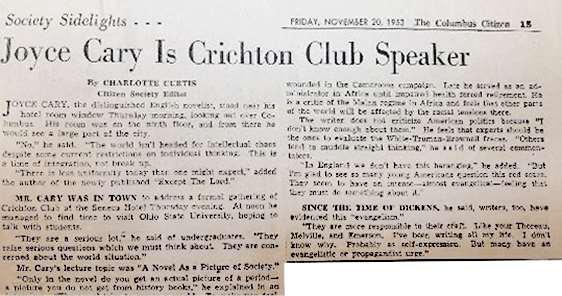
Ruth Draper: A Program of Original Sketches
J. W. Fulbright: The United States and World Affairs
Hanson Baldwin: Danger from the East
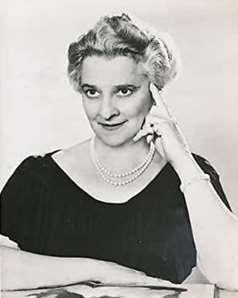

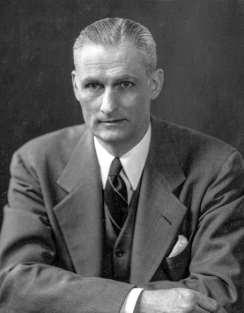

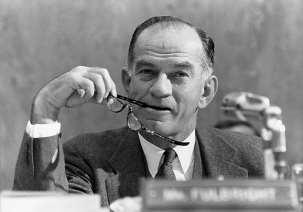

1954-1955
RUTH DRAPER (1884-1956) - 1954-55 speaker, "A Program of Original Sketches.” Ruth Draper was an American actress who specialized in character driven monologues and mono dramas. She was renowned throughout the U.S. and Europe. Draper was a pioneer in using a minimum of stage props, no scenery and little costuming to present her original works. Highly acclaimed for her craft. Draper gave a command performance before King George V at Windsor Castle, in 1926. Her repertory included 39 pieces with such titles as, “Three Generations at a Court of Domestic Relations” , “At an English House Party,” “A French Dressmaker,” and “At an Art Exhibition.” In these. Draper portrayed 58 principal characters, endowing each with full individuality. A command of languages and dialects played a large part in her characterizations as well.
J. W. FULBRIGHT (1905-1995) - 1954-55 speaker: "The United States and World Affairs." James William Fulbright was a United States Senator representing Arkansas from 1945 to 1975. The longest serving chairman in the history of the Senate Foreign Relations Committee, he supported the creation of the United Nations, opposed the U.S. involvement in Vietnam, and played a leading role in establishing the international educational exchange program that bears his name - the Fulbright Program.
HANSON BALDWIN (1903-1991) - 1954-55 speaker: “Danger from the East.” After graduating from the U.S. Naval Academy and serving three years in the Navy, Hanson became a reporter for The Baltimore Sun in 1927. Soon after, Hanson joined the New York Times, where he served as the paper’s military analyst and writer for 40 years. During World War II, Hanson wrote from the South Pacific, North Africa, and Europe. For his stories from Guadalcanal and the Western Pacific, Hanson won the Pulitzer Prize in 1943. Hanson also wrote scores of books on military and defense topics including, We Saw It Happen (1938), The Price of Power (1947), The Great Arms Race (1958), and Strategy for Tomorrow (1970).
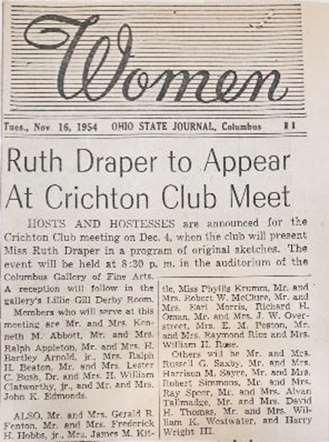
In 1954, Mrs. Earl C. Derby provides funds to enclose the outdoor court in the center of the Gallery. It was renamed Derby Court, and it is currently used to host hundreds of special events including Crichton Club receptions. Mrs. Derby also provides $5 million for an acquisition endowment.
1954-1955
During our history, the club has held most of its events in four venues. The Deshler Hotel, the Seneca Hotel, the Columbus Athletic Club, and the Columbus Gallery of Fine Arts, now known as the Columbus Museum of Art. The Deshler was demolished in 1969 and is now the site of the One Columbus tower.
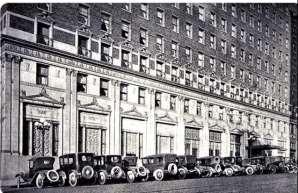
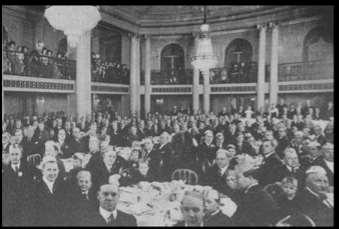
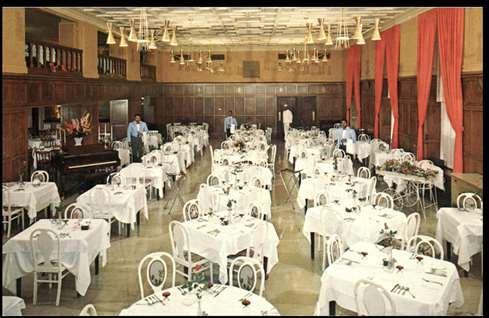
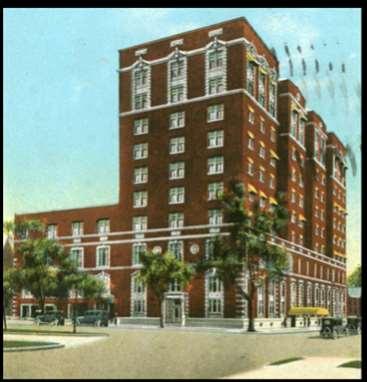
The Deshler Ballroom
The Seneca Hotel (right) and ballroom (above).
1954-1955
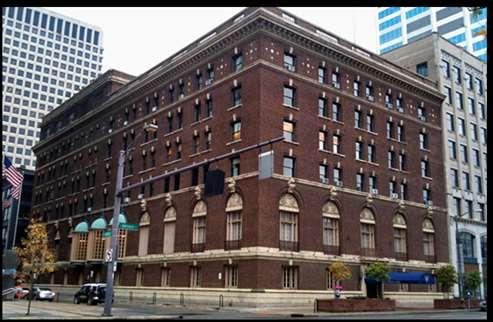

The Columbus Athletic Club (above) and its ballroom (above right) on East Broad Street, hosted early lectures and dinners, and has served as the site of a number of Crichton Club board meetings and planning sessions.
For over thirty years, the Columbus Museum of Fine Arts, now known as the Columbus Museum of Art, has been a valued partner and host location for our events. It is customary for the museum director to be invited to be a member of the Crichton Club.


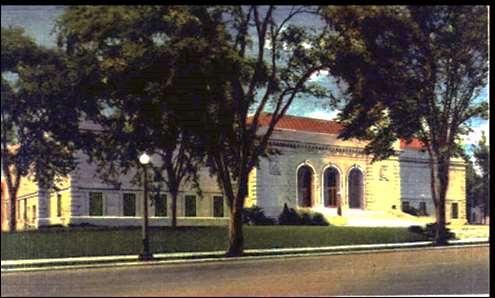

The original Columbus Gallery of Fine Arts.
1955-1956
Henry Hull: An Evening with Mark Twain
George E. Mylonas: Mycenae. The Capital City of Agamemnon
Hans Kohn: Is Modern Western Civilization in Decline?
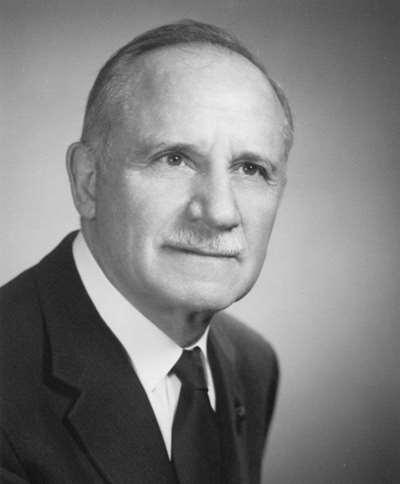



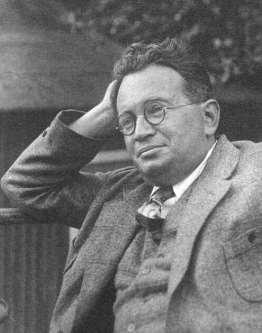

1955-1956
HENRY HULL (1890-1977) - 1955-56 speaker: "An Evening with Mark Twain." Born in Louisville, Kentucky, Henry Hull became a highly regarded character actor with great versatility. He appeared in 74 films between 1917-1966. Fellow cast members in his final movie included Marlon Brando and Robert Redford. Hull had a very distinctive baritone voice, and his acting was said to be in the mold and style of a Barrymore. He enjoyed a successful career in the legitimate theater. In the 1950’s and 1960’s, he appeared frequently in television dramas.
GEORGE E. MYLONAS (1898-1988) - 1955-56 speaker: “Mycenae: The Capital City of Agamemnon.” Throughout his distinguished career, George Mylonas was associated with classical Greek archaeology and revelations and interpretation of Mycenae. While born in Turkey, Mylonas, true to his heritage, joined the Greek army in the Greco-Turkish War (1919-1922) and after the conflict achieved a Ph.D. from the University of Athens in 1927. He then emigrated to the U.S., earning a second Ph.D. at Johns Hopkins in 1929. He began a 35-year tenure at Washington University, soon becoming the founding chairman of a new Department of Art History and Archaeology. Because of his work, the university became a major sponsor of study at Mycenae. In the 1950s, he led a major excavation at Mycenae that attracted great attention, because the site pre-dated the age that had been assigned to it by the venerable Heinrich Schliemann in the 1880’s.
HANS KOHN (1891-1971) - 1955-56 speaker: "Is Modern Western Civilization in Decline?” A Jewish philosopher and historian, Kohn was born in Prague during the time of Hapsburg Empire. As a prisoner of war during World War I he was held in Russia for five years. He moved to Palestine and eventually to the United States in 1934 where he taught modern history at Smith College and the City College of New York. Kohn wrote numerous books and publications, primarily on the topics of nationalism, Pan-Slavism, German thought, and Judaism. He was an early contributor to the Foreign Policy Research Institute in Philadelphia.
1956-1957
Hubert W. Alyea: Atomic Energy - Weapon for Peace
Barbara Ward: The Unity of the Free World
Robert Frost: An Evening with Robert Frost
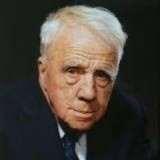

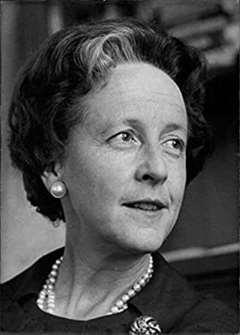


1956-1957
HUBERT W. ALYEA (1903-1996) 1956-57 speaker: “Atomic Energy Weapon for Peace.” This highly honored chemistry professor had a genius for bringing science to life. A New Jersey native, both his undergraduate and Ph.D. degrees were from Princeton University, where he remained a faculty member his entire professional life. He invented a widely used chemistry teaching system using overhead projectors known as TOPS. Known for his enthusiastic delivery, his lectures reached people around the world via television. His Crichton Club presentation, a demonstration lecture inaugurated in 1945, was presented - some 2,800 times to an estimated 1.5 million people worldwide. Alyea’s dramatic mannerisms were the inspiration for the Walt Disney movie “The Absent-Minded Professor” (1960). His textbooks, TOPS in Chemistry and Tested Demonstrations in Chemistry have been translated into many languages.
BARBARA MARY WARD (1924-1981) – 1956-57 speaker: “The Unity of the Free World.” Ward was a British economist and writer and, in later life, Baroness Jackson of Lodsworth. She was educated at Oxford ad became a writer and editor at The Economist magazine in 1939. An early advocate of conservation and sustainable development, she wrote numerous books and articles about the worldwide threat of poverty, encouraging Western nations to share their resources and prosperity with the rest of the world. Her work made her an influential advisor to the Vatican, the United Nations, and the World Bank. Among her writings are, Only One Earth, 1972, and Progress for a Small Planet, 1979. She noted, “We have forgotten how to be good guests, how to walk lightly on the earth as its other creatures do.”
ROBERT FROST (1874-1963) -1956-57 speaker: “An Evening with Robert Frost.” A four-time Pulitzer Prize winner for poetry, Robert Frost was an American poet who spoke of realistic depictions of rural life in the early 20th century, especially New England. He attended Harvard for two years but left to support his growing family on a farm purchased by his grandfather. He worked the land for nine years without success, producing many of his most famous poems early in the morning. He took his family to Great Britain and only to return to America with the outbreak of World War I. He then began a career teaching, writing, and lecturing. From 1921-63 he spent his summers at Bread Loaf School of English at Middlebury. During his lifetime he received forty honorary degrees.
1957-1958
Catherine Drinker Bowen: A Biographer Looks for News
Walter Sullivan: South Pole
Peter Viereck: The Unadjusted Man: A New Hero for Americans


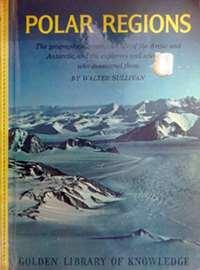



1957-1958
CATHERINE DRINKER BOWEN (1897-1973) - 1957-58 speaker: "A Biographer Looks for News.” Catherine Drinker Bowen was born and died in Haverford, Pennsylvania. Child of a well-known Quaker family, she was schooled in music at Peabody Institute and Julliard and became an accomplished violinist. She was, however, drawn to writing. Without the benefit of formal schooling in that craft, she researched and wrote compelling biographies. Initially, she focused on prominent musicians such as Tchaikovsky, but she broadened her scope to public figures, especially jurists. In 1958, the year she appeared before Crichton Club, she received the National Book Award for The Lion and the Throne: The Life and Times of Sir Edward Coke.Some critics discounted her works, usually because they perceived her research as unverifiable, but she enjoyed wide readership and popularity. Perhaps, her best-known study, The life of Benjamin Franklin, was nearly complete at the time of her death and was published posthumously.
WALTER SULLIVAN (1918-1996) - 1957-58 speaker: "South Pole" and 1979-80 speaker: "Black Holes - The Edge of Space." Walter Sullivan covered the fields of science as a reporter for the New York Times for more than 50 years. Sullivan’s peers considered him the "Dean of Science writers", and the number and variety of awards and recognitions he received attest to his stature. As noted, he was twice invited to address the Crichton Club membership. The breadth of Sullivan’s knowledge is reflected in his two topics - the geology and climatology of Antarctica (1958) and the physics and astronomy of deep space (1980).
PETER VIERECK (1916-2006) - 1957-58 speaker: "The Unadjusted Man: A New Hero for Americans.” Viereck received his education at Harvard culminating in a Ph.D. in History in 1942. In 1949 he received the Pulitzer Prize in Poetry for his book Terror and Decorum. He was an influential political thinker and was a professor of history at Mount Holyoke College for nearly fifty years.
1957-1958 1957-58
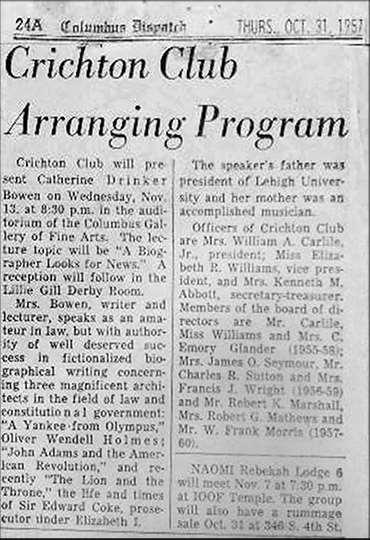
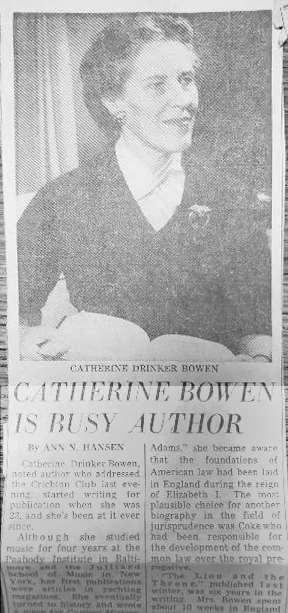
John Gielgud: The Ages of Man
K. C. Wu: An Appraisal of Red China
J. B. Glubb: The Middle East: Storm Center of the World
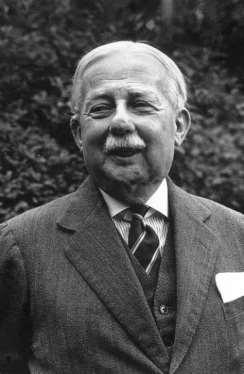



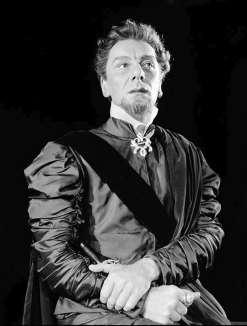

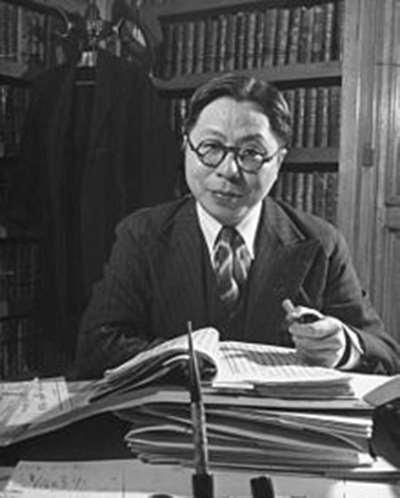

1958-1959
JOHN GIELGUD (1904-2000) 1958-59 speaker: "The Ages of Man." Sir Arthur John Gielgud was a distinguished English actor, director, and producer, known for his expressive speaking voice and his success in Shakespearean and classical stage, recording and film roles. He was knighted in 1953. His performances during the 1950s and 60s of "The Ages of Man," a one-man recital of Shakespearean excerpts, earned him Tony, Emmy, and Grammy Awards. He won an Academy Award for his role as a butler in the film "Arthur."
K. C. WU (1903-1984) - 1958-59 speaker: "An Appraisal of Red China." K.C. Wu was a Chinese political figure and historian. Bom in Central China, he received his doctoral degree in political science from Princeton University. Returning to China in 1926, he served in various government roles until the Communist takeover of mainland China. From 1949 to 1953, he served as governor of Taiwan Province where he played a leading role in the formation of a modem Taiwan. After disagreeing with the Nationalist government, he left Taiwan, moving to the United States, where he served as a professor of Chinese History at Armstrong Atlantic State University in Georgia. He is the author of The Chinese Heritage (1988), a detailed analysis of Chinese culture.
J.B. GLUBB (1897-1986) -1958-59 speaker: “The Middle East: Storm Center of the World.” Sir John Bagot Glubb, a British army officer, arrived in the Middle East in 1920 when the area was emerging from centuries of Ottoman rule. He lived among the Bedouins while learning their language and studying their customs. Successively becoming an administrative inspector and a British military expert, he effectively created and commanded the Arab Legion military force in the Transjordan from 1939-56. When the area was divided, the young King Hussein of Jordan dismissed him from his position. Glubb returned to England and wrote many publications about his own experiences with the Arabs and the role of the British Empire in the Middle East. He is best known for his autobiographical book, A Soldier with the Arabs (1957).
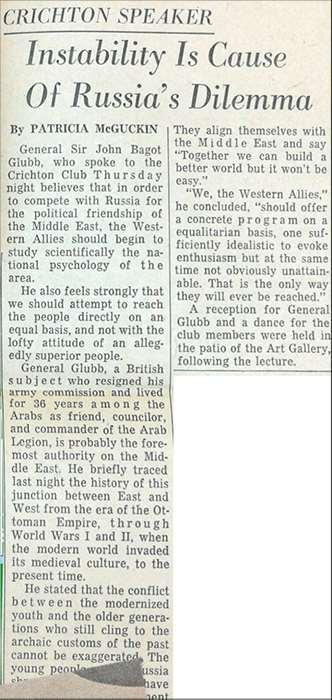
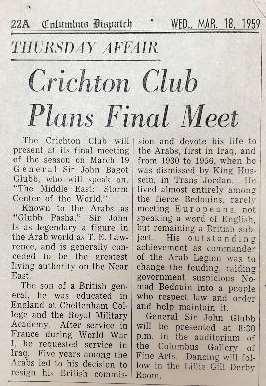
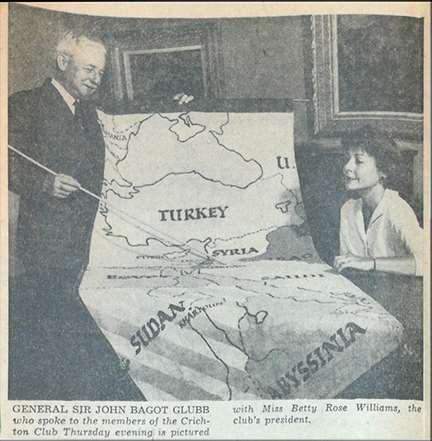

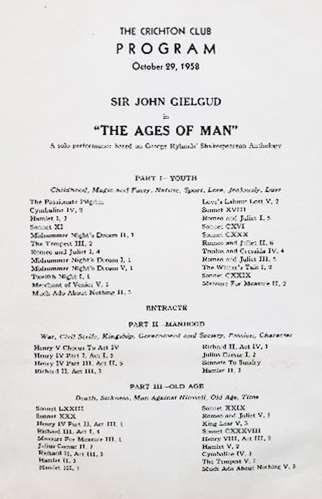
1959-1960
Margaret Webster: An Evening with George Bernard Shaw
Madam Pandit: Eastern Ideas and Western Values
Paul Tillich: The Meaning of Health
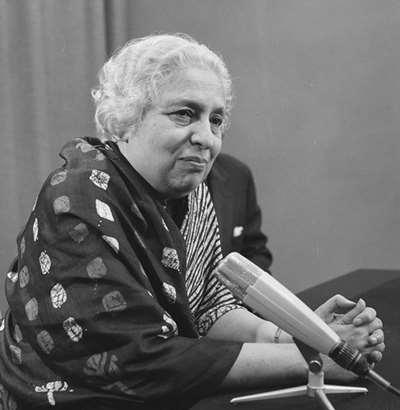




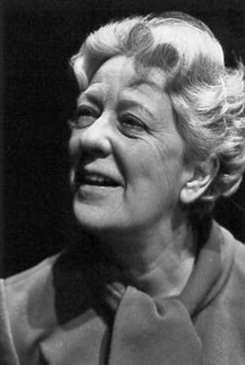
1959-1960
MARGARET WEBSTER (1905-1972) - 1959-60 speaker: "An Evening with George Bernard Shaw." In this one-woman show, the celebrated actress/director/producer revealed her insights into the Irish playwright, George Bernard Shaw, by presenting excerpts from several of his works: Caesar and Cleopatra, Man and Superman, Major Barbara, Pygmalion, Candida, and Mrs. Warren's Profession. She also spoke in 1940-41.
VIJAYA LAKSHMI PANDIT (1900-1990) 1959-1960 speaker: "Eastern Ideas and Western Values." Madame Pandit was an Indian diplomat, politician, and a sister of India's first prime minister, Jawaharlal Nehru. Active in the Indian National Congress before Indian independence, she was imprisoned by the British three times. Following independence, she held a number of important national and international positions, including India's ambassador to the Soviet Union and to the United States, president of the UN General Assembly and India's high commissioner to Great Britain. Her books include, So I Became a Minister (1939), Prison Days (1946) and A Study of Nehru (1959).
PAUL TILLICH (1886-1965) - 1959-60 speaker: “The Meaning of Health.” Paul Tillich was a GermanAmerican theologian and Christian existentialist philosopher usually considered as one of the top four Protestant theologians of the 20th century. He was born in Germany and received his Ph.D. from the University of Breslan in 1911 and a theology degree from the University of Halle in 1912, the same year he became a Lutheran minister. In 1933 he was dismissed from the University of Frankfurt by Hitler and moved to America at the invitation of Reinhold Niebuhr to teach at the Union Theological Seminary. In addition, he taught at Harvard Divinity School and the University of Chicago. He considered his 1952 book, The Courage to Be as his masterpiece. His three-volume, Systemic Theology (1951-1963) was a major work. His lecture was based on his book, The Meaning of Health: The Relation of Religion and Health.
The gracious Madam Pandit sent back saris for Miss Williams and Mrs. Wright.
There are always a few guest speakers who avail themselves very freely of Crichton Club hospitality. Elizabeth Rose Williams, the club's president 1958-I960, was amused to discover the eminent theologian Paul Tillich's "Churchillian capacity for brandy". The brandy did not prevent him from delivering a very profound and inspiring talk.
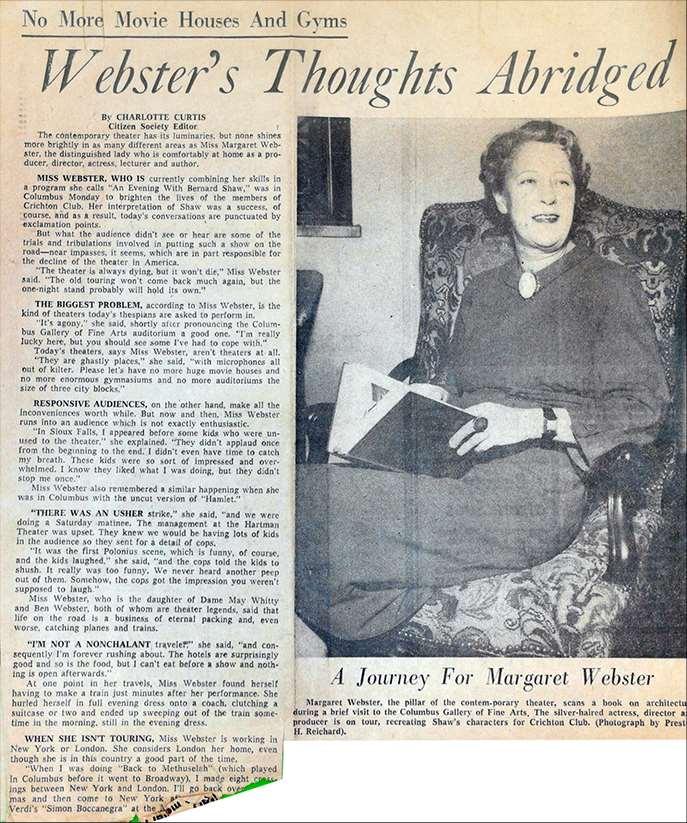
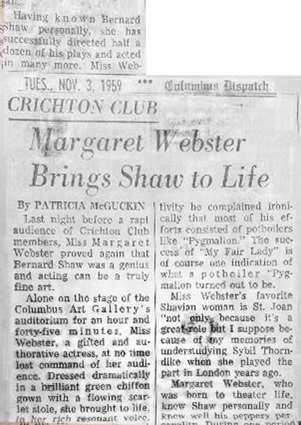

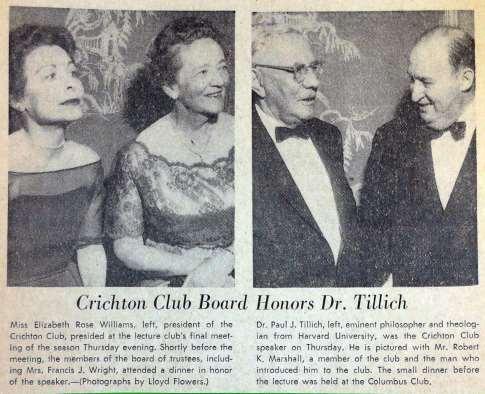
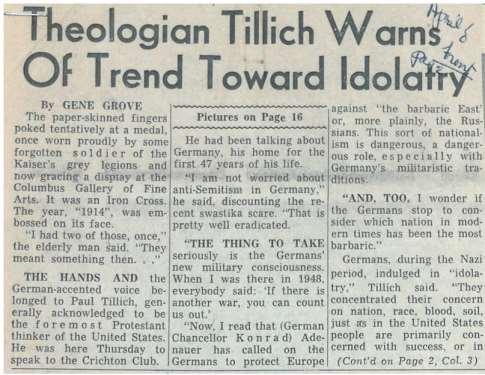
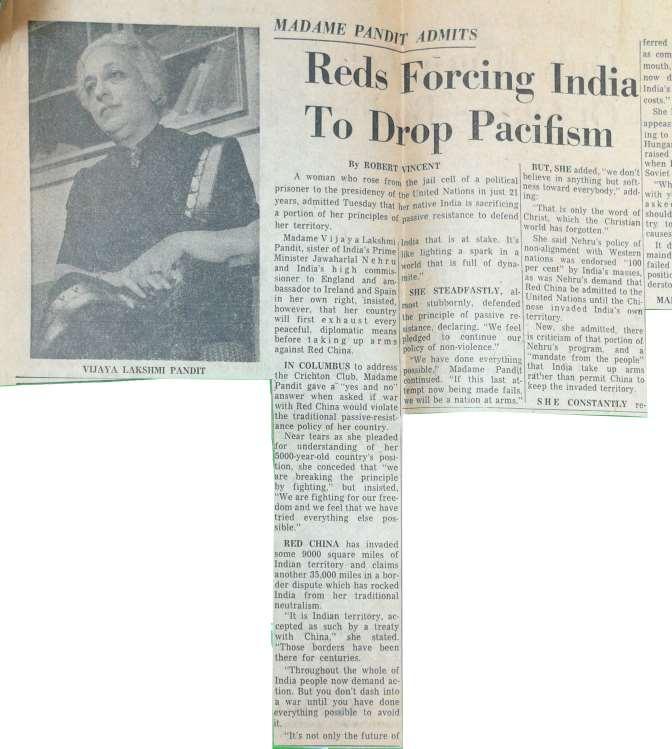
1960-1961
Dorothy Stickney: Portrait of Edna St. Vincent Millay
Anthony Wedgewood Benn: A Britisher Looks at the African Revolution
Arthur Larson: World Rule of Law
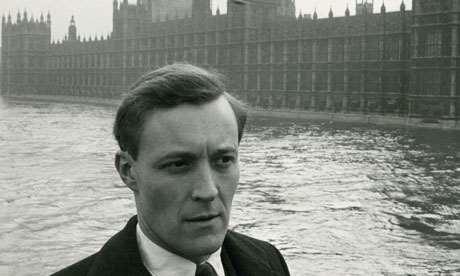



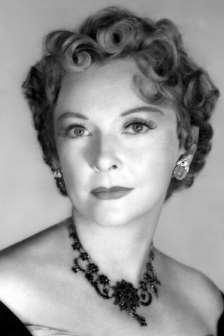

1960-1961
DOROTHY STICKNEY (1896-1998) - 1960-61 speaker: “Portrait of Edna St. Vincent Millay.” American actress Dorothy Stickney was born in North Dakota and attended St. Catherine’s College in Minnesota. After several years in vaudeville and summer stock, Stickney made her Broadway debut in The Squall (1926). Stickney is best known for her leading role in “Life with Father” (1939). Written by Stickney’s husband, Howard Lindsay, “Life with Father” lasted seven years and maintains the record of longest running nonmusical on Broadway.
ANTHONY WEDGWOOD BENN (1925-2014) 1961 speaker: "A Britisher Looks at the African Revolution." Tony Benn, formerly the 2nd Viscount Stangate, is a British Labour politician and current president of the Stop the War Coalition, a United Kingdom-based protest movement. Elected the youngest member of the House of Commons in 1950, he later fought to renounce his inherited title in order to keep his seat in the Commons, resulting in the Peerage Act of 1963 permitting British peers to renounce their titles. He served in several important Labour Party posts, leading the left wing of his party. He retired from Parliament in 2001 and has published a series of tell-all diaries about the British Cabinet.
(LEWIS) ARTHUR LARSON (1910-1993) – 1960-61 speaker: “World Rule of Law.” An American, Larson studied law at Oxford as a Rhodes Scholar and became a lawyer and law professor. He served as Under Secretary of Labor (1954-56), Director of the U.S. Information Agency (1956-57), and as a speechwriter for President Dwight Eisenhower (1957-58). He left the Eisenhower administration in the fall of 1958 to become a law professor at Duke University, where he specialized in international law, arms control, and disarmament efforts. He was also a specialist I employment discrimination and worker’s compensation. Larson continued his consulting work after he joined the Duke University faculty, serving as consultant on international affairs to President Lyndon B. Johnson, the U.S. State Department, and the United Nations. He was considered a strong representative of the moderate wing of the Republican Party, and there was speculation that he might run for president. Larson’s most popular book is A Republican Looks at His Party, 1956.
Dancing with a full orchestra had become a tradition and was popular with some members, but others felt it did not fit the "tone" of the evening. Piano music replaced the orchestra in I960, and the following year an area of the corridor was set aside for those who still yearned to dance. Dancing gradually faded away.
1961-1962
C. P. Snow and Pamela Hansford Johnson: Personal Views of the Two Cultures
Santha Rama Rau: New Voices of the Far East
Henry Kissinger: Strategy and Foreign Policy
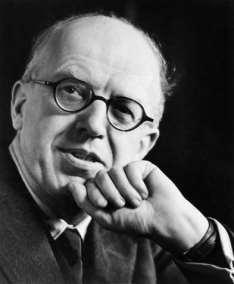

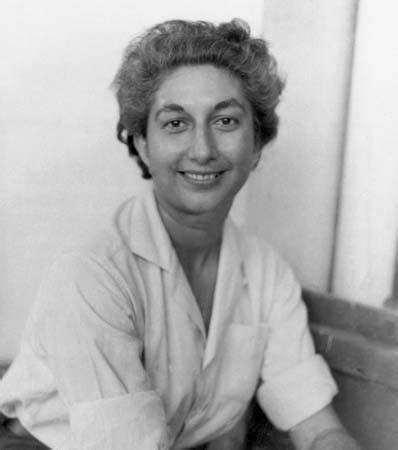

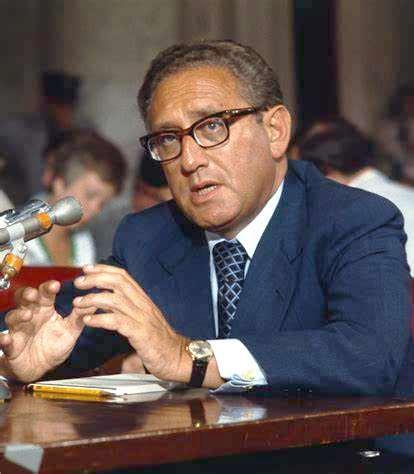



1961-1962
PAMELA HANSFORD JOHNSON, BARONESS SNOW (1912-1981) - 1961-1962 Co-speaker: “Personal Views of the Two Cultures.” Baroness Snow was an English novelist, playwright, poet, and literary and social critic. In 1950, she married C. P. Snow. Her first of twenty-seven novels, This Bed Thy Centre, was published in 1935 and the last, A Bonfire, was published in 1981. Her themes centered on the moral responsibility of the individual in personal and social relations. She wrote seven short plays, six in collaboration with C. P. Snow.
CHARLES PERCY SNOW, BARON SNOW CBE (1905-1980) - 1961-1962 Co-speaker: “Personal Views of the Two Cultures.” An English physicist and novelist educated at the University of Leicester, and the University of Cambridge, Snow served the UK government in several capacities from 1940 to 1966; was knighted in 1957 and made a peer in 1964. He married novelist Pamela Hansford Johnson and authored a series of novels, Strangers and Brothers, two of which won the 1954 James Tait Black Memorial Prize. In 1959 he argued in a lecture called The Two Cultures that the breakdown of communication between the sciences and the humanities was a major hindrance to solving global problems.
SANTHA RAMA RAU (1923-2009) - 1961-62 speaker: "New Voices of the Far East." Santha Rama Rau was an Indian-born, Western educated journalist whose work helped demystify the Indian Subcontinent for American readers after World War II. Her father, Sir Benegal Rama Rau, a high-ranking Indian civil servant, was later an ambassador to Japan and the United States. They lived in England during her teenage years. A trip to India inspired her first book, which was published in 1945 shortly after she graduated from Wellesley. She wrote novels and adapted the E.M. Forster novel, “A Passage to India”, for the stage but was largely a travel writer chronicling journeys to Asia, Africa, and the former Soviet Union for publications such as The New Yorker, Harper’s, and The New York Times magazine.
HENRY ALFRED KISSINGER (1923- ) - 1961-1962 speaker: “Strategy and Foreign Policy.” Dr, Kissinger dominated US foreign policy from 1969 to 1977 and is now chairman of an international consulting firm. He received his A.B., A.M. and Ph.D. degrees from Harvard in 1950, 1952 and 1954 respectively; served on the Harvard faculties for Government and International Affairs; served as National Security Advisor and Secretary of State to President Nixon, and as Secretary of State to President Ford. He won the Nobel Peace Prize in 1973, the Presidential Medal of Freedom (1977), and the Smithsonian Woodrow Wilson Award for Public Service (2006).
Molly Caren Fisher (1960-1962 and 1964-1965) who served three terms as president recalls the missing Henry Kissinger: "My husband, John Caren and I went to the Deshler Hotel, wearing full evening dress at 5:30 p.m. to escort Dr. Kissinger to the Columbus Club for dinner. Mr. Caren double parked at Broad and High Streets while I went in to locate Dr. Kissinger. Nowhere was he to be found. I inquired if he were registered in the hotel; indeed, he was registered. We called his room, no answer. After about twenty minutes he appeared, having been stuck in an elevator which was stalled between floors."
Aldous Huxley: Human Potentiality
1962-1963
Dexter Perkins: Reflections on the Foreign Policy of a Democracy
Cilli Wang: The World of Cilli Wang
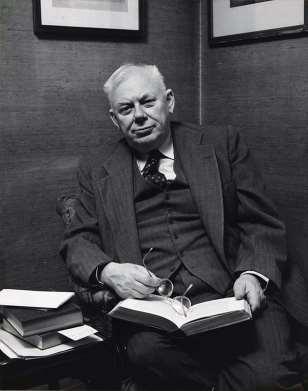

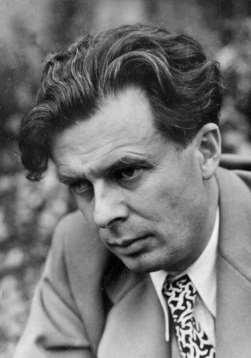

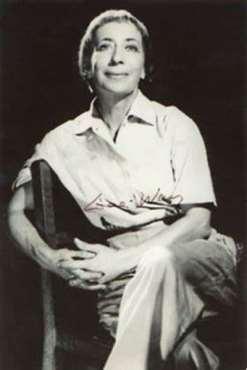

1962-1963
ALDOUS HUXLEY (1894-1963) -1962-63 speaker: “Human Potentiality.” Aldous Huxley was an English writer and a prominent member of the famous Huxley family. He was educated at Eton College and Balliol College, Oxford. Huxley was a humanist and pacifist who spent the later part of his life in the United States. Best known for his novels including Brave New World, he also published short stories, poetry, travel writing, and film scripts. Diagnosed with cancer in I960, and with his health deteriorating, he wrote the utopian novel, Island, and gave lectures on “Human Potentialities.” His death and the death of Irish author C. S. Lewis were overshadowed by the assassination of President Kennedy, on the same day.
DEXTER PERKINS (1889-1984) - 1962-63 speaker: "Reflections on the Foreign Policy of a Democracy." Dexter Perkins was one of the most prominent authorities on United States history and served as professor and chairman of the Department of American History at the University of Rochester and at Cornell University from 1954-59. He was the official U.S. historian at the 1945 San Francisco Security Conference that preceded the organization of the United Nations
CILLI WANG (1909-2005) - 1962-63 speaker: "The World of Cilli Wang." Bom in Austria, Cilli Wang was a dancer, comedienne, and performance artist. Known as the "Pavlova of Parody," she experimented with movement based on the spoken word in European cabaret performances with her husband, Hans Schlesinger, a dramatist, poet, and philosopher. During the Nazi invasion, the couple fled to the Netherlands, going into hiding when their deportation was ordered. After her husband's death in 1945, Wang continued her "transformation art" incorporating Expressionist dance, mime, parody, clownery, costume, acrobatics, and lighting effects as she performed throughout the world.
The pantomimist Cilli Wang forwarded a long list of properties that needed to be constructed for her performance. The Board worked diligently to get everything ready for her, only to have her decide on arrival that she would build her own. The exhausted Board forgave all as they watched her transform herself into a flower on stage.
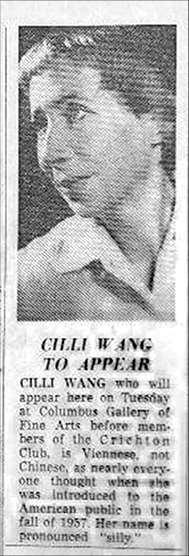
1963-1964
Terence Hanbury White: The Pleasure of Learning
Pierre Mendes-France: A Modern Conception of Democracy
Cleveland Amory: Who Killed Society?
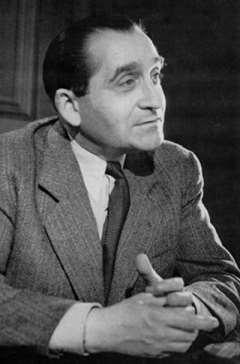

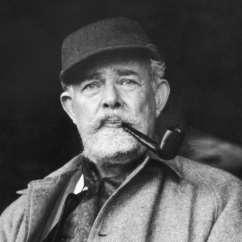

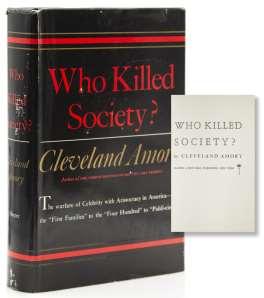

1963-1964
TERANCE HANBURY (T. H.) WHITE (1906-1964) - 1963-64 speaker; “The Pleasure of Learning.” Bom in India (his father was a civil servant there), White graduated from Queens College, Cambridge and embarked on an academic career as a tutor and headmaster at a private school in England. He left that life abruptly in 1936 and devoted his life to reading widely and writing pieces on an equally wide range of topics. Fascinated with the era of the heroic King Arthur, White first authored his version of one part of that epic in his The Sword in the Stone (1938). Subsequently, he completed a four-volume account of the Arthurian legend as The Once and Future (1958). This work became the basis for the highly successful musical, “Camelot,” which premiered in 1960. White addressed Crichton Club in November 1963 as part of an American lecture tour. He was writing an account of that tour when he died in January 1964 aboard ship in Greece. That last book, America at Last, published after his death records the tour.
PIERRE MENDES-FRANCE (1907-1982) - 1963-64 speaker: "A Modern Conception of Democracy.” MendesFrance was a major political figure in France for nearly two decades in the mid-20 century. He aligned himself with and represented a variety of "middle class center-left" parties. When Germany invaded, he joined the French Air Force. After France’s fall, he was arrested and imprisoned by the Vichy government. He escaped to Great Britain, joined Charles DeGaulle’s Free French movement, and became a high-level advisor on finance. After the war, he returned to the National Assembly and became an outspoken critic of the French colonial system. When nationalism erupted in Indochina and Algeria, Mendes-France was propelled into national leadership. He formed and led two succeeding coalitions as Prime Minister from June 1955 - February 1956, during which he negotiated the separation of Vietnam and a timetable for Algerian independence. He opposed DeGaulle’s assumption of power in 1958, after which he lost his seat in the Assembly and was expelled from leadership of his party.
CLEVELAND AMORY
(1917-1998) - 1963-64 speaker: “Who Killed Society?” Author, humorist, social critic and leading animal rights advocate, Amory’s academic skills and talent helped him gain a position editing the “Harvard Crimson.” He then became the youngest-ever editor of The Saturday Evening Post. He wrote three classic social history critiques, one of which is his Crichton title which examines the rise and fall of the affluent, but he is best known for a trilogy about his cat, Polar Bear. Founder of the Fund for Animals, it was he who recruited female celebrities to campaign against the wearing of fur clothing. He covertly purchased the first seagoing vessel used in actions against the Japanese whaling fleet. The Cleveland Amory Black Beauty Ranch is a sanctuary in Texas which rehabilitates abandoned or abused animals.
In the case of the former prime minister of France, Pierre Mendes-France, the members knew whom they had heard, but were not sure what they had heard, owing to his very strong accent combined with a bad head cold.
William Patterson: A Profile of Holmes
1964-1965
Alfred Kazin: The Fascination of Henry Adams
John Kenneth Galbraith: A Modern Foreign Policy
No photograph available.
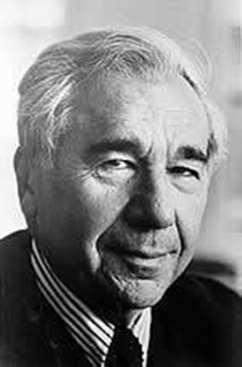



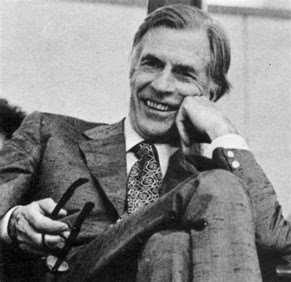

1964-1965
WILLIAM PATTERSON - 1964-65 speaker: "A Profile of Holmes."
ALFRED KAZIN (1915-1998) - 1964-65 speaker: "The Fascination of Henry Adams." Alfred Kazin was an American writer and literary critic. Many of his writings depicted the immigrant experience in the early 20th century America. He is regarded as one of a respected generation of writers and the critics, known as "The New York Intellectuals,” and, like many other members of this group, he was born in Brooklyn and attended City College of New York. His politics were more moderate than most of “The New York Intellectuals,” many of whom were socialists. He was awarded the first Truman Capote Lifetime Achievement Award in 1996 for literary criticism.
JOHN KENNETH GALBRAITH (1908-2006) 1965 speaker: "A Modern Foreign Policy." A Canadian-American economist, John Kenneth Galbraith was a widely read author and a leading proponent of 20th century liberalism and progressivism. Among his 33 books was the best-selling, The Affluent Society (1958). A longtime professor at Harvard University, he served in four presidential administrations, including as U.S. ambassador to India under Kennedy. He was a two-time winner of the Presidential Medal of Freedom and a recipient of the Padma Vibhushan, India's second highest civilian award.
Alfred Kazin, and his problems of getting to Columbus, are also recalled by Mrs. Molly Caren: "About 2:00 p.m. of the day of his lecture, he called from La Guardia where he was already on a plane that had engine trouble. He said he would be late. At intervals he called all afternoon, finally running out of quarters, and asked if he might reverse the charges. I gladly accepted the charges. My last call from him was just before I left the house to go to the Columbus Club, where we were to have dinner. His last call came during dinner at the Club, saying his plane should take off after a while. We had dinner, and then drove to the art museum without a speaker.
Everyone assembled in the auditorium, and I learned that the plane was due at Port Columbus in half an hour. I came out on the stage and told the eagerly waiting audience that this was the night every Crichton Club president had been waiting for - the night when she had no speaker. However, my husband was at that moment on the way to the airport. So, Bill Young, then Director of the Museum, turned on all the lights in the upper galleries, and invited us to go up and view a new exhibition which had just been hung. We accepted his invitation, and I had to face a barrage of questions as to when Mr. Kazin might arrive. In due course this very tired speaker wearing a rumpled pink shirt appeared, and greeted me with open arms, because by now we were old friends. He made a superb speech, which brought down the house, and was well worth the wait."
1965-1966
Phillip Burton and Christian Alderson: Pageant of Kings
David Schoenbrun: The Three Lives of Charles DeGaule
Nelson Gleuck: Deities and Dolphins: The Story of the Nabataens


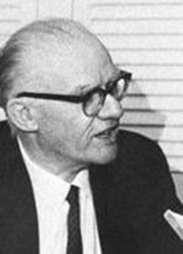
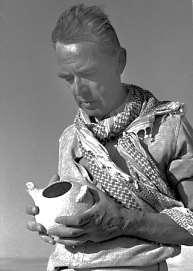


No photograph available


1965-1966
PHILLIP BURTON (1904-95) - 1965-66 speaker: “Pageant of Kings.” Burton was a stage director and actor and the foster father of Richard Burton. Bom in Wales in 1904, the elder Burton graduated from the University of Wales and spent his early adult years teaching and freelancing as a writer for the British Broadcasting Corporation. The Burtons found acclaim simultaneously in the postwar era, Philip as a stage director and actor. He was also a writer, teacher, and director for the BBC. He moved to New York City in the mid-1950's and made his New York debut in 1958 in Sean O'Casey's, “Purple Dust and Cock-a-Doodle Dandy.” In the 1960's, he served as director of the American Musical and Dramatic Academy in New York and taught Shakespeare there. He became a United States citizen in 1964.
CHRISTIAN ALDERSON - 1965-66 speaker: “Pageant of Kings.” Christian Alderson, a dancer in the original cast of “Camelot” (1960), accompanied Phillip Burton
DAVID FRANZ SCHOENBRUN (1915-1988) – 1965-66 speaker: “The Three Lives of Charles DeGaulle.” American author, journalist, and broadcaster, Schoenbrun began his career as a broadcaster during WWII in Algiers. Recruited by Edward R. Murrow in 1947 as chief Paris correspondent, Schoenbrun covered France, Paris, and DeGaulle for CBS until 1964. He went on to become a freelance broadcaster, lecturer, and author of many volumes.
NELSON GLUECK (1900-1971) -1965-66 speaker: “Deities and Dolphins: The Story of the Nabataens.” Bom in Cincinnati, Ohio he became President of Hebrew Union College and President of the Institute of Religion there at the end of his career. He was ordained in 1923 then going to Germany and the University of Jena, receiving a Ph.D. in 1926. A biblical archeologist specializing in ancient pottery, he discovered remains of the advanced Nabataen civilization in the Negev desert where they used irrigation to grow crops. He wrote many books on archeology and religion focusing on the intersection of the two. The well-known King Solomon’s Mine published in 1934 wrote about the substantial historicity of the Old Testament.
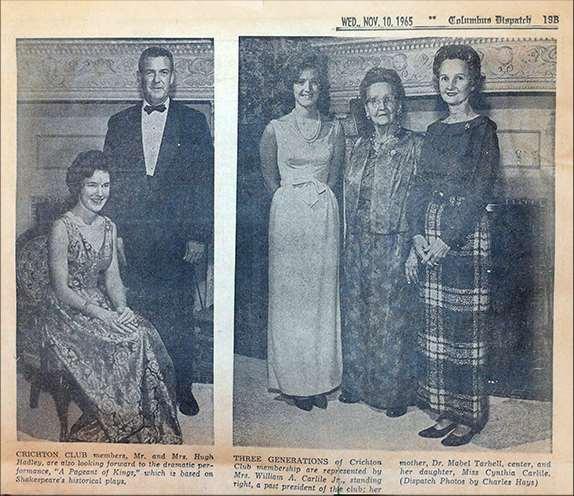
LEADERSHIP PROFILE - Molly Caren
Town, Gown, and… Farm!
Agriculture played an important part in the life of Marie Brown Caren, the only Crichton Club president to serve 3 one-year terms. She grew up on the fruit farm of Frame Brown near Worthington, attended Trinity College in Washington, D.C. during her freshman and sophomore years, and then returned to Columbus, graduated from The Ohio State University as a major in English in 1935. When her parents died in 1963, she assumed the management of the fruit farm and continued to do so for the next twenty-five years.
Molly Caren’s ancestors were among the earliest settlers in Madison County. In 1982 she sold almost 1,000 acres that she had inherited, at considerably below market value, to The Ohio State University. That generous gift enabled the creation of one of the nation’s premier agricultural centers, Ohio State’s Molly Caren Agricultural Center.
The premier agricultural education and industry exposition Ohio State’s Molly Caren Agricultural Center, The Molly Caren Ag. Center is a 2100-acre facility that is home to the Farm Science Review each September. Featured at the event will be more than 100 educational sessions, 600 exhibits; the most comprehensive field crop demonstrations in the United States; a career exploration fair; and immersive virtual reality videos of agricultural activities.
From the Private Farm to Educational Center: A Brief History of the Molly Caren Agricultural Center
It is hoped that this report will forever serve to identify the origins of the Molly Caren Agricultural Center and the way it became part of The Ohio State University.
https://fsr.osu.edu/about/history-molly-caren-ag-center
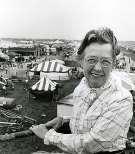
Raimud E. Goerler, Ph.D University Archivist The Ohio State University October 1982
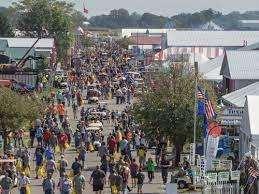


1966-1967
William Mauldin: Political Satire and the Cartoonist
E. O. Reischauer: United States, Japan and Asia
Marietta Tree: Internationalism versus Nationalism
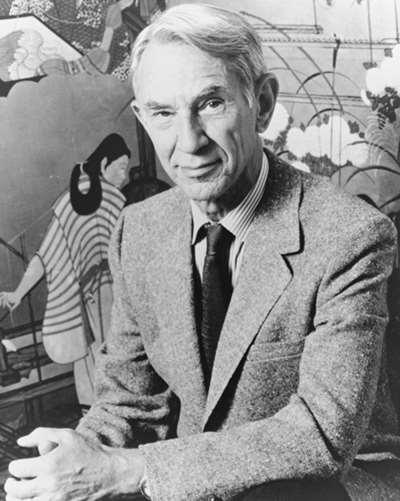

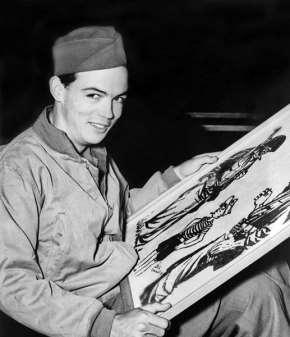
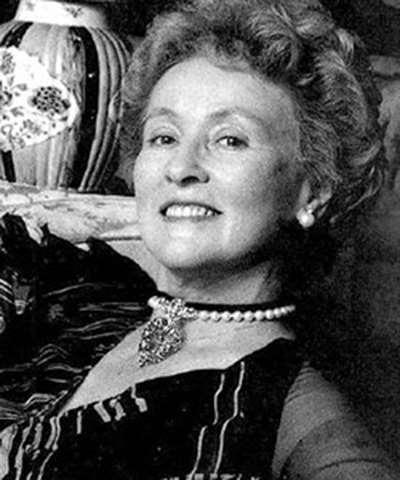

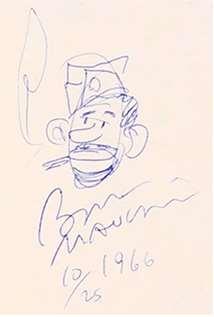
1966-1967
WILLIAM MAULDIN (1921-2003) - 1966-67 speaker: "Political Satire and the Cartoonist.” Twice a winner of the Pulitzer Prize, "Bill” Mauldin was an illustrator and cartoonist who, as a GI himself, captured the moods and lives of soldiers in World War II. His talent first prompted him to draw for his unit’s newspaper. This visibility led to his "recruitment” to “Stars and Stripes,” the Army-wide publication. Willie and Joe, Mauldin’s two principal characters, conveyed the frustrations, fears, and "dark" humor of infantrymen in combat during the last half of the European conflict. Up Front, a collection of the Willie and Joe panels earned 23-year-old Mauldin his first Pulitzer in 1945. Despite encouragement from editors of major dailies, Mauldin could not re-capture a postwar Willie and Joe counterpart. He turned to political cartooning, specifically lampooning what he saw as infringements on civil liberties. Perhaps his most famous postwar depiction followed the assassination of President Kennedy and showed a weeping Abraham Lincoln statue, head in his hands, at the Lincoln Memorial.
EDWIN O. REISCHAUER (1910-1990) - 1966-67 speaker: “United States, Japan and Asia.” The leading United States educator and scholar of the culture of Japan and East Asia, Reischauer gained his credentials early in life. He grew up in Tokyo where he attended the American School and coming to the United States for college. He graduated from Oberlin in 1931 and Harvard University in 1939 and taught there for forty years, ending as the director of the Yenching Institute. In 1973 he founded the Japan Institute. Always credited with saving Kyoto from being bombed in World War II, he always refuted this myth.
MARIETTA TREE (I9I7-1991) - 1966-67 speaker: “Internationalism versus Nationalism.” Marietta Peabody Tree was an American socialite and political supporter. She represented the United States on the United Nations Commission on Human Rights, appointed under the administration of John P. Kennedy. Mrs. Tree was the only daughter Rev. E. Peabody, founder and first headmaster of Groton. She attended the University of Pennsylvania. Although she did not graduate with the class of 1940, she often remarked that it changed her life. The university later awarded Mrs. Tree honorary Bachelor and Ph.D. degrees.
Cartoonist Bill Mauldin arrived late and had to borrow both tie and suspenders before going on to enrapture the audience with his quick sketches of world leaders and his famous wartime duo, Willie and Joe.
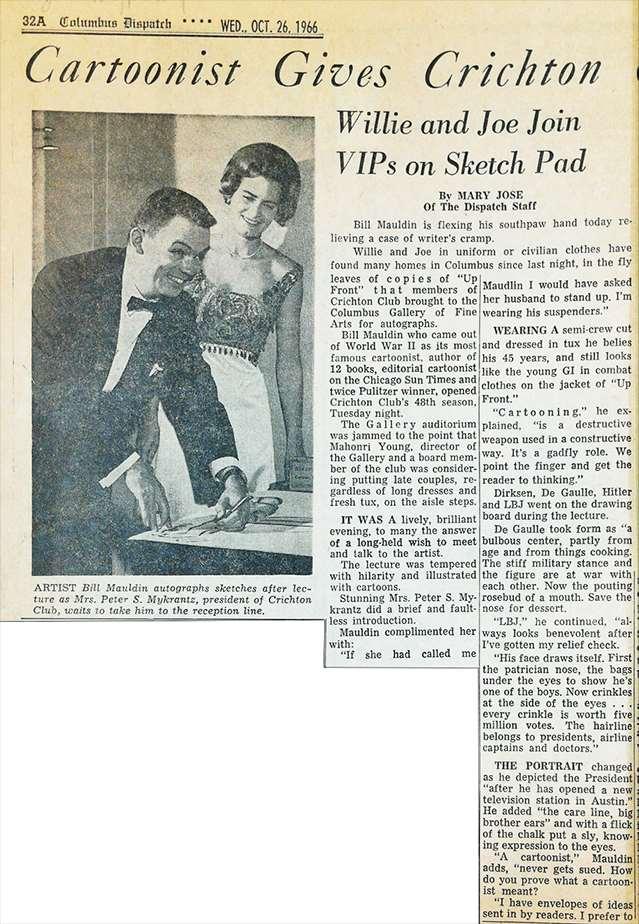
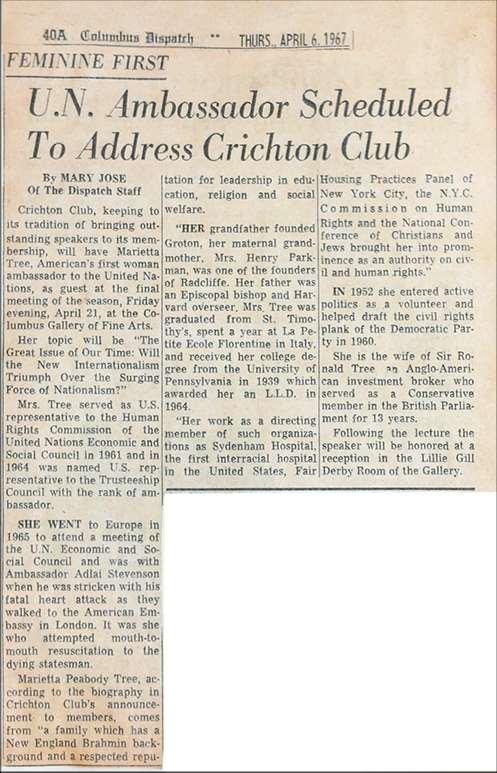
FYI
In 1966 the club constitution was amended.
Emlyn Williams: Dylan Thomas Growing Up
1967-1968
Henry Steele Commager: Was America a Mistake?
Malcolm Muggeridge: English and Americans
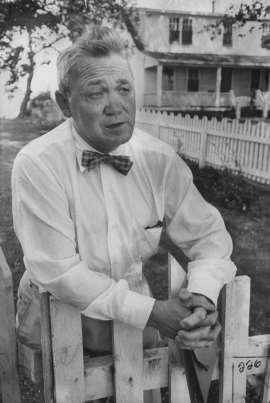

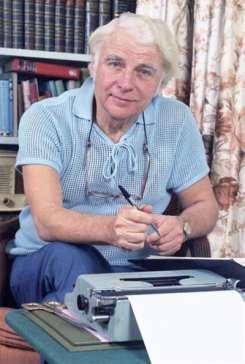

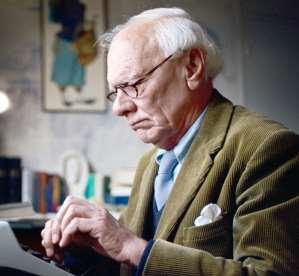

1967-1968
GEORGE EMLYN WILLIAMS (1905-1987) 1967-68 speaker: "Dylan Thomas Growing Up." Emlyn Williams was a Welsh dramatist and actor. He was born into a Welsh-speaking working-class family in Mostyn, Flintshire, Wales and at age 11 he won a scholarship to Holywell Grammar School followed by a scholarship to Christ Church, Oxford, where he joined the Oxford University Dramatic Society. In 1930 he wrote A Murder Has Been Arranged followed by The Late Christopher Bean. He became a star, however, with his thriller Night Must Fall (1935).
HENRY STEELE COMMAGER (1902-1998) 1967-1968 speaker: “Was America a Mistake?” Dr. Commager was an historian and a prolific public intellectual. He earned B.A., M.A., and Ph.D. degrees from the University of Chicago and taught at New York University (1930 - 1936), Columbia University (1936 - 1956), and Amherst College (1956 - 1992). Co-author of the history text, “The Growth of the American Republic” with Samuel Eliot Morison, his books included The American Mind: An Interpretation of American Character Thought Since the 1880’s (1950), and The Empire of Reason: How Europe Imagined and America Realized the Enlightenment (1977).
THOMAS MALCOLM MUGGERIDGE (1903-1990) 1967-1968 speaker: “English and Americans.” Muggeridge was a British teacher in India, England and Egypt, a journalist for the Manchester Guardian, author, satirist, media personality, soldier-spy and, in his later years, a Christian convert and writer. He went to Moscow in 1932 as a correspondent for the Manchester Guardian. During World War II he was part of the British Secret Service operations in Brussels and in Portuguese East Africa. After the war he worked on other newspapers, including the Calcutta Statesman, Evening Standard, and Daily Telegraph. He was editor of Punch Magazine from 1953 to 1957 and in 1957 he criticized the British monarchy in the Saturday Evening News in an article entitled "Does England Really Need a Queen?’’. The controversy generated by its publication helped make his international broadcasting reputation.
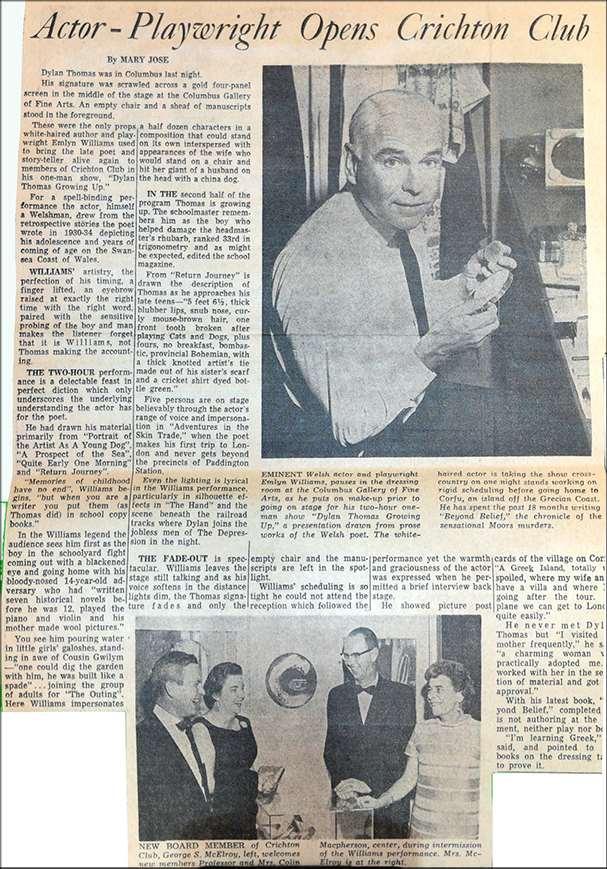
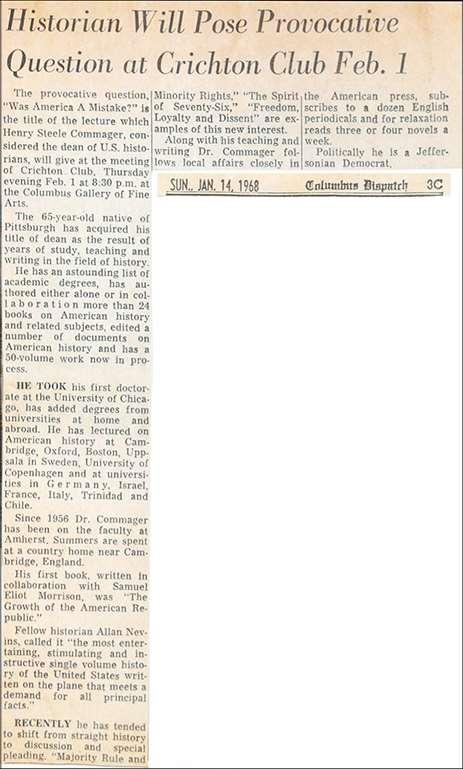


1968-1969
Morris B. Abrams: The University in the Vortex
Lord Harlech: Great Decisions, 1969
Archibald MacLeish: Readings and Reflections
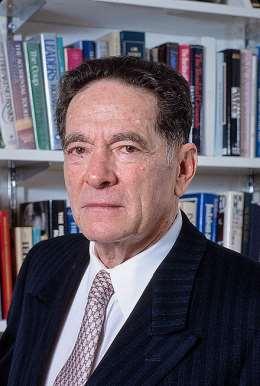

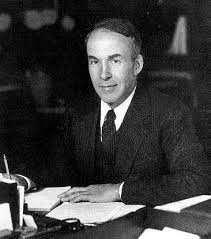



1968-1969
MORRIS B. ABRAMS (1918-2000) -1968-69 speaker: “The University in the Vortex.” Georgia-born Ambassador Abram was a tireless advocate for civil rights, particularly of Jews in Russia, Ukraine, the Baltic States and Eurasia. He defended their right to emigrate without impediment and worked to combat antiSemitism. An appointee of five presidents, he served among other capacities as U.S. Ambassador to the United Nations in Geneva, President of Brandeis University, Chairman of the United Negro College Fund, and argued landmark civil rights cases before the Supreme Court. U.N. Secretary General Kofi Annan declared Abram “a global citizen of the first rank.”
LORD HARLECH (1918-1985) - 1968-69 speaker: “Great Decisions, 1969.” William David Ormsby-Gore, 5th Baron Harlech was a British diplomat and Conservative Party politician. At the 1950 general election, he was elected as Member of Parliament for Oswestry, a position he held until 1961. He served briefly under Anthony Eden as Parliamentary Under-Secretary of State for Foreign Affairs from November 1956 to January 1957 and was Minister of State for Foreign Affairs from 1957 to 1961 under Harold Macmillan. After the election of U.S. President John F. Kennedy in November 1960, he was appointed British Ambassador to the United States. Ormsby-Gore had the status of friend of the family as well as ambassador while Kennedy was President. He retired from the post in 1965, a year after his father died, and took up his seat in the House of Lords as Lord Harlech.
ARCHIBALD MACLEISH (1892-1982) -1968-69 speaker: "Readings and Reflections." Archibald MacLeish was an American poet, writer, and the Librarian of Congress. He was associated with the modernist school of poetry. He received three Pulitzer Prizes for his work. He attended the Hotchkiss School, graduating from Yale University Phi Beta Kappa and Harvard Law School. MacLeish taught Law at Harvard and worked briefly as an editor for The New Republic. After practicing law for three years, he moved to Paris in 1923 with his wife, where they joined the community of literary expatriates that included such members as Gertrude Stein and Ernest Hemingway. From 1930 to 1938 he worked as a writer and editor for Forbes Magazine. In the 1940's he became the Librarian of Congress reorganizing it by dividing it into three departments. He also served during World War II as Director of the War Department's Office of Facts and Figures and as the assistant director of the Office of War Information.
The enthusiasm for the booking of Lord Harlech forty years later led the Board to defy the fire laws and stack folding chairs outside the doors of the auditorium. Much to the relief of the president, Gilly Ludden (19681970), they were not needed.

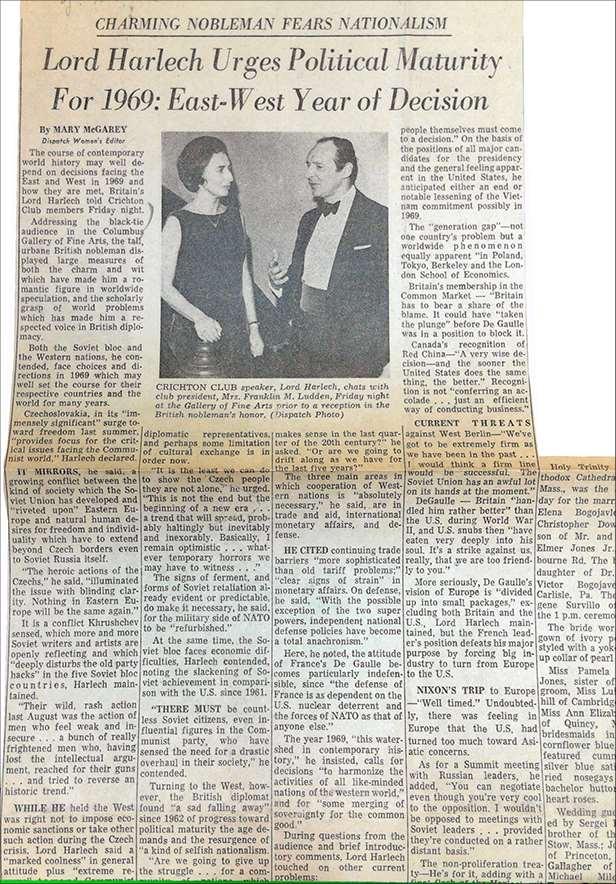
1968-1969
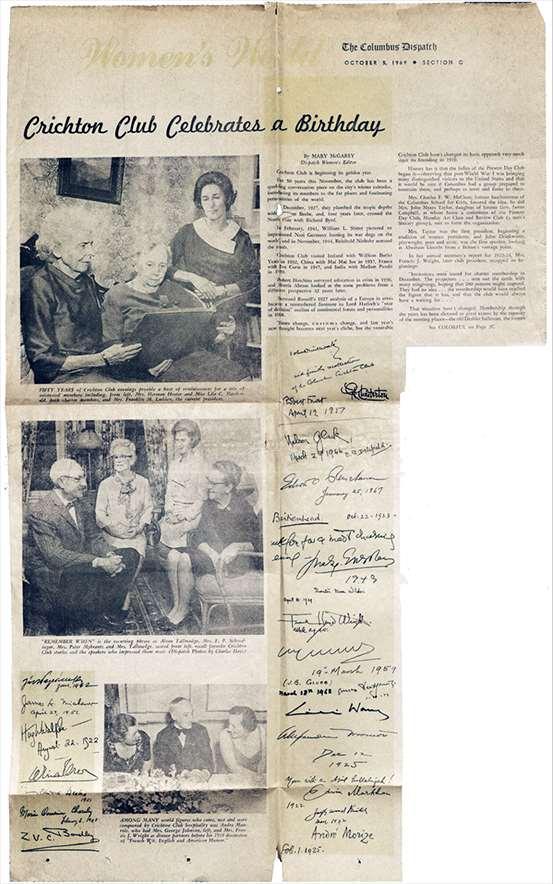
The golden anniversary of the Crichton Club grabbed a two-page spread in “The Columbus Dispatch” on October 5, 1969. In the article members reminisced about memorable speakers and incidents. Some pages from the guest speakers’ book were printed as were photographs of members and guests.
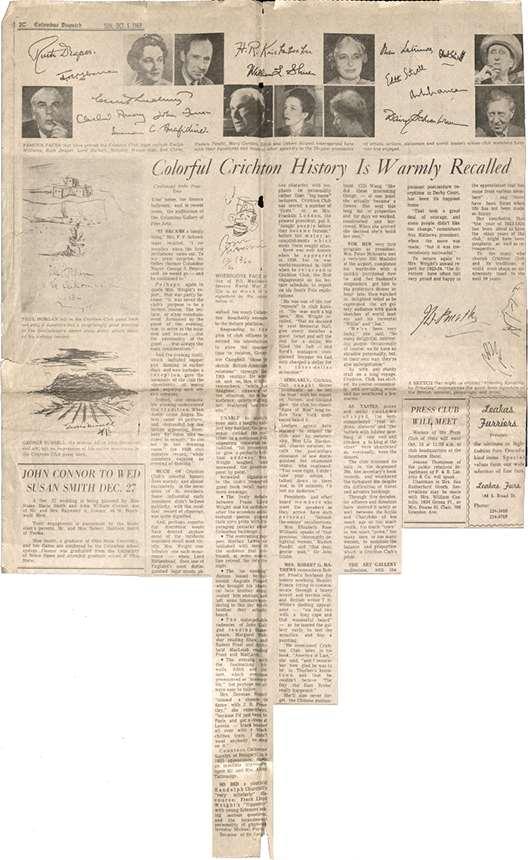
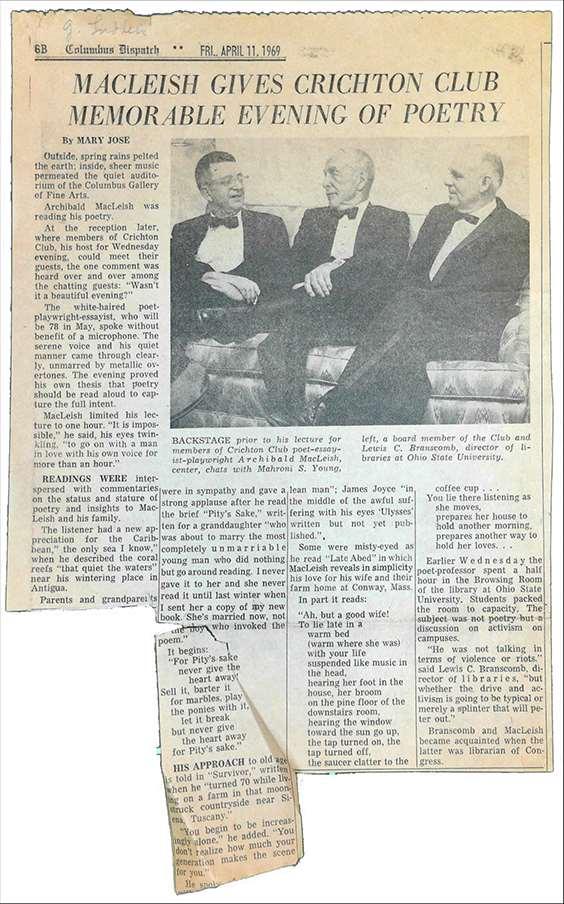
1969-1970
Harrison Salisbury: America, Russia, China. Triple Alliance or Three-way War?
Willie Morris: The National Magazine in American Life Today
John Archibald Wheeler: A Few Glimpses of an Open World


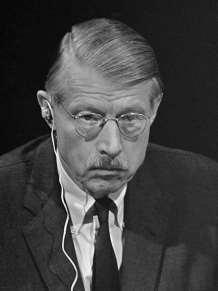

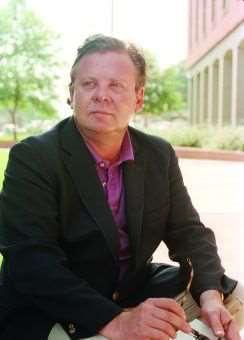

1969-1970
HARRISON SALISBURY (1908-1993) 1969-70 speaker: "America, Russia, China. Triple Alliance or Threeway War?” Salisbury was born in Minneapolis and graduated from the University of Minnesota in 1930. He worked for the United Press for twenty years through World War 11 and then became the “New York Times” Moscow Bureau Chief. He won the Pulitzer Prize for International Reporting in 1955. He wrote 29 books.
WILLIE MORRIS (1934-1999) - 1969-70 speaker: "The National Magazine in American Life Today.” Morris was an American writer and editor born in Jackson, Mississippi. His family moved to Yazoo City, Mississippi, which figures prominently in much of Morris' writing. He graduated from the University of Texas at Austin and during his senior year was elected editor of the university’s student newspaper, the award-winning, “The Daily Texan.” His scathing editorials earned him the enmity of university administrators. The university did not acknowledge his award of a Rhodes Scholarship and his contributions to the university continue to go unrecognized. In later writings Morris’ trademark was his lyrical prose style and reflections on the American South, particularly the Mississippi Delta. In 1967 he became the youngest editor of Harper’s Magazine. Among his many works of fiction were North Toward Home and My Dog Skip, which was made into a film
JOHN ARCHIBALD WHEELER (1911-2008) - 1969-70 speaker: "A Few Glimpses of an Open World." John Archibald Wheeler was a legendary American theoretical physicist who coined the term "black hole" and whose scientific contributions figured in many of the 20th century's research advancements. As a young professor at Princeton University, he collaborated with Albert Einstein and Niels Bohr. During World War II, he worked on the Manhattan Project, becoming a driving force in the development of the atomic and hydrogen bombs. In later years, he became the father of general relativity. His autobiography, Geons, Black Holes and Quantum Foam (1998), tells of his interest in merging physics with philosophic question about the origin of matter and the universe. At the time of his death, he was Joseph Henry Professor of Physics emeritus at Princeton University.

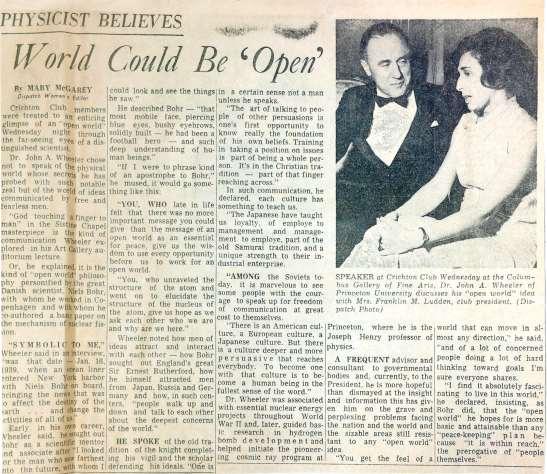
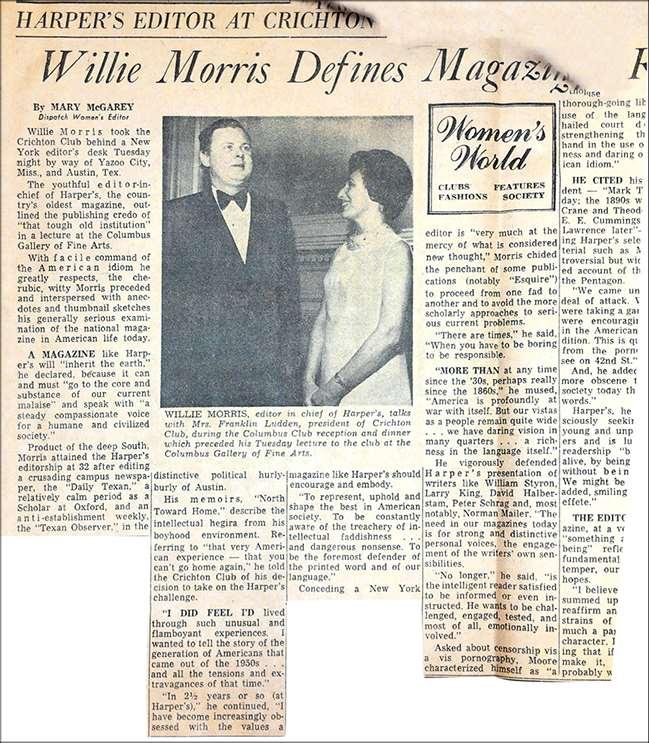
1970-1971
Lord Caradon: What Hope for Peace in the Middle East?
Rene Dubos: The Living Past
Pierre Berton: Why Canadians are Different
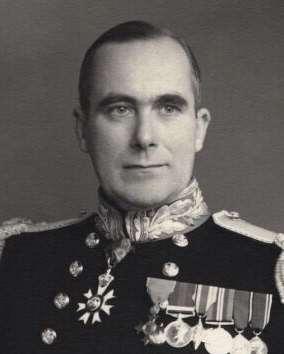

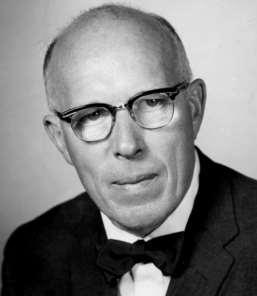



1970-1971
LORD CARADON (1907-1990) - 1970-71 speaker; “What Hope for Peace in the Middle East?” Born Hugh Mackintosh Foot, he grew up in a family of Liberal Party leaders. He wrote “We were proud to be nonconformists and Roundheads. Oliver Cromwell was our hero and John Milton our poet.” He entered the Colonial Service and served throughout the Middle East as well as Cyprus, Jamaica, and Nigeria. Knighted by King George VI in 1951 he went on to become the Governor and Commander in Chief in Cyprus from 1957-60 and is credited with bringing together rival Greek and Turkish leaders to create an independent republic. Appointed as the British representative to the Trusteeship Council of the United Nations in 1961, he worked there in economic development and in 1964 was made London’s representative to the United Nations. That same year he was made a life peer and wrote his memoir, A Start in Freedom.
RENE JULES DUBOS (1901-1982) - 1970-1971 speaker: “The Living Past.” A microbiologist, experimental pathologist, environmentalist, and winner of the Pulitzer Prize for General Non-Fiction for “So Human an Animal,” Dubos studied microbial diseases and the environmental and social factors that affect human welfare. His research led to the discovery of antibiotics and advances in treating tuberculosis, pneumonia, the mechanisms of acquired immunity, natural susceptibility, and resistance to infection.
PIERRE BERTON (1920-2004) 1970-71 speaker: "Why Canadians are Different." Berton was born in the Yukon and studied history at the University of British Columbia. He became a renowned author of non-fiction and Canadian history. Berton was a Canadian television personality, journalist, and storyteller. He wrote fifty books on Canadian culture and popularized Canadian history.
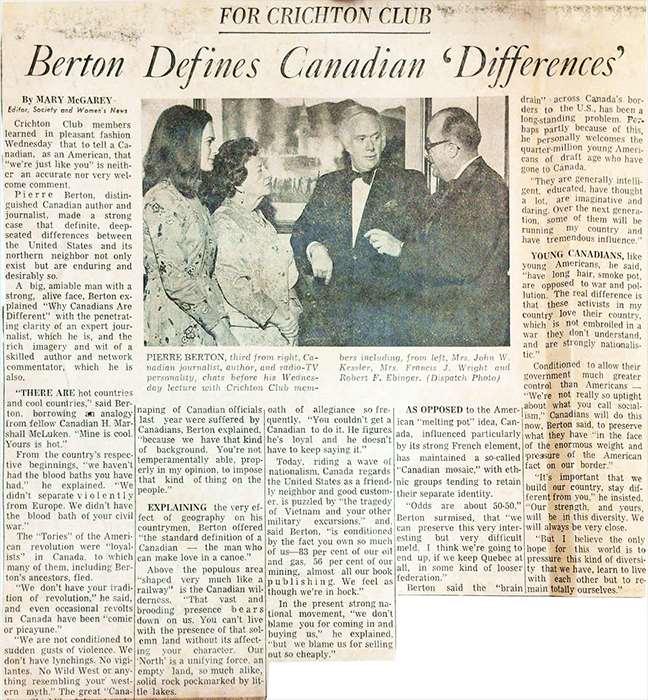

1971-1972
Jon M. Lindbergh: The Oceans: Conservation or Exploration?
Carl M. Loeb, Jr.: Victims of Crime - All Honest Victims
Daniel Patrick Moynihan: The American Presidency
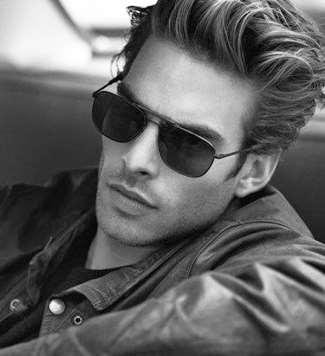

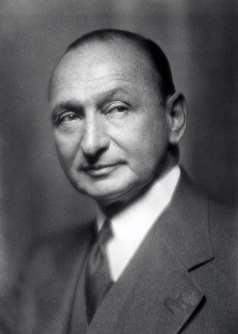

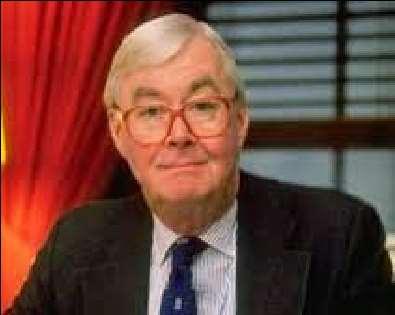

1971-1972
JON M. LINDBERGH (1932- 2021) - 1971-72 speaker; “The Oceans: Conservation or Exploration?” The son of Charles A. and Anne Morrow Lindbergh, Jon has always been fascinated by the sea and has been a pioneer in such fields as deep underwater exploration, ocean bed habitats and aquaculture. Lindbergh was among the first to live and work in an experimental submarine habitat hundreds of feet below the surface of the water. Later, Lindbergh assisted the underwater recovery of an H-bomb lost off the coast of Spain when a B-52 crashed into the ocean. Aquaculture, the controlled cultivation and harvest of aquatic animals and plants, has been Lindbergh’s primary interest since 1970. He serves as a consultant in fish cultivation and the management of profitable aquaculture projects for private corporations and governments.
CARL M. LOEB, JR. (1904-1985) - 1971-72 speaker: "Victims of Crime - All Honest Victims." Carl Loeb was a prominent businessman, civic activist, and philanthropist. He was the founder of the National Crime Prevention Council and the author of Crime & Delinquency (1978).
DANIEL PATRICK MOYNIHAN (1927 - 2003) - 1971-1972 speaker: "The American Presidency." Senator Moynihan, an American politician and sociologist, was first elected to the United States Senate for New York in 1976, and was re-elected in 1982,1988, and 1994. He was a member of four presidential administrations running from John F. Kennedy through Gerald Ford. The holder of five degrees from Tufts University, he served as the United States Ambassador to India from 1973 to 1975, and as the United States Permanent Representative to the United Nations, including a term as President of the United Nations Security Council (1976). Also, a sociologist, he was Director of the Joint Center for Urban Studies at Harvard University and Massachusetts Institute of Technology and was a Fellow at the Center for Advanced Studies at Wesleyan University (1964 to 1967). He authored 19 books, including: Maximum Feasible Misunderstanding: Community Action in the War on Poverty (1969); Coping: Essays on the Practice of Government (1973); On the Law of Nations (1990); Pandemonium: Ethnicity in International Politics (1994); and Secrecy: The American Experience (1998).
1972-1973
Ross Terrill: China Today: A Firsthand Account
Barbara Ward Jackson: Basic Conditions for Tomorrow's World
Richard Wilbur: A Reading of His Poems with Commentary


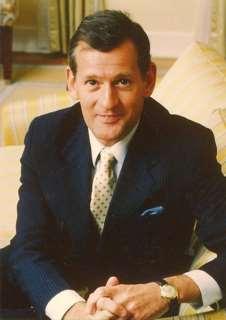



1972-1973
ROSS TERRILL (1942 - ) - 1972-73 speaker: "China Today: A Firsthand Account." Dr. Ross Terrill is a historian and research associate with Harvard University’s Fairbank Center for Asian Studies. As a regular visitor to China from the 1970s, his articles have been published in the Atlantic Monthly, Foreign Affairs, New Republic, National Geographic, and other national magazines. He has appeared on "CBS News", the "Today Show", and "Nightline" as a commentator on Chinese politics. Dr. Terrill’s books have included Madame Mao: the White-Boned Demon (1992) and The New Chinese Empire (2004). Born in Australia, Terrill graduated from the University of Melbourne and won a Frank Knox Scholarship to Harvard University in 1965.
BARBARA WARD JACKSON (1914-1981) - 1972-73 speaker: "Basic Conditions for Tomorrow’s World." Barbara Ward Jackson was a British economist and writer interested in the problems of developing countries. She urged Western governments to share their prosperity with the rest of the world and in the 1960's turned her attention to environmental questions. She was an early advocate of sustainable development before this term became familiar and was well known as a journalist, lecturer, and broadcaster. She was educated at a convent school before attending the Sorbonne. She graduated from Oxford University with a degree in politics, philosophy, and economics in 1935. Ward published Spaceship Earth and co-authored Only One Earth: The Care and Maintenance of a Small Planet written for the 1972 UN Stockholm conference on Human Environments.
RICHARD WILBUR (1921-2017) - 1972-73 speaker: “A Reading of his Poems with Commentary.” A graduate of Amherst College and Harvard University, Richard Wilbur has been a professor for over thirty years at Wesleyan College, Smith College, and Amherst College. He writes in the tradition of Robert Frost, illuminating the everyday experience. A consultant in poetry to the Library of Congress in 1987, he was our nation’s sixth Poet Laureate. He is the recipient of many awards and prizes for poetry and prose including the Pulitzer Prize in Poetry in 1957 and 1989
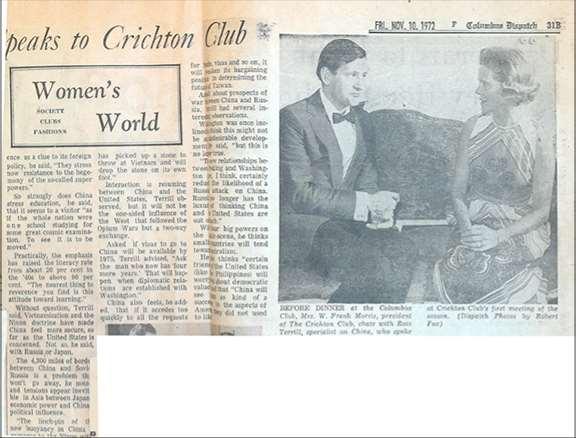
1973-1974
Thomas Hoving: Present and Future Developments at the Metropolitan Museum of Art
Joseph C. Harsch: State of the Nations
Max Lerner and Reid Buckley: Will the American Republic Survive Into the 21st Century?
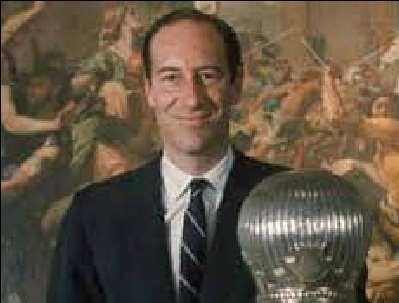

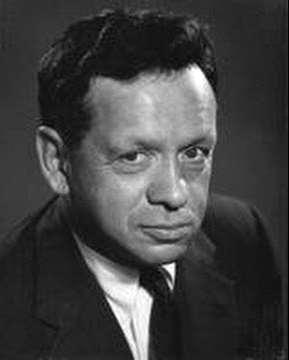

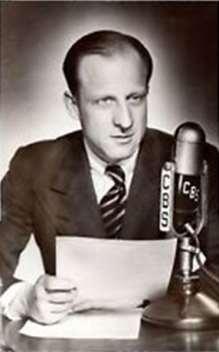

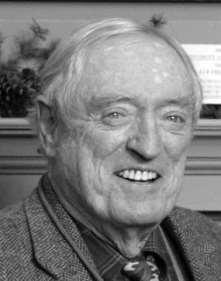

1973-1974
THOMAS HOVING (1939-2009) - 1973-74 speaker: "Present and Future Developments at the Metropolitan Museum of Art." Thomas Hoving was director of New York's Metropolitan Museum of Art from 1967 to 1977, during which time he presided over a massive expansion and renovation of the museum, adding many important works to its collections. He recounted those years in “Making the Mummies Dance (1993). After leaving the museum, he was an arts correspondent for the ABC newsmagazine "20/20," editor of Connoisseur Magazine, and author of several more books on art-related subjects.
JOSEPH C. HARSCH (1905-1998) 1973-74 speaker: "State of the Nations." Harsch was born in 1905 in Toledo, Ohio. He began writing a column for the “Christian Science Monitor in 1929 and continued until 1988, nearly sixty years. In 1971-74 he was the Monitor’s chief editorial writer. He worked concurrently as a news analyst for both NBC and ABC television news.
REID BUCKLEY (lectured with MAX LERNER) (1930- 2014) - 1973-74 speakers: Reid Buckley is the brother of William Buckley and the founder of the Buckley School of Public Speaking. A conservative author and debate master, he toured with Max Lerner during the 1960s and 1970s, and the two gentlemen engaged in clashes that have been compared to the Lincoln-Douglas debates. He has written for the New York Times, The Atlantic and The National Review. He is the author of several books on speaking and writing, including The Eye of the Hurricane (1967). His most recent book is entitled An American Family: The Buckleys (2008).

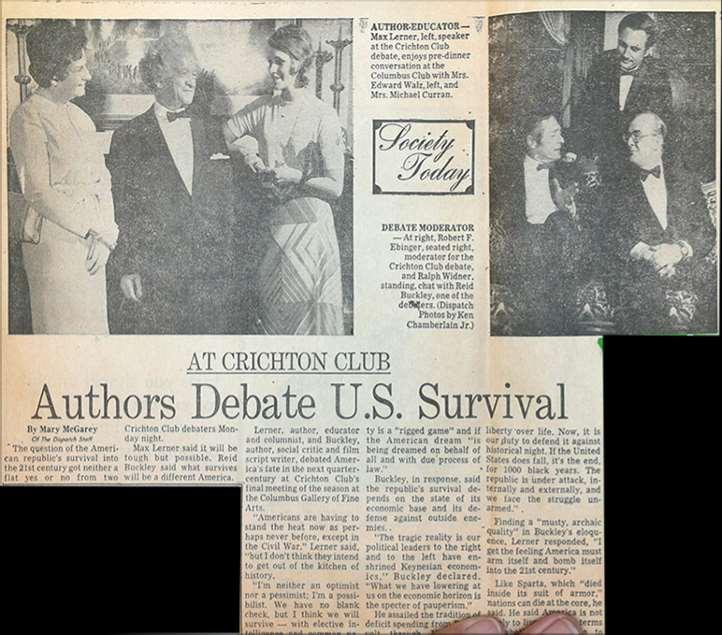
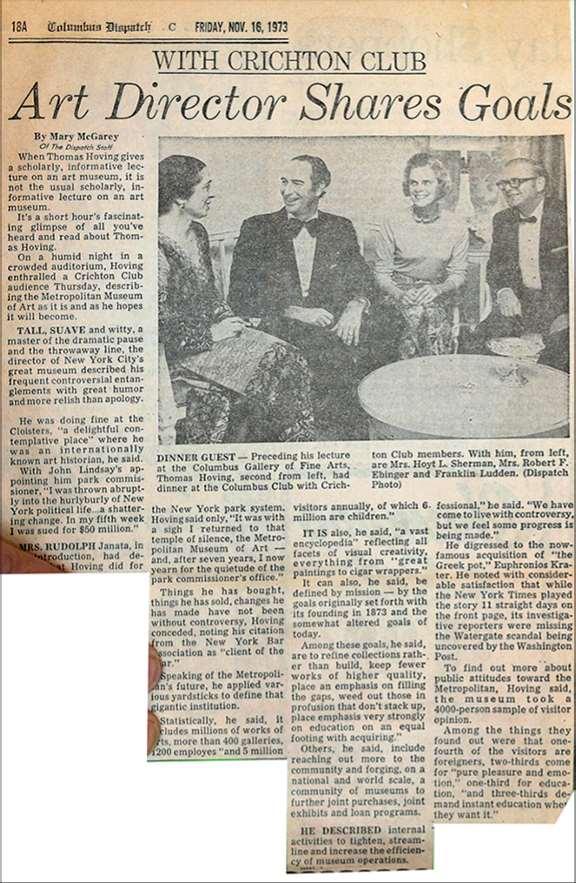
1974-1975
Duncan Williams: Trousered Apes: Sick Literature in a Sick Society
Dixie Lee Ray: U.S. Involvement in Science and Technology
S. Dillon Ripley: Facing Problems of the Environment
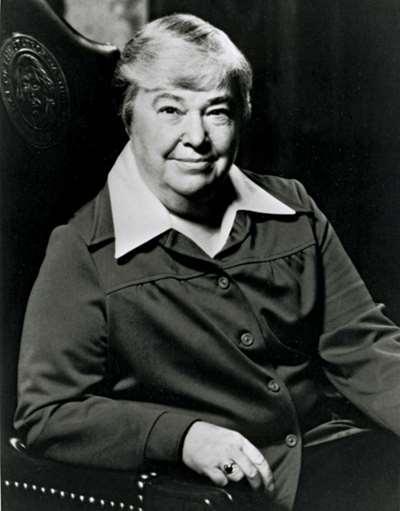

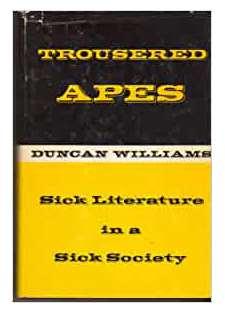

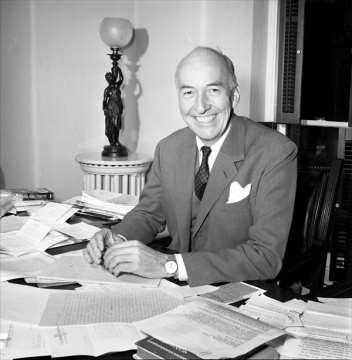

1974-1975
DUNCAN WILLIAMS (1927 - ? ) -1974-75 speaker: “Trousered Apes.”
DIXIE LEE RAY (1914-1994) - 1974-75 speaker: “United States Involvement in Science and Technology.” Bom Marguerite in Tacoma, Washington she changed her name at age twelve. The class valedictorian at Mills College, she went on to receive a Ph.D. from Stanford University. From 1947-72 she taught marine biology at the University of Washington. An advocate of nuclear power she was appointed by President Richard Nixon as chair of the United States Atomic Energy Commission in 1973 and is the only women to do so. Following our lecture, she won the election in 1976 as governor of Washington. The American Society of Mechanical Engineers established an award in her honor in 1998 for her contributions to the field of engineering and its relationship to environmental protection. She wrote many books and academic papers.
S. DILLION RIPLEY (1913-2001) - 1974-75 speaker: "Facing Problems of the Environment." At the time of his appearance before Crichton Club, S. Dillon Ripley was halfway through his two-decade tenure as Secretary of the Smithsonian Institution. Born into a prosperous family and educated at Yale and Harvard, he melded a love of international travel, especially in southeast Asia, and a fascination with the birds of that region. He earned his Ph.D. in Ornithology from Harvard in 1943. During World War II, he served as an officer in the Office of Strategic Services where he was assigned duties in India, Pakistan, Ceylon, and Thailand. One account characterized Ripley's service as the reverse of the stereotype in which a spy poses as a scientist. He used his OSS assignment to gain access to, and pursue his ornithological research in, regions otherwise off limits to civilians in wartime. Ripley’s tenure at the Smithsonian encompassed tremendous organizational growth. He made the vast and varied collections more available to the public and his role in introducing Smithsonian magazine. This underscored his drive to expand the number of Americans who engaged the nation’s cultural and natural history.
Dr. Dixie Lee Ray won the admiration of many when it was discovered she had eschewed the usual bureaucratic Washington lifestyle for a motor home with her two dogs and books.

1975-1976
Winston S. Churchill: The Soviet Threat in the Middle East and Western Europe
John R. Silber: Bicentennial Reflections on the No-Fault Life
Alexander Scourby: An Evening with Alexander Scourby

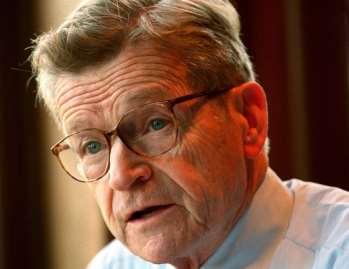
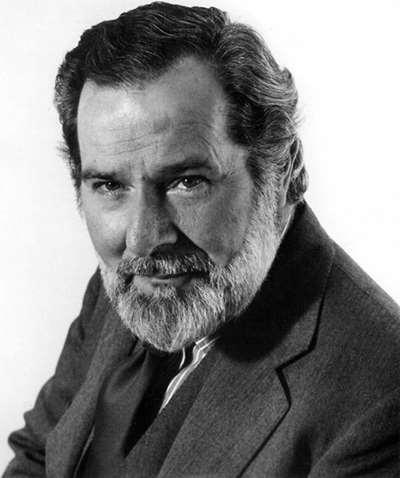

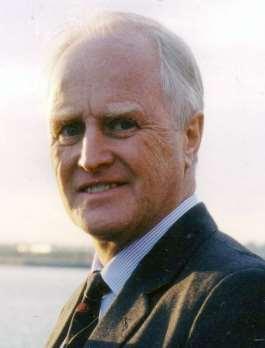

1975-1976
WINSTON S. CHURCHILL (1940-2010) - 1975-76, speaker: "The Soviet Threat in the Middle East and Western Europe”. Winston S. Churchill, son of Randolph and grandson of Sir Winston Churchill, was educated at Eton College and Christ Church, Oxford. Before becoming a Member of Parliament, he was a journalist, notably in the Middle East. Mr. Churchill served in Parliament from 1970 to 1997. Since leaving Parliament, he has written many articles in support of the Iraq War and the fight against Islamic terrorism. He has also edited a compilation of his grandfather's famous speeches entitled Never Give In! The Best of Winston Churchill's Speeches, (ed.), (2003) Mr. Churchill’s other publications include: First Journey, 1964; Six Day War, 1967; Defending the West, 1981; Memories and Adventures, 1989; His Father's Son, 1996; The Great Republic, 1999.
JOHN R. SILBER (1926-2012) - 1975-76 speaker: "Bicentennial Reflections on the No-Fault Life." Silber is an American academic and politician. He received his M.A. and Ph.D. from Yale University in philosophy reading Immanuel Kant. He then taught in Texas before going to Boston University as president. He unsuccessfully ran as the Democratic candidate for governor of Massachusetts in the 1990. Silber was trained in and taught philosophy. He has written two books, Straight Shooting and Architecture of the Absurd.
ALEXANDER SCOURBY (1913-1985) - 1975-76 speaker: "An Evening with Alexander Scourby." Alexander Scourby was an American actor and voice actor noted for his deep and resonant voice. He is particularly remembered for his landmark recording of the entire King James version of the Bible, which was released in numerous editions. He studied journalism at West Virginia University and became interested in campus theater. He started as a Shakespearean actor, was active in radio, was a narrator of documentaries such as “Victory at Sea”, and appeared in the soap operas, “The Secret Storm” and “All My Children.” He was cast in several movies, including “Giant,” with Elizabeth Taylor, James Dean, and Rock Hudson.
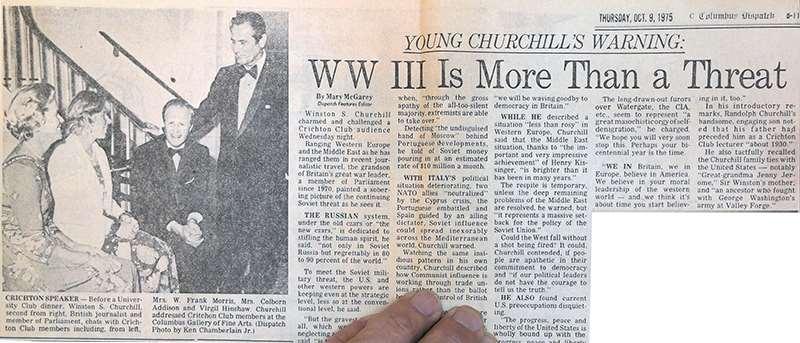
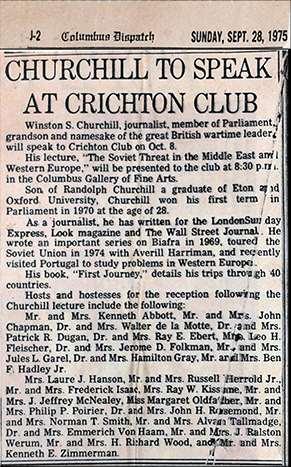
1976-1977
Richard Adams: Education for Literature
Rosamond Bernier: Great Artists in Close-up
Willard R. Johnson: The American Stake in the Achievement of Freedom in Southern Africa
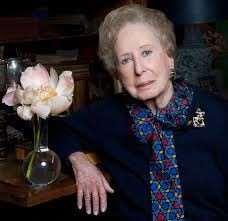

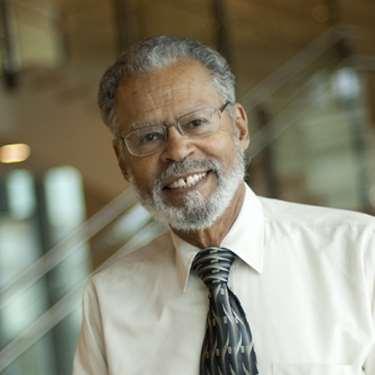

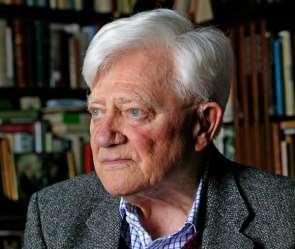

1976-1977
RICHARD ADAMS (1920-2016) - 1976-77 speaker; "Education for Literature." English author Richard Adams began writing full time after six years of active duty in the British Army in World War II, followed by 25 years as a civil servant. His first novel, the widely acclaimed Watership Down, evolved from a series of stories he told his daughters. It took more than two years to write and was reportedly rejected by 13 publishers before its release. Since then, it has sold more than 50 million copies. Adams’s work was recognized with the Carnegie Medal and the Guardian Award for Children's Fiction. After his second novel, Shardik, was published, Adams left public service and devoted his energies entirely to his craft, gaining a reputation as one of the foremost contemporary English authors. In the mid-1970s, Adams came to the U.S. where he was designated Writer-inResidence at the University of Florida and at Hollins College in Virginia.
ROSAMOND BERNIER (1916-2016) - 1976-77 speaker: "Great Artists in Close-up." Rosamond was born in Philadelphia of an American father and English mother. She went to Paris after WWII for a stint on Vogue magazine and stayed twenty years. In 1955 she founded the art magazine L’Oeil and became a friend of many European artists of the day - Picasso, Matisse, Miro, Leger, Moore. She returned to the U.S. in 1971 and began a career as a lecturer - an "art talk spellbinder.” Her husband was John Russell, chief art critic of the New York Times.
WILLARD R. JOHNSON (1935- ) -1976-1977 speaker: "The American Stake in the Achievement of Freedom in Southern Africa.” Dr. Johnson is an emeritus professor of political science at the Massachusetts Institute of Technology. Over 32 years (1964-1996) of teaching, research, and publishing at MIT, he specialized in topics relating to African studies, comparative and international politics, and promotion of development in American inner-city areas. In 1991, he founded the Kansas Institute of African American and Native-American Family History as a non-profit organization that commemorates pioneer African American families of the Midwest and the historic ties between African- and Native-Americans. He co-founded the national Trans Africa (a foreign policy advocacy organization) and its affiliated educational organization, the Trans Africa Forum. He led its Boston chapter and founded its successor, the Boston Pan-African Forum. He is co-author of West African Governments and Volunteer Development Organizations, and author of The Cameroon Federation: Political Integration in a Fragmentary Society, as well as articles and book chapters on issues of African development and foreign relations, and economic and political development of American inner-city areas.
Hedrick Smith: The Texture of Russian Life
1977-1978
Helmut Sonnenfeldt: An Appraisal of our Foreign Policy
David Atlee Phillips: Secret Intelligence: An American Dilemma
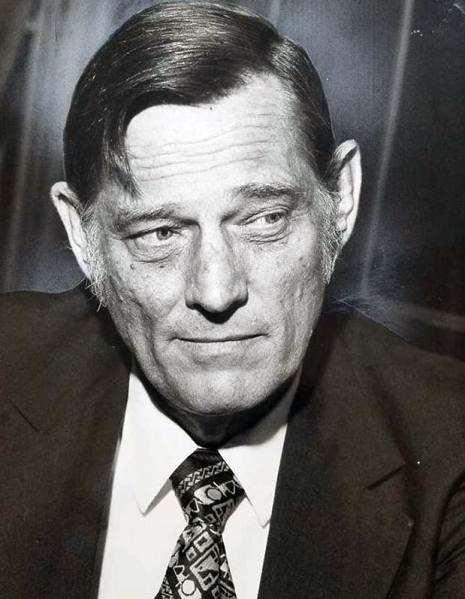

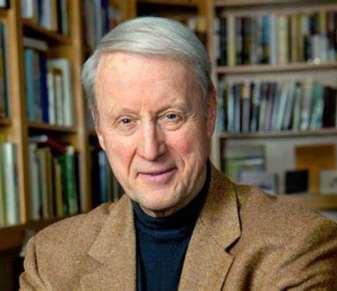



1977-1978
HEDRICK SMITH (1933 - ) - 1978-79 speaker: “The Texture of Russian Life.” Hedrick Smith was born in Scotland in 1933. He received his B.A. from Williams College, did graduate work at Oxford and was a Nieman Fellow at Harvard in 1969-70. He was a reporter and editor for the New York Times from 1962-88 and received a 1971 Pulitzer Prize as a member of the team that produced the Pentagon Papers story. He won the 1974 Pulitzer for his stories from Russia and Eastern Europe. Hedrick is an Emmy Award winning producer/correspondent for the PBS show “Frontline” where he produced twenty shows. For 25 years he was a principal panelist on PBS’s “Washington Week in Review.” He wrote the best sellers The Russians (1976), The Power Game: How Washington Works”(1988) and Rethinking America (1995)
HELMUT SONNENFELT (1926 -2012) 1977-78 speaker: “An Appraisal of our Foreign Policy.” Helmet was born in Berlin, Germany to physician parents. In 1938 he was sent to boarding school in England and remained there until 1944 when he emigrated to the United States. He served in the U.S. Army in the Philippines and in the U.S. occupation forces in Germany. After his service he attended John Hopkins and received his MA in 1951 at their school of Advanced International Studies. He became a member of the staff of the U.S. Department of State in 1952 and was a senior staff member of the National Security Council from 1969-74. After leaving the State Department in 1977 he became a guest lecturer at the Brookings Institution. He authored Soviet Politics in the I980’s (1985).
DAVID ATLEE PHILLIPS (1922-1988) - 1977 -78 speaker: “Secret Intelligence: An American Dilemma.” Born in Fort Worth, Phillips attended William and Mary College and Texas Christian University. Phillips joined the CIA as a part-time agent in 1950. At the time, Phillips lived in Chile, where he owned and edited The South Pacific Mail, an English-language newspaper, circulated throughout South America and on islands in the Pacific. Phillips rose through CIA ranks eventually becoming chief of all operations in the Western hemisphere, serving primarily in Latin America, Cuba, Mexico, and the Dominican Republic. In later years, Phillips and the CIA were severely criticized by authorities concerned about the CIA’s power. Following his retirement, Phillips extensively wrote and lectured on the need for U.S. intelligence. He also founded the Association of Former Intelligence Officers. Phillips authored five books including his CIA memoirs, The Night Watch (1977).
John Cairney: The Robert Burns Story
William H. Webster: Tasking the FBI in a Free Society
Elmo R. Zumwalt, Jr.: The World and Regional Tensions



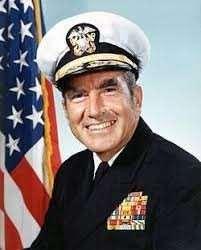

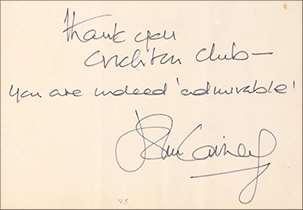
1978-1979
JOHN CAIRNEY (1930 - ) - 1978-79 speaker: "The Robert Burns Story." Born in Scotland, Cairney has worked as an actor, recitalist, lecturer, director and theater consultant, author, and painter. Trained at the Royal Scottish Academy of Music and Drama as a classical actor and singer, he was a lead and supporting screen actor during the 1950s and 60s and gained prominence with his solo stage performances based on the works of Robert Burns. He met Allanah 0’Sullivan in 1977 and they married in 1980. He formed the Penny farthing Partnership in 1991 in New Zealand and John Cairney, Ltd. in 2009 in Scotland, both with O’Sullivan.
WILLIAM H. WEBSTER (1924- ) -1978-79 speaker: “Tasking the FBI in a Free Society.” The only person to be Director of the FBI (1978-87) and the CIA (1987-91) he is now the Chairman of the Homeland Security Advisory Council. An Amherst College and Washington University Law School graduate, he left private practice for a career in public service. In 2009 he was asked to head up the Fort Hood shooting inquiry.
ELMO R. ZUMWALT, JR. (1920-2000) - 1978-79 speaker: “The World and Regional Tensions.” Crichton Club hosted Elmo R. Zumwalt, Jr. a few years after his retirement from a distinguished and highly decorated 32-year naval career; a graduate of the U.S. Naval Academy in 1942, he concluded his tenure as Chief of Naval Operations in 1974. An outspoken and persistent advocate of effectively integrating racial minorities and women into service during the years of the Vietnam conflict, Zumwalt bridged an era of great social tension. He was regarded as an effective steward of financial and human resources and a vigorous leader in battle. He received the Presidential Medal of Freedom in 1998.
Molly Morris (1978-1980) also recalls the very late arrival of Admiral Elmo Zumwalt and his wife. She persuaded a reluctant but gracious professor from Ohio State University to serve as a last-minute substitute, but just as the program was about to begin, the Admiral entered the auditorium. After his talk the Admiral was surprised and pleased to discover his first questioner to be a fellow admiral and good friend. A long and pleasant reunion followed at the Morris home that evening.
1979-1980
Francis Robinson: The Night the Opera Stopped
David Halberstam: The Media-ization of America
Walter Sullivan: Black Holes - The Edge of Space, The End of Time
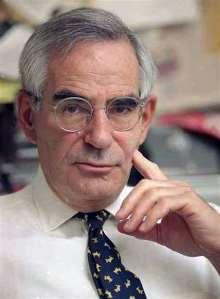

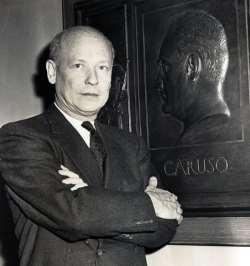

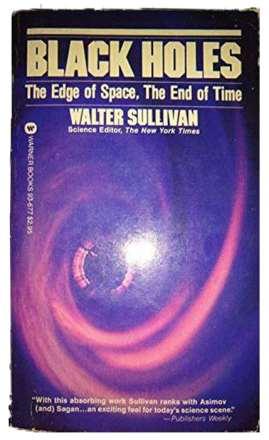

1979-1980
FRANCIS ROBINSON (1910-1980) - 1979-80 speaker: "The Night the Opera Stopped.” Francis Robinson was born in Kentucky and raised in Tennessee. A graduate of Vanderbilt University, Robinson accepted a position at the Metropolitan Opera, where he became the manager of its national and international tours. He later advanced to impresario of the company and received an honorary doctorate degree from Princeton University. He was the host of "Live from the Met" telecasts and was affectionately known as "Mr. Metropolitan.” He was the author of Celebration: The Metropolitan Opera.
DAVID HALBERSTAM (1934-2007) - 1979-80 speaker: "The Media-ization of America." Halberstam was an American Pulitzer Prize-winning author and journalist. He graduated from Harvard University with a B.A. in 1955, where he served as managing editor of the University’s daily newspaper, “The Harvard Crimson.” His career began as reporter for the Daily Times Leader in West Point, Mississippi. He covered the civil rights movement for the New York Times and in the spring of 1967 traveled with Martin Luther King. While at the Times he gathered material for his book The Making of a Quagmire: America and Vietnam during the Kennedy era. At the age of 30 he won a Pulitzer Prize for his reporting on the Vietnam War. He is interviewed in the 1968 documentary film on the Vietnam War entitled “In the Year of the Pig.
WALTER SULLIVAN (1918-1996) - 1957-58 speaker: "South Pole" and 1979-80 speaker: "Black Holes - The Edge of Space." Walter Sullivan covered the fields of science as a reporter for the New York Times for more than 50 years. Sullivan’s peers considered him the "Dean of Science writers", and the number and variety of awards and recognitions he received attest to his stature. As noted, he was twice invited to address the Crichton Club membership. The breadth of Sullivan’s knowledge is reflected in his two topics - the geology and climatology of Antarctica (1958) and the physics and astronomy of deep space (1980).
1980-1981
La Condesa de: Romanones y Quintanilla: American Women in International Politics
Jack Reynolds: Asia Today
Daniel Bell: The U.S. in the 1980's: The Problems Ahead

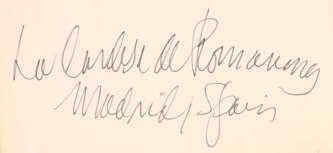
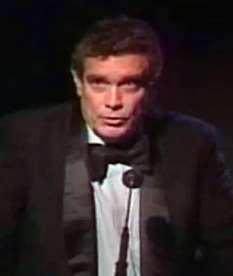

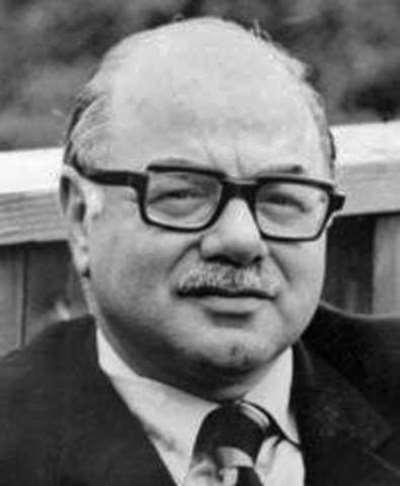

1980-1981
LA CONDESA de ROMANONES y QUINTANILLA (1923- ) - 1980-81 speaker: "American Women in International Politics." The countess was born in Pearl River, New York, as Aline Griffith. On a blind date in Manhattan, she met a recruiter for the Office of Strategic Services, the forerunner of the CIA, and became a spy after a three-year courtship that was interrupted several times by her spy missions. She married Luis Figueroa y Perez de Guzman el Bueno, the Count of Quintanilla of Romanones. Her memoir, The Spy Wore Red (1987), an account of a World War II mission in which she tracked down Nazi sympathizers, made the New York Times best seller list, as did her subsequent novel, The Spy Went Dancing (1990).
JACK REYNOLDS (1934-1996) -1980-81 speaker: "Asia Today.” Jack Reynolds, a broadcast journalist with NBC television for more than 30 years was born in Brooklyn and attended Fordham University, during which time he worked at the college radio station and as a page at NBC. After earning a degree in economics in 1955, he served with the Marine Corps in the Far East and held a number of positions with NBC and public television. In 1961, he became a public-affairs manager and produced documentaries. In 1967, he joined the network as manager of Asian operations for NBC news. He produced and reported on the conflicts in Vietnam, Cambodia, El Salvador, and Lebanon as well as on economics in Japan and Korea. He was one of the first correspondents to visit the People’s Republic of China, covering the visit of the United States Ping Pong team and later, President Richard M. Nixon’s trip to China in 1972.
DANIEL BELL (1919-2011) - 1980-81 speaker: “The U.S. in the 1980’s: The Problems Ahead.” Bell is a sociologist and professor emeritus at Harvard University. He is also a director of Suntory Foundation and a scholar in residence of the American Academy of Arts and Sciences. He received the "Lifetime Achievement Award" from the American Sociological Association in 1992 and the Talcott Parsons Prize for the Social Sciences by the American Academy of Arts and Sciences in 1993. Bell started his career as a journalist. In 1960, Columbia University awarded him a Ph.D. degree. He taught sociology first at Columbia and then at Harvard until his retirement in 1990. He is best known for his contributions to post-industrialism. His most influential books are The End of Ideology (1960), The Cultural Contradictions of Capitalism (1976), and The Coming of Post-Industrial Society (1973).
Iris Love: Archaeology Today
Alfred Kahn: Solving the Economic Issues of the Eighties
Joseph Engelberger: Robotics: An Executive Overview
1981-1982
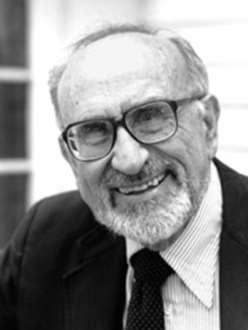

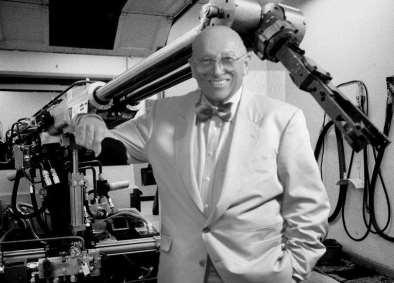
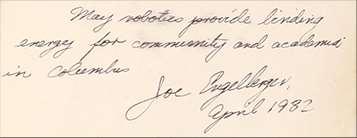
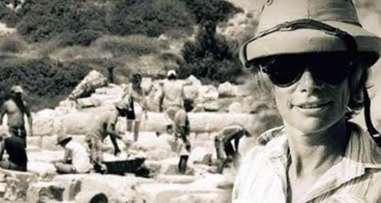

1981-1982
IRIS LOVE (1933-2020) -1981-82 speaker: “Archeology Today.” Bom to great wealth. Love graduated from Smith College and studied archeology at New York University Institute of Fine Arts. Her career in archeology is highlighted by her rediscovery of the Temple of Aphrodite at Knidos that once held a statue by Praxiteles. A well-known socialite, she is a prize-winning breeder of dachshund dogs.
ALFRED KAHN (1917-2010)- speaker 1981-82: “Solving the Economic Issues of the Eighties.” Dr. Kahn received his bachelor’s and master’s degrees from New York University and a doctorate in economics from Yale University. Kahn chaired the Department of Economics at Cornell University, where he also served as Dean and Trustee. Commonly known as the "Father of Airline Deregulation," Kahn chaired the Civil Aeronautics Board during the period when it ended its regulation of the airline industry. Kahn also served on many public and private boards, including the Council on Wage and Price Stability, the President’s Council of Economic Advisors, the National Commission for Review of Antitrust Laws and Procedures, and the National Governing Board of Common Cause. For 15 years, Kahn was a regular commentator on PBS’s "The Nightly Business Report."
JOSEPH ENGELBERGER (1925-2015) – 1981-82 speaker: “Robotics: An Executive Overview.” Engelbeger is an engineer and entrepreneur, often credited with being the “Father of Robotics.” Engelberger developed the first industrial robot in the United States, the Unimate, in the 1950’s. Later, he worked as entrepreneur and vocal advocate of robotic technology beyond the manufacturing plant in a variety of fields, including service industries, health care, and space exploration.
Since the beginning of the club, the dress of both speakers and members has been a topic for discussion. The tradition of black tie for members has been reviewed by the Board and secret ballots have even been taken at Board meetings to see if it should be discontinued. The Board has always voted to continue. A few years ago, when a new member inquired of her sponsor if it would be acceptable to wear a tuxedo pant suit, she was advised against it. That evening, the archeologist Iris Love was the speaker and she appeared in gold lame knickers.
1982-1983
John Cairney and Alannah O'Sullivan: "Two for a Theatre"
Robert J. Ryan, Jr.: Caribbean Basin Initiative
Donald C. Johanson: In Search of Man's Origins

No photograph available.

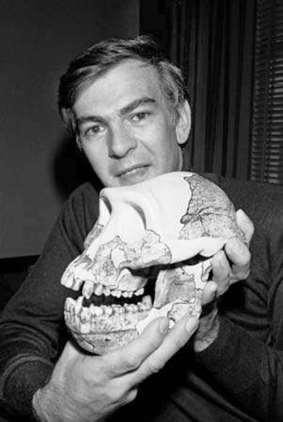

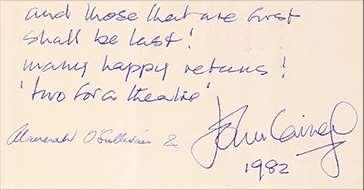

1982-1983
ALANNAH O’SULLIVAN (1951-)- 1978-79 speaker with JOHN CAIRNEY - 1982-83: "Two For A Theatre." Alannah’s career as an actress and scriptwriter has spanned more than 20 years and six continents. Alannah first appeared on stage with her mother and six sisters. She graduated from the University of Canterbury with a master’s degree in English and a stream of professional acting engagements followed at New Zealand’s leading theatres. She partnered with her husband, John Cairney, in “Two for A Theatre” and toured the world for 12 years. Between them they developed 30 hours of material and appeared in a host of venues including the Speakers’ Circuit in the U.S. At present she is writing scripts, developing her own projects, and managing John Cairney Ltd. In Glasgow, Scotland.
JOHN CAIRNEY (1930 - ) - 1978-79 speaker: "The Robert Burns Story." Born in Scotland, Cairney has worked as an actor, recitalist, lecturer, director and theater consultant, author, and painter. Trained at the Royal Scottish Academy of Music and Drama as a classical actor and singer, he was a lead and supporting screen actor during the 1950s and 60s and gained prominence with his solo stage performances based on the works of Robert Burns. He met Allanah 0’Sullivan in 1977 and they married in 1980. He formed the Penny farthing Partnership in 1991 in New Zealand and John Cairney, Ltd. in 2009 in Scotland, both with O’Sullivan.
ROBERT J. RYAN, JR. (1939 - ) - 1982-83 speaker: "Caribbean Basin Initiative." Robert J. Ryan, Jr. a career Foreign Service officer, served as coordinator of the Caribbean Basin Initiative in 1983. He assisted Stephen Bosworth, Deputy Assistant Secretary of State. Mr. Bosworth was responsible for advising Thomas Enders, Assistant Secretary of State for Inter-American Affairs, who had the confidence of Secretary Alexander Haig. President Reagan, warning of the danger of "new Cuba’s" had proposed an economic plan for the Caribbean, the Caribbean Basin Initiative, as a means of dealing with the poverty and social inequality that has produced upheavals as the civil war in El Salvador. Robert J. Ryan, Jr. was upgraded to ambassadorial rank to give him greater authority in 1982. He was named ambassador to the Republic of Mali in 1984.
DONALD C. JOHANSON (1943 - ) - 1982-83 speaker: “In Search of Man’s Origins.” Johanson, a paleoanthropologist, was born in Chicago, Illinois and earned his B.A. at the University of Illinois in 1966. He received his master’s degree, and in 1974 his Ph.D. from the University of Chicago. That same year he discovered the skeleton of “Lucy,” a female hominid Australopithecus afarensis in Hadar, Ethiopia. She was named after the Beatles’ song, “Lucy in the Sky with Diamonds,” which was played repeatedly the night of the discovery. Johanson’s team found other teeth and bones in the area from at least 13 other individuals that are estimated to be about 3.2 million years old. As a professor, Johanson taught at Case Western Reserve, University of Berkeley and Arizona State University. He wrote many books about Lucy, the latest in 2009 –Lucy's Legacy: The Quest for Human Origins.
1983-1984
Jonathan B. Gans: The Middle East
Robert Hughes: The Face of Power: Art, Politics and Propaganda
Mouza Coutelais-du-Roche Zumwalt: China Revisited
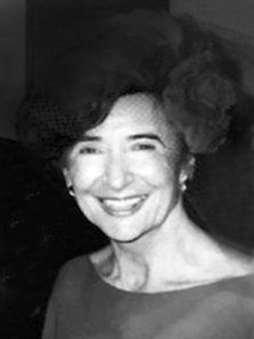

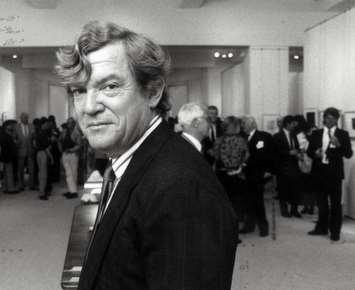


No photograph available.

1983-1984
JONATHAN B. GANS 1983-84 speaker: “The Middle East.” Gans “who came on the spur of the moment!” as he wrote with his autograph, November 29, 1983, is an author and free-lance writer. He has worked on the staff of Foreign Policy magazine and has been a research associate with the Carnegie Endowment for International Peace. He lived in the Arab World for a decade, working for a variety of non-profit foreign policy foundations, and then traveled the national lecture circuit.
ROBERT HUGHES (1938-2012) – 1982-83 speaker: “The Face of Power: Art, Politics, and Propaganda.” Australian author and art critic, Hughes published The Art of Australia in 1966, still considered an important work. Settling in London in 1965, he wrote for several newspapers before being named to write about the arts for Time magazine, in which position he established himself in the U.S. as an influential art critic. Hughes published the international best seller, The Fatal Shore in 1987. His other major works are in television and film: the Shock of the New, Crumb, and American Visions.
MOUZA CONTELAIS-DU-ROCHE ZUMWALT (1922-2005) - 1983-84 speaker: “China Revisited.” Born in China to a French-Russian family, Mouza Zumwalt had a life with many turns. From Harbin, Manchuria, she moved to Shanghai during World War II where she met her future husband Admiral Elmo Russell Zumwalt Jr. At that time, he commanded a riverboat that sailed up the Yangtze River. During their marriage, they moved forty times while raising four children. Their son was in Vietnam when Agent Orange was used, and he contracted leukemia which was treated with a bone marrow transplant from his sister. The Zumwalts were instrumental in starting the national registry of bone marrow donors in 1982.
Strobe Talbott: Nuclear Arms Control: The Current Stalemate and the Prospect for the Future
James Q. Wilson: Private Virtue and the Public Good
James S. Trefil: The Moment of Creation
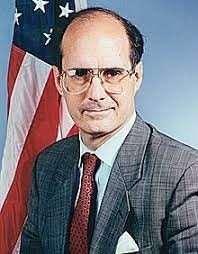



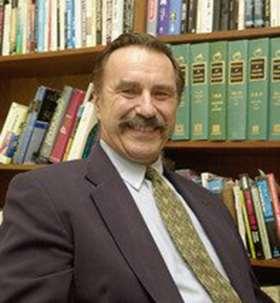

1984-1985
NELSON STROBRIDGE “STROBE” TALBOTT III (1946- ) - 1984-85 speaker: "Nuclear Arms Control: The Current Stalemate and the Prospect for the Future." Strobe Talbott is an American foreign policy analyst associated with Yale University and the Brookings Institution in Washington D.C. and is a former SovietAmerican relations correspondent with Time magazine. He became friends with former President Bill Clinton when he and Clinton were Rhodes Scholars at the University of Oxford. He served as the Deputy Secretary of State from 1994 to 2001. He is the author of several books, including “The Great Experiment: The Story of Ancient Empires,” “Modern States,” and the” Quest for a Global Nation” (2008)
JAMES Q. WILSON (1931-2012) - 1984-1985 speaker: “Private Virtue and the Public Good.” A political scientist, Dr. Wilson is professor and senior fellow at the Clough Center for the Study of Constitutional Democracy at Boston College. He received his B.A. at the University of Redlands and an M.A. and a Ph.D. in political science at the University of Chicago. He was Professor of Government and Professor of Management and Public Policy at the UCLA School of Management. Most recently he was Professor of Public Policy at Pepperdine University. He served in government on the White House Task Force on Crime, the National Advisory Commission on Drug Abuse Prevention, the Attorney General's Task Force on Violent Crime, the President's Foreign Intelligence Advisory Board, and the President's Council on Bioethics.
JAMES S. TREFIL (1938- ) - 1984-85 speaker: "The Moment of Creation". Trefil is an American physicist and is the Robinson Professor of Physics at George Mason University. As the author of more than thirty books, Trefil concentrates on science for the general audience and has written and lectured on the comparisons between human and artificial intelligence. Some of Trefil’s books include, Are We Unique: A Scientist Explores the Complexity of the Human Brain (1997), A Scientist in the City (1994), and The Moment of Creation. (1983)
Strobe Talbott's visit could not have been better timed his book, Deadly Gambits had just been featured in the New York Times Book Review section and had won the Times annual best book award. President Ann Follansbee Wright (1984-1985) carried the book to the airport as identification. He had not seen the review and did not know about the prize. Ann had great fun introducing him that evening and announcing his great honor.
1985-1986
Roger Fisher: Negotiating with the Russians: What would be a Successful Summit?
Peter Eisenman: The State of Architecture
Albert Shanker: The Future of American Education: What Direction Will We Take?


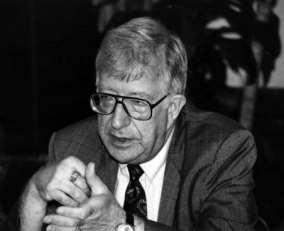

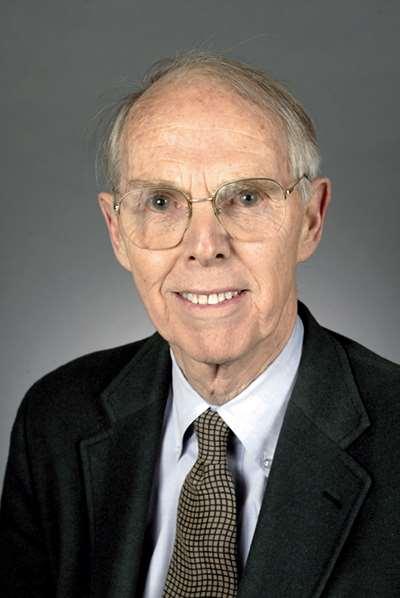

1985-1986
ROGER FISHER (1922 -2012) - 1985-86 speaker: "Negotiating with the Russians: What Would be a Successful Summit?" Roger Fisher is Samuel Williston Professor of Law emeritus at Harvard Law School and director of the Harvard Negotiation Project. A specialist in negotiation and conflict management, he has worked as an advisor on peace processes, hostage crises, diplomatic negotiations, and commercial and legal disputes. He is co-author of the best-selling, Getting to Yes (1981) and Beyond Reason: Using Emotions as You Negotiate (2005).
PETER EISENMAN (1932 - ) -1985-86 speaker: "The State of Architecture." Peter Eisenman is an internationally recognized architect, best known in Columbus for his innovative designs of the Columbus Convention Center and the Wexner Center for the Arts at The Ohio State University. He was considered the leader of the New York Five, a group of young architects that included Charles Gwathmey, Michael Graves, Richard Meier and John Hejduk, who were exploring modernist and post-modern inventive architectural forms His academic career includes teaching at the universities of Cambridge, Princeton, Illinois, and Ohio State.
ALBERT SHANKER (1928-1997) - 1985-86 speaker: "The Future of American Education: What Direction Will We Take?” As a young boy, Albert Shanker read several newspapers a day with a thirst for knowledge and a love of philosophy. To earn money while writing his dissertation at Columbia University, Shanker became a substitute teacher. During his subsequent years in teaching, he became a union organizer. He received national attention and considerable criticism for his aggressive union leadership. Shanker served as the President of the United Federation of Teachers for 20 years, and the President of the American Federation of Teachers for more than 20 years. He was posthumously awarded the Presidential Medal of Freedom in 1998 by President Bill Clinton.
Heywood Hale Broun: The Art of Winning
1986-1987
Charles Murray: New Perspectives on Social Policy
Sherman Lee: The Significance of Far Eastern Art



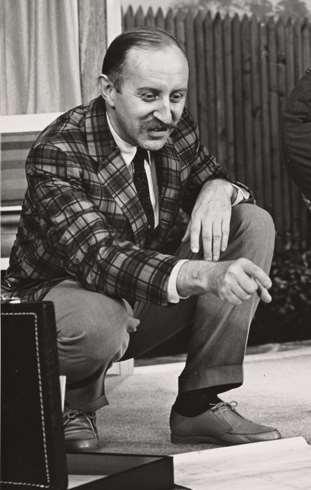
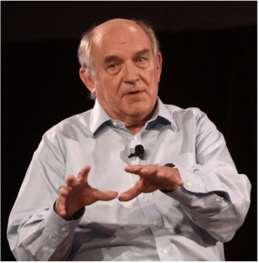

1986-1987
HEYWOOD HALE BROUN (1918-2001) - 1986-87 speaker: "The Art of Winning." Heywood Hale Broun was destined to be a journalist. His mother was the nation’s first female movie critic, and his father was a respected columnist. Thus, after college, he began a similar career, initially as a sportswriter for a New York City tabloid. Following a tour of active duty in World War II, Broun returned to the newspaper world, but in the 1950’s, he also showed talent as an actor on stage and in television. In the mid-1960’s, he joined CBS where he became an engaging sports commentator, focusing especially on horseracing, baseball, and golf. His distinctive attire, handlebar moustache, and well-modulated voice made him one of the most recognizable television personalities for more than two decades.
CHARLES ALAN MURRAY (1943- ) - 1986-1987 speaker: “New Perspectives on Social Policy.” Murray is an American libertarian political and social scientist, author, and columnist who currently is a fellow at the American Enterprise Institute in Washington, DC. He is best known for his controversial book, The Bell Curve, co-authored with the late Richard Herrnstein in 1994, which discusses the role of IQ in American society. Among other titles, he has written, In Pursuit: Of Happiness and Good Government (1988), In Our Hands: A Plan to Replace the Welfare State (2006) and Real Education: Four Simple Truths for Bringing America's Schools Back to Reality (2008).
SHERMAN LEE (1918-2008) - 1986-87 speaker: “The significance of Far Eastern Art.” Lee was an American academic, writer, art historian, and expert on Asian art. Director of the Cleveland Museum of Art for 25 years, he began working at there in 1952 as its curator of Oriental art. He served in the Navy during World War II and from 1946 to 1948, as a civilian in Tokyo, he worked on cataloging and preserving Japanese artworks. He was associate director of the Seattle Art Museum and curator of Far Eastern art at the Detroit Institute of Art before joining the Cleveland Museum. As director, he expanded not only the collections but also the museum itself, notably adding a wing devoted to education in 1971.
1987-1988
Michael Duffy: A Reporter in Washington: Stumbling Through the Mine Field
Lee H. Hamilton: The Iran-Contra Affair as Viewed by the Co-Chairman of the Investigative Committee
Seyyed H. Nasr: The Islamic World View: Sunni and Shia
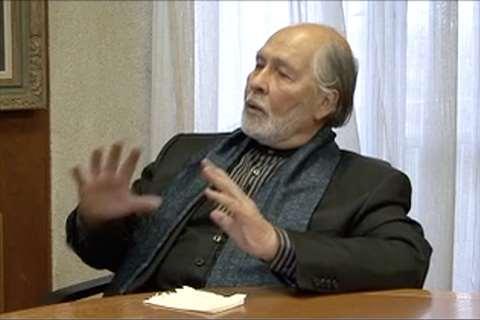
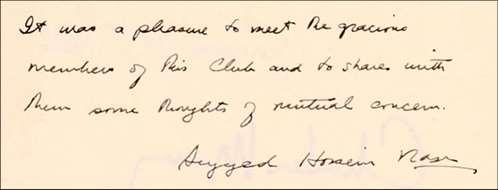




1987-1988
MICHAEL DUFFY (1958- ) - 1987-88 speaker: "A Reporter in Washington: Stumbling Through the Mine Field.” A native of Columbus and 1980 graduate of Oberlin College, Duffy joined Time in 1985 as a Pentagon correspondent. Duffy served as the publication’s Washington Bureau Chief from 1997 until 2005, when he was named assistant managing editor. Duffy has written or co-written more than 40 Time cover stories and is a regular contributor to Time.com. Duffy co-authored The Preacher and the Presidents: BilIy Graham in the White House (1997) and Marching in Place: The Status Quo Presidency of George Bush (1992). Duffy is a two-time recipient of the Gerald R. Ford Award for distinguished reporting and a co-winner of the Goldsmith Award for investigative reporting from Harvard University.
LEE H. HAMILTON (1931 - ) - 1987-88 speaker: “The Iran-Contra Affair as Viewed by the Co-Chairman of the Investigative Committee.” Lee Hamilton had a long (17 terms) and distinguished tenure as a member of the U.S. House of Representatives representing an Indiana constituency. As an increasingly senior member of the Democrat congressional majority during most of those years, he discharged major responsibilities in the areas of intelligence and foreign affairs. First elected in 1964, his prominent role in guiding the special committee that was charged to inquire into covert arms transactions with Iran, thrust him into the political and media spotlights. After retiring from Congress in 1999, he has accepted a number of significant assignments, including vice-chair of both the 9/11 Commission and the Iraq Study Group.
SEYYED HOSSEIN NASR (1933- ) - 1987-1988 speaker: "The Islamic World View: Sunni and Shia." Nasr, one of the world’s leading experts on Islamic science and spirituality, is University Professor of Islamic Studies at George Washington University. Author of over 50 books and 500 articles, which have been translated into several major Islamic, European, and Asian languages, Nasr is a well-known and highly respected intellectual figure both in the West and the Islamic world. He has also taught at Harvard, Tehran University, Arya Mehr University (Sharif University), University of Edinburgh, Temple University. Nasr is fluent in Persian, English, French, German, Spanish and Arabic.
1988-1989
Diana Eck: Religion at the Crossroads: The Challenge of Religious Diversity Today
Charles Kaiser: 1968 In America
Paul Goldberger: Buildings Versus Cities: The Struggle for a Sense of Place
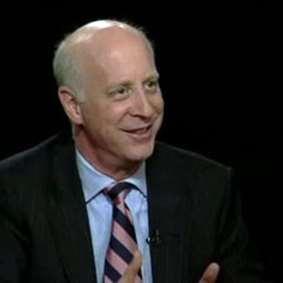



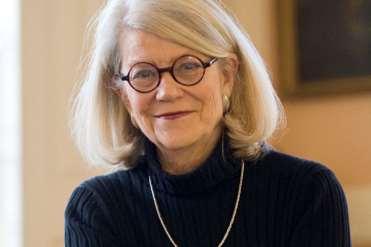

1988-1989
DIANA ECK (1945 -) - 1988-89 speaker: Religion at the Crossroads: The Challenge of Religious Diversity Today.” Dr. Eck is a Professor of Comparative Religion and Indian Studies at Harvard Divinity School. She received her BA in religion from Smith College in 1967 and her PhD from Harvard. In 2001 her book, A New Religious America was published. It deals with the growing religious diversity in the U.S.
CHARLES KAISER (1950- ) - 1988-89 speaker: “1968 in America.” Charles Kaiser’s presentation to Crichton Club took the title of his well-received and recently published book, a highly personal reflection on the single year that many regard as the epitome of a turbulent decade. During 1968, Kaiser was both an observer of and participant in the melding of politics, music, drugs, war, protests, affluence, poverty, individual freedom, and social control. His research was heavily influenced by his unlimited access to the papers of Theodore H. White (Making of a President) volumes who was a close friend. Kaiser, a practicing journalist, is widely published and is an active blogger.
PAUL GOLDBERGER (1950-) - 1988-89 speaker: "Building versus Cities: The Struggle for a Sense of Place." Paul Goldberger is the Architecture Critic for The New Yorker, where since 1997 he has written the magazine’s celebrated “Sky Line” column. He also holds the Joseph Urban Chair in Design and Architecture at The New School in New York City. He was formerly dean of the Parsons school of design, a division of The New School. He began his career at the New York Times, where in 1984 his architecture criticism was awarded the Pulitzer Prize for Distinguished Criticism, the highest award in journalism.
1989-1990
Howard Nemerov: A Reading of His Poems with Informal Comments
John Brooks Slaughter: Putting Integrity Back into Athletics
S. Frederick Starr: Is the Soviet Union Collapsing? If so, What Then?

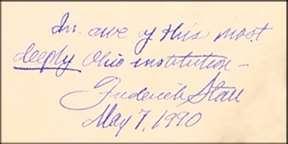
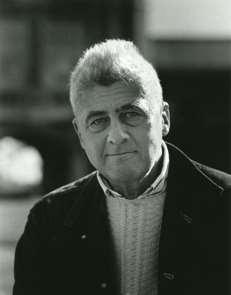



1989-1990
HOWARD NEMEROV (1920-1991) - 1989-90 speaker: “A Reading of His Poems with Informal Comments.” Howard Nemerov was a poet, a teacher, a novelist, critic, editor, and playwright. Born in New York, he displayed an interest in the arts from an early age. He graduated from the Harvard University with a bachelor’s degree in 1941. Throughout World War II, he served as a pilot in the royal Canadian unit of the U. S. Army Air Force. He authored fourteen books of poetry, including The Collected Poems of Howard Nemerov, which won the Pulitzer Prize, the National Book Award, and the Bollingen Prize. From 1988 to 1990 Nemerov was Poet Laureate of the United States.
JOHN BROOKS SLAUGHTER (1934 - ) - 1989-90 speaker: “Putting Integrity Back into Athletics.” Born in Kansas, Slaughter, an expert in electrical engineering, served as Director of the Applied Physics Laboratory, U.S. Navy-supported research at the University of Washington. In 1977, President Carter named Slaughter Assistant Director of the Astronomical, Atmospheric, Earth and Ocean Sciences directorate of the National Science Foundation. In 1980, at the request of President Carter, Slaughter became the first African American appointed to direct the National Science Foundation. Two years later he became chancellor of the University of Maryland and in 1988 became President of Occidental College. Slaughter greatly diversified the student bodies, faculty, and course offerings at both institutions. From 1986-88, he chaired the President’s Commission of the National Collegiate Athletic Association. In 2000, Slaughter became President and Chief Executive Officer of the National Action Council for Minorities in Engineering.
S. FREDERICK STARR (1940-) - speaker 1989-90: "Is the Soviet Union Collapsing? If So, What Then?” Starr is the founder and Chairman of the Central Asia-Caucasus Institute and a noted musician. He received his B.A. from Yale University in 1962 and his Ph.D. in history from Princeton University. He is fluent in Russian and is the author or editor of 20 books and more than 200 articles on Russian and Eurasian affairs. Starr began work in the Turkic world as an archaeologist in Turkey and went on to found the Kennan Institute for Advanced Russian Studies, which opened U.S. research contact with Central Asia. He served as vice president of Tulane University and president of Oberlin College (1983-94) and the Aspen Institute. He has advised three U.S. presidents on Russian/Eurasian affairs and chaired an external advisory panel on U.S. government sponsored research.
1990-1991
Lisbeth Schorr: The Anomaly of an American Underclass: What Can Be Done?
John Seigenthaler: Freedom of the Press: A 200-Year-Old Luxury or Liability?
Helen Thomas: Watchdog at the White House: Covering Presidents from Kennedy to Bush
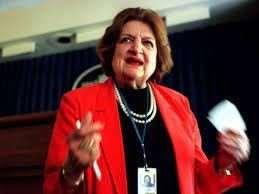

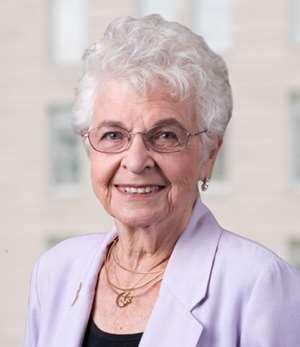



1990-1991
LISBETH SCHORR (1931 - ) 1990-91 speaker: "The Anomaly of an American Underclass: What Can Be Done?" Lisbeth Schorr is a Harvard University researcher whose efforts are focused on analyzing and evaluating the level(s) of success attained by a variety of measures aimed at reducing poverty, social dependency, youth violence, and school failure, among other social concerns. As an author, she has identified those initiatives which she regards as having the greatest applicability and greatest likelihood of success. Her book (co-authored with her husband, Daniel Schorr) Within our Reach: Breaking the Cycle of Disadvantage (1988) attracted great attention among public officials and students of public policy.
JOHN SEIGENTHALER (1929-) - 1990-91 speaker: "Freedom of the Press: A 200-Year-Old Luxury or Liability?” Seigenthaler is an American journalist, writer, and political figure. Born in Tennessee he served in the U.S. Air Force from 1946-49. He joined The Tennessean in 1949, resigning in 1960 to act as Robert F. Kennedy’s administrative assistant. He rejoined The Tennessean as editor in 1962, publisher in 1973 and chairman in 1982 before retiring as chairman emeritus in 1991. He was founding editorial director of USA Today from 1982-1991. During the same time, he served on the board of directors for the American Society of Newspaper Editors and from 1988 to 1989 was its president. He founded the Freedom Forum First Amendment Center at Vanderbilt University.
HELEN THOMAS (1920 - 2013) - 1990-91 speaker: “Watchdog at the White House: Covering Presidents from Kennedy to Bush.” Variously described as the “consummate Washington insider” and “tireless questioner of authority,” Thomas served 57 years as White House Bureau Chief for United Press International. She was the “dean of the White House Press Corps”, the only member to have an assigned, named chair. The tradition of ending each press conference with “Thank you, Mr. President” is attributed to her. Born in Kentucky to Lebanese Christian immigrants, she was raised in Detroit and was a 1942 graduate of Wayne University (now Wayne State University). She has written five books and was awarded the Thomas Paine Journalism Award in 1998. In 2000 she resigned in protest after UPI was purchased by Rev. Sun Myung Moon’s Unification Church.
1991-1992
Edward L. Warner III: The Disintegration of the Soviet Union: Is the Sum of the Parts Greater than the Whole?
Bernard C. Watson: Changes and Choices: Are We Prepared to Face Reality?
John E. Frohnmeyer: The War on Culture
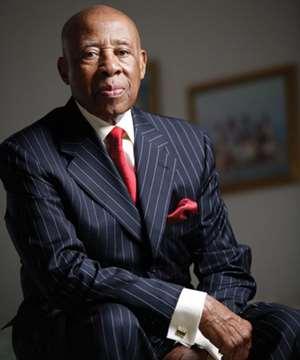



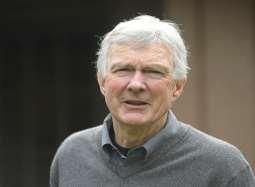

1991-1992
EDWARD L. WARNER III (1920-2014) - 1991-92 speaker: "Disintegration of the Soviet Union: Is the Sum of the Parts Greater than the Whole?" As a senior defense analyst at the non-profit RAND Corporation in Washington, D.C., Edward (Ted) Warner is responsible for conducting studies on various U.S. defense and national security policy issues. He also works with the defense ministries in Europe and the New Independent States on a wide range of contemporary defense issues. He is a former Assistant Secretary of Defense for Strategy and Requirements and Assistant Secretary of Defense for Strategy and Threat Reduction. A graduate of the Naval Academy, he holds a Ph.D. in politics from Princeton.
BERNARD C. WATSON, Ph.D. (1928- ) - 1991-92 speaker: “Changes and Choices: Are We Prepared to Face Reality?” A respected educational, business, and civic leader. Dr. Watson established the graduate program in urban education at Temple University and later became Temple’s first African American vice president. He currently serves on numerous civic and educational boards and foundations and has authored several books, among them: Stupidity, Sloth, and Public Policy, 1973; In Spite of the System, 1974; and Colored, Negro, Black: Chasing the American Dream, 1997.
JOHN (EDWARD) FROHNMEYER (1942- ) - 1991-92 speaker: “The War on Culture.” Frohnmeyer is a decorated former officer who served in the U.S. Navy from 1966 to 1980. He was appointed by President George H. W. Bush in 1989 to chair the National Endowment for the Arts, but resigned 1992 under pressure from religious interests over the funding of controversial art projects. He is the author of Leaving Town Alive,1993, about his NEA experience, and Out of Tune, published in 1995. He ran unsuccessfully for U.S. Senate in 2008 as an independent from Oregon and currently is an Affiliate Professor of Liberal Arts at Oregon State University.
1992-1993
James O. Freedman: Higher Education and the Promise of American Life
Charlotte Rae: An Evening with Charlotte Rae
Jerrold M. Post: The Mind of the Terrorist
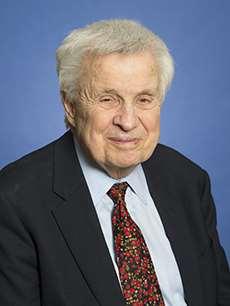

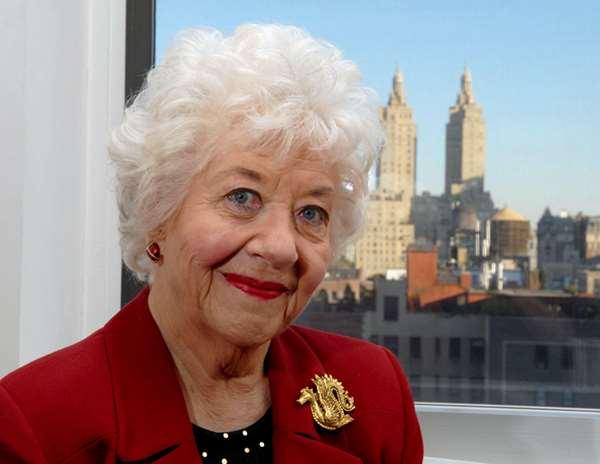

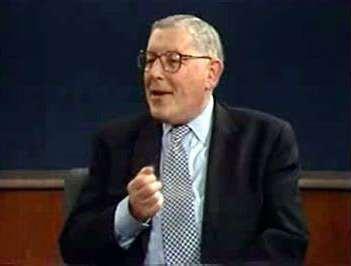

1992-1993
JAMES (OLIVER) FREEDMAN (1935-2006) - 1992-93 speaker: “Higher Education and the Promise of American Life.” Educated at Harvard College and Yale Law School, Freedman became a distinguished educator and academic administrator. He served as President of the University of Iowa from 1982 to 1987 and of Dartmouth College from 1987 to 1998. He is the author of Idealism and Liberal Education, 1996, and Liberal Education and the Public Interest, 2003.
CHARLOTTE RAE (1926 - 2018) - 1992-93 speaker: "An Evening with Charlotte Ray." Rae was born Charlotte Rae Lubotsky in Milwaukee, Wisconsin. A stage actress since the 1950s, she found her place on television. Her first significant success was on "Car 54, Where are You?" She later found fame as the housemother in "Different Strokes" and "Facts of Life."
JERROLD M. POST, M.D. (1934- 2020) - 1992-93 speaker: “The Mind of the Terrorist.” Dr. Post received his undergraduate education at Yale, followed by an MD degree in 1960 and became an expert in psychiatry and political psychology. During a distinguished career with the Central Intelligence Agency, he served as an advisor to U.S. presidents. He is a commentator on national and international media on the psychology of terrorism, on mental illness in leaders, and on figures such as Osama bin Laden, Saddam Hussein, and Kim Jong II. He has authored numerous books, most recently The Mind of a Terrorist, 2007. Dr. Post is currently Professor of Psychiatry, Political Psychology and International Affairs, and Director of the Political Psychology Program at The George Washington University. He also maintains a private practice.
1993-1994
Paul E. Peterson: Intergenerational Conflict: Should Children have the Right to Vote?
Anna Kisselgoff: The Arts in the 21st Century
Martin Marty: Uncommon Faiths and the Common Good: Religion and American Multiculturalism Today
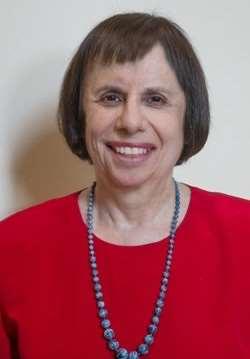

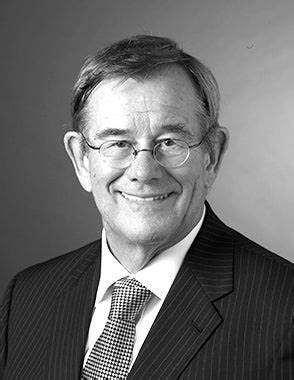



1993-1994
PAUL E. PETERSON (1940- ) - 1993-94 speaker: “Intergenerational Conflict: Should Children have the Right to Vote?" Paul Peterson is a leading scholar on education reform. His work has primarily focused on the importance of parental choice for improving school outcomes. He is editor- in-chief of Education Next, an educational policy journal designed to bring a balanced perspective on research and policy. He holds academic appointments at Harvard University and the Hoover Institution at Stanford University. He has written more than 100 articles and more 30 books, including School Money Trials: The Legal Pursuit of Educational Adequacy (2007).
ANNA KISSELGOFF (1938- ) - 1993-94 speaker: "The Arts in the 21 Century.” Anna Kisselgoff is an American dance critic. She studied ballet in New York starting at age four with Valentina Belova and Jean Yazvinsky. She graduated from Bryn Mawr College, the Sorbonne and received her M.S. in journalism at Columbia University. She has been a dance critic and reporter for the New York Times since 1968 and its principal dance critic since 1977. She has taught at Yale University and Barnard College and was appointed Knight of the Dannebrog by Queen Margrethe 11 of Denmark and Chevalier des Arts et Letters by the French government.
MARTIN MARTY (1928 - ) - 1993-94 speaker: "Uncommon Faiths and the Common Good: Religion and Multiculturalism Today." Born in Nebraska, Marty received his Ph.D. from the University of Chicago in 1956, served as a Lutheran pastor for 10 years and then, from 1963-98, taught at Chicago’s Divinity School. He serves St. Olaf College as Senior Regent and has been a columnist for The Christian Century magazine since 1956. He writes extensively on 19th and 20th century American religion. He won the National Book Award for Righteous Empire: The Protestant Experience in America. (1970)
75th Anniversary
The winter of the 75th anniversary year was one of the most severe in Ohio history. The city was encased in ice on February 8, 1994, and Mayor Greg Lashutka urged residents to stay home. Almost one-hundred Crichton Club members disobeyed the mayor and ventured out to hear Anna Kisselgoff, dance critic for the New York Times, deliver a lecture on "The Arts in the 21st Century."
1994-1995
Paul M. Kennedy: Reforming the United Nations: Problems and Opportunities
Patricia Neighmond: Whatever Happened to Health Care Reform? Medicine and politics in the United States
Robert P. Kirshner: Taking the Measure of the Universe
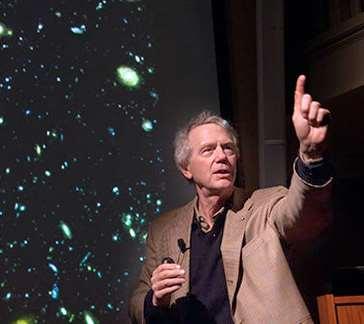

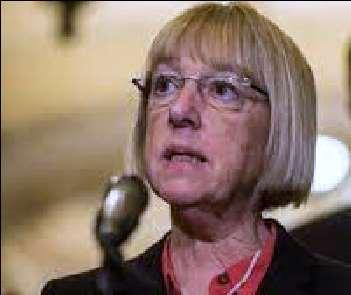
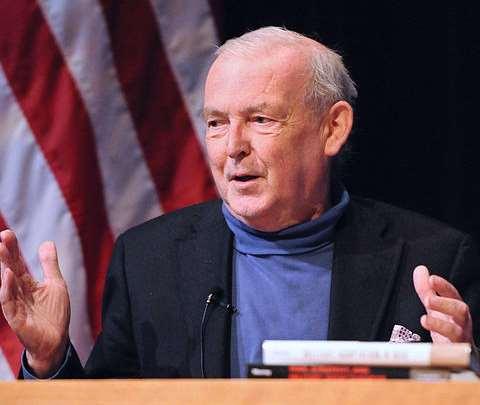
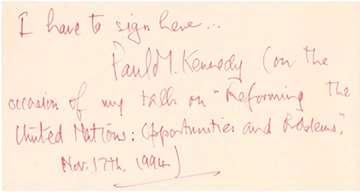
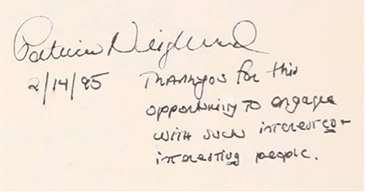
1994-1995
PAUL M. KENNEDY (1945- ) - 1994-95 speaker: "Reforming the United Nations: Problems and Opportunities.” Paul Kennedy is a British historian specializing in international relations and strategies. He is currently a professor of British history and the Director of International Security Studies at Yale. His most famous book, The Rise and Fall of the Great Powers (1987), has been translated into 23 languages and comments on the interaction between economics and strategy over the past five centuries. His most recent book is titled The Parliament of Man (2006). In this work, he comments on the past and future of the United Nations.
PATRICIA NEIGHMOND (?) - 1994-95 speaker: “Whatever Happened to Health Care Reform? Medicine and Politics in the United States.” A University of Maryland graduate in English and Drama, she began a career in journalism in 1978. Neighmond has been the National Public Radio’s health policy correspondent since 1987. Her subject matter has ranged from weight loss to osteoarthritis, the plague, and daytime soaps influence on sex. She is the recipient of many awards including the George Foster Peabody Award for health reform in 1993.
ROBERT P. KIRSHNER (1949 -) - 1994-95 speaker: "Taking the Measure of the Universe." Kirshner, the Clowes Professor of Science at the Harvard-Smithsonian Center for Astrophysics, graduated from Harvard in 1970 and received his Ph.D. in astronomy at CalTech. He was the chairman of the Department of Astronomy at Harvard when he lectured at Crichton Club. His area of specialty is the physics of the supernovae and using them to measure the expansion of the universe.
MID-90s
From the mid-90’s, the themes closing out the 20th Century were dominated by social and political issues, with a few topics on the arts and sciences woven in. Three speakers referred to the 21st Century in the titles of their lectures, and comparatively new terms such as Internet, multi-culturalism, multi-dimensional, terrorism, and psychodrama were introduced into the Crichton Club lexicon.
1995-1996
John Galvin: United States Strategy - Post Cold War
Charles Gwathmey: Architecture: A Process of Discovery
David Warren: Riding the Tiger of Change

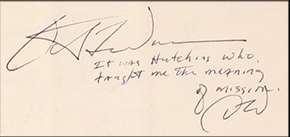
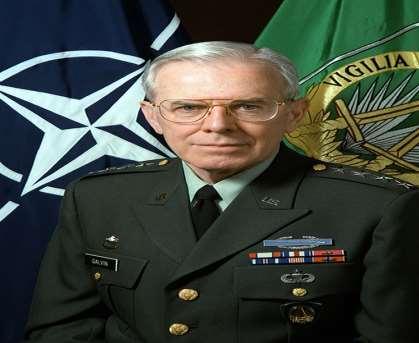

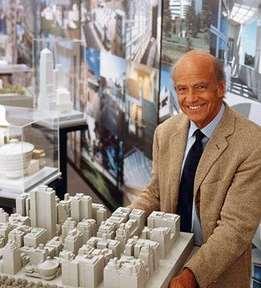

1995-1996
JOHN GALVIN (1929-2015) - 1995-96 speaker: "United States Strategy - Post Cold War." At the time of his appearance at Crichton, John Galvin was a recently retired General of the U.S. Army and the newly designated Dean of the Fletcher School of Law and Diplomacy at Tufts University. A graduate of the United States Military Academy (1954), he was NATO’s Supreme Allied Commander while also serving as Commander in Chief of the U.S. European Command froml987-1992. In addition to his wide-ranging military assignments and responsibilities, John Galvin has served as a Distinguished Policy Analyst at OSU’s Mershon Center and as a member of the U. S. Commission on National Security in the 21 Century.
CHARLES GWATHMEY (1938-2009) - 1995-96 speaker; "Architecture: A Process of Discovery." An American Modernist architect, Charles Gwathmey was a principal of the well-known firm Gwathmey Siegal & Associates Architects, perhaps best known for the 1992 renovation and expansion of Frank Lloyd Wright's Guggenheim Museum. His other works include hotels, museums, civic centers, office buildings and a number of prestigious residences for celebrities, such as Steven Spielberg and Jerry Seinfeld. A graduate of Yale University, he first won acclaim at the age of 27 for his innovative design for his parents' home in the Hamptons.
DAVID WARREN (1944- ) - 1995-96 speaker: "Riding the Tiger of Change". David Warren became president of the National Association of Independent Colleges and Universities (NAICU) in 1993, after nearly a decade as president of Ohio Wesleyan University. A tireless crusader for America’s private colleges and for increased financial aid funding for all college students, Warren is widely regarded as one of the most persuasive and influential voices for higher education within Washington, D.C. He is frequently asked to speak at higher education national conferences and on campuses and is regularly quoted by the news media on national higher education issues.
The recipient of 16 honorary degrees and numerous other academic and civic awards, Warren has been described as "one of the most gifted leaders and creative thinkers in all of American higher education" by former American Council on Education President Stanley 0. Ikenberry. Warren earned his bachelor’s degree in English from Washington State University, where he graduated Phi Beta Kappa. Washington State recognized his accomplishments in 1991 by awarding him the Alumni Achievement Award for Distinguished Leadership. He earned master’s degrees with honors in both divinity and urban studies form Yale University and a doctorate in higher education administration from the University of Michigan, where in 1998 he received the Distinguished Alumnus Award from the university’s Education Alumni Society. He also was a Fulbright Scholar in India and a Rockefeller Fellow at Yale University.
1996-1997
Mark Tushnet: The First Amendment into the 21st Century
Catherine Stimpson: Who Is Creative Now?
Elizabeth Langland: Jane Austen and the Silver Screen

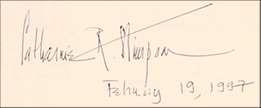
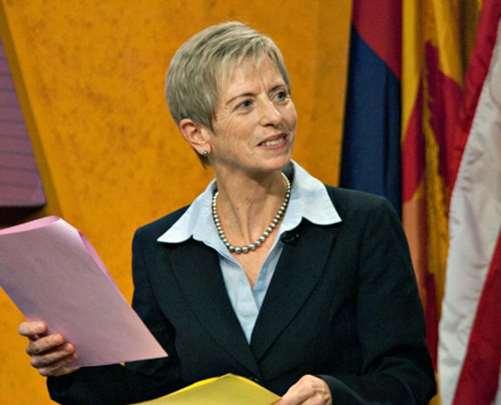



1996-1997
MARK TUSHNET (1945 - ) - 1996-97 speaker: "The First Amendment into the 21"' Century." Tushnet is the William Nelson Cromwell Professor of Law at Harvard Law School. He did his undergraduate work at Harvard, and after graduating from Yale Law School in 1971, served as a law clerk to Justice Thurgood Marshall. He specializes in constitutional law and theory and is a leading scholar in the field of comparative constitutional law. Tushnet is a proponent of the idea that judicial review should be strongly limited.
CATHERINE STIMPSON (1934- ) - 1996-97 speaker: "Who is Creative Now?” Catharine R. Stimpson was appointed Dean of NYU’s Graduate School of Arts and Science in 1998 and is a university professor. The former director of the MacArthur Foundations Fellows Program, she has served as a university professor at Rutgers, where she was also dean of the graduate school and vice provost for graduate education. She was the first director of the Women's Center of Barnard College. She received a B.A. from Bryn Mawr (1955), a B.A. and M.A. from Cambridge University (1960,1966), and a Ph.D. from Columbia in 1967.
ELIZABETH LANGLAND (1948- ) - 1996-97 speaker: "Jane Austin and the Silver Screen.” Elizabeth Langland is a scholar specializing in Victorian literature, feminist and gender theory, cultural studies, and theory of the novel. She joined Arizona State University as vice president, dean, and professor in 2007. She received her B.A. degree summa cum laude from Barnard College and her M.A. and Ph.D. degrees with departmental honors from the University of Chicago. Langland is the author or editor of eight books and numerous scholarly articles.
1997-1998
Elliot Engel: The Charles Dickens We Never Knew
Charles Hermann: The Multi-Dimensional Legacy of George Bush: The Good, The Bad, and the Uncertain Brian Urquhart: The United Nations and International Relations


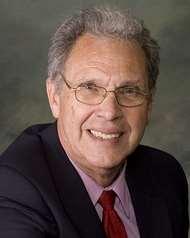



1997-1998
ELLIOTT D. ENGEL (1948- ) - 1997-98 speaker: “The Charles Dickens We Never Knew.” This popular lecturer delights in enlightening audiences on the virtues of classical literature. Professor Engel earned his M.A and Ph.D. at UCLA where he was a Woodrow Wilson Fellow. UCLA honored him with an outstanding teaching award. A native of Indianapolis, Engel now lives in Raleigh, NC and has taught at North Carolina State University, University of North Carolina, and Duke. He has published seven books and written three plays. PBS-TV aired Engel’s mini-lecture series on Dickens, his literary hero.
CHARLES HERMANN (1938- ) - 1997-1998 speaker: “The Multi-Dimensional Legacy of George Bush: The Good, The Bad and the Uncertain”. Hermann is Director of the Master’s Program in International Affairs, and Brent Scowcroft Chair in International Policy Studies at the Bush School of Government and Public Service at Texas A&M University. He received his Ph.D. in political science from Northwestern University and has been with the Bush School since its inception in 1995. Prior to that, he was a professor at Ohio State for 25 years.
BRIAN URQUHART (1919-2021) -1997-98 speaker: “The United Nations and International Relations.” A British army and military intelligence officer, he served in North Africa and Europe. During World War II Urquhart was transferred to a unit which was responsible for finding Nazi scientists working on military technology. Following the war, he was a member of the British staff involved in setting-up and establishing the United Nations. An Undersecretary-General of the United Nations from 1971-85, his professional life since joining has been in many respects a history of that institution. He has advised every Secretary Genera! since the U.N.’s inception and has focused his energies on conflict resolution and peacekeeping. His autobiography, A Life in Peace and War. reflects this focus along with several other books concerning reforming and rethinking the UN system.
1998-1999
Richard Bangs: 21st Century Exploration: Worldwide Expeditions Using the Internet as Ice Axe and Paddle
Brock Evans: Squandering Our "Real" Wealth
Philip Wilcox, Jr.: Terrorism: Strategic Threat or Psycho Drama
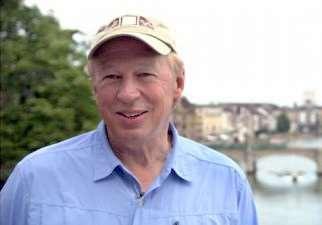
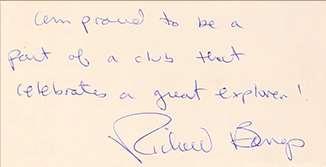

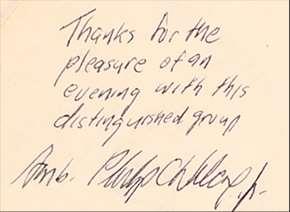


1998-1999
RICHARD BANGS (1950- ) – 1998-99 speaker: “Twenty First Century Exploration: Using the Internet as Ice Axe and Paddle.” A world adventurer, international river explorer, and entrepreneur, Bangs is considered the founder of modern adventure travel. He began his career at age 22 exploring the rivers of Ethiopia and has led first descents of 35 major rivers around the world. He has lectured at the National Geographic Society and the Exporers Club, and is the founder of Mountain Travel-Sobek, America’s oldest adventure travel company. As a writer and journalist, he has published over 1000 magazine articles and 16 books, the most recent of which is Quest for the Sublime: Finding Nature’s Secret in Switzerland, 2008. He also produces an adventure series of DVD’s (Richard Bang’s Adventures with a Purpose) and has worked in radio and television.
BROCK EVANS (1937- ) - 1998-99 speaker: “Squandering our “Real” Wealth.” Born in Columbus, Ohio Brock Evans has had a career that has taken him from coast to coast. He graduated from Princeton University and received a law degree from the University of Michigan. The focus of his interest came in 1966 while he was hiking outside of Seattle, Washington where he had moved to pursue a job in a private law practice. The old growth forest with its ancient trees showed signs that it was scheduled to be logged and immediately he became active in environmental causes. Starting with the Sierra Club he became their representative from 1967-73. He transferred to Washington D.C. to head their lobbying office until 1981. The following fifteen years were spent with the National Audubon Society. Today he directs the Endangered Species Coalition trying to add strength to the Endangered Species Act.
AMBASSADOR PHILLIP WILCOX, JR. (1937-) - speaker (1998-99): "Terrorism: Strategic Threat or Psycho Drama.” Wilcox served in the U.S. Foreign Service from 1966-1997. His various positions include deputy director for United Nations political affairs, director for Middle East regional affairs, and deputy assistant secretary of state for Middle East affairs. He has also served as director for Israeli and Arab Israeli affairs, was chief of mission and consul general in Jerusalem, as well as the deputy assistant secretary of state for intelligence and research and ambassador-at-large and coordinator for counterterrorism. Mr. Wilcox graduated from Stanford Law School in 1961.
1999-2000
Stephen Jay Gould: Charles Darwin's Revolution in Human Thought
Anthony Lewis: The Press: Friend or Foe
Judah Folkman: The Best Laid Plans of Mice for Men and Women
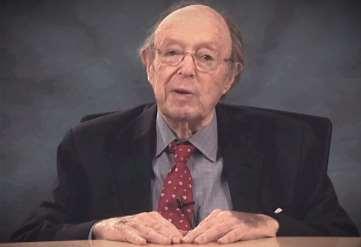
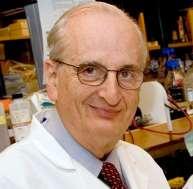
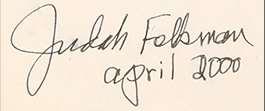

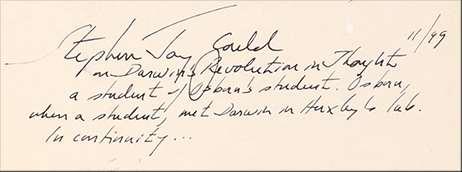
Anthony Lewis
1999-2000
STEPHEN JAY GOULD (1941-2002) - 2001-02 speaker: “Charles Darwin’s Revolution in Human Thought.” Gould was an American paleontologist, evolutionary biologist, and historian of science. He was also one of the most influential and widely read writers of popular science of his generation. Gould spent most of his career teaching at Harvard University and working at the American Museum of Natural History in New York. In the latter years of his life, Gould also taught biology and evolution at New York University. Gould's greatest contribution to science was the theory of punctuated equilibrium which he developed with Niles Eldredge in 1972. The theory proposes that most evolution is marked by long periods of evolutionary stability, which is punctuated by rare instances of branching evolution. Many of Gould's Natural History essays were reprinted in collected volumes, such as Ever Since Darwin, and The Panda's Thumb, while his popular treatises included books such as The Mismeasure of Man, Wonderful Life, and Full House.
ANTHONY LEWIS (1927-2013) -1999-2000 speaker: “The Press: Friend or Foe?” Pulitzer Prize-winning Journalist Lewis is a prominent liberal intellectual. New York City-born and Harvard-educated, Mr. Lewis writes for the New York Times op-ed page and The New York Review of Books among other publications. He previously served as a columnist for the “Times” and its bureau chief in London and Washington, D.C. Lewis has taught at Columbia University’s Graduate School of Journalism since the mid-70’s, lectured at Harvard University from 1974-1989. Lewis has authored five books and edited or co-authored a number of others. He is married to Chief Justice Margaret H. Marshall of the Supreme Judicial Court of Massachusetts, formerly Harvard University General Counsel and Vice-President. She wrote the majority opinion that legalized gay marriage in Massachusetts.
JUDAH FOLKMAN (1933-2008) - 1999-2000 speaker; "The Best Laid Plans of Mice for Men and Women.” Judah Folkman, M.D. was a world-renowned physician and medical researcher. Born and raised in Columbus, Ohio, Dr. Folkman graduated from OSU and Harvard Medical School. He was trained as a pediatric surgeon and, at age 34, became chief of surgery at Boston’s Children’s Hospital. He gained much attention in the 1970’s by asserting that cancer tumors could be controlled by limiting or eliminating the supply of blood which their growth required. This line of inquiry, known as angiogenesis, has become a new field for medical research. Dr. Folkman’s demonstration of the effectiveness of his methodology in laboratory mice led to development of medications for humans; this research continues.
The lecture of Dr. Judah Folkman, a Columbus-born medical hero, brought a standing room only crowd for his lecture. The goal of the new millennium was to expand and retain membership to between 300 and 400 members. New larger, venues instead of the Art Museum were explored - the Fawcett Center, the First Congregational Church, and Mees Auditorium at Capital University.
The New Millennium
The Club's continuing vitality was fittingly shown when the last lecture of the millennium, Stephen Jay Gould's talk on Charles Darwin, drew the largest crowd of recent years. Gould's purpose was to provide a well-known intellectual speaker to rekindle interest and excitement in Crichton Club.
FYI
In 2000 the club constitution was amended.
2000-2001
Anne Fadiman: What Kind of Reader Are You?
Jean Kirkpatrick: The Changing World: The New NATO, The Balkans and The Middle East
Beverly Sills: Cancelled twice.
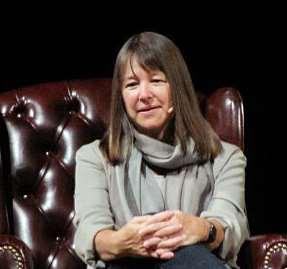

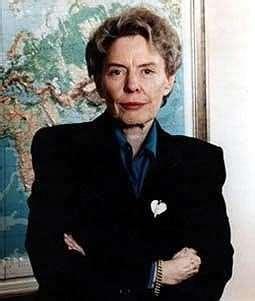

2000-2001
ANNE FADIMAN (1953- ) - 2000-01 speaker: “What Kind of Reader Are You?” Ann Fadiman is the daughter of Clifton Fadiman, and Annalee Jacoby Fadiman, a foreign correspondent who co-authored the 1946 book, “Thunder Out of China.” A 1975 Harvard graduate, Ms. Fadiman is best known for her award-winning book, “The Spirit Catches You and You Fall Down” which documents the struggles of an immigrant Hmong family. She was a founding editor of the Library of Congress magazine, Civilization, and in 1997 became the editor of the Phi Beta Kappa quarterly The American Scholar. She is author of Ex Libris: Confessions of a Common Reader (1998). In 2005 she became a writer-in-residence at Yale University.
JEANE JORDAN KIRKPATRICK (1926 - 2006) - 2000-2001 speaker: “The Changing World: The New NATO, the Balkans and the Middle East”. Dr. Kirkpatrick served in President Reagan's Cabinet on the National Security Council, Foreign Intelligence Advisory Board, Defense Policy Review Board, and chaired the Defense Commission on Fail Safe and Risk Reduction of the Nuclear Command and Control System. She was the first woman named U.S. Ambassador to the United Nations. She earned an associate degree from Stephens College, a bachelor’s degree from Barnard College (1948), and a Ph D in political science from Columbia University (1968). Kirkpatrick joined the faculty of Georgetown University and became a full professor of government in 1973. Awarded the Presidential Medal of Freedom, the Kennedy School of Government at Harvard created the Kirkpatrick Chair in International Affairs in her honor. Her writings include: “Making War to Keep Peace (2007); The Withering Away of the Totalitarian State And Other Surprises (1992); Legitimacy and Force: National and International Dimensions (1988); Legitimacy and Force: Political and Moral Dimensions (1988); The United States and the World: Setting Limits” (1986); Dictatorships and Double Standards: Rationalism and Reason in Politics (1982); Presidential Nominating Process: Can It Be Improved (1980); and “Dismantling the Parties: Reflections on Party Reform and Party Decomposition (1978).
Beverly Sills, the Metropolitan Opera singer, was scheduled for Mees for the 2001-02 season. She unexpectedly cancelled and the board tried to call everyone who had responded. Only two people showed up! Sills was then rescheduled for spring, and she cancelled AGAIN two days before her lecture.
2001-2002
Arthur Golden: The Deception of Fiction: A Novelist's Sleight of Hand
C. J. Peters: Emerging Infections and Society: Push and Pull
General Lewis Mackenzie: Message to America: Stay Off the Front Line of Peacekeeping
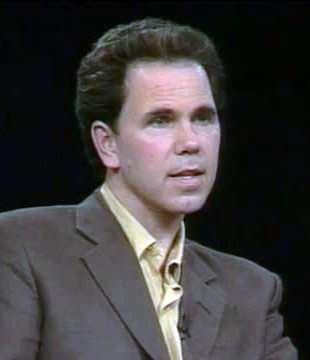

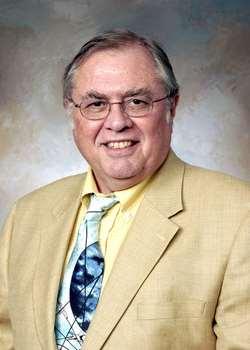



2001-2002
ARTHUR GOLDEN (1946 - ) 2001-02 speaker: “The Deception of Fiction: A Novelist’s Sleight of Hand.” Best known for the, “Memoirs of a Geisha” published in 1997, he wrote the book three times over a ten-year period before publishing. A graduate of Harvard University, he also received an MA in Japanese history and an MA in writing. The subject matter was based on his interviews with a person who later sued him for revealing her identity.
C.J. PETERS (1940 - ) - 2001-02 speaker: “Emerging Infections and Society: Push and Pull.” Dr. Peters was born in Odessa Texas, and graduated in chemistry from Rice University, before attending John Hopkins School of Medicine. While serving as a research associate in Panama he developed an interest in tropical medicine and virology. He completed his fellowship in immunology at the Scripps Clinic and Research Foundation and then entered active duty in the U.S. Army where he worked at the U.S. Army Medical Research Institute of Infectious Diseases. He led the team that controlled a 1989 Ebola introduction into a monkey facility in Reston, Virginia. He has investigated such hazardous emerging viruses as hantavirus pulmonary syndrome, Bolivian hemorrhagic fever, Venezuelan equine encephalitis, SARS, RVF, and other human pathogens. Since 2000 he has been a Professor of Tropical and Emerging Virology at the University of Texas Medical Branch. He coauthored the 1998 book, Virus Hunters: Thirty Years of Battling Hot Viruses Around the World.
LEWIS WHARTON MACKENZIE (1940- ) - 2001-2002 speaker: “Message to America: Stay Off the Front Line of Peacekeeping.” Mackenzie, a retired Canadian general, commanded Sector Sarajevo in Yugoslavia in 1992. He served peacekeeping tours in the Gaza Strip in 1963 and 1964; served with the UN peacekeeping force in Cyprus in 1965. The author of two books, Peacekeeper: Road to Sarajevo and Soldiers Made Me Look Good: A Life in the Shadow of War, he received the Canadian defense and security Vimy Award. In 2006 was named a member of the Order of Canada.
Early in the New Century…
The Board made a momentous decision and voted to make black tie "optional” for the men.
For several years, pre-lecture dinners were held in a large room upstairs at Lindey’s in German Village. The Board realized that having the dinners at the Art Museum was infinitely easier for all concerned and the Museum especially appreciated our patronage.
A website promoting the club, its history and program was established at www.crichtonclub.org. As the Club’s membership grew because of good programming, the mailing expenses became prohibitive given our budget constraints. The Board decided to explore email invitations, and a majority of the members were able to accommodate this change. Even the lecture RSVP’s became electronic.
2002-2003
Carl Djerassi: Sex and Fertilization: Ready for Divorce?
Judy Richardson: Will the Circle Be Unbroken: Lessons from the Civil Rights Movement
James Fallows: Iraq, What's Next?
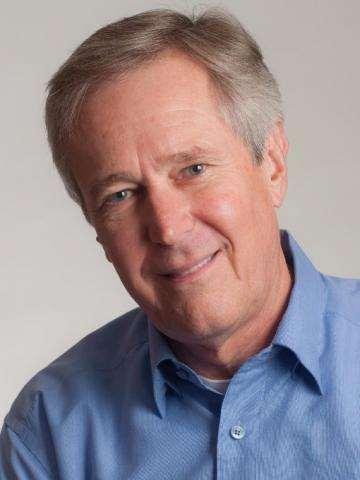

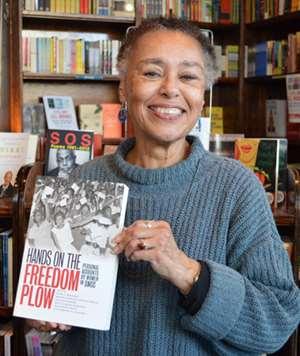

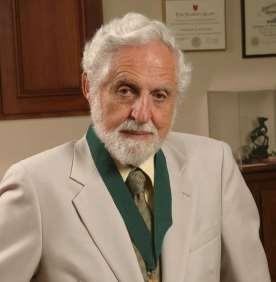
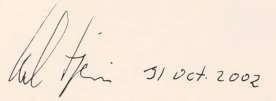
2002-2003
CARL DJERASSI (1923-2015) - 2002-03 speaker: “Sex and Fertilization: Ready for Divorce?” Dr. Djerassi is a chemist, novelist, and playwright, best known for his contribution to the development of the first oral contraceptive pill in 1951. He was born in Vienna, Austria to two Jewish physicians and attended the same high school as Sigmund Freud. After the Anschluss, his mother arranged a visa to the U.S. in 1939, and at age 16, Carl moved to America with his mother with $20 between them. He attended Kenyon College and graduated Phi Beta Kappa in 1942. He earned his Ph D in organic chemistry from the University of Wisconsin in 1945, the same year he became a US citizen. He taught at Stanford from 1959 and was awarded the National Medal of Science by President Nixon. He spoke gratis to Crichton Club in exchange for the Board buying copies of his books for the membership.
JUDY RICHARDSON (1944-) - 2002-2003 speaker: "Will the Circle Be Unbroken: Lessons from the Civil Rights Movement.” Judy Richardson was a staff member with the Student Nonviolent Coordinating Committee on its projects during the early 1960's and campaigned for Julian Bond during his successful first run for the Georgia House of Representatives. She co-founded an African- American bookstore and publishing house in Washington, DC and was director of information for the United Church of Christ Commission for Racial Justice in New York City. Her film credits include the PBS series Eyes on the Prize and the "American Experience" biography, “Malcolm X: Make It Plain.” She is currently senior producer at Northern Light Productions where she has produced and written a History Channel documentary on slave catchers and slave resistance. She completed a documentary for the National Underground Freedom Center in Cincinnati and produced/directed/wrote “Four Fragile Freedoms”, a History Channel documentary on African American historic sites, among other films. She writes, lectures nationally, conducts teachers’ workshops focused on the Civil Rights Movement, and is co-editor of Hands on the Freedom Plow, an anthology of SNCC women's writings chronicling the civil rights activism of women in the South during the early 1960s.
JAMES FALLOWS (1949- ) - 2000-03 speaker: “Iraq, What’s Next?” Fallows is an American print and radio journalist who has been associated with The Atlantic Monthly for many years and has written nine books. A Rhodes Scholar, he was Jimmy Carter’s chief speechwriter for the first two years of Carter’s presidency, the youngest person to ever hold that job. He won the National Magazine Award in 2003 for The Fifty-First State? (The Atlantic, November 2002), an article published six months before the invasion of Iraq that laid out the difficulties of occupying the country. Fallows's most influential articles have concerned military policy and military procurement, the college admissions process, technology, China and Japan, and the American war in Iraq.
2003-2004
Stephen Pinker: The Blank Slate, The Modern Denial of Human Nature
Henry Petroski: Success and Failure in Engineering Design
William McGlaughlin: A Tale of Two Cities: Music in New York and Paris, 1892-1929. 2004-
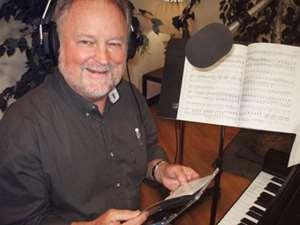
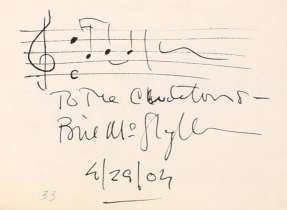
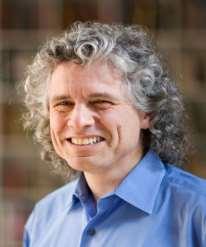



2003-2004
STEPHEN PINKER, (1954- ) - 2003-04 speaker: “The Blank Slate: The Modern Denial of Human Nature.” Currently Johnstone Family Professor of Psychology at Harvard University, Pinker has also taught at Stanford and MIT. He is an experimental psychologist exploring the interaction of mind and language development; his research on visual cognition and the psychology of language has won prizes from the National Academy of Sciences, the Royal Institution of Great Britain, and the American Psychological Association. He has also received six honorary doctorates, several teaching awards, and numerous prizes for his books: The Language Instinct, How the Mind Work, and The Blank Slate. Pinker is a frequent contributor to national magazines and, as a leading intellectual force, was included in Time magazine’s 100 Most Influential People in the World Today.
HENRY PETROSKI (1942 -) - 2003-04 speaker: “Success and Failure in Engineering Design."
Petroski, an engineer and professor, was born in Brooklyn and in 1963 received his B.A. from Manhattan College. He received his Ph.D. from the University of Illinois and is currently a civil engineering professor at Duke. His current research activity focuses on the interrelationship between success and failure in design. Petroski also studies the history of common, everyday objects such as pencils, paper clips and silverware. He has written over a dozen books, including To Engineer is Human: The Role of Failure in Successful Design (1985), The Toothpick: Technology and Culture (2007).
WILLIAM McGLAUGHLIN (1948- ) - 2003-04 speaker: “A Tale of Two Cities: Music in New York and Paris, 1892-1929.” Bill McGlaughlin is the most popular classical radio host according to his producer. He has hosted St. Paul Sunday since 1980 and won a George Foster Peabody Award in 1996 for this program. In addition, he hosts Center Stage Wolftrap. An undergraduate of Temple University in 1967, he received a Master of Music from the same institution in 1969. At fourteen he had his first piano lesson and knew immediately what he wanted to do in life. A trombonist with the Philadelphia Orchestra at 23, he has gone on to conduct and in 1997 he debuted as a composer.
2003-2004
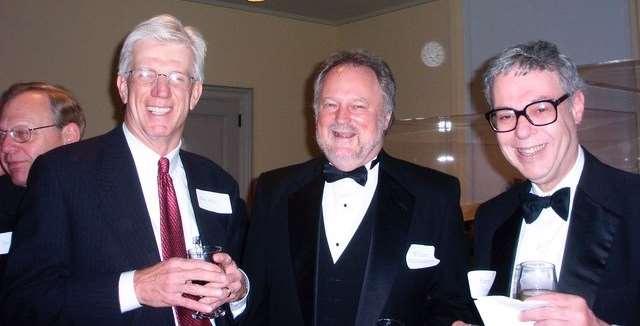

Stephen Pinker
William McGlaughlin, center
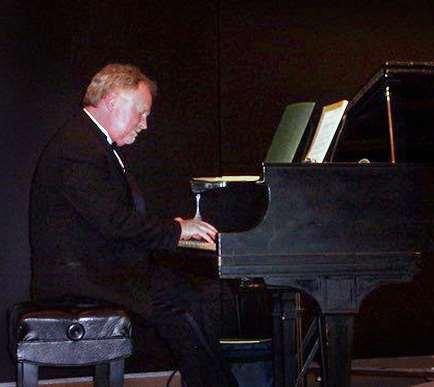

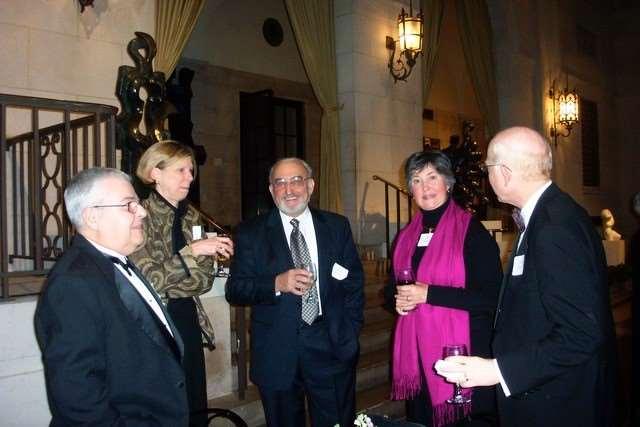
William McGloughlin performs for the Crichton Club.
Henry Petroski
2004-2005
Salman Rushdie: Step Across This Line: An Evening with Salman Rusdie
Henry Greenspan: REMNANTS
Louise Leakey: Passion for Discovery: Continuing the Family Tradition
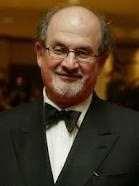

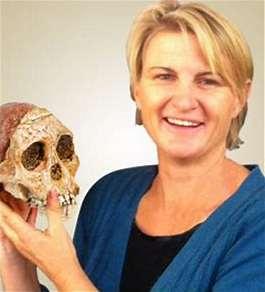
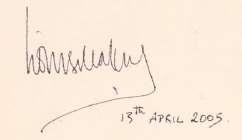
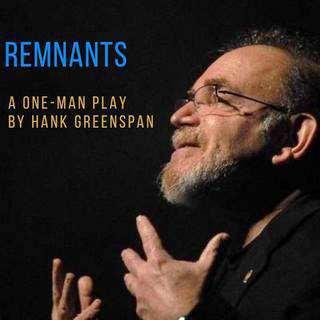

2004-2005
SALMAN RUSHDIE (1947- ) - 2004-05 speaker: “Step Across This Line: An Evening with Salman Rushdie.” Bom in Bombay, India, the author was schooled in India and then England, reading history at King’s College, Cambridge. His second novel, published in 1981, won the Booker Prize for Fiction. In 1988 he published his fourth novel, “The Satanic Verses” which resulted in a fatwa being issued against him by the orthodox Iranian leadership. This forced him into hiding under British government protection. He was awarded a knighthood for services in 2007. Rushdie’s speaking fee is the largest to date for any Crichton Club lecture.
HENRY GREENSPAN (1919-2008) - 2004-05 speaker: "REMNANTS." Henry Greenspan was a psychologist and playwright at the University of Michigan who actively studied the Holocaust and interviewed Holocaust survivors for more than 20 years. His presentation to Crichton was a one-man performance reflecting his research. Unlike other persons who elicited Holocaust memories through a single interview with a survivor, Greenspan continued his relationships and conversations across two decades. Thus, the memories and recollections he revealed in Remnants, his play, are especially nuanced and moving. The play has been presented in more than 100 different venues and has been recognized with many awards.
LOUISE LEAKEY (1972 - ) - 2004-05 speaker: "Passion for Discovery: Continuing the Family Tradition."
Louise Leakey, the granddaughter of Louis and Mary Leakey and daughter of Richard and Meave Leakey, has largely "picked up the banner" for the family as she is shaping the direction of paleontological research into human evolution in Kenya. Taken along on field expeditions throughout her childhood, she earned her Ph.D. from the University of London. Her thesis explored the likely impact of climate change on the fauna in the Lake Turkana region where recent discoveries had been so significant. At the time of her appearance before Crichton Club, she was an Explorer-in-Residence for The National Geographic Society, and she was designing a five-year plan for excavation of fossils near Lake Turkana in northern Kenya.
One of the most controversial lecturers of the new millennium was Salmon Rushdie, who spoke the day after the presidential election in 2004. He began his talk by stating that the election had been a black day for the United States, which promptly alienated half the audience. That unfortunate opening sentence overshadowed an otherwise interesting and reasoned commentary on world affairs, including a critique of the Muslim world. For many weeks members voiced opinions pro and con.
At a Board meeting nearly a year later, Rushdie's lecture came up again, and the Board realized that they had fulfilled the goal of Crichton Club - to raise issues, discuss differences, and expand our interests while we learn about the world from challenging speakers. One of the strongest assets of Crichton Club is the diversity of background and opinion of our members that can lead to vibrant, impassioned conversations and, sometimes, disagreement.
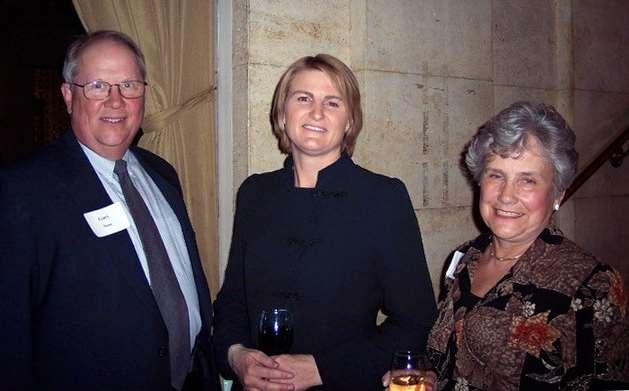
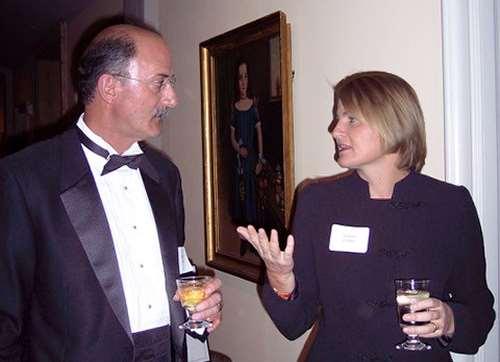
Louise Leakey, center
Louise Leakey
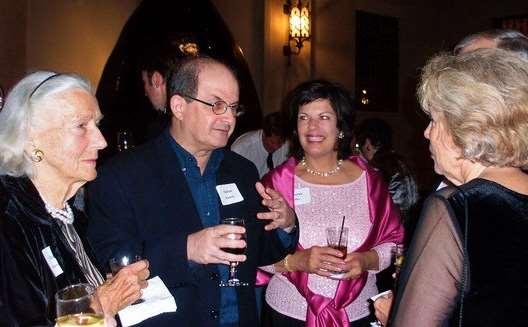
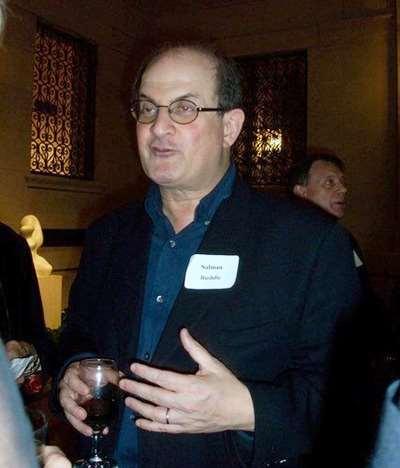
SalmonRushdie
Salman Rushdie
Spencer Wells: The Journey of Man
2005-2006
Siegfried Hecker: The North Korean Nuclear Crisis
Mira Nair: Between Two Worlds
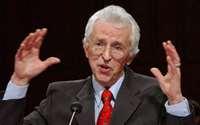
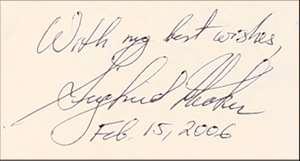
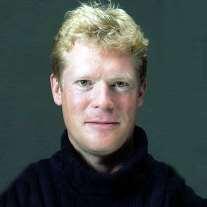
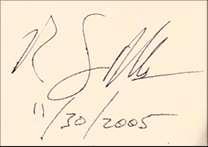
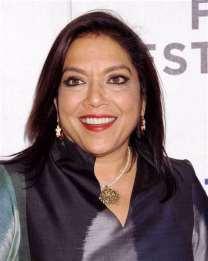
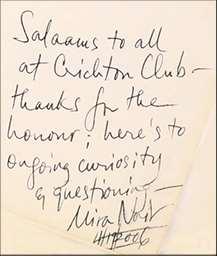
2005-2006
SPENCER WELLS (1969- ) - 2005-2006 speaker: “The Journey of Man.” Spencer Wells is a leading population geneticist and director of the Genographic Project at the National Geographic. He enrolled at the University of Texas at age 16, majored in biology and graduated three years later. Wells pursued his Ph.D. at Harvard University under the distinguished evolutionary geneticist Richard Lewontin. This was followed by postdoctoral research at Stanford and Oxford Universities. Well’s book, The Journey of Man: A Genetic Odyssey (2002) explains how genetic data is used to trace human migrations over the past 50,000 years. He encouraged the Crichton Club audience to join the Genographic Project with a DNA swab kit available from the project.
SIEGFRIED HECKER (1943-) - 2005-06 speaker: “The North Korean Nuclear Crisis.” Bom in Poland to an Austrian family, Hecker received his Bachelor of Science, Master of Science and Doctor of Philosophy from Case Western Reserve in metallurgy. From 1986-97 he was the director of the Los Alamos National Laboratory. Beginning in 2004 he has visited North Korea six times in an unofficial capacity to assess their plutonium program at their scientific research center. Today he is a research professor at Stanford University. In 2009 he was the co-winner of the Enrico Fermi Award and in 2010 he published Lessons Learned from the North Korean Crisis.
MIRA NAIR (1957 -) - 2005-06 speaker: "Between Two Worlds." Mira Nair is a celebrated Indian film director and producer who now resides in New York but who also regards Kampala, Uganda, as her adoptive home. After graduating from Delhi University, she attended Harvard, and, subsequently, began producing films which, from the outset, were honored and well-received. One of her earlier works, Mississippi Masala, (1991) focused on the life in the U.S. of an Indian family from Uganda; it received awards and accolades from critics and audiences around the world. She is a benefactor of programs in India to assist "street children", and she also is devoting her energies toward identifying and encouraging talented young persons in Asia and Africa to pursue film as a creative and constructive activity.
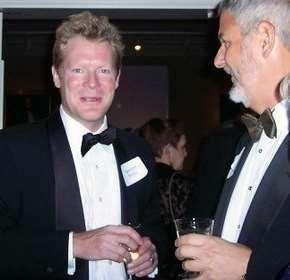
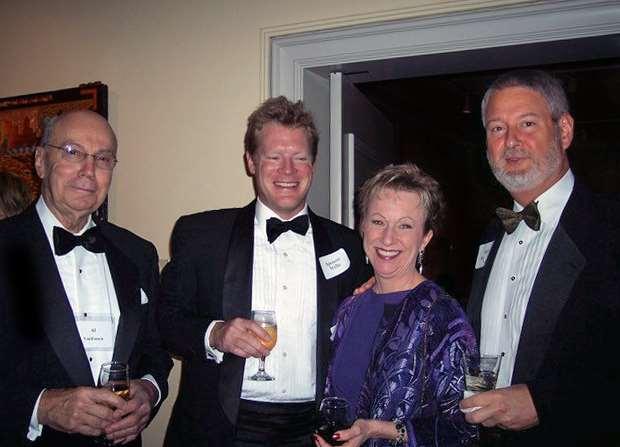

Spencer Wells, left
Spencer Wells, second from left
Mira Nair, left
2006-2007
Lewis Lapham: The Role of Dissent in Vital Democracies: A Historical Perspective
Colum McCann: The Literary Journey of an International Mongrel
Wade Davis: Life at the Edge of the World

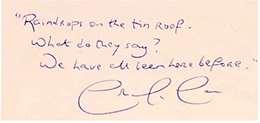
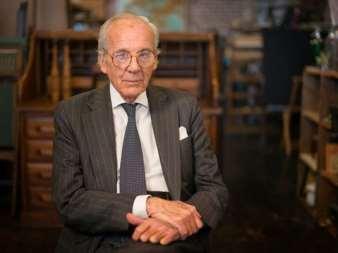

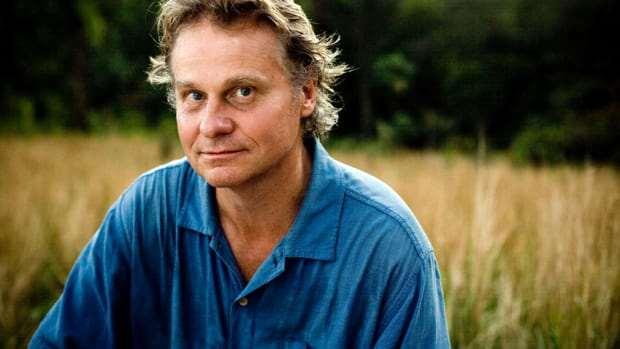

2006- 2007
LEWIS LAPHAM (1935-) - 2006-07 speaker: "The Role of Dissent in Vital Democracies: A Historical Perspective.” Latham is an American writer. He was the editor of Harper’s Magazine from 1976 to 1981 and from 1983 to 2006. He also is the founder of publication about history and literature, Laphams’s Quarterly. He has written numerous books on politics and current affairs.
COLUM MCCANN (1965- ) - 2006-2007 Speaker: “The Literary Journey of anInternational Mongrel.” Mr. McCann is an Irish writer of literary fiction, whose novels include “Songdogs,” “This Side of Brightness,” “Dancer,” and “Zoli.” McCann teaches fiction at Hunter College's Master of Fine Arts Program in Creative Writing. His fiction has been published in 26 languages. He has written for numerous publications including The New York Times, The Atlantic Monthly, GQ, The Times, The Irish Times and La Repubblica. Awarded a Pushcart Prize, the Rooney Prize, the Irish Novel of the Year Award, and the 2002 Ireland Fund of Monaco Princess Grace Memorial Literary Award, he was recently inducted into the Hennessy Hall of Fame. His story, Everything in this Country Must, was made into a short film that was nominated for an Oscar in 2005. His new novel, Let the Great World Spin, was published in 2009. Extracts were published in the Paris Review in fall 2008, Bomb magazine, and Pen America.
EDMUND WADE DAVIS (1953- ) - 2006-2007 Speaker: "Light at the Edge of the World." A noted Canadian anthropologist, ethno-botanist, author and photographer, Davis’ work has focused on worldwide indigenous cultures, especially in North and South America. He holds degrees in anthropology and biology and a Ph.D. in ethno-botany, all from Harvard University, his writings include, The Serpent and the Rainbow (1986), Passage of Darkness (1988), Penan: Voice for the Borneo Rain Forest (1990), Shadows in the Sun 1993), Nomads of the Dawn (1995), One River (1996), The Clouded Leopard (1998), Rainforest (1998), Light at the Edge of the World (2001), “The Lost Amazon” (2004), Grand Canyon” (2008), Book of Peoples of the World (ed. 2008), and Fire on the Mountain, A History of the Early British Efforts on Everest (2009). His numerous awards include the 2002 Lowell Thomas Medal (The Explorers Club) and the 2002 Lannan Foundation prize for literary nonfiction.

Colum McCann
2007- 2008
Eric Foner: The Story of American Freedom, 1776-2007
Stephen Prothero: Religious Literacy: What Every American Needs to Know… And Doesn't
Michio Kaku: The Physics of the Impossible

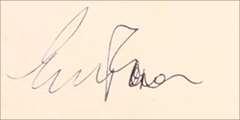
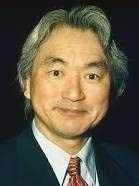


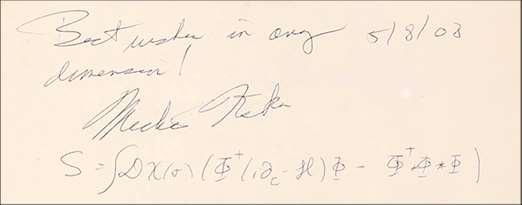
2007- 2008
ERIC FONER (1943- ) - 2007-08 speaker: "The Story of American Freedom, 1776-2007." Eric Foner is an American historian and professor of history at Columbia University, where he earned a bachelor’s degree and a Ph.D. He specializes in 19th century American history, the Civil War, slavery, and Reconstruction. He has appeared on television and radio, including “Charlie Rose,” “Book Notes,” and “All Things Considered,” and has appeared in historical documentaries on PBS. He has written for The New York Times, Washington Post, Los Angeles Times, London Review of Books and other publications. He has also written numerous books, including The Story of American Freedom (1998).
STEPHEN PROTHERO (1960- ) - 2007-08 speaker: "Religious Literacy: What Every American Needs to Know...And Doesn’t.” Stephen Prothero is a professor in the Department of Religion at Boston University and the author of numerous books, including American Jesus: How the Son of God Became a National Icon (2003), and Religious Literacy: What Americans Need to Know (2007). He has commented on religion on numerous National Public Radio programs, and on CNN, NBC, MSNBC, FOX, and PBS. He was also a guest on "The Daily Show" with Jon Stewart and "The Oprah Winfrey Show,” and is a regular contributor to the Wall Street Journal and USA Today” He is a graduate of Yale University and received his Ph.D. from Harvard University.
MICHIO KAKU (1947- ) - 2007-08 speaker: "The Physics of the Impossible.” Michio Kaku is an American theoretical physicist specializing in string field theory, and a futurist. He is a popularizer of science, host of two radio programs, and a best-selling author. He was born in California to Japanese immigrant parents. At a national science fair, he attracted the attention of physicist Edward Teller, who took Kaku as a protege. He graduated summa cum laude from Harvard University in 1968. He attended the Berkeley Radiation Laboratory at the University of California and received a Ph.D. in 1972. His latest book, Physics of the Impossible, examines the technologies of invisibility, teleportation, time travel and more.

In 2008 the club constitution was revised.
• 12 members on board as stated in the constitution
• Article II of Constitution amended to say that when a person fills an unexpired term, it will not count toward his/her two consecutive terms.
• Also added, “an officer may be re-elected or appointed to an additional year in office if it is at the end of their second successive term.”
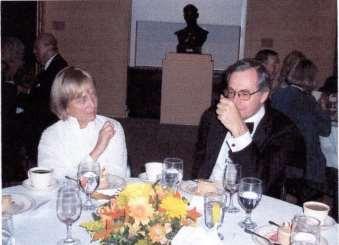
Immediate Past President, Carole Schuller, with speaker Eric Foner.

2008-2009
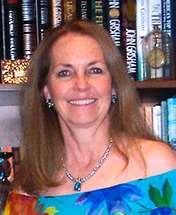
Reflections
89th and 90th Seasons
My presidency of Crichton Club was from 2008 until 2010. I had been on the Board of Directors and somehow ascended to the presidency during a fairly difficult time for the Club. We had a robust membership, but we were trying to save our budget for the increasingly expensive speaker’s fee.

Laurie Hill, President 2008-2010
Board of Directors
2009 - 2010
Laurie Ann Hill - President
Melinda Sadar - President Elect
Barb Unverferth - Secretary
Gary Ness - Treasurer
Susan Altan
Sheila Cohen
Ida Copenhaver
Louisa Green
Susan Levin
Melinda Sadar
Lesley Schaab
Carole Schuller
Jim Turner
Jan Wade
Ex-officio Board Members:
Janet Bahnson
Rob Waggoner

We decided to send all invitations and reservations by email or USPS. The acceptance was on the last page of the emailed invitation so it could be printed out and mailed to our reservations chairman with a check. There were about 10-15 CC members who did not have email, and their invitations were printed out on a computer and were mailed separately. We also knew we had to find a new venue because the Art Museum was undergoing a major renovation.
During the second year of my term Crichton Club was going to be “homeless” for the year and had to find an alternative venue. Luckily, we had enough time to inspect other auditoriums and concert sites, etc. I was shocked to find out how expensive the rentals would be!! So that first year we kept exploring.
I had a wonderful Board who helped put on optional elegant and delicious dinners before the lectures. Jan Wade, Social Committee Chair, was especially helpful and made excellent dinner arrangements, chose great menus (the Museum had its own kitchen) and added beautiful flower arrangements! She also made the table assignments, so that dinner conversations, especially with the guest speakers, were lively and fascinating. We were in a variety of dining areas, including our favorite, Derby Court (before renovation).
I also created a website for our club with the history, recent speakers, future speaker dates, and of course, many photos. It was VERY basic but allowed us to refer to our history when we were soliciting new members. While I was on the Board, we also tried to create a new LOGO and ended up with the one on the front of the History and Autograph Book published in honor of our 90th anniversary celebration.
I introduced six speakers over the two years: David Brancaccio, Michael Sheerer, Charles Wheelan, Eleanor Clift, Andrea Elliott, and Annie Griffith Belt. Their signatures were not in the published autograph book, but we decided the page we were going to have them sign on so we could publish the autograph location of each autograph in our History Book.
One of the most important things I did was research the speakers and try to read at least one of their books so I could introduce them properly. I have a BIG pile of books I bought (or was given) when I was on the board. (I
would be happy to donate to the CC Archives.) I was thrilled that our speaker search committee on the Board found excellent speakers during my two years!
Besides the website and the email invitations, the Board decided that we needed to celebrate the 90th year of Crichton Club. My very ambitious board agreed to research every speaker we could identify and write a paragraph about them to accompany their autograph book signature. I spent hours and hours editing each page and matching signatures, etc. The beginning of the book included a history that had been researched and written by Marilyn Scanlan, CC President from 1993-1995. I found a local printer in Gahanna who agreed to print and bind our 90th anniversary books for a great price: Five hundred copies for $3000.00. I am so grateful the printer knew what he was doing. All I had to do was give him a DISC (it was 13 years ago) with our pages formatted through Microsoft WORD.
One of our Board Members, I think it was Gary Ness, was associated with what was then called the Ohio Historical Society. He and I went to OHS (now called the Ohio History Connection) and found all the records, newspapers and associated paraphernalia in the archives involving the Crichton Club. I made copies and had them enlarged and printed on large foam poster boards to display at the 90th GALA event. I gave them to President Jane Forbes for the 100th anniversary party so they are still available, I assume.
During all these preparations for the 90th GALA, we also continued to search for a venue. A key requirement was a location that could provide parking and a place for dinner. The Renaissance Hotel was wonderful about reserving one of their ballrooms for the three speaker events during the 2009 -10 year. They set up rows of chairs and provided screens and pro-lites (projectors) for the presentations. Having our speakers during the weekdays filled those spaces for the hotel too! The Renaissance also allowed us to plan dinners in a large dining room on a separate floor. We could easily eat and leave our dinner venue and join the lecture before it started. They set up wine and dessert outside the ballrooms for our post-lecture get-together! The only issue was our members had to pay for parking, ($6.00) but the Board decided there was no other downtown venue that could serve our purpose quite as well as the Renaissance!!
The last dinner and lectures of the year, featuring Annie Griffith Belt, a National Geographic Photographer, was my grand finale! We had a terrific turnout and back in the day (12 years ago) people really dressed up in tuxedos and cocktail attire for the 90th Anniversary event. We had the lecture FIRST and then went to a second ballroom to have dinner. Everyone received a History and Autograph book to take home. One addition to the usual events was adding a pianist, Richard Lopez, who often played in restaurants and clubs. Many guests enjoyed DANCING after dinner just like the original Crichton Club of old!
(I am hoping someone can find records of who was on my board for those two years. They were dynamite board and were instrumental in helping me create a digital presence with our website, electronically send invitations, create the amazing history and autograph book, and move our venue from the Art Museum to the Renaissance for the 2009-2010 year. Our grand finale was a formal event - the National Geographic lecture, hotel dining room dinner, and dancing in the ballroom. I have many photos of my years as President and will be search for them and storing them on a thumb drive to give to you all.)
2008-2009
David Brancaccio: America Now - The Longview on Politics, Culture and Business
Michael Shermer: Why People Believe Weird Things - Science, Pseudoscience and the Paranormal
Charles Wheelan: Economic Priorities of the New Presidency (or What the heck is going on?)
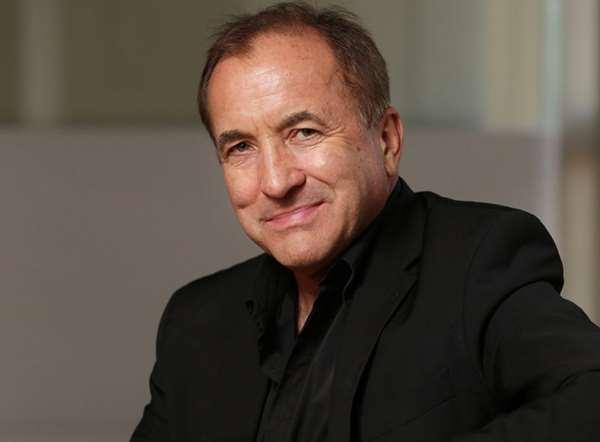
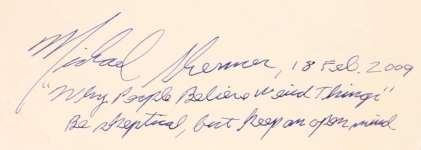
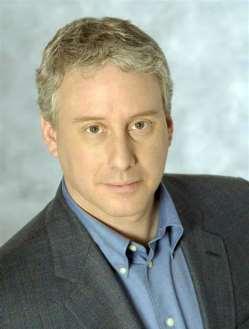



2008-2009
DAVID BRANCACCIO (1960- ) - 2008-09 speaker: “The Longview on Politics, Culture and Business.” Another journalist who has contributed to radio and television, he can be viewed on Friday nights on the Public Broadcasting System’s program “NOW.” Educated at Wesleyan College and Stanford University School of Journalism, Brancaccio contributes to several broadcast, electronic and print media outlets. He began his career contributing to public radio “Marketplace” from which he won a George Foster Peabody Award. In 2000 he published Squandering Aimlessly, a book that focuses on learning how Americans apply their personal values to their money.
MICHAEL SHERMER (1954- ) - 2008-09 speaker: “Why People Believe Weird Things: Science, Pseudoscience, and the Paranormal.” Shermer is an American science writer, historian of science, founder of The Skeptics Society, and Editor in Chief of its magazine, “Skeptic,” which is largely devoted to investigating and debunking pseudoscientific and supernatural claims. The Skeptics Society currently has over 55,000 members. He is also the producer and co-host of the 13-hour Fox Family television series “Exploring the Unknown.” Since April 2004, he has been a monthly columnist for Scientific American magazine with his “Skeptic” column. Shermer converted from a belief in God during his graduate studies, and has described himself as an agnostic, nontheist, atheist, and advocate for humanist philosophy. He has expressed reservations about such labels, however, as he sees them in being used in service of pigeon-holing and prefers to simply be called a skeptic.
CHARLES WHEELAN (1966- ) - 2008-09 speaker: “Economic Priorities of the New Presidency (or “What the Heck is Going On?).” He is a senior lecturer in public policy at the University of Chicago from which he received his Ph.D. From 1997-2002 he was the Midwest correspondent for the Economist. His first book was published in 2002, Naked Economic: Undressing the Dismal Science. He ran an unsuccessful campaign for Congress in 2009 in a special election to replace Rahm Emanuel in the Illinois 5th district
2008
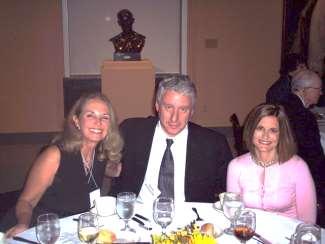
2008 - 2009
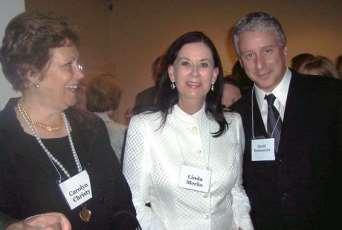

• According to treasurer, Gary Ness, net worth at year-end was $74,201.03. Mr. Ness also compiled an informative list of speaker fees for the past 10 years.
• The club had 335 members including 64 new members.
• The board set a goal of 350-375 new members for the 90th anniversary.
• President, Laurie Hill proposed a lifetime initiation fee. It would be paid once so, if member takes leave of absence, it would not paid be again. Later, this led to the question of whether a leave of absence should be limited to one year.
• Also proposed was the ability of a member to bring a free guest if the host was not able to be at the lectures. The possibility of creating an endowment was discussed.
• The club signed a one-year contract with Register.com for a 20-page website and 5-year domain name at a cost of $191.95. Once set up, a copy of the constitution was put online.
• Plaques were awarded to outgoing board members, and outgoing president Carole Schuller was presented with a plaque and a photo book.
• With the database still in development, mailings were sent using hand typed envelope labels. Name tags were also handwritten.
• The idea of a retro event dinner before the lecture, is floated along with a band after the lecture for the 90th .
• The original autograph book had been kept at the museum for safe keeping in an archival, climate controlled, environment. At this point, the autograph book became the responsibility of the president
• In one of the most memorable descriptions of the upcoming 90th anniversary; and during her introduction to speaker Eleanor Clift, President Hill, did a lively jazz hands nine times to indicate how many 90 years are.
Laurie Hill, David Brancaccio, Sheila Cohen
Carolyn Christy, Linda Meeks, David Brancaccio
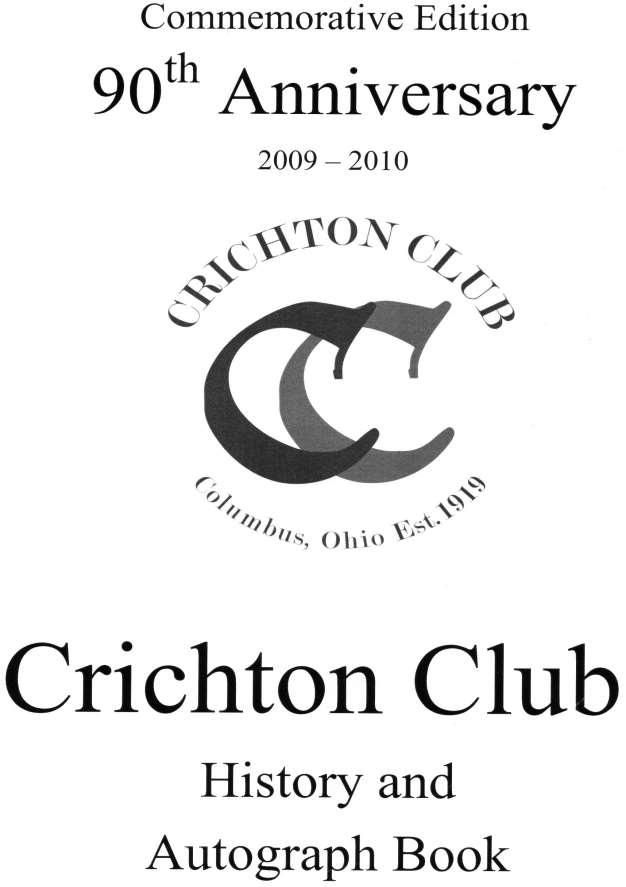
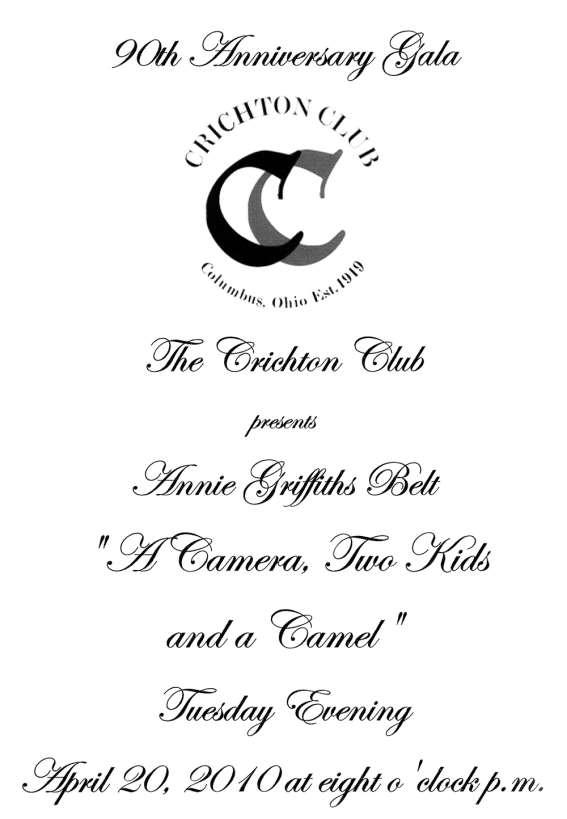
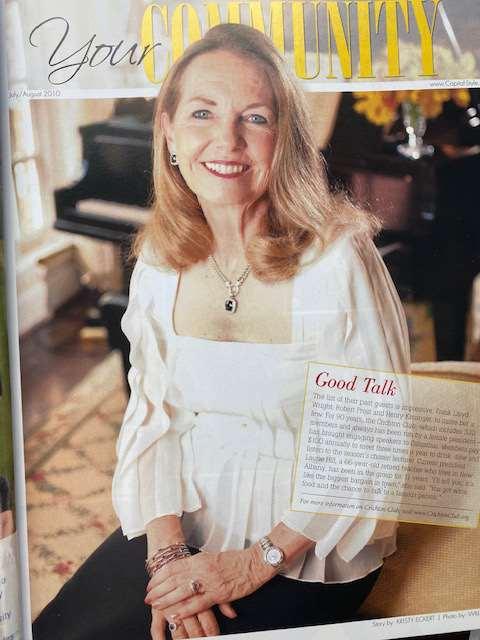
Eleanor Clift: Inside Washington: Women in Politics and the Media
Andrea Elliott: Muslims in America
Annie Griffith Belt: A Camera, Two Kids, and a Camel
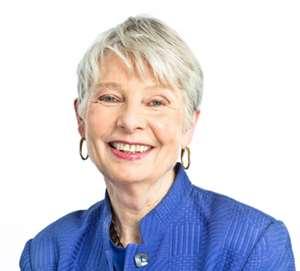
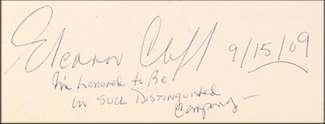
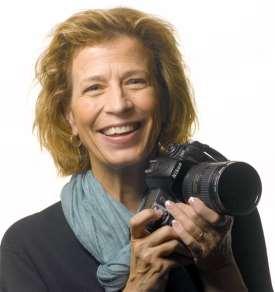

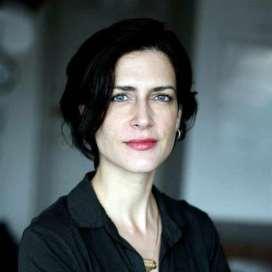

ELEANOR CLIFT (b.1940-), “Inside Washington - Women in Politics and the Media.” Clift grew up in Queens, attended Hofstra University and Hunter College, and began her career as a secretary at Newsweek. She served as a reporter covering Jimmy Carter’s bid for the presidency and followed him to Washington to become Newsweek’s White House correspondent. She became a Newsweek contributing editor in 1994 and her column, “Capital Letter,” is posted each Friday on Newsweek.com. Clift is a regular panelist on The McLaughlin Group and is also a political analyst for the Fox News Network. Some of her books include: Founding Sisters and the 19th Amendment, Madam President, Shattering the last Glass Ceiling, and Two Weeks of Life - A Memoir.
ANDREA ELLIOTT (b.1972): “Muslims in America.” Elliott is an American journalist and reporter for The New York Times. She received the 2007 Pulitzer Prize for her articles on an Egyptian-born imam living in Brooklyn. Born Washington D.C. to a Chilean mother and American father, she graduated from Occidental College with a B.A. in comparative literature. Elliott then competed an M.S. from Columbia University’s journalism school, graduating first in her class. She has received journalistic awards from the New York Press Association, the Newswomen’s Club of New York, and she has appeared on NPR, CNN, and the BBC. Her article, “The Jihadist Next Door” was published in the Sunday Time magazine the week she spoke to the club.
ANNIE GRIFFITHS BELT (b.1953), “A Camera, Two Kids and a Camel.” Belt was born in Minneapolis and earned her B.A. in photojournalism from the University of Minnesota. She has photographed dozens of magazine and book projects for National Geographic. Her photographs have also appeared in Life, Smithsonian, GEO, Fortune, Time, Paris Match, and many other publications. She has received many awards including those from Associated Press, National Organization for Women, National Press Photographers Association, and has served as a photo editor for more than a dozen books. Belt lectures and teaches photography workshops regularly.
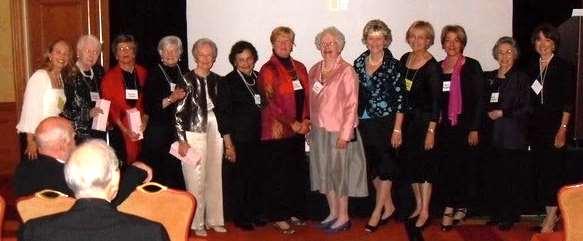
A Plethora of Presidents. The 90th Anniversary celebration featured a salute to the 45 women presidents who helmed the club since its founding. Among those able to attend were:
(l-r) Current President, Laurie Hill; Dorothy Sehring; JoAnn Frantz; Louisa Green; Lou Briggs; Muriel Tice; Anne McNealey Larrison; Jane Werum; Susan Quintenz; Carole Schuller; Nina Hoppes; Trish Tweel.
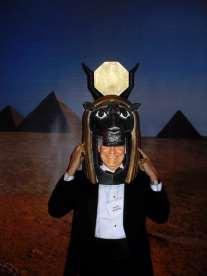

Posing with Carl the camel, transportation coordinator for the event, are: (l-r) Linda Baas McClelland, Elizabeth Tracy, Barbara Unverferth, Mabel Freeman, Nancy Donaldson.

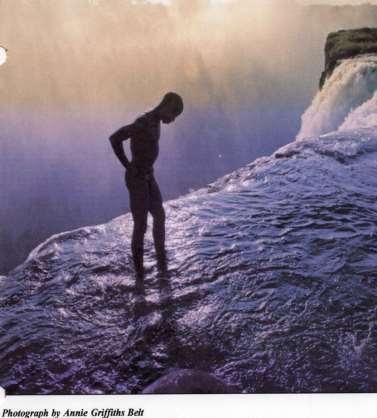
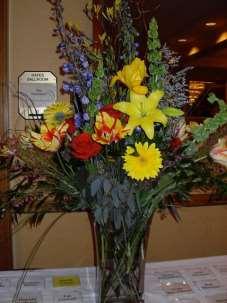

Hundreds attended the event, and each household was presented with a copy of the 90th Anniversary History and Autograph book.

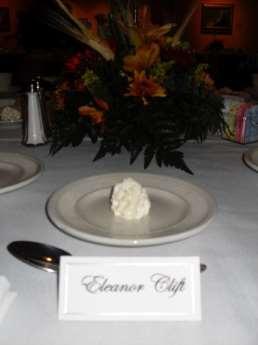

bud vases, engraved with the club logo, were presented to the past presidents and the speakers.

Crystal
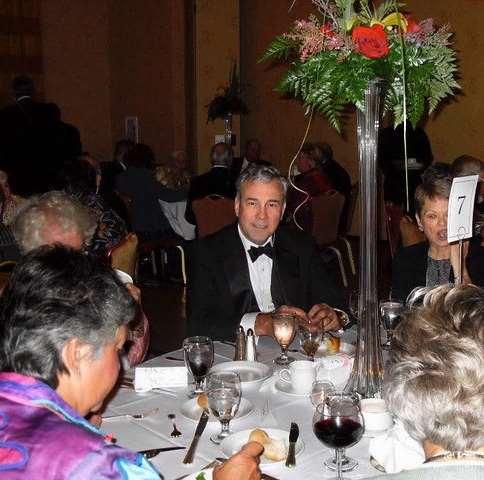
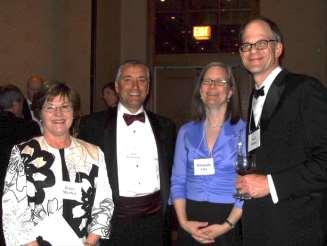

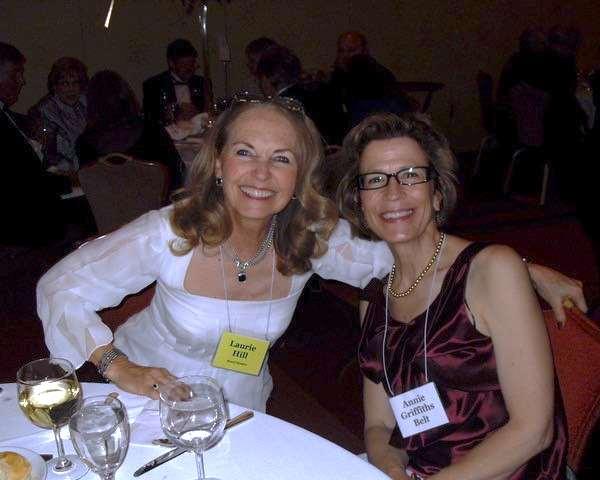


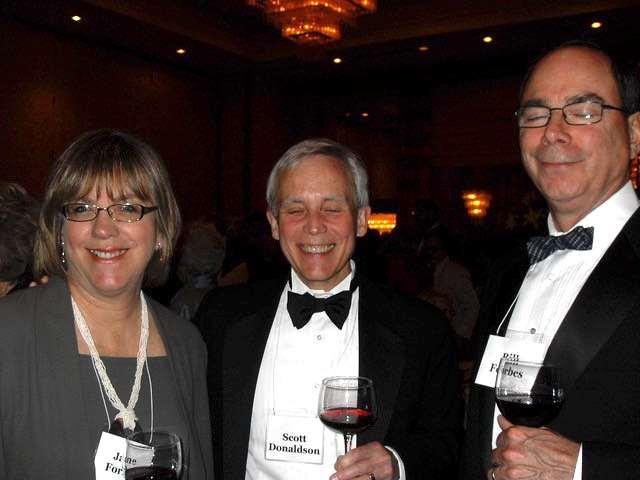
President Laurie Hill enjoying the festivities with keynote speaker Annie Griffiths Belt.
The Social Committee chair, Jan Wade, with a lot to smile about.


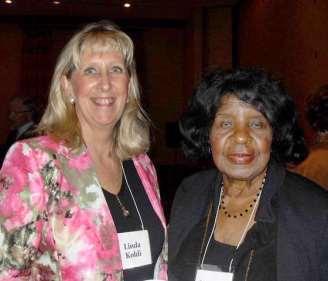
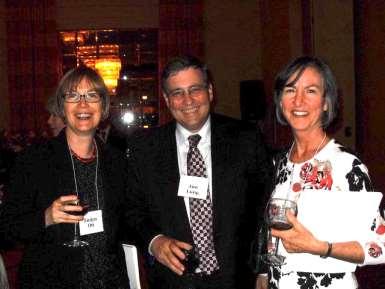
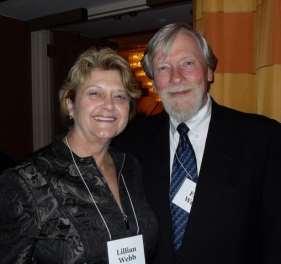
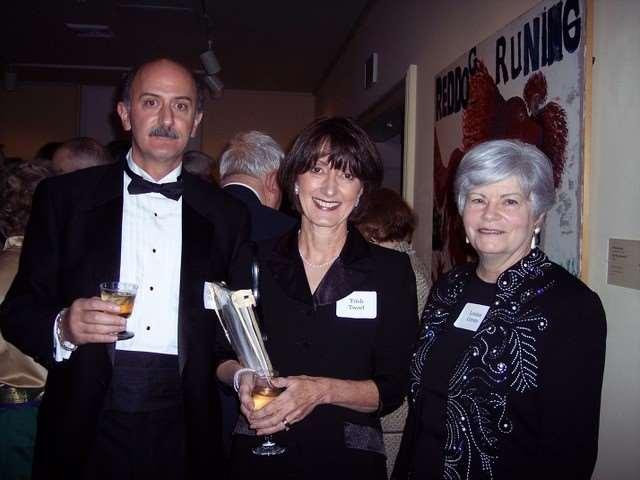


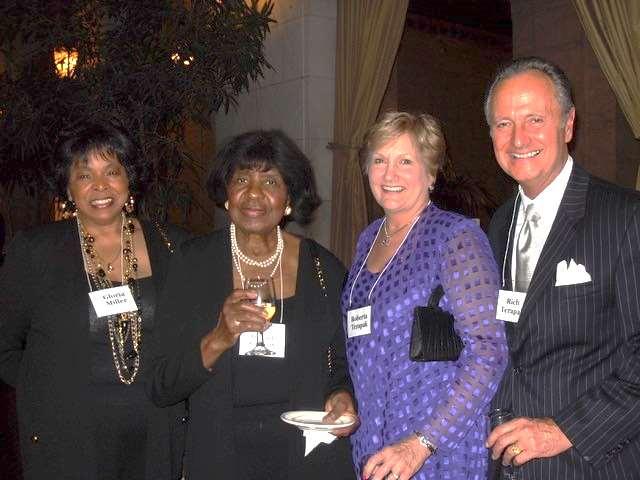
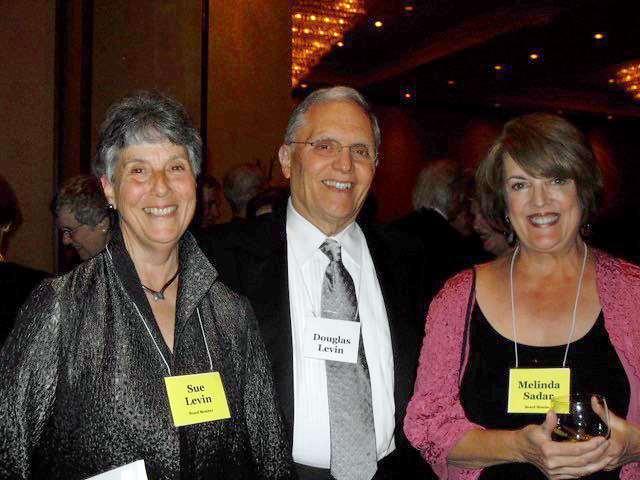
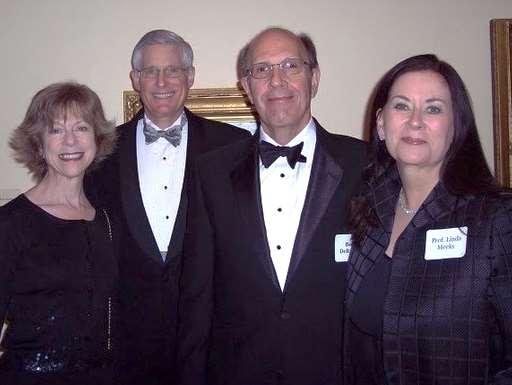
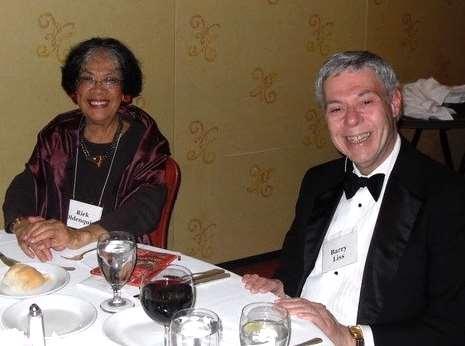
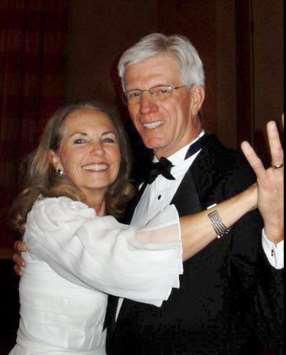


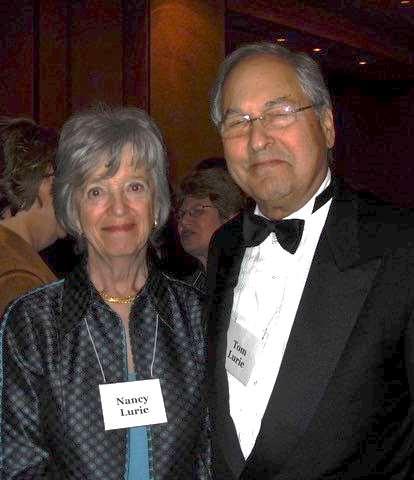

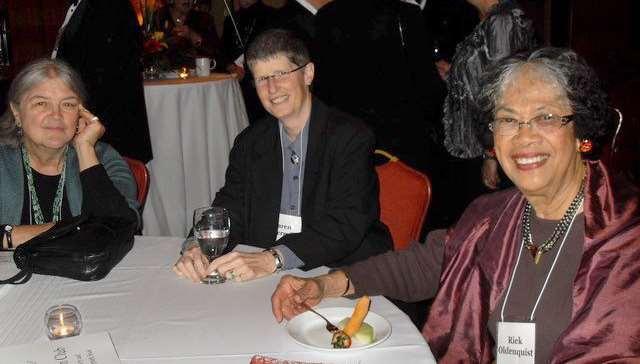
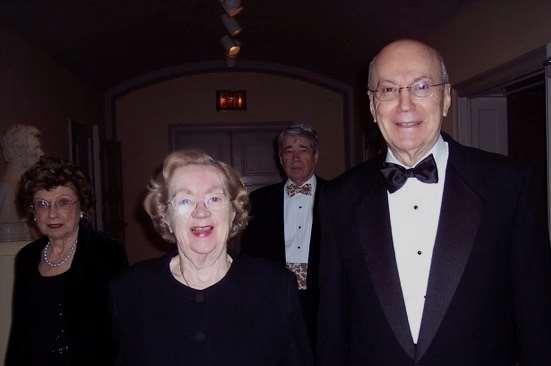

2009-2010
The theme for the year honored the 46 women presidents who have helmed the club since its founding.
• The club had 335 members of which 43 were new.
• The traditional membership process was observed wherein people were invited to join the club and required the support of a primary and secondary sponsor to be approved for membership by the board.
• Dues were $100 per person.
• At the start of the season in September, treasurer Gary Ness reported the club in sound financial shape with a club net worth of $72,640 in operating funds and reserves.
• President, Laurie Hill, indicated that she wanted to be known as “the email president” and set a goal of utilizing emails and the website as a way of saving money and allowing for more rapid communications with members. However, a substantial number of members still wanted the elegant, printed invitations to events to continue, and the “black tie optional” tradition was widely observed.
• At the gala, retiring President Laurie Hill announced the creation of a fund called the Supplemental Speakers Fund, which the Board established with a $600 seed donation from the directors.
• The constitution was amended from mail to mail/email as a way of using electronic communications with the members.
• Rob Waggoner, an ex officio member of the board and database guru, continued to make improvements to that system.
The Logo
Strange as it may seem, throughout its first 89 years, the club never had a logo. Feeling that the 90th anniversary called for a graphic representation of the club, the board commissioned On-Target Graphic Design to create a logo. The cost for the design was $200.
The Commemorative Book.
In 1922, the Crichton Club began the custom of collecting autographs (autograph book) from our speakers. That custom became a cherished tradition. Not surprisingly, after 88 years, the book was showing a bit of wear and tear. Thankfully, as one of many efforts to mark the 90th anniversary celebration in 2009-2010, club president, Laurie Hill, led an effort to preserve and, using modern technology, capture all the signatures in a new “90th Anniversary Commemorative Edition” .
That edition includes biographical notes about each speaker. It also features a timeline of speaker appearances, topics by season, and a cross-reference linking the biographical notes with the page of the corresponding speaker’s signatures. Most notably it included a concise written history of the club’s founding based on many hours of historical research.
A narrative, History of Crichton Club, using information gleaned from club minutes, letters, programs, and newspaper clippings housed in the archives of the Ohio Historical Society was published in 1994 to celebrate the club’s 75th anniversary history. That narrative, with additions, is included in the Commemorative edition.
One does not have to be a researcher or historian to appreciate the enormous amount of time, skill, and dedication it took to create this historic 90th anniversary gift to the club. Those who contributed mightily should be, and are, recognized in the anniversary edition.
It should be noted that, to compile the signatures and biographical information about the hundreds of speakers, each member of the board was assigned the research of approximately 15 speakers. Special recognition is due to Laurie Hill, Gary Ness, Marilyn Scanlon, Susan Levin, and Louisa Green, for the compilation, production, and distribution of the book.
The 500 original copies of the entire 80-page book were printed by Advanced Graphics for $3,395. Every member household including those who attended the anniversary gala received a copy of the book.
The Anniversary Gala
In February 2010, The Columbus Dispatch took note of the historic occasion with a feature article written by Amy Sanders.
Logistics posed a bit of a problem during the season because the customary home of the club – the Columbus Museum of Art – would be closed for the last two events of the season, with the final event being a major gala.
After much research and discussion, the Renaissance Columbus hotel was deemed to be the best location for the last two events for the season. The hotel offered a variety of event spaces, and the price was comparable to the museum. The lecture was in the 2nd floor ballroom followed by a dinner in the 3rd floor ballroom. The dinner featured chicken or sirloin, vegetarian eggplant, and tartlet. Noted pianist, Richard Lopez, provided entertainment during the dinner and festive reception where members and guests were invited to dance the night away.
Notable features of the gala included:
• Displays of books written by previous guest authors,
• Eight large display panels with enlargements created by Profile Imaging, Inc. of key news clippings from the past,
• The presentation of sterling cut glass bud vases, with the new logo, to living past presidents and the speaker.
LIFESTYLE
Crichton Club
Staff Writer
Columbus Monthly
The list of their past guests is impressive: Frank Lloyd Wright, Robert Frost and Henry Kissinger, to name but a few. For 90 years, the Crichton Club, which includes 320 members and always has been run by a female president, has brought engaging speakers to Columbus. Members pay $100 annually to meet three times a year to drink, dine and listen to the season's chosen lecturer. Current president Laurie Hill, a 66-year-old retired teacher who lives in New Albany, has been in the group for 11 years. "I'll tell you, it's like the biggest bargain in town," she said. "You get wine, food and the chance to talk to a famous person."
2010 - 2012

Board of Directors
2010 - 2011
Melinda Sadar – President
Barb Unverferth – Vice President
Susan Levin – Secretary
Gary Ness – Treasurer
Susan Altan
Sheila Cohen
Ida Copenhaver
Mary Greenlee
Lesley Schaab
Judy Schwartz
Jim Turner
Jan Wade
Rob Wagoner R

Board of Directors
2011 - 2012
Melinda Sadar – President
Ida Copenhaver – Vice President
Barb Unverferth – Secretary
Judy Schwartz – Treasurer
Susan Altan
Carolyn Christy
Sheila Cohen
John DeSando
Mary Greenlee
Susan Levin
Jim Turner
Lesley Schaab
Rob Wagoner
Reflections
91st and 92nd Seasons
The year began with a very welcome commemorative edition of the 90th Anniversary Crichton Club History and Autograph Book, written and edited by former presidents Marilyn Scanlan and Laurie Ann Hill. With this in hand, the president had a wonderful reference tool to help lead a dedicated board, which included Barb Unverferth, Susan Levin, Gary Ness, Susan Altan, Ida Copenhaver, Mary Greenlee, Lesley Schaab, Judy Schwartz, Jim Turner, Jan Wade, and Rob Wagoner as members of the 2010-2011 board of directors.
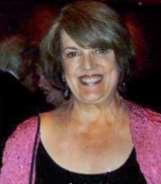
Melinda Sadar, President 2010-2012

In 2011-2012, the board of directors was joined by Carolyn Christy, Sheila Cohen and John DeSando.
The board members had been asked to provide brief biographies of each of the Crichton Club speakers for inclusion in the commemorative book, which were to appear on the pages opposite to copies of the revered autograph book.
Speakers for the 2010-2011 year were Edward Humes, a Pulitzer Prize-winning journalist and non-fiction writer; Lisa Shannon, an author and human rights activist, known for her work in the international women’s movement; and Matt Bai, journalist, author, screenwriter, and Washington Post contributing columnist.
The 2011-2012 speakers included Susan Stamberg, the longtime co-host of NPR’s All Things Considered, who has won every major award in broadcasting; David Eagleman, a neuroscientist, author and science communicator; and James M. McPherson, an American Civil War historian and Pulitzer Prize-winning author.
2010-2011
Edward Humes: Eco Barons: The New Heroes of Environmental Activism
Lisa Shannon: A Thousand Sisters
Matt Bai: The Generational Changes in American Politics and Society: Obama and Beyond
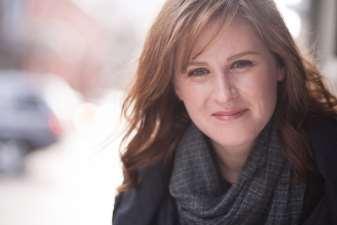

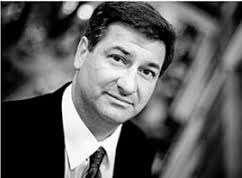

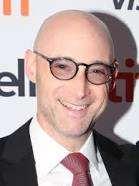

2010-2011
EDWARD HUMES, Pulitzer Prize Winning Journalist: “Eco Barons: The New Heroes of Environmental Activism.” In 1989 he received the Pulitzer Prize for specialized reporting for investigative stories he wrote about the United States military for the Orange County Register. Afterward, he began writing nonfiction books. Humes is the author of 13 nonfiction books, including the bestselling Mississippi Mud; No Matter How Loud I Shout; Baby E.R.; A Man and His Mountain; and Garbology, a popular selection for the First Year Experience program on college campuses.
In 2001, Humes spent a year teaching a writing workshop at Whitney High School in Cerritos, California, a middle-class Los Angeles suburb. His observations while at the school led to his narrative non-fiction book, School of Dreams, published in 2004. Humes is a contributing writer for Sierra Magazine, California Lawyer and Los Angeles Magazine, among other publications.
LISA J. SHANNON (b.1975), Scholar, human rights activist, writer, speaker known for her work in the international women's movement, and author of the acclaimed book A Thousand Sisters: My Journey into the Worst Place on Earth to Be a Woman. She is the founder of Run for Congo Women, a volunteer effort to raise funds and awareness for women in the Democratic Republic of Congo, and co-founder of Sister Somalia, the first rape hotline and support program for survivors of gender-based violence in Mogadishu. Shannon has a BA from Hampshire College and an MPA from Harvard's Kennedy School of Government.
MATT BAI (b. 1968) Matt Bai, chief political correspondent for the New York Times Magazine: The Generational Changes in American Politics and Society: Obama and Beyond Matt Bai is an American journalist, author, and screen writer. As of 2014, Bai was the national political correspondent for Yahoo! News. Prior to that, he was the chief political correspondent for The New York Times Magazine and a columnist for the Times. In addition to being a published and acclaimed author, Bai has been a public policy scholar at the Woodrow Wilson Center for International Scholars in Washington DC as well a Fellow at Harvard's Center for Public Policy.
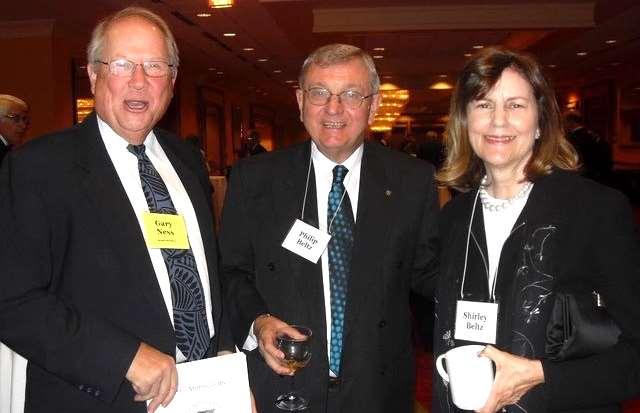

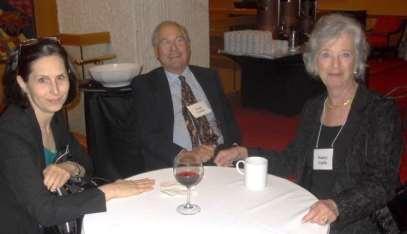
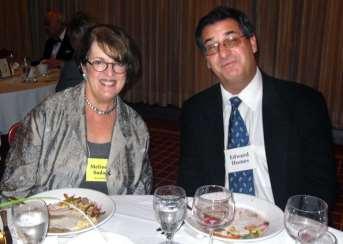
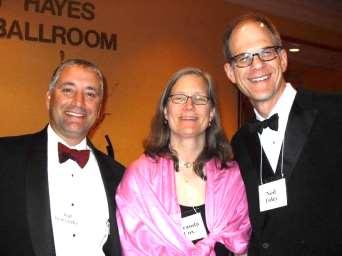


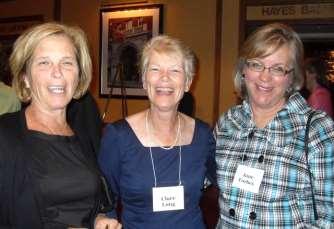

An amended constitution is approved June 8, 2011. There is a new member fee of $25.
Oct 12, 2011: The treasurer reports that since its inception in 2010, the speakers fund has received a total of $5,130.
Oct: 12, 2011: It was the consensus of the board that a speaker introduction by the president should not exceed about five minutes.
2011-2012
Susan Stamberg: Why Museums Matter/Why the Arts Are Important
David Eagleman: Incognito: The Secret Lives of the Brain
James M. McPherson: When will this cruel war be over?
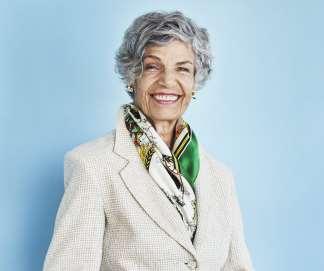
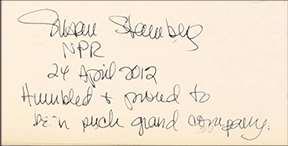


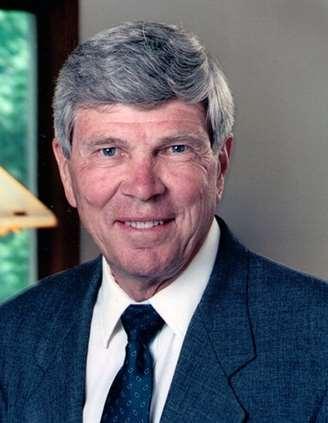

2011-2012
SUSAN STAMBERG (b.1938), NPR pioneer: Why Museums Matter/Why the Arts Are Important. Susan Stamberg has been a highly respected radio journalist on the National Public Radio staff since 1971. She is the first woman to anchor a nightly news program, and she is in the Broadway Hall of Fame and the Radio Hall of Fame. She also holds the prestigious "Edward R. Murrow Award" for American broadcast news. She has been guest host of the very popular programs "Weekend Edition" (2 years) and "All Things Considered" (14 years). Susan Stamberg was an actress in the 1990's and early 2000's. A graduate of Barnard College she has published 3 books on broadcast journalism along with 13 other published works.
DAVID EAGLEMAN (1971), Neuroscientist, author, Director of the Center for Science and Law: Incognito: The Secret Lives of the Brain. David Eagleman is an American neuroscientist, author, science communicator and science educator. Dr. Eagleman is best known for his work on brain plasticity, time perception, synesthesia and neurolaw. Currently a member of the Neuroscience faculty at Stanford, Dr. Eagleman is a graduate of Rice and earned his Ph.D at Baylor College of Medicine. He has been awarded a Guggenheim Fellowship and selected as Science Educator of the Year (Society for Neuroscience) as well as being a New York Times best-selling author for Incognito; The Secret Lives of the Brain. David Eagleman was the writer, creator, and host of the international Emmy award winning television series, “The Brain” with David Eagleman. Eagleman appears regularly on the lecture circuit throughout the United States in addition to radio and television appearances.
JAMES M. “JIM” McPHERSON (1936) American Civil War Historian: When will this cruel war be over? McPherson is an American Civil War historian and is the George Henry Davis '86 Professor Emeritus of United States History at Princeton University. He received the 1989 Pulitzer Prize for Battle Cry of Freedom: The Civil War Era. McPherson was the president of the American Historical Association in 2003.
2012 - 2014

Board of Directors 2012 - 2013
Ida Copenhaver - President
Sheila Cohen – Vice President
Barb Unverferth – Secretary
Judy Schwartz – Treasurer
Carolyn Christy
John DeSando
Mary Greenlee
Cathi Jones
Susan Levin
Katharine Moore
Lesley Schaab
Jim Turner
Rob Wagoner

Board of Directors 2013 - 2014
Ida Copenhaver – President
Sheila Cohen – Vice President
Barb Unverferth - Secretary
Carolyn Merry – Treasurer
John DeSando
Jane Forbes
Cathi Jones
Doug Jones
Susan Levin
Linda Baas McClelland
Melinda Sadar
Lesley Schaab
In loving memory of Ida Copenhaver (Crichton Club President from 2012-2014)
93rd and 94th Seasons
By Sheila Cohen
Ida was an unstoppable force –a woman who knew how to make things happen!
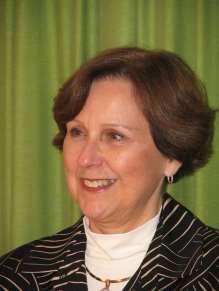
Ida Copenhaver, President 2012 - 2014
Immediately upon donning her Madame President hat, she undertook the monumental (and often thankless) task of transitioning the Club’s records and operations onto a 21st century technology platform. Ida recognized that certain changes were needed to enable the Board to function more efficiently and costeffectively, which, in turn, would allow the Board to devote more attention to attracting new members and securing engaging speakers. She swiftly identified a local technology vendor that catered to nonprofit organizations and won the support of her fellow Board Members: Carolyn Christy, Sheila Cohen, John DeSando, Mary Greenlee, Cathi Jones, Susan Levin, Katharine Moore, Lesley Schaab, Judy Schwartz, Jim Turner, and Barb Unverferth, as well as Ex-officio Board Members Melinda Sadar (Past-President) and Rob Wagoner (Database Chair).

Always a gracious and generous hostess, Ida typically held Board meetings at her dining room table, which she consistently staged with ample sustenance to endure the evening’s ambitious agenda. Over the course of the 2012-2013 membership year, in addition to performing their regular duties, Board Members devoted countless hours to the new technology initiative – reviewing and negotiating vendor agreements, transferring membership information to the new database, proposing and reviewing online content and language, attending vendor meetings and demonstrations, and testing the new software and platform operations – with the goals of:
1. Establishing a member portal and launching an electronic process whereby Club members could both renew their memberships and pay their renewal fees online by credit card,
2. Sending electronic invitations and enabling members to register for lectures and pre-lecture dinners, select their meals, identify their guests, and pay any related costs online, and 3. Updating and expanding the content of the Club’s website.
The process was not without frustration and setbacks. Does anyone remember (after much hype and anticipation) renewing and paying membership dues online . . . only to learn a few days later that no payment transaction had occurred, because the vendor had failed to disable the “testing mode” setting? Gasp! Nevertheless, Ida persisted and led the Board to triumph.1 In fact, even after her two-year term as President expired, Ida continued to devote considerable time and attention to ensuring the new platform’s reliable operation.
As if the technology project were not sufficiently challenging, Ida was also determined to focus the Board’s attention on the Club’s finances to ensure that the Club was not spending more than it was collecting. Unfortunately, before the Board had an opportunity to make any headway on such concern, the Club’s Treasurer resigned due to illness, and Ida was also determined to focus the Board’s attention on the Club’s finances to ensure that the Club was not spending more than it was collecting. Unfortunately, before the Board had an opportunity to make any headway on such concern, the Club’s Treasurer resigned due to illness, and Ida was unwittingly thrust into the role of deciphering and managing the Club’s financial records. While Ida rose to the occasion, Katharine Moore offered relief by volunteering to prepare a budget.2 Once it became clear that the Club was likely to encounter a deficit in 2013, the Board determined (after considerable handwringing!) that a $25.00 increase in annual membership dues (to $125.00 per member) was necessary and would be implemented during the upcoming renewal season.
In the spring of 2013, thanks to the efforts of John DeSando, the Board hosted a “bonus” event featuring Columbus’ Shadowbox Live (the nation’s largest full-time resident theatre ensemble). Soon thereafter, four fabulous new members joined the Board’s ranks and began participating in the lively festivities around Ida’s dining room table: Doug Jones, Jane Forbes, Linda Baas-McClelland, and Carolyn Merry (who agreed to serve as Treasurer). As online registration activity gained momentum that year, the Board’s technology focus shifted to enhancing the Club’s website. In a salute to that final technological feat, Katharine Moore, the Website Chair, generously commissioned an impressive new logo for use on the site.
By the time Ida’s presidency came to an end in the spring of 2014, Ida had revolutionized the Board’s operations and had delighted in celebrating the unique talents and achievements of the six memorable speakers she welcomed to the stage on behalf of Crichton Club: Laurie Garrett, Matt Taibbi, Chis Abani, Nasir Ghaemi, John Hall and Rachel Moore. Well done, Ida.
1 It was inconceivable at the time, given Ida’s heroic efforts and grand success, that the Board would be forced to abandon the new platform a few years later. Yet, when the Board’s technology vendor, in an apparent rejection of its own nonprofit mission, began engaging in questionable billing practices, fired all of its board members and employees, and refused to provide an appropriate level of service to the Club (and to the vendor’s other customers), the relationship came to an abrupt end. With this particularly galling turn of events, Ida’s lessons in perseverance continued to lead the way.
2 Katharine likewise saved the day by stepping into the role of Program Chair when another Board Member resigned due to job-related pressures.
FYI
In 2012 the club constitution was revised.
2012-2013
Laurie Garrett: Betrayal of Trust: Critical Issues in Global Health
Matt Taibbi: Griftopia: Bubble Machines, Vampire Squids, and the Long Con that is Breaking Amercia
Chris Abani: "Stories of Struggles, Stories of Hope: Art, Politics, and Human Rights"
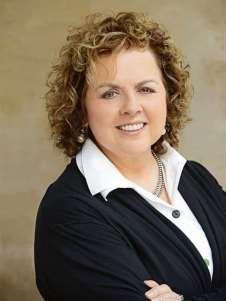
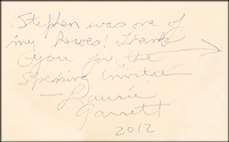
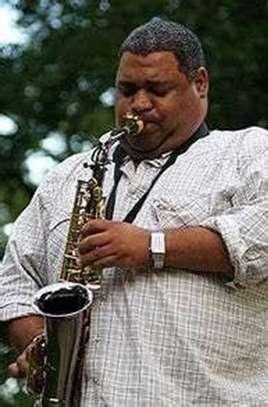
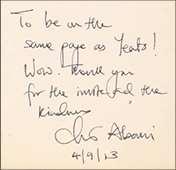
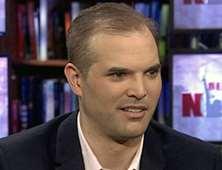

LAURIE GARRETT, Senior fellow for global health at the Council on Foreign Relations in New York: “Betrayal of Trust: Critical Issues in Global Health.” Garrett wrote her first bestselling book, The Coming Plague: Newly Emerging Diseases in a World Out of Balance, while splitting her time between the Harvard School of Public Health and the New York newspaper, Newsday. In the 1992-93 academic years Garrett was a Fellow at Harvard, where she worked closely with the emerging diseases group, a collection of faculty concerned about the surge in epidemics of previously unknown or rare viruses and bacteria. The book was published in hardcopy by Farrar, Straus, and Giroux in 1994, and spent 19 weeks on the New York Times bestseller list. Released in paperback in 1995 by Viking Penguin, The Coming Plague remains in print and continues to sell vigorously. The book was released in e-book form in May 2011.
During the 1990’s Garrett continued tracking outbreaks and epidemics worldwide, noting the insufficient responses from global public health institutions in Zaire, India, Russia and most of the former USSR, Eastern Europe, and the United States. This resulted in publication in 2000 of Betrayal of Trust: The Collapse of Global Public Health, released by Hyperion that year, and in paperback in 2001. Betrayal of Trust was also a vigorous seller and remains in print today. It was also released as an e-book in May 2011.
In Summer 2011, Garrett's long-awaited third book, I Heard the Sirens Scream: How Americans Responded to the 9/11 and 10th Anniversary of 9/11 by Garrett is a Member of the World Economic Forum Global Health Security Advisory Board. She is also a member of the Council on Foreign Relations, and the National Association for Science Writers.
MATTHEW C. TAIBBI (b. 1970), Journalist, contributor to Rolling Stone Magazine: Griftopia: Bubble Machines, Vampire Squids, and the Long Con that is Breaking America. Taibbi is an American author and journalist. He is a contributing editor for Rolling Stone where he has reported on politics, media, finance, and sports. Spending much of his early career in Russia and the former USSR, Taibbi returned to the United States in 2002. He was a freelancer for numerous publications until he settled at Rolling Stone writing feature length articles on domestic and international affairs. In 2019, he launched a political podcast released through Rolling Stone. Taibbi holds a B.A. from Bard College. In 2008, he received a National Magazine Award in the category of “Columns and Commentary" followed by a Sidney Award for outstanding investigative journalism in service of the common good in 2009. He is a member of the Institute of Politics at the Kennedy School of Government and the Hoover Institution at Stanford. In 2019, he announced that he was leaving Yahoo! News to focus on screenwriting.
CHRIS ABANI, Nigerian and American Author: "Stories of Struggles, Stories of Hope: Art, Politics, and Human Rights " Abani is a graduate of the University of Arkansas with an MBA from San Jose State University. Amani has a deep portfolio of strategic management, corporate operations, and leadership experience at cutting edge technology companies such as Electronic Arts, MongoDB and Zynga. Amani currently serves as CEO of Humanity, a provider of cloud-based scheduling solutions. Having been with the San Francisco company for over five years, he had previously served as head of finance, and analytics, Vice President of growth and operations and chief operating officer. He was named CEO of Humanity in 2018.
Rachel Moore: Why are there no black swans?
John Hall: The Importance of Being Civil
Nassir Ghaemi, MD, MPH: Between madness and greatness
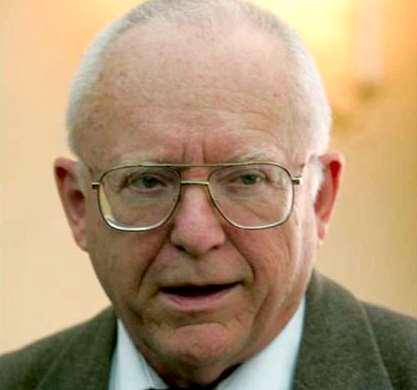
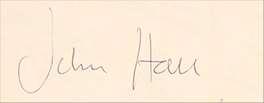
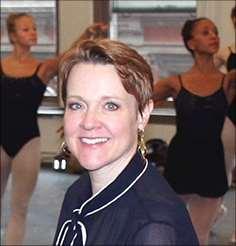

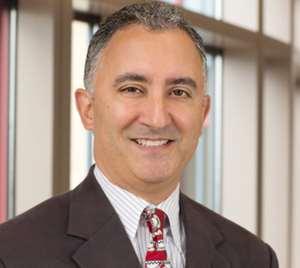

RACHEL S. MOORE, CEO of American Ballet Theater: “Why are there no black swans?” Moore is president and CEO of The Music Center, Los Angeles' premier capacity theater. She leads the $70 million company that manages The Music Center at Grand Park on behalf of the County of Los Angeles. Moore also oversees “The M” as curator of programming, including its internationally acclaimed dance series Dance at The Music Center, as well as a number of innovative programs introducing new audiences to the performing arts. Additionally, she guides the education initiatives, which reach over 600,000 children and youths.
Moore joined The Music Center from American Ballet Theatre (ABT), one of the programs where she served as CEO since 2011 and as its executive director since 2004. ABT's brand continued to grow, securing recognition for the company by the United States Congress in 2005. Moore comes from the performing arts, having danced ballet from 1984-1988. Prior to her appointment to lead ABT, Moore served as director of Boston Ballet Moore served as adjunct faculty in Columbia University's Arts Administration program, specializing in non-profit finance, dance department of Emerson College from 1998-2000; and an instructor of non-profit finance in Boston University 2000. She holds an AB in Ethics & Political Philosophy from Brown University, Phi Beta Kappa, Honors (1992); and an MA Columbia University (1994).
JOHN A. HALL (b.1949 - ), "The Importance of Being Civil." Dr. Hall is the James McGill Professor of Comparative Historical Sociology at McGill University in Montreal, Canada. A graduate of Oxford University, he earned his doctorate at the London School of Economics in 1976. Dr. Hall was named a Fellow of the Royal Society of Canada in 2012 and was presented with the Society's Innis-Geri medal in 2016. He is the author or editor of more than 20 books.
NASSIR GHAEMI, MD MPH, Professor of Psychiatry at Tufts University School of Medicine: “Between madness and greatness.” Nassir Ghaemi, MD, is the Director of the Mood Disorder Program and the Psychopharmacology Consultation Clinic at Tufts Medical Center and a professor at Tufts University School of Medicine. Dr. Ghaemi’s clinical work and research has focused on depression and manicdepressive illness, particularly in exploring the role of antidepressants in the treatment of bipolar disorder.
He has published over 100 scientific articles and has written or edited eight books, including the critically acclaimed A First-Rate Madness: Uncovering the Links between Leadership and Mental Illness (2011), in which he examines positive aspects of mental illness in great historical leaders. Dr. Ghaemi serves on a number of editorial boards of psychiatric journals, is a Distinguished Fellow of the American Psychiatric Association, and is the former chairman of the Diagnostic Guidelines Task Force of the International Society for Bipolar Disorders (ISBD). He is board certified in Psychiatry and Neurology.
2013-2014

In 2013 the club constitution was amended. In 2014 it was revised.
2012-2013
January 12: John DeSando presents detailed proposal for a bonus event of a dinner and lecture at Shadowbox Live in the Brewery District. The speaker would be the founder of Shadowbox, Steve Guyer. Shadowbox is the largest residential theater company in the U.S. The proposal included dinner in the Backstage Bistro. It would reinforce Town and Gown.
2013-2014
January 14, 2014: The board holds a planning meeting with the theme: “Re-energize.” The consensus is that the club is ot attracting enough OSU professors. Co-Branding with another organization was also discussed
January 27, 2014: Katherine Moore introduces a new logo and tagline.

6/16/2014: The club conducts a survey to determine if the tradition of formal evening wear should be reemphasized. The vote for tuxedoes was 56% No, 43% Yes.
June 2014: The new website is launched so that it would be available for renewals for the upcoming 2024-2015 season. Membership is $125 and an additional registration fee of $25 for new members.
2014 - 2016


Sheila Cohen – President
Katharine Moore – Vice President
Carolyn Christy - Secretary
Bob Redfield - Treasurer
John DeSando
Lynn Elliott
Jane Forbes
Dan Jensen
Susan Manacke
Linda Baas McClelland
Doug Jones
Barbara Muller
Reflections
95th and 96th Seasons


It was truly an honor to be elected and to serve as the President of this extraordinary and historically significant organization. I shudder to think that I nearly declined the opportunity! My apprehensions toward the undertaking were well-founded, of course. After all I had served on the Board during the terms of my three exceptional predecessors: Laurie Hill, Melinda Sadar, and Ida Copenhaver. Having witnessed their endeavors at close range, I was mindful of the substantial amount of work involved in serving in such a capacity.1 I was also keenly aware of the fact that each of these women had had the good sense to retire before holding the highest office in the land (of Crichton!) I, on the other hand, was in the middle of my career –and already struggling to maintain my sanity while managing demanding clients located in multiple time zones; an erratic legal practice (where I also served as an administrative assistant, billing clerk, and IT department, among other posts); and an even more erratic sleeping schedule (which occasionally involved “pulling an allnighter”). Ultimately, despite the imperfect timing of my good fortune, I recognized that this incredible opportunity was unlikely to arise ever again and must be grasped posthaste!
Sheila Cohen, President 2014 - 2016
When the 95th Season arrived, my two-year term as President began with tragedy. On June 3, 2014, Carolyn Merry, the Club’s lovely and energetic new Treasurer, abruptly lost her life in an automobile accident as she was returning home from a trip to Cincinnati. Carolyn had joined the Board with rave reviews only a year earlier, after she had retired from her position as Professor and Chair of the Department of Civil, Environmental, and Geodetic Engineering at The Ohio State University. The news of her death was devastating to the Board and to a far broader community of family, friends, and students.
Remarkably, before any consideration could be given to transitioning Carolyn’s Board duties, Bob Redfield, Carolyn’s husband, graciously volunteered to fulfill the remaining portion of Carolyn’s term. That generous spirit seemed to captivate and take hold of the entire Board. When we gathered monthly, typically
downtown at the Jefferson Center Carriage House, we collaborated, conspired, and supported one another, with both tenderness and enthusiasm, as we planned our collective exploits. I genuinely looked forward to every single meeting and treasured that time with my friends and fellow Board Members: Carolyn Christy, Ida Copenhaver (Esteemed Past President), John DeSando, Lynn Elliott, Jane Forbes, Dan Jensen, Cathi Jones, Doug Jones, Susan Manecke, Linda Baas McClelland, Katharine Moore, Barbara McAdam Muller, Bob Redfield, Lesley Schaab, and, for a brief period, Linda McGuire.
Ida, who had become my dear friend and mentor, consistently looked out for me – with gentle prompts, reminders, and helpful suggestions.2 Meanwhile, she continued to monitor renewals and nominations, prepare reports, provides instruction on internet “cookies,” and field questions from members as they adjusted to the new online portal. Club Members Dorrie Andermills and Fran Webb also provided significant assistance with ongoing technological tasks.
Bob (and later Dan) faithfully arrived at every Board meeting with budgeting recommendations and multiple updated spreadsheets tracking and projecting every expense and credit. Jane, as Membership Chair, was instrumental in launching the Board’s successful campaign to grow the Club’s membership base. When Barbara subsequently assumed this post amidst the excitement of an expanding organization, she readily mastered the new database and managed all membership renewal tasks with aplomb.
Secretary Carolyn dutifully recorded the minutes of each Board meeting and prepared speaker summaries for the lecture invitations. As Communications Chair, Lesley prepared beautifully handwritten thank-you notes to members who had contributed to the Speaker’s Fund and presided over various member outreach efforts.
Katharine, who served as Program Chair and Vice President, continued to excel in recruiting diverse, engaging, and accomplished speakers, notwithstanding the Club’s modest budget. Katharine’s additional contributions were extensive; they included wrangling with the Museum’s AV team in a frustrating effort to secure attentive service and a reliable microphone, and single-handedly rescuing the Board from doom by producing an alternate dinner venue in the spring of 2016 (when meals at the Museum became cost prohibitive )3
The responsibilities of the Social Committee were expansive and occasionally required the effort of the entire Board.4 Cathi, in addition to procuring the floral arrangements for each lecture, met with the Museum’s caterer and expertly selected the dinner options for the 95th Season. A charismatic team, Linda (Baas McClelland) and John, co-chaired the committee. After years of greeting members and guests as they arrived, ensuring the alphabetical availability of nametags for all registered attendees, and managing dinner-related activities, Linda and John eventually narrowed their focus to the pre-lecture dinners. In response to several catering mishaps, Linda became an appropriately rigid taskmaster, insisting that courses be served in accordance with an exacting timeline 5 Susan and Lynn flawlessly assumed and executed all greeting and nametag functions.
Doug and John, the Social Committee’s ambassadors of social order, escorted each speaker to the Chihuly in Derby Court for the post-lecture reception. Handsomely clad in their tuxedos, they attentively flanked the speaker and served as gentle “enforcers” – ensuring that each person in the queue was afforded an opportunity to converse with the evening’s honored guest.
With such unrelenting support from every direction, I never once questioned my decision to serve in this role; as President, I was both thrilled and honored to introduce the following slate of distinguished speakers to Crichton Club: Benjamin Hufbauer, Bonnie Magness-Gardiner, Kenneth Feinberg, Bob Orr, Denis Belliveau and Mary Norris. I continue to applaud them all!
1 At some point during my board tenure, I began to realize that preparing for each lecture was akin to planning a wedding. At no point, however, even after meeting with Ida to discuss “the transition of power,” did I fully appreciate the reality that I had just committed to planning six “weddings” over the course of the next two years!
2 Although Ida never said so, I suspect she was quite horrified to discover that I was purposely warehousing the Club’s cherished “Autograph Book” (containing the signatures of the Club’s prestigious lecturers, collected over the course of nearly 100 years) in my automobile. Nevertheless, this practice was my foolproof method for ensuring the book’s arrival at each lecture.
3 The multi-year renovation and subsequent reopening of the Columbus Museum of Art (the Club’s beloved and timehonored venue for hosting its dinner/lecture/reception events) presented the Board with various challenges. In addition to catering snags and escalating dinner and reception costs (particularly upon the reopening), there was considerable distress while the Museum’s parking lot was under construction. On one occasion, although the Board had appropriately obtained permission (through the Museum) to use a nearby church parking lot and had specifically informed Club members of the availability of such lot for the upcoming lecture event, the Museum neglected to notify its security staff of the arrangement. When members and guests were redirected (away from the church’s lot) as they arrived for the dinner and lecture, mass chaos ensued.
4 I would be remiss if I failed to acknowledge the ongoing contributions of Club Member Barry Liss. Barry was frequently (and affectionately) cited as the Board’s “litmus test,” as he routinely provided honest and constructive feedback in response to changes in practice (such as the relocation of the Club’s dinners to Derby Court) and offered a comprehensive critique of the latest dinner and reception offerings. The Board regularly used such feedback from Barry and others to identify and address areas for improvement.
5 It was during this period that the Museum proposed moving the Club’s dinners from a modest meeting room to Derby Court. The move garnered an enthusiastic response from all attendees
2014-2015
Benjamin Hufbauer Ph.D.: America's Pyramids: Presidential libraries in the 20th and 21st centuries
Bonnie Magness-Gardiner: Missing a masterpiece?
Kenneth Feinberg: Putting a price on life
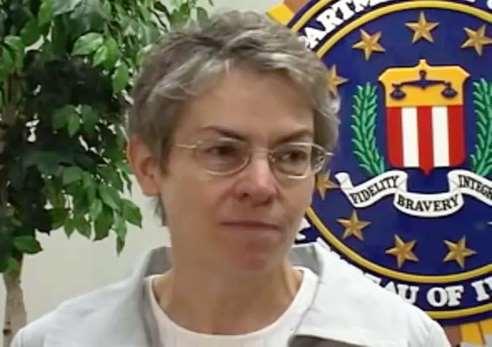

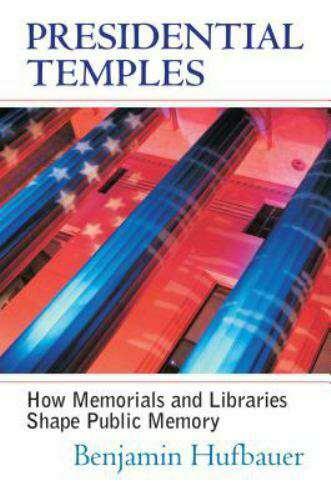

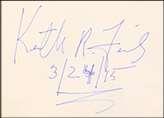
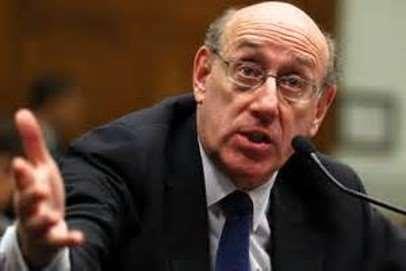
2014-2015
BENJAMIN HUFBAUER, Ph.D., Associate Professor University of Louisville: “America's Pyramids: Presidential libraries in the 20th and 21st centuries.” Hufbauer is an Associate Professor at the University of Louisville, where he teaches art history and film studies. His book, Presidential Temples: How Memorials and Libraries Shape Public Memory (University Press of Kansas), according to Kirk Savage, "shows how presidential libraries expose the basic tensions of American democracy: as archival shrines they serve to embody the ideal of free and open inquiry, while celebrating the concentration of power in the 'imperial presidency’." Hufbauer's articles have been published in African Arts, The Journal of American History, The Public Historian, Politico, Inside Higher Ed, and The New York Times.
BONNIE MAGNESS-GARDINER, Ph.D. (b.1951-) Former Art Theft Program Manager for the Federal Bureau of Investigation: “Missing a masterpiece?” was the former Art Theft Program Manager for the Federal Bureau of Investigation and managed the National Stolen Art File. The rapid deployment art crime team was put together in 2004 at the FBI and Dr. Magness-Gardiner joined the program in 2005. Since its inception, the team has recovered over 850 items valued at more than $134 million. Dr. Magness-Gardiner holds her degrees from the University of California, Santa Barbara, and the University of Arizona (MA and Ph.D.); her areas of specialization include art theft, fraud, forgery, antiquities trafficking, Near Eastern archaeology, and alternative careers in archaeology. After drugs and guns, art theft is the largest criminal enterprise in the world.
KENNETH FEINBERG, Attorney, Mediator for the 9/11 Fund Disbursement: “Putting a price on life.” Feinberg is a leading expert on mediation and dispute resolution with vast experience in very high-profile cases. The task is often deciding the fair distribution of funds in major settlements occasioned by tragedy or financial upheaval i.e., ruling on "who gets what and what is fair compensation." The list includes acting as Special Master for the BP oil spill fund, sorting out payments from the September 11th Victim Compensation Fund and for the Boston Marathon Victim Assistance Fund. Also determining penalties and charges for the TARP Executive Compensation settlement during the federal bailout of banks in the 2009 financial crisis and overseeing the compensation of U.S. diesel automobile owners affected by the VW emissions scandal. Mr. Feinberg mediated the personal injury claims in the aftermath of the Penn State University/Sandusky scandal. A distinguished lawyer he is an adjunct lecturer at various universities and authored a book, "What Is Life Worth?" on the 9/11attack.
2015-2016
Bob Orr: Evolving threats to America foreign and domestic
Denis Belliveau: On the Trail of Marco Polo
Mary Norris: Between you and me, confessions of a comma queen
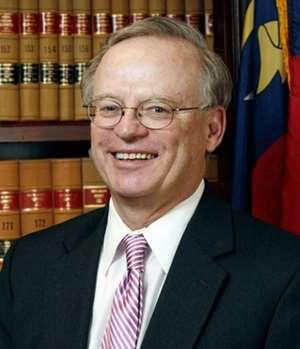

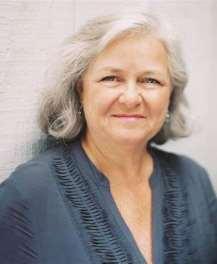

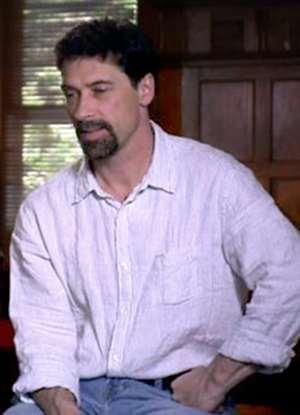

2015-2016
BOB ORR, CBS News Correspondent: “Evolving threats to America foreign and domestic.” Orr covers Homeland Security and Aviation for CBS News in Washington, Orr worked in Central Ohio on WBNS10TV before jumping to the network. Orr is the Justice and Homeland Security correspondent for CBS. In Central Ohio, Orr reported and anchored at 10TV from 1978-85 and again from 1988-93. primarily for the “CBS Evening News with Dan Rather.” He has broken several important stories
DENIS BELLIVEAU, Photographer and Cinemaphotographer: “On the Trail of Marco Polo.” Belliveau is an American photographer, author, and explorer notable for retracing Marco Polo 's route from Europe to Asia and back, a feat which culminated in the publication of the documentary and book titled, In the Footsteps of Marco Polo; the documentary has been used by Belliveau to create a unique interdisciplinary educational curriculum that he presents at schools and libraries across the United States and internationally.
MARY NORRIS, Copy Editor, The New Yorker: “Between You and Me, confessions of a Comma Queen.” Norris is the author of Greek to Me and the New York Times bestseller Between You & Me, an account of her years in The New Yorker copy department. She has been on the staff of The New Yorker for some 35 years, and a Page OK'er for twenty of those. Norris has been referred to by some as a prose goddess, or a comma queen. Originally from Cleveland, she lives in New York.
“I’ll be giving a lecture tonight at the storied Crichton Club in Columbus Ohio. Here is a list of previous speakers of whom I’m honored and humbled to have been asked to join.”
-March 8, 2016, Denis Belliveau’s Facebook

Board of Directors
2016 - 2017
Katharine Moore – President
Jane Forbes – Vice President
Carolyn Christy - Secretary
Dan Jensen - Treasurer
John DeSando
Lynn Elliott
Mabel Freeman
Doug Jones
Mark Krausz
Linda Baas McClelland
Susan Manecke
Barbara McAdam Muller
Marilyn Pritchett
Bob Redfield


2016 - 2018
Reflections
97th and 98th Seasons
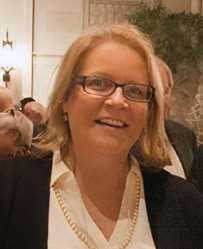

Board of Directors
2017 – 2018
Katharine Moore – President
Jane Forbes – Vice President
Carolyn Christy - Secretary
Dan Jensen - Treasurer
John DeSando
Lynn Elliott
Mabel Freeman
Doug Jones
Mark Krausz
Linda Baas McClelland
Susan Manecke
Barbara McAdam Muller
Marilyn Pritchett
Bob Redfield
It was my honor to be elected President of Crichton Club for the 2016-2018 term. The position required a great deal of time, and there were digital issues that were (almost literally) maddening, but I forged deep friendships, and I do recall laughing a lot.
The membership records had been digitized and a website launched in the years just prior to my term, but neither was functioning smoothly. Thanks to the legal expertise and negotiating skills of Sheila Cohen, we were able to retrieve our data and terminate the contract with the vendor. A complete re-creation of the membership records was required after there was a snafu in the hand-off to the new vendor and very sadly the date of each member’s enrollment was lost. Member Dorrie Andermills and I spent two long years trying to untangle the Gordian knot. We might never have escaped from this Tenth Circle of Hell, had Mark Krausz not arrived on the scene! Mark volunteered hundreds of hours of time and delivered the system we enjoy today which allows members to renew, make lecture reservations, and pay for dinners online.
The Trustees I served with were generous with their wisdom and wits and were very productive. Our friendships were deepened as we enjoyed December receptions at the Renaissance Hotel and Jefferson Avenue porch parties in the summertime. The roster of names is a veritable corps of town and gown civic leadership: Carolyn Christy, John DeSando, Lynn Elliott, Jane Forbes, Mabel Freeman, Dan Jensen, Doug Jones, Mark Krausz, Linda Baas McClelland, Susan Manecke, Barbara McAdam Muller, Marilyn Pritchett, Bob Redfield, and Past President Sheila Cohen.
The board members explored membership trends, growth, and diversity goals, developed a brochure for marketing efforts, and launched a newsletter to encourage member engagement. The first edition of the current newsletter, published by Mark Krausz, featured a profile of
Katharine Moore, President 2016 - 2018
member Jane Werum by John DeSanto. We celebrated her 50th anniversary of membership after a lecture with cake and flowers that seemed to delight her.
The Columbus Museum of Art entered into an exclusive agreement with a catering company that priced us out. Moving the pre-lecture dinner to the Columbus College of Art and Design seemed to help jolt an action that overturned the arrangement, and we were able to return to the beloved Derby Court. The cost in angst and gray hairs was never tallied in the belief that it was better not to know.
There is an eerie September 10th quality to my memory of hosting past presidents at a luncheon to invite ideas for commemorating the 100th anniversary of the organization. The brainstorming was fruitful, but the COVID pandemic was just around the corner, and I was crushed to hand off an unresolvable conundrum to Jane Forbes, my ever-sotalented successor, rather than the honor that chairing the organization through its centennial was intended to bestow. There may not have been galas or gatherings, but Jane rose to the occasion and steered the organization through that disorienting time with grace and good humor, keeping the group intact when many others folded.
There is an eerie September 10th quality to my memory of hosting past presidents at a luncheon to invite ideas for commemorating the 100th anniversary of the organization. The brainstorming was fruitful, but the COVID pandemic was just around the corner, and I was crushed to hand off an unresolvable conundrum to Jane Forbes, my ever-so-talented successor, rather than the honor that chairing the organization through its centennial was intended to bestow. There may not have been galas or gatherings, but Jane rose to the occasion and steered the organization through that disorienting time with grace and good humor, keeping the group intact when many others folded.
In 2018 an obituary published in the Columbus Dispatch told the story of Virginia Ebinger’s truly remarkable life and noted that she was a Past President of Crichton Club. I too consider my term to be one of the highlights of my civic life and hope someone remembers to include it when the time comes to sum up my days.
With all best wishes for another century of good fellowship and stimulating ideas, Katharine Moore.
Kevin Kallaugher: Where to Draw the Line?
2016-2017
Greg Lukianoff: Campus Censorship: Unlearning Liberty and Freedom
Jill Tarter: The 21st Century: The Century of Biology on Earth and Beyond
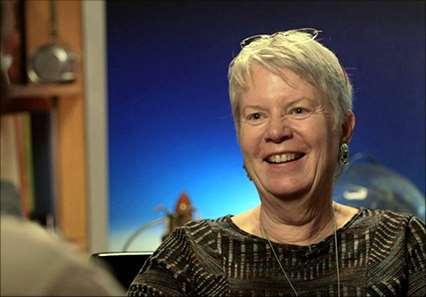

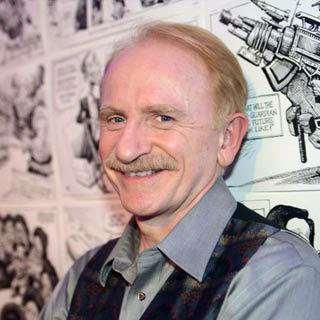

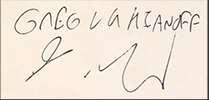
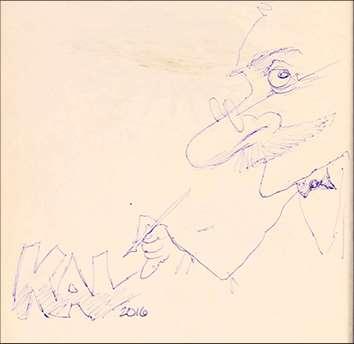
2016-2017
KEVIN KALLAUGHER (KAL), Editorial Cartoonist, The Economist: “Where to Draw the Line?” Kallaugher is the editorial cartoonist for The Economist magazine of London, The Baltimore Sun and the online newsletter, Counterpoint. In March 1978, The Economist recruited him to become their first resident cartoonist in their 145-year history. He spent the next 10 years working in London as a cartoonist for such publications as The Observer, The Sunday Telegraph, Today and The Mail on Sunday.
He has won many awards for his work including the 2018 and 2002 Berryman award presented by the National Press Foundation, the 2015 Herblock Prize, prize finalist for the 2015 and 2020 Pulitzer Prize in Editorial Cartooning.
GREG LUKIANOFF, CEO and Founder, F.I.R.E. – (Campus Censorship: Unlearning Liberty and Freedom.” Lukianoff is a lawyer and the President and CEO of the Foundation for Individual Rights in Education (FIRE). He is the author of Unlearning Liberty: Campus Censorship and the End of American Debate, Freedom from Speech, and Fire's Guide to Free Speech on Campus. Most recently, he coauthored The Coddling of the American Mind: How Good Intentions and Bad Ideas Are Setting Up a Generation for Failure with Jonathan Haidt. This New York Times best-seller expands on their September 2015 Atlantic cover story of the same name. Greg is also an Executive Producer of Can We Take a Joke? a feature-length documentary that explores the collision between comedy, censorship, and outrage culture, both on and off campus.
JILL TARTAR, Ph.D., “The 21st Century: The Century of Biology on Earth and Beyond.” Jill Tarter is an astronomer and former director of the Center for SETI Research; currently, she is the Bernard M. Oliver Chair for SETI (Search for Extraterrestrial Intelligence) at the SETI Institute. Tarter led Project Phoenix, a decade-long SETI scrutiny of about 750 nearby solar systems. Tarter received her undergraduate education at Cornell University, where she earned a Bachelor of Engineering Physics Degree, and a master’s degree and Ph.D. in astronomy from the University of California at Berkeley. Her work was part of the inspiration for Carl Sagan's novel Contact. In the movie adaptation, the character was played by Jodie Foster.
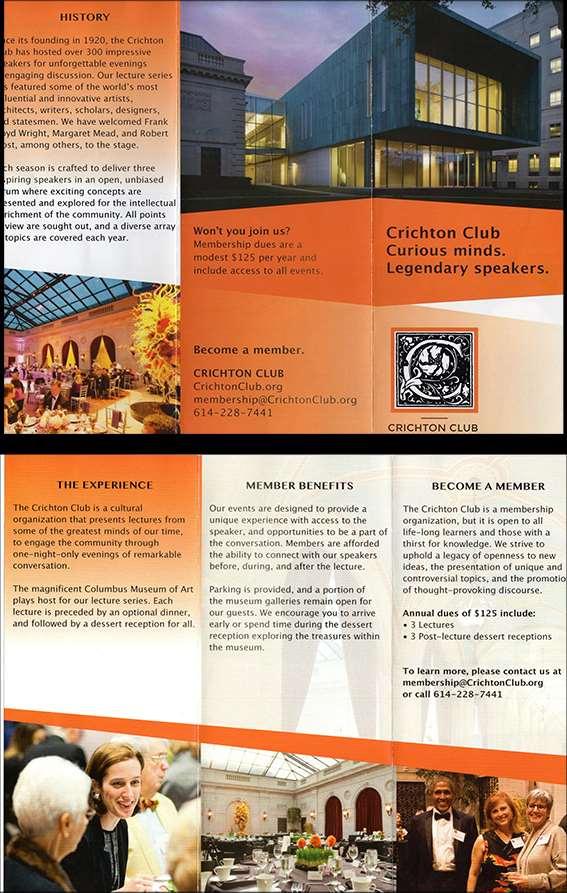
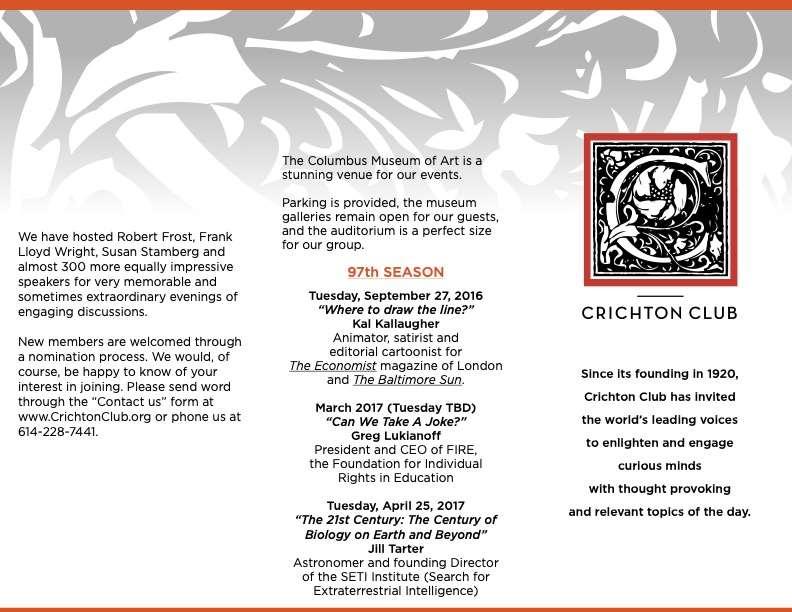

Greg Harris: Rock and Roll: America's Greatest Revolution
Annette Gordon Reed, Harvard Professor and Pulitzer Prize Winning Author: "Jefferson and the Hemmings."
Daryl Baldwin, Director, The Myaamia Center: "The Miami People and Their Language, Reclaiming an Endangered Treasure."


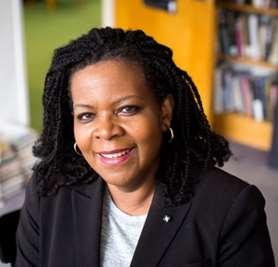

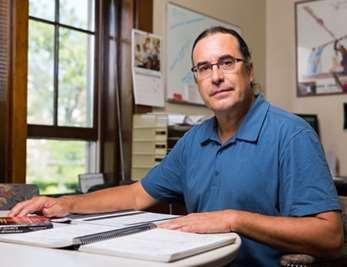

2017-2018
GREGORY S. HARRIS (b.1965): Director, Rock & Roll Hall of Fame: “Rock and Roll: America's Greatest Revolution.” Harris is the president of the Rock and Roll Hall of Fame. Harris has worked at the Rock and Roll Hall of Fame since 2008, starting out as vice president of development and being named President and CEO in late 2012 and starting in the position in 2013. Prior to that a senior executive at the National Baseball Hall of Fame and Museum for fourteen years. Harris co-founded the Philadelphia Record Exchange in 1985 with Jacy Webster, a notable retail outlet which specialized in hard-to-find vinyl. He also worked in the live music business as the road manager for Ben Vaughn.
Harris has expended programming at the HOF, partnering with more traditional museums such as New York City's Metropolitan Museum of Art in 2019 to create a gigantic collection of musical instruments and photographs to accompany them. During COVID-19, the HOF expanded its educational outreach and put more of its programming on YouTube where they were able to reach hundreds of teachers daily. Harris has also been instrumental in an upcoming expansion of the HOF, a project that will break ground in 2022.
ANNETTE GORDON REED, Harvard Professor and Pulitzer Prize Winning Author: "Jefferson and the Hemmings." Reed is Professor of American legal History at Harvard Law School, Gordon-Reed was the first African American to win the 2009 Pulitzer Prize for History, for her 2008 work on The Hemingses of Monticello. She won 15 additional awards for the book. Recognition includes numerous Awards and honors, MacArthur, Guggenheim, National Humanities Medal, National Book Award. She lectures on multigenerational and multiracial life on Thomas Jefferson's plantation and what that tells us about race in America.
DARYL BALDWIN, Director, The Myaamia Center: "The Miami People and Their Language, Reclaiming an Endangered Treasure." Miami (Myaamia) nation. Baldwin is Director of the Myaamia Center at Miami University and a leader in Native American language and cultural revitalization, has been named one of the 2016 MacArthur Fellows - recipients of the so-called "genius grants." Baldwin, also an adjunct assistant professor in educational leadership, is among 23 people selected this year from a variety of fields by the John D. and Catherine T. MacArthur Foundation.
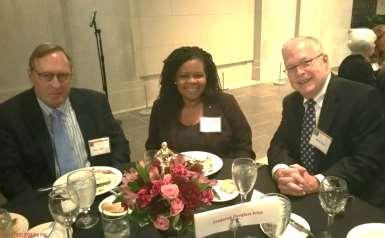
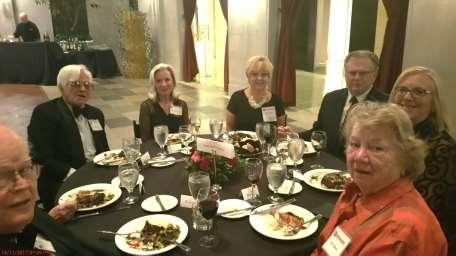
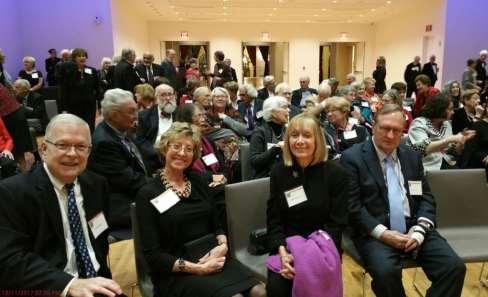
Board of Directors
2018 – 2019
Jane Forbes – President
Mabel Freeman – Vice President
Marilyn Pritchett – Secretary
Dan Jensen – Treasurer
Diane Driessen
Lynn Elliott
Doug Jones
Mark Krausz
Susan Manecke
Barbara Muller
Carla Sokol
Linda Woggon


Board of Directors
2019 - 2020
Jane Forbes – President
Mabel Freeman – Vice President
Marilyn Pritchett – Secretary
Dan Jensen – Treasurer
Diane Driessen
Lynn Elliott
Doug Jones
Mark Krausz
Susan Manecke
Barbara Muller
Kathleen Murphy
Mark Real
Carla Sokol
Linda Woggon
Reflections
99th and 100th Season
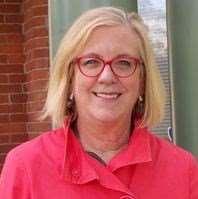
Jane Forbes, President 2018-2020

My years as President of Crichton Club will always be a source of pride and very fond memories. When I was elected, I had a wonderful Board of Directors and great programs in the queue. We were excited to begin planning for the 100th Year of Crichton Club. Little did I know when we celebrated the successes of the outgoing President Katharine Moore at a June porch party, the years ahead would be truly “unprecedented.”
Early in the summer of our 99th year, we heard from the Columbus Museum of Art that they were forced to raise their event prices for the wonderful location where Crichton Club had met for 60 years. We couldn’t possibly pay the new higher fees. We began to search for a new venue within our budget and the Board began a year of very productive soul-searching and decision making.
In August we had a terrific Board of Directors visioning session entitled “Retreat and Renewal.” The Board left the retreat energized and inspired to position Crichton Club for its next century. We were committed to facing the concurrent challenges of declining membership and rising speakers’ fees. In a gesture of great generosity, Nannette Maciejunes, Director of the Columbus Museum of Art, agreed to return us to our previous contracted fees, saying graciously, “The Crichton Club is family.” We could continue to hold our meetings at the Columbus Museum of Art, which truly felt like home.
So many innovations for Crichton Club were born out of necessity in 2018-2019. I set a two-year goal of hitting a membership total of 300. Board Member Mabel Freeman, the official greeter for our meetings at the museum, championed a more inclusive membership model. We increased opportunities for socializing and held our first New Member Party at Past President Laurie Hill’s home, and a Mid-Winter Wine Tasting at past Board Member Barb Unverferth’s gallery. Our dedicated Secretary Marilyn Pritchett’s new Membership Committee invited community members who would be interested in the speakers’ subject matter to attend our lectures. Board Member Susan Manecke
found us a new caterer and planned lovely dinners in Derby Court that resulted in an increase in dinner attendees who now had a special opportunity to hear pre-lecture comments by the evening’s speaker.
We increased member outreach through more online communications. Board Member Mark Krausz and Vice President Barbara Muller made membership applications and renewals more user-friendly. Board Member Diane Driessen and Past President Melinda Sadar took on the preservation and digitizing of our 99-year-old historic autograph book, making it available on our website for all the world to see. Mark continued to improve our database and challenged us to consider a digital autograph book in our next century. We included more members in planning for the Centennial and on three new task forces. Board Member Lynn Elliot used her business contacts to generate potential patron interest. Mabel formed a group of fund raising-savvy Board and club members.
Through it all Treasurer Dan Jenkins kept us on point with detailed financial reports. Board Member Doug Jones handily won the New Member Recruitment Contest, all the while staunchly defending Crichton Club’s noble traditions. Board Member Linda Woggon helped us update the Constitution and created a Policies and Procedures Handbook that removed barriers to joining the club, streamlined our processes including electronic meetings, and grew the Board from twelve to fifteen.
We even examined two sacred cows: The “black-tie optional” dress code and formal printed invitations sent via US Mail. It was hard to give up those traditions, but in the interest of economy and keeping up with the times, we moved on. The club members quickly adapted. And membership, dinner and lecture attendance grew.
The subject matter of our lectures during the 2018-2019 Season gave us good opportunities to invite guests to grow our community’s awareness of Crichton Club. In the fall Andrew Zimbalist, PhD, Chair of the Smith College Department of Economics, spoke on the “Economics of Collegiate Sports.” A frequent contributor to national publications, Andrew’s presentation was very popular and attracted new faces from the Columbus area associated with Ohio State University Athletics. Crichton Club member and former Columbus Mayor Greg Lashutka even brought some fellow teammates from their days on the OSU Buckeye Football Team!
Our second fall speaker, Robert Daly, Director of the Kissinger Institute on China and the United States at the (Woodrow) Wilson Center, spoke on “The Future of US-China Relations.” A show of hands revealed that 50% of our rapt audience had traveled to China! We also invited the Ohio-China Chamber of Commerce to Daly’s presentation and some of the attendees subsequently became Crichton Club members. In the spring we hosted Cathy Spahn, CEO of the Helen Keller International who gave an inspiring presentation entitled “Be Brave: International NGO’s and Healthcare,” drawing lots of questions from the audience.
During the 2019-2020 season we began planning for Crichton Club’s 100th year in earnest. Mabel, now Vice President, spearheaded the Centennial Season, assembling a committee of Board and Crichton Club members, and laying the foundation for a Second Century Fund. Board Member Carla Sokol began planning for a terrific Centennial Celebration in the spring. We had ambitious plans!
At the September meeting we honored many past Crichton Club Presidents at the Presidents Reception, wellattended by 200 guests and members. Thinking toward our next century, the fall speakers featured futureoriented subject matter. Abby Smith Rumsey, Historian and Consultant to the Library of Congress National Digital Information Center and Preservation Program spoke on “We Are What We Remember: Curating Memory in the Digital Age.”
Our second fall speaker was Laurence C. Smith, Professor and Chair of Geography at the University of California, Los Angeles (UCLA), where he also held a joint appointment in the Department of Earth, Planetary, and Space Sciences. He spoke on “The New North: The World We are Making.” That evening we hosted two renowned guests for our pre-lecture dinner in Derby Court, Ohio State University Distinguished Professors
Lonnie Thompson and Ellen Mosely-Thompson from the Byrd Polar Research and Climate Center at Ohio State University. Little did we know when we invited this distinguished duo that Ellen had served as a PhD dissertation advisor for Laurence Smith. It was old home week!
The Board decided to honor the founders of the Crichton Club in the last lecture of our 100th year by inviting Neil Bush to speak. Bush is Chairman of Points of Light, an international nonprofit that works to increase volunteerism in the world. Bush is son of George H.W. Bush, 41st President of the United States, and the great grandson of one of Crichton Club’s founders, Samuel Prescott Bush, who served as President of Columbus Steel Castings and was a prominent member of the Columbus community in the early twentieth century. Neil Bush planned to speak about Points of Light and the importance of service and volunteerism in our world.
Then in March 2020, the COVID-19 pandemic changed our world.
In those unprecedented times, the Board tried to plan for the future. Through those difficult spring months, the Board of Directors continued to meet via ZOOM, adjusting plans for the spring and optimistically planning for the upcoming season. The club’s adaptations to electronic communications proved to be fortuitous because we were able to keep engaging our membership, also thanks to Board Member Kathleen Murphy’s communications expertise. Program Chair Mark Real led the planning for the upcoming season’s speakers. A new slate of directors with Mabel Freeman as President was elected to carry on the traditions and the aspirations of the Crichton Club and we ventured into our Second Century.
2018-2019
Andrew Zimbalist, Chair, Smith College Economics Department: "The Economics of Collegiate Sports."
Robert Daly, Director, US China Studies, Wilson Institute: "The Future of US China Relations."
Kathy Spahn, CEO, Helen Keller International: "Be Brave: International NGOs and Healthcare."

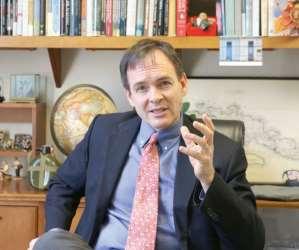
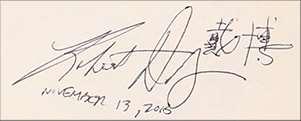

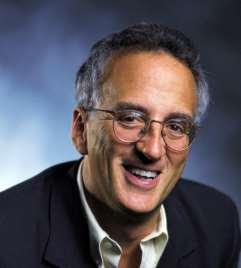

2018-2019
DR. ANDREW S. ZIMBALIST, (September 10, 2018) Chair, Smith College Economics Department: "The Economics of Collegiate Sports." Zimbalist has been a Professor of Economics on the faculty of Smith College since 1974. A leading expert in the economics of sports industries he has consulted for players associations, leagues, companies, and cities, and has authored 25 books and several dozen articles. Many of these were on baseball, both college and professional. Professor Zimbalist has also done extensive consulting in the economic development including in Cuba and Latin America. Zimbalist is the Robert A. Woods Professor of Economics at Smith College, where he has been in the Economics Department since 1974. Zimbalist has published and lectured widely on the economics of sports and consulted in the sports industry for players' associations, cities, companies, leagues, film projects, and law firms. He has been a frequent media commentator on NPR's Marketplace, contributes op-eds frequently to leading newspapers and magazines and has testified numerous times before the U.S. Congress. He has served as the Smith College representative for the NCAA for over ten years. He holds a B.A. from University of Wisconsin and a master’s and doctorate from Harvard University.
ROBERT DALY, (November 13, 2018) Director, US China Studies, Wilson Institute: "Anyone's Guess: Where Will U.S.- China Relations be in November 2018?" Daly was named as the second Director of the Kissinger Institute on China and the United States at the Woodrow Wilson Center in August 2013. Daly has compiled an unusually diverse portfolio of high-level work: he has served as a U.S. diplomat in Beijing; as an interpreter for Chinese and U.S. leaders, including President Carter and Secretary of State Kissinger; as head of China programs at Johns Hopkins, Syracuse University, and the University of Maryland; and as a producer of Chinese-language versions of Sesame Street. Daly lived in China for 11 years and is recognized by the East and West as a leading authority on Sino-U.S. relations. He has testified before Congress, lectured widely in both countries, and regularly offers analysis for top media outlets.
KATHY SPAHN, (April 9, 2019) President and CEO, Helen Keller International: "Be Brave: International NGO’s and Healthcare." Spahn oversees Helen Keller international's global development projects in 20 countries with an innovative approach to saving and improving the sight and lives of the world's vulnerable.
Prior to joining Helen Keller International, Spahn was President and Executive Director of Orbis International, a non-profit dedicated to the prevention and treatment of blindness in developing countries. Ms. Spahn is a member of the boards of directors of the Access to Nutrition Foundation, the International Agency for the Prevention of Blindness and InterAction, the last of which she chaired from 2010-2013. Spahn also serves on the International Food Policy Research lnstitute's (IFPRI) Leadership Council Compact of 2025. Previously, she served on the boards of directors of the AIDS Service Center NYC (now the Alliance for Positive Change), Association of Nutrition Services Agencies, and Bernadotte Foundation for Children's Eyecare, as well as numerous advisory bodies. She has been a frequent panelist and guest speaker on global health, nutrition, and blindness at such venues as the Global Philanthropy Forum, the Clinton Global Initiative and at key side meetings of the UN General Assembly.

Thanks to the incredible work of the membership committee chaired by Marilyn Pritchett, the season began with a record 74 new members for a total membership of 293.
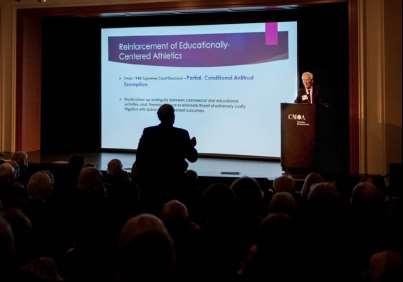


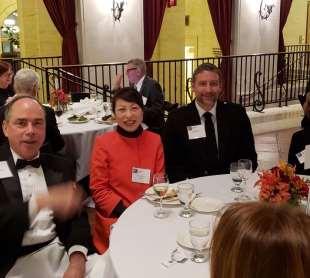
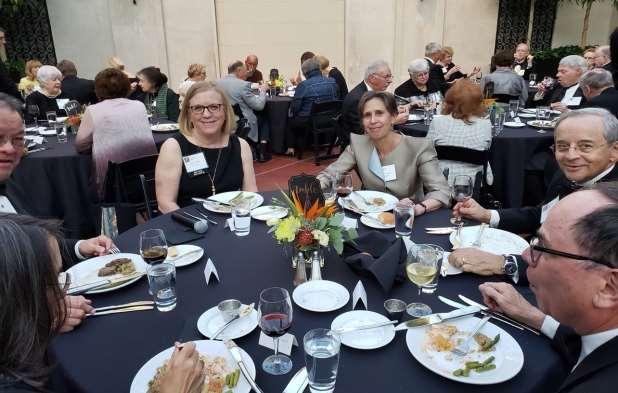


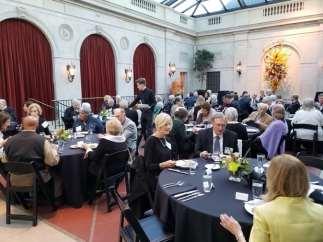
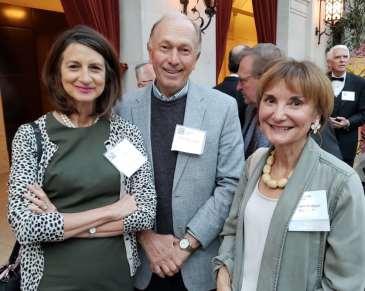
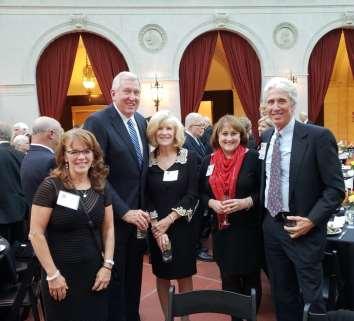
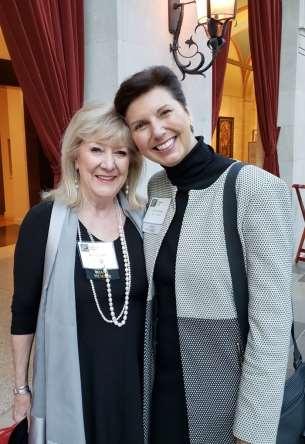
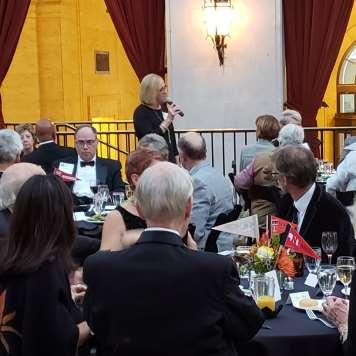
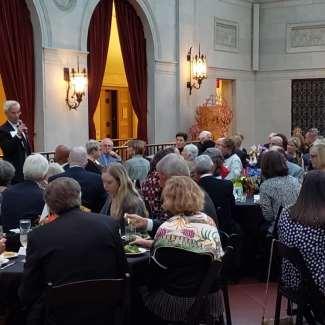
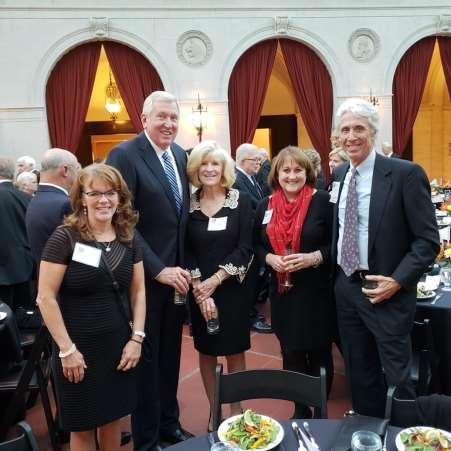

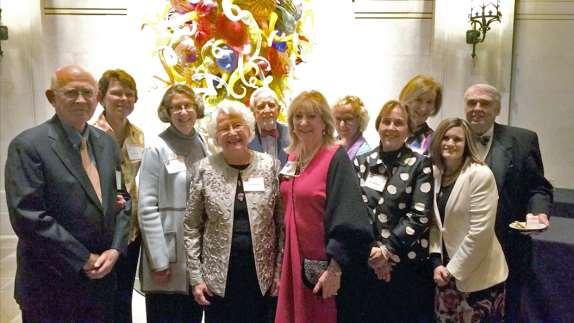

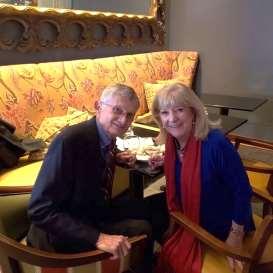
The Board gets together at the Renaissance Hotel to share a bit of holiday cheer.
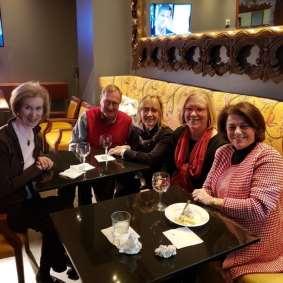
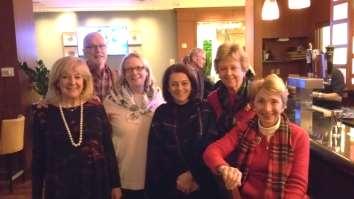
2018-2019
To fill the void between the fall and spring lectures, the club enjoyed a wine and cheese social event at Art Access, Barbara Unverferth’s beautiful Bexley gallery.
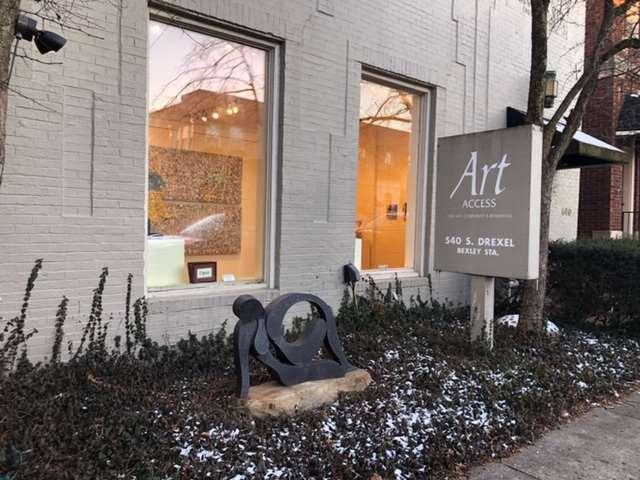





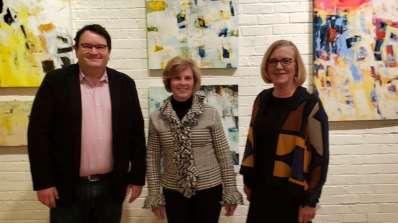
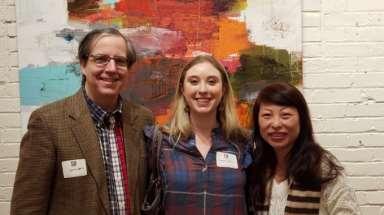

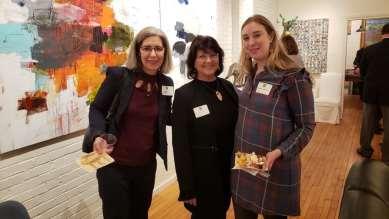
2018-2019
With the 100th anniversary in the offing, President Jane Forbes convened a planning meeting at the historic Depot Event Center. It was followed by a cookout on the Center’s patio.
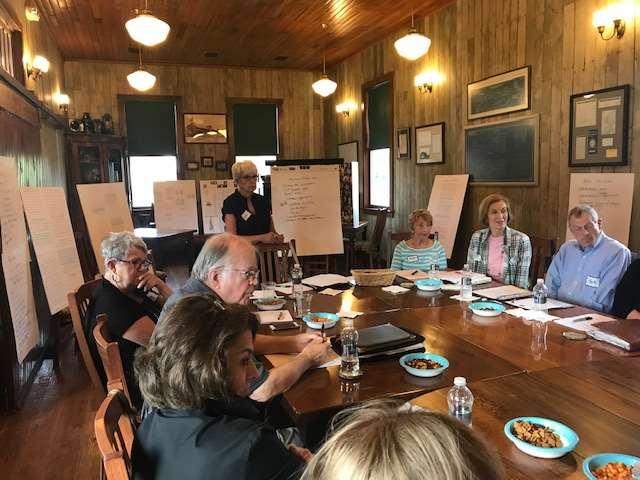
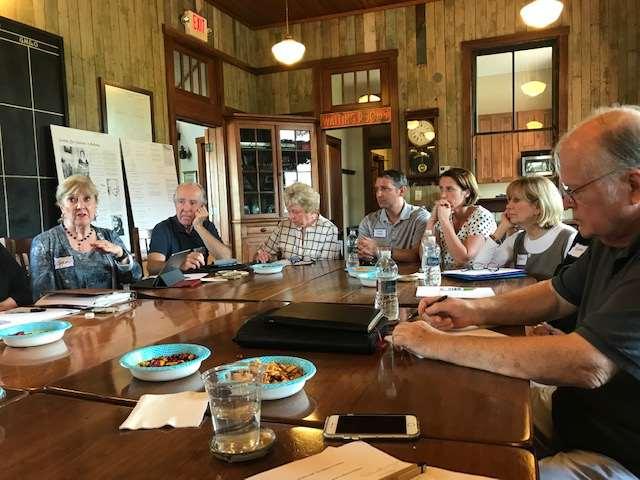

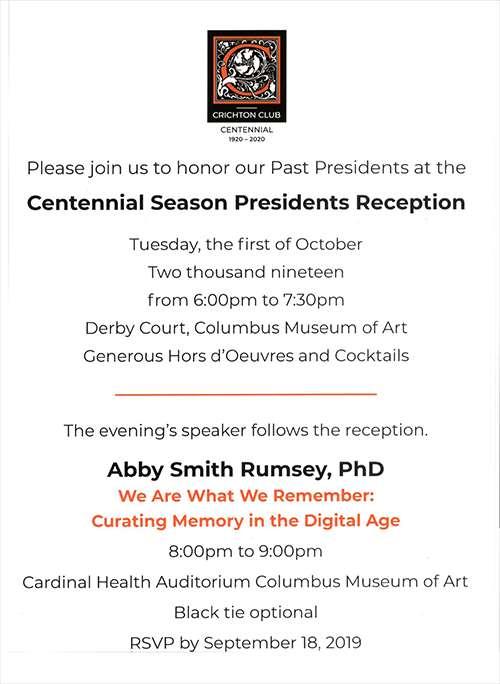

2019-2020
Abby Smith Rumsey, Author, historian, Library of Congress National Digital Information Infrastructure and Preservation Program: "We Are What We Remember: Curating Memory in the Digital Age."
Laurence C. Smith, Climate scientist and Guggenheim Fellow: "The New North: The World We Are Making.” Neil Bush, Chairman of Points of Light Foundation, International Businessman, son of the 41st and brother of the 43rd Presidents of the United States.

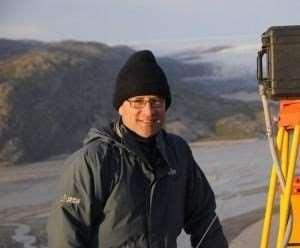

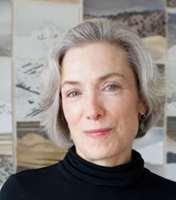

Neil Bush
2019-2020
AMY SMITH RUMSEY, (October 1, 2019) Author, historian, Library of Congress National Digital Information Infrastructure and Preservation Program: "We Are What We Remember: Curating Memory in the Digital Age." Rumsey is an historian of ideas focusing on how information technologies shape our perceptions of history, time, and personal and cultural identity. Smith Rumsey is the author of When We Are No More, which explores human memory from pre-history to the present, and chronicles how we moved from the Paleolithic selfies painted on cave walls tens of thousands of years ago, to the temples of learning we call libraries, to the present-day formats of zettabytes of data on servers including books, films and scientific databases. Abby Smith Rumsey has served as an advisor to multiple universities and research libraries on strategies to integrate digital information resources into existing collections and services. She is a consultant to and author of the Library of Congress's National Digital Information Infrastructure and Preservation Program (NDIIPP) in development of a national strategy to identify, collect and preserve digital content of long-term value.
DR. LAURENCE C. SMITH, (November 12, 2019) Climate scientist and Guggenheim Fellow: "The New North: The World We Are Making.” Smith is one of the world's leading climate scientists and author of the award-winning book, The World in 2050, a work of enormous scope, cross-cutting themes of population demographics, globalization, natural resource demand, and climate change. It won the Walter P. Kistler Book Award, was a Nature Editor's Pick, and has been translated into 14 languages.
Dr. Smith is Professor of Geography at UCLA and served as Department Chair from 2013-2017. He also holds a joint appointment in the Department of Earth, Planetary, and Space Sciences at UCLA. In 20192020 he was a Visiting Professor of Earth, Environmental and Planetary Sciences at Brown University. His research interests include the Arctic, water resources, and satellite remote sensing technologies. He has published over 100 peer-reviewed journal articles, essays and books including in the journals Science, Nature, and PNAS, and won more than $9M in research funding from the National Science Foundation and NASA. In 2006-2007 he was named a Guggenheim Fellow by the John S. Guggenheim Foundation. He frequently gives keynote speeches and in 2012, 2014, 2016 was an invited speaker at the World Economic Forum in Davos.
In the summer of 2015, Smith and his team conducted groundbreaking research on the melting ice sheet in Greenland, the first of its kind, and work that can "help scientists figure out how rapidly sea levels will rise in the 21st century, and thus how people in coastal areas from New York to Bangladesh could plan for the change" -The New York Times
Neil Bush, (April 14, 2020) Chairman of Points of Light Foundation, International Businessman, son of the 41st and brother of the 43rd Presidents of the United States. Cancelled due to the Coronavirus pandemic
2019 - 2020
Samuel Prescott Bush, the scion of the Bush family dynasty, was the son of a minister who started as an apprentice laborer. He worked his way up from the sweat and dirt of the factory to build and become president of Buckeye Steel Castings, the third largest producer of steel couplers at the turn of the 20th century. His second wife, Martha Bell Bush, was our fourth president. When times were tough, he was an outspoken supporter for the continuation of the Crichton Club. His great-great grandson, Neil Bush, founder of the Thousand Points of Light Foundation, was to be the speaker for our planned 100th Anniversary celebration.


2019-2020
New Member Party
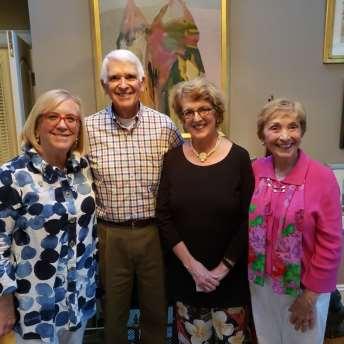
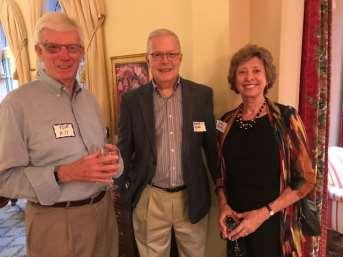
Melinda Sadar, our president from 2010-2012, and her husband, Ed, hosted a new member party at their amazing German Village home.
(l-r) President Jane Forbes, Ed Sadar, Melinda Sadar, and membership chair, Marilyn Pritchett.
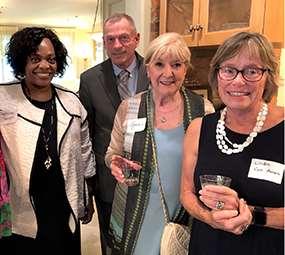
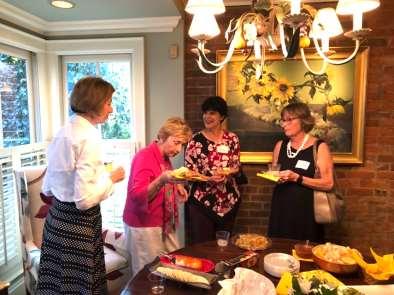
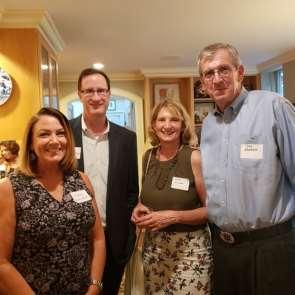
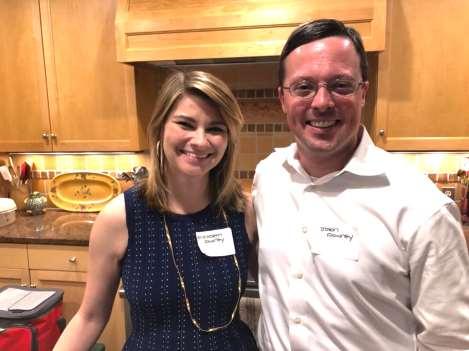
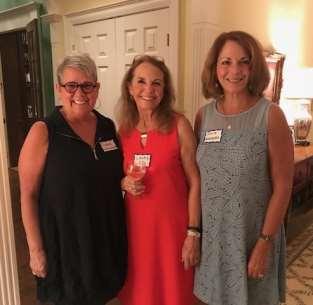

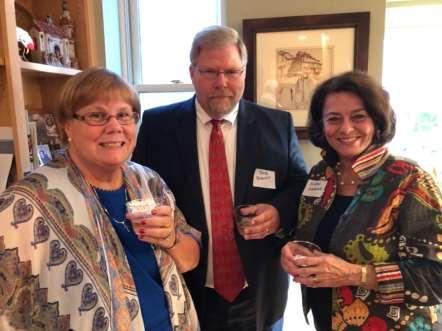

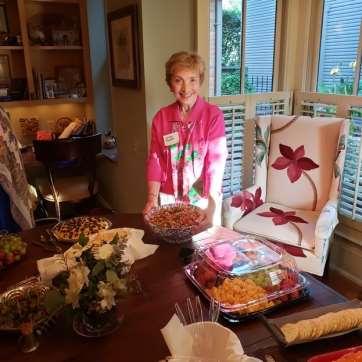
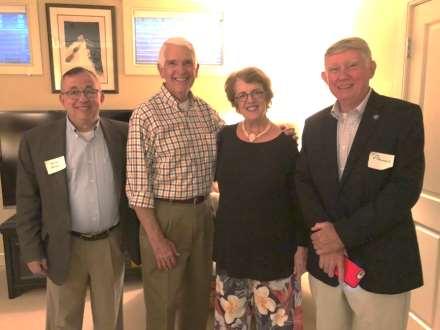
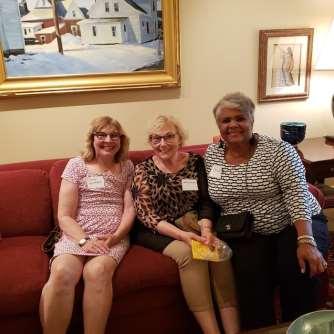
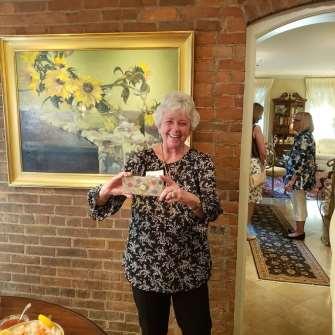
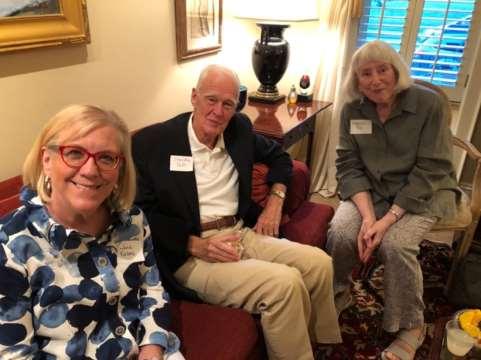
2019-2020
The Centennial Season Class and Guest Presidents
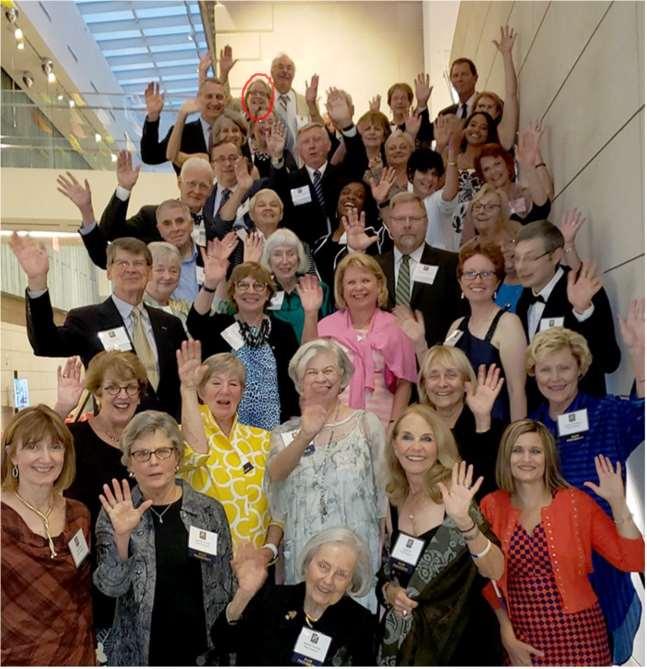
The Centennial celebration kicked off with a salute to our former presidents. Those who were able to attend are: (top of stairs) Katharine Moore; (second row, bottom, l-r) Melinda Sadar; Anne Larrimer; _____; Carole Schuller; Susan Quintenz; (front row, l-r) Trish Tweel; JoAnn Frantz; Marilyn Scanlan; Laurie Hill; Sheila Cohen.

2019-2020
Presidents Reception
As a fitting kick off to the centennial celebration the club held a black-tie-optional brunch honoring former presidents and included a presentation by author and historian, Abby Smith Rumsey.
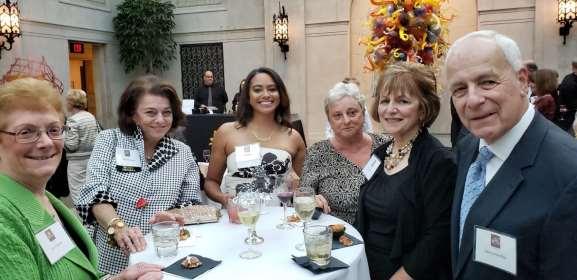
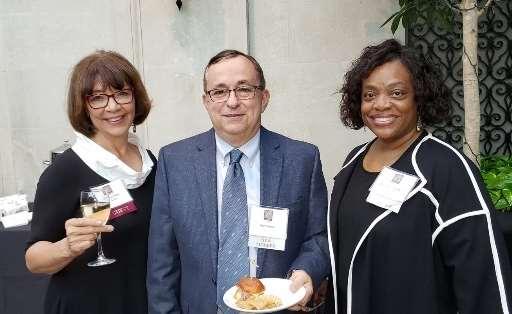

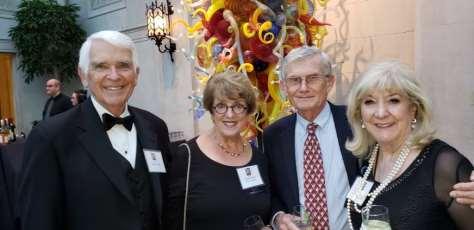
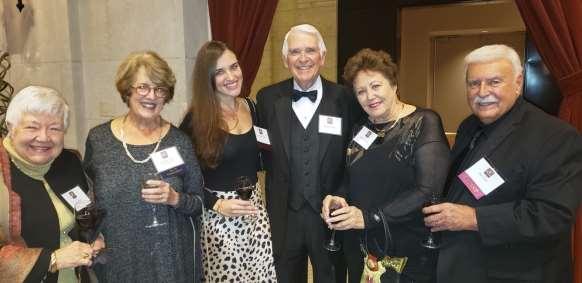
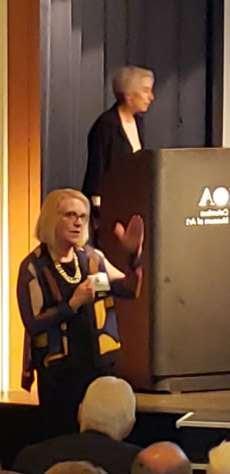
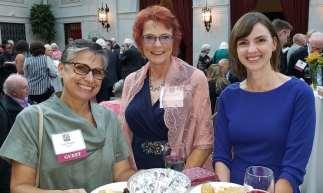

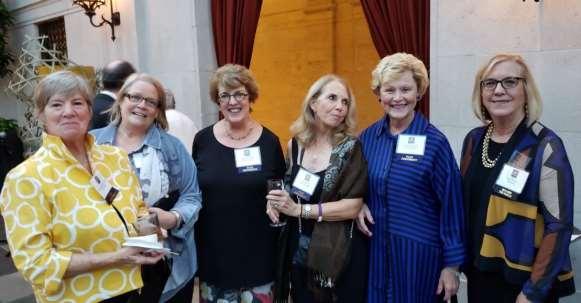
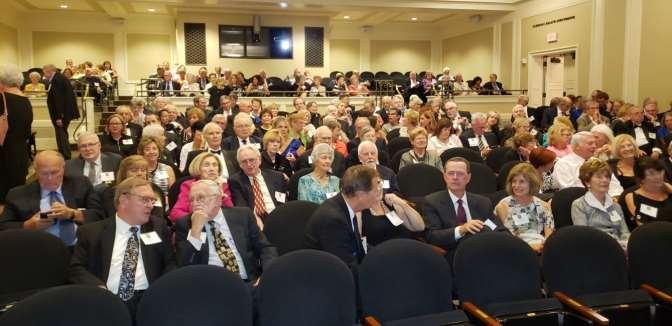
Former Presidents (l to r): Ann Larrison; Katharine Moore; Melinda Sader; Laurie Hill; Susan Quintenz; Centennial President Jane Forbes.

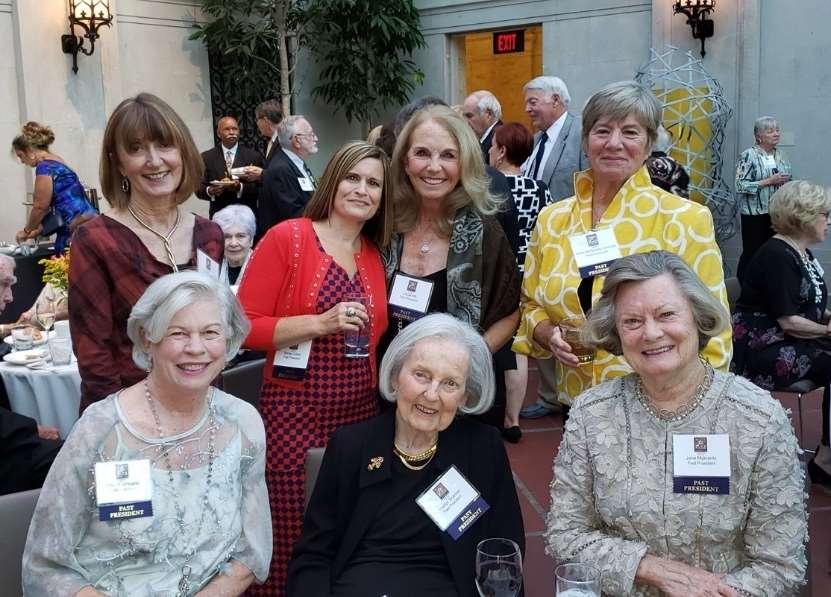
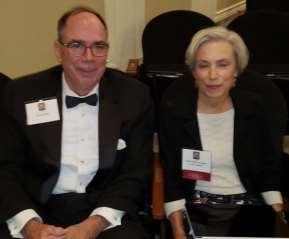
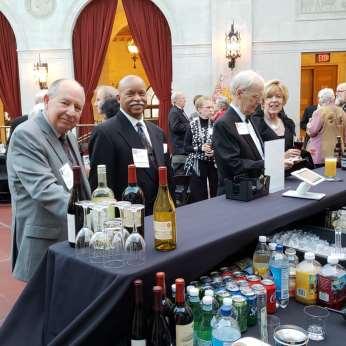
Past Presidents: (back row, l-r) Trish Tweel, Sheila Cohen, Laurie Hill; Anne McNealy Larrison; (bottom) ?; Marilyn Scanlon; Jane Mykrantz.
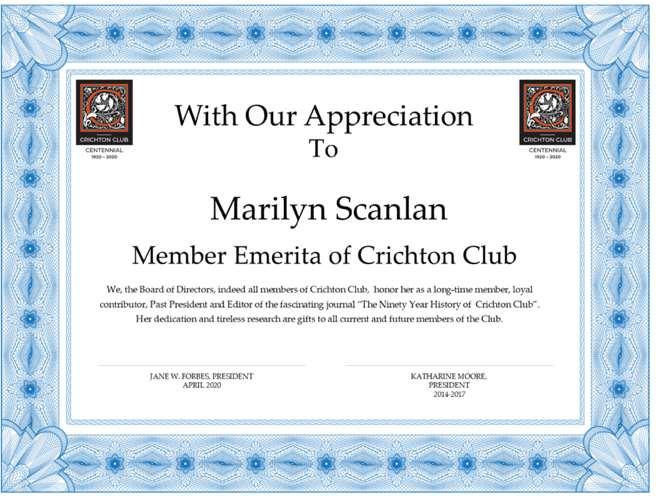
Marilyn Scanlan was honored for her many years of devotion as president, trustee, compiler of our history and author of the history in the 90th Anniversary edition of the autograph book.
2019-2020
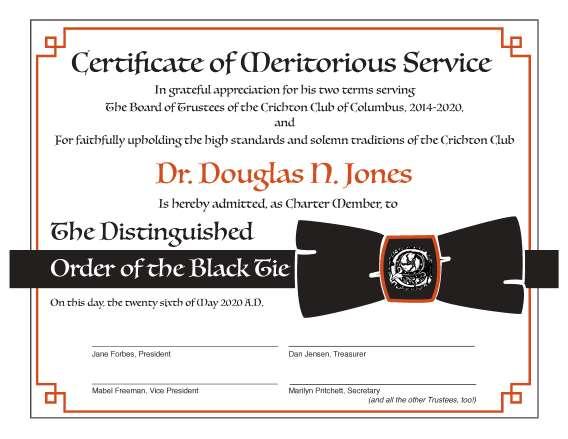
The tradition of black tie for members has been reviewed by the Board and secret ballots have even been taken at Board meetings to see if it should be discontinued. The Board has always voted to continue. Early in the new century, the Board made a momentous decision and voted to make black tie "optional” for the men. Former director and long-time member, Doug Jones was honored for his stalwart, and courageous, adherence to the early black-tie tradition of the Club. FYI
In 2019 the club constitution was revised.
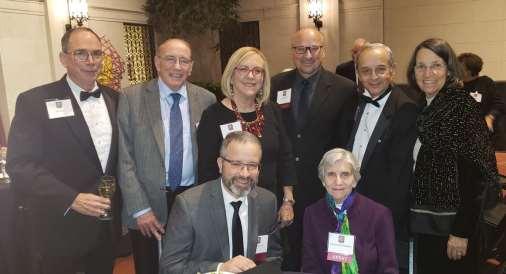
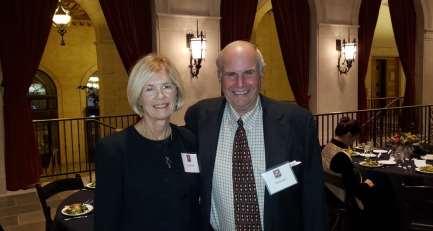
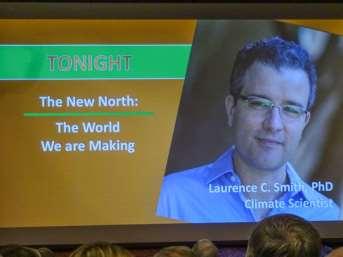
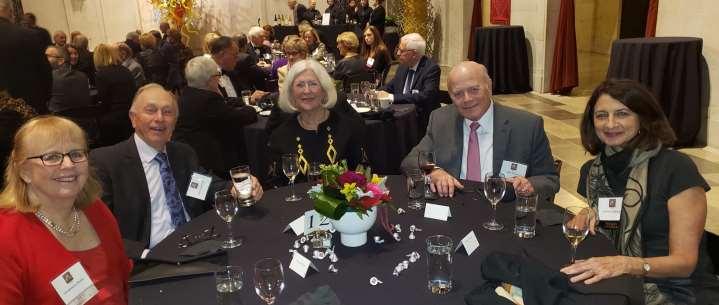
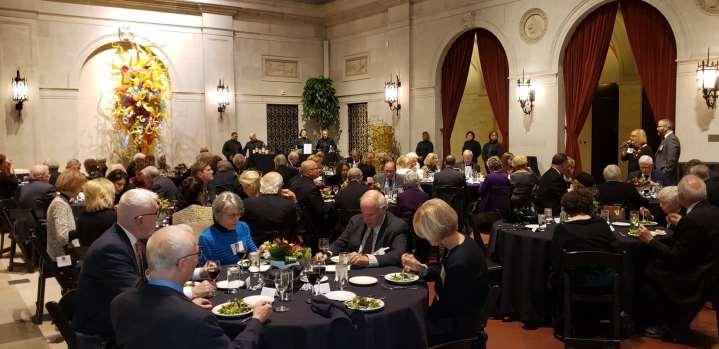
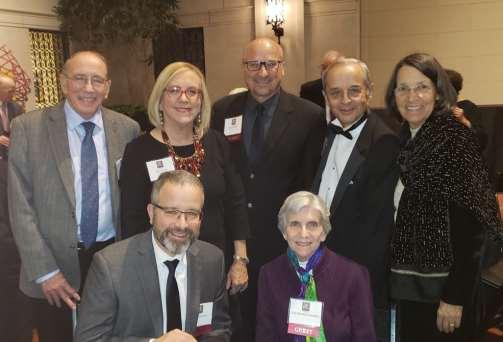
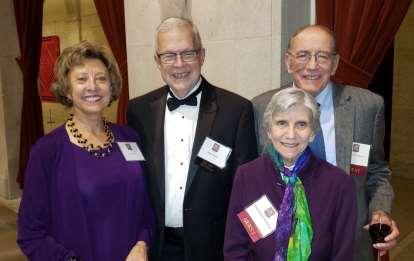
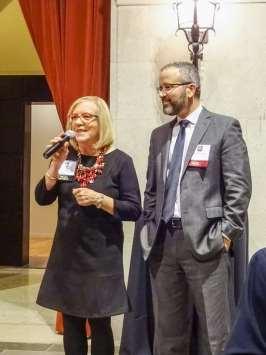
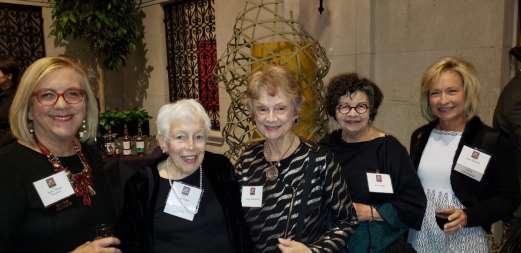

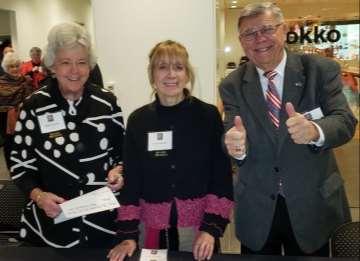

2019-2020
March 11, 2020, the world changed forever.
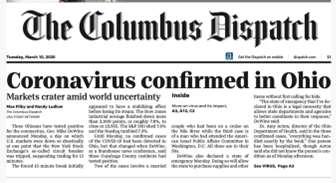

2020-2022
Board of Directors
2020 - 2021
Mabel Freeman – President
Marilyn Pritchett – Vice President
Dan Jensen – Secretary
Ann Gabriel – Treasurer
Bob Fry
Jeremy Kelley
Mark Krausz
Susan Manecke
Barbara Muller
Kathleen Murphy
Mark Real
Carla Sokol
Charlie Warner

Board of Directors
2021 – 2022
Mabel Freeman – President
Marilyn Pritchett – Vice President
Dan Jensen – Secretary
Ann Gabriel – Treasurer
Barry Blank
Bob Fry
Jeremy Kelley
Mark Krausz
Barbara Muller
Kathleen Murphy
Mark Real
Carla Sokol
Charlie Warner

Reflections
101st and 102nd Seasons
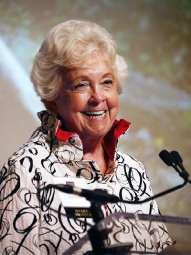

Zoom meetings? Digital year?
Hiatus year? Livestream? Covid policies? Pandemic?
As I began the Crichton Board role of President in June 2020, much like the Crichton Club Presidents and Board members who had preceded us for 100 years, I/we had naively assumed that our monthly Board meetings would be consumed with discussions about possible speakers and future membership meetings at the Columbus Museum of Art. But with Outgoing President Jane Forbes’ announcement of the January cancellation of our Crichton Centennial year celebration and the cancellation of our April speaker Neil Bush, Chairman of Points of Light, it was becoming apparent that the 101st season would not be “business as usual.”
Confronting us at our June 2020 Board meeting was a most pressing and relevant question: Would we have our 101st season of programs in some format or would we put the Crichton Club on hiatus for 20202021, delaying all planned programs for one year? I applaud the courage of the 2020-2021 Crichton Board members: Marilyn Pritchett (Vice President), Dan Jensen (Secretary), Ann Gabriel (Treasurer), Jane Forbes (Past President), Lynn Elliott, Bob Fry, Jeremy Kelley, Mark Krausz, Susan Manecke, Barbara Muller, Kathleen Murphy, Mark Real (Program Chair), Carla Sokol, and Charlie Warner. The recent decision to expand the Board from 12 to 15 members resulted in the addition of Bob Fry, Ann Gabriel, Jeremy Kelley, and Charlie Warner at this point. More creative thinkers to help plan the 2020-2021 year were key!
After being in touch with the Museum and our intended speakers, and realizing that not just Crichton Club but also our community, our state, and our nation were involved in this same exercise of rearranging plans and making new uses of technology to move forward….we did! At a special meeting of the Board (via Zoom, of
Mabel Freeman, President 2020-2022
course!) on July 6, 2020, a decision was made that the 101st season of Crichton Club would take place not in the Columbus Museum of Art, but in the comfort of our own homes and in front of our computer screens. We would be meeting via Zoom!!
Memberships were still being sought. Marketing materials would be revised. An intended increase in membership dues (from $125 to $150) would be suspended in hopes that our membership numbers would not go down significantly. The safest place for our members would be their own homes – a new criteria for our programs. While the entire Board was engaged in the implementation and direction of this new plan, special thanks would go to Mark Krausz and Kathleen Murphy for their technical expertise and marketing skills directed toward this new venture.
Although we did lose approximately 75 members from our previous year’s high of 300 (with some members saying they would be back when we were back in person), the returning members were not disappointed in the programs. In fact, our surveys after the programs indicated the members were delighted with the quality of our speakers and presentations.
The season began with a speaker who was out of this world! Dr. Kathryn Sullivan, author of Handprints on Hubble: An Astronauts Story of Invention, spoke to us via Zoom on October 6, 2020. Dr. Sullivan had been part of the team of Astronauts who helped design the Hubble telescope so that it could be repaired easily by astronauts walking in space. Indeed, such help was needed when it was paramount that astronauts correct the blurry vision problem with the telescope. Dr. Sullivan’s remarks were accompanied by amazing “before and after” photographs from space!
Not limiting herself to just exploring space 200 miles above the earth, Dr. Sullivan shared stories and photos of her exploration of the ocean…down to seven miles below! Dr. Sullivan also generously provided us with autographed copies of Handprints on Hubble which Board members personally delivered to each of our Crichton members. We were thrilled when Dr. Sullivan said she would also like to be a member of the Crichton Club!
2020 was an election year, including a Presidential election. One could not escape the phone calls and marketing efforts, but one could try to make some sense out of all the noise…following the actual election. Michael Duffy, Opinion Editor-At-Large for the Washington Post, and former Bexley resident while growing up, joined us via Zoom on November 10 sharing “What the November 3rd Election Means for our Country.” Mr. Duffy had spent 33 years at TIME as a White House correspondent and editor, winning many awards for his reporting and investigative reporting. Michael Duffy also co-authored the best-selling book: The Presidents Club: Inside the World’s Most Exclusive Fraternity.”
With an array of colorful and data-informed charts, Mr. Duffy shared his insights as to what was happening demographically in this country and how that was affecting voting patterns. He also spoke to the issue of the Electoral College and some of the debate currently surrounding its existence. During his presentation and the questions and answers session that followed, it was agreed that Mr. Duffy maintained the all-important objectivity of a very good journalist.
The Board wanted to thank those members who had stayed with us through our digital year; and, thus, a fourth “Zoom” program was added on February 9, 2021. Broad & High Meets the Crichton Club. Kate Quickel, host of WOSU TV’s award-winning weekly program Broad & High was featured. Kate gave our members a behind the scenes look at the production of Broad & High; and she also shared her perspective and insights on the Columbus arts scene.
Our February program was a great segue into our final streamlined program of the season. On April 6, 2021, Lisa Funderburke Hoffman, Executive Director of the Alliance of Artists Communities, presented The Future
of the Arts in a Diverse World. Ms. Hoffman, a national arts leader and emerging critic of the important role artists play in shaping healthy, socially-just communities, was introduced by Nannette Maciejeunes, the Executive Director of the Columbus Museum of Art since 2003 and a good friend of the Crichton Club.
During our 101st season, I would note that we welcomed two new Board members mid-year, Diane Selby and Stephanie Sanders; and we said goodbye to a fine Board member Lynn Elliott who needed to focus fulltime on her business and the impact that Covid had had on her employees. From a financial perspective, our membership dues were down because of fewer members and only asking for $125 per member. We ended the year with 232 members. On the plus side, however, our expenses were also down as no expenses were incurred in the Museum (receptions, dinners, programs). We were able to pay $4000 forward toward speaker expenses for the coming 2021-2022 year.
At the Annual Meeting, the nominating Committee under the fine leadership of Barbara Muller introduced three new Board members for 2021-2022: Barry Blank, Marilee Chinnici-Zuercher, and Heather Ness. We said goodbye to term-limited and outstanding Board members: Jane Forbes, Dan Jensen, Susan Manecke, and Barbara Muller. We would be starting the coming season with a full Board of 15 members and our financial resources in good shape, thanks particularly to ongoing fundraising efforts under the leadership of Bob Fry.
102nd Season: 2021-2022
A survey of our membership in April of 2021, had resulted in the following data:
• 101 members (43%) took the survey,
• 97% indicated they were likely to renew their membership,
• 99% support raising dues to $150 a year per person,
• 68% would consider a donation for high quality speakers,
• 59% said membership was very important to them
Among the additional comments, many said they were excited about the prospect of returning to the Columbus Museum of Art for programs.
Yes, we were returning! The Board of Directors in consultation with the Museum determined that we should be able to hold our programs in the Museum spaces for 2021-2022. We would follow the Covid protocol of the Museum which meant that members had the option of wearing masks but would not be required to do so. The Board decided that for financial reasons and caution, we would not be sponsoring member dinners with the speakers in the Derby Court prior to the programs. Speakers were hosted for lunches and dinners at restaurants in the city and with just a few Board members and community members in attendance. We decided, however, to reinstitute the receptions in Derby Court following the programs. We were pleasantly surprised by the high turnouts for the receptions. Members wanted to be with each other and with the speakers.
In our Spring 2021 communication to the members in which we announced the speakers for the 102nd season, we promised them a “blockbuster season.” And we delivered!
Ami Vitale, a National Geographic photographer and former recipient of the Magazine Photographer of the Year award by the National Press Photographer’s Association, wowed us on October 5, 2021 with her slides and commentary on the Photography of Hope. Ms. Vitale’s stories and photos of Africa and Afghanistan, the people, the animals, especially the elephants…all illustrated her belief in the enduring power of the human spirit. I think she could have spoken for another hour and our members would have sat there, mesmerized by Ami’s passion and her messages.
Joining us on November 10, 2021, was Daniel Pink, noted author and a Bexley native now residing in Washington D.C. Once the chief speechwriter for Vice President Al Gore, Mr. Pink turned his attention to research about how the big ideas can shape our businesses and change our lives. Among Mr. Pink’s books are five New York Times bestsellers that have sold millions of copies around the world. For our Crichton Club program, his discussion was centered on a not yet published book. In fact, member reactions to his ideas and member questions were basically another form of research for Dan. His soon to be published (and it was) book was The Power of Regret: How Looking Backward Moves Us Forward. Mr. Pink generously donated copies of his book that we were able to mail to all of our members later that winter.
As a mid-winter break for our membership, the Board hosted an evening of wine and art at the ROY G BIV gallery in Franklinton. In addition to the mingling among members and the discussion by the curator about the art on the walls that evening, we all learned what the letters in ROY G BIV mean!
Our “blockbuster season” concluded on April 12, 2022, with Dr. Erica Armstrong Dunbar, the Charles & Mary Beard Distinguished Professor of History at Rutgers University, a national book award finalist, and the National Director of the Association of Black Women Historians. Dr. Dunbar’s topic was The Case for Harriet Tubman on the $20 Bill. Using slides of Harriet Tubman not previously seen by most of our audience, Dr. Dunbar’s stories of slavery and racial injustice, as well as the struggles for women in the 18th and 19th centuries, kept the attention of our members, and especially as she connected the historical events to today’s realities.
A photographer, a writer, a historian….all had compelling research-supported stories to share with our Crichton membership in our 102nd season. To continue to bring such outstanding speakers to the Crichton Club has required more than just our dues. The membership has responded to our now annual request for gifts for the Speakers Fund. Since 2019 through 2022, more than $25,000 has been donated by our generous members to support our Speakers Fund.
We concluded our 102nd season by noting that although we have never recovered all the members that we lost in 2020, we have been able to maintain a steady number in the past two years. Of course, we wish to see more members enjoying these outstanding programs.
Leaving the Board at the end of 2022 were three very talented individuals: Mark Real, Kathleen Murphy, and Carla Sokol. Mark was especially critical to leading our Program planning for two seasons. Kathleen was the creative engine behind our communications. The good news, however, was that we would be welcoming new Board members Rai Goerler, David Graham, and Harris Wood.
At our May Board meeting, Mark Krausz started a new tradition. He presented to me as the outgoing President a framed copy of the original minutes of the first Crichton Club Board meeting. I was most appreciative of this gesture and said that with great pride I would hang this copy in my home for one year. I believe it should be passed on to the current President “mid-term” i.e. between the first and second years of the Presidency as part of the tradition. I expressed my sincere gratitude to the Crichton Board members who continue to do the heavy lifting in support of this fine organization. I give my congratulations and best wishes to incoming President Marilyn Pritchett as she leads the Crichton Club into its 103rd year as a community treasure.

2020-2021
2020-2021
Kathy Sullivan, Scientist, educator, astronaut. "From the Stars to the Sea: An Explorers Life."
Michael Duffy, Journalist, author, Opinions editor of the Washington Post. “What the November 3rd Election Means for Our Country.”
Lisa Funderburke Hoffman, National arts leader, Director of the Alliance of Artists Communities. "The Future of the Creative Arts in a Diverse World."
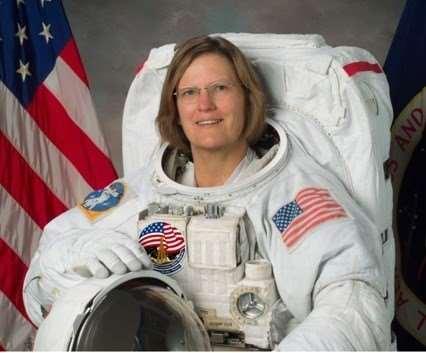
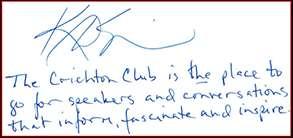
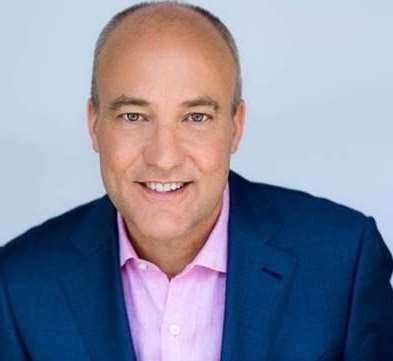
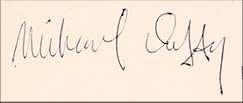

Lisa Funderburke Hoffman
2020-2021
KATHRYN DWYER SULLIVAN (b.1951) is an American geologist and a former NASA astronaut. She was awarded a Bachelor of Science degree in Earth Sciences from the University of California, Santa Cruz in 1973, and a Ph.D. in Geology from Dalhousie University in 1978 Sullivan joined NASA in 1978. On October 11, 1984, she performed the first extra-vehicular activity (EVA) by an American woman during Space Shuttle Challenger mission STS-41-G.
In April 1990, Sullivan served on the crew of STS-31, which launched from Kennedy Space Center, Florida. During this five-day mission, crew members aboard the Space Shuttle Discovery deployed the Hubble Space Telescope
Sullivan also served as Payload Commander on STS-45, the first Spacelab mission dedicated to NASA's Mission to Planet Earth. During this nine-day mission, the crew operated the twelve experiments that will contribute significantly to improving our understanding of our climate and atmosphere. In addition, this was the first time an artificial beam of electrons was used to stimulate a man-made auroral discharge.
Sullivan left NASA in 1993 and then served as chief scientist of the National Oceanic and Atmospheric Administration (NOAA). In 1996 she was named president and CEO of the COSI Columbus, an interactive science center in Columbus, Ohio. Under her leadership, COSI strengthened its impact on science teaching in the classroom and its national reputation as an innovator of hands-on, inquiry-based science learning resources.
She was appointed to the National Science Board by President George W. Bush in 2004. From 20062011 she was Director for Ohio State University's Battelle Center for Mathematics and Science Education Policy as well as a volunteer science advisor to COSI. On May 4, 2011, Sullivan was confirmed by unanimous consent of the U.S. Senate and appointed by President Obama to serve as Assistant Secretary of Commerce for Environmental Observation and Prediction and Deputy Administrator for the National Oceanic and Atmospheric Administration.
She was then nominated by President Obama to serve as the Under Secretary of Commerce for Oceans and Atmosphere and NOAA Administrator and confirmed by the Senate on March 6, 2014. Sullivan was named the 2017 Charles A. Lindbergh Chair of Aerospace History, a competitive 12-month fellowship at the National Air and Space Museum. During her residence in the museum, Sullivan's research focused on the Hubble Space Telescope.
In November 2019, Sullivan's book Handprints on Hubble: An Astronaut's Story of Invention was released from MIT Press. Handprints on Hubble recounts Sullivan’s experience as part of the team that launched, rescued, repaired, and maintained the Hubble Space Telescope. On June 7, 2020, she became the first woman to dive to the Challenger Deep in the Mariana Trench, the deepest part of the Earth's oceans.
MICHAEL WOLF DUFFY (b. 1958) is an American journalist and author. He is Opinions editor at large for the Washington Post. “What the November 3rd Election Means for Our Country.” Born and raised in Columbus, Ohio, Duffy graduated from Oberlin College in 1980. With decades of experience covering the Pentagon, Congress, and the White House for Time, Michael Duffy offers revealing observations on American politics – past, present, and future.
Duffy is one of the most seasoned and respected figures in American journalism. Based in Washington, the former deputy managing editor at TIME has been at the epicenter of the magazine’s political
2020-2021
coverage since 1985, with experience covering the Pentagon, Congress, the White House, and national security. He served as TIME’s Washington bureau chief from 1997 to 2005. He was a staff writer at Defense Week and was Pentagon correspondent and editor for 33 years for Time, becoming Washington Bureau Chief from 1997 to 2005.
He was a Ferris Professor of Journalism at Princeton University in 2006-07. He is the co-author, with Nancy Gibb, of two best-selling presidential histories, The Presidents Club: Inside the World’s Most Exclusive Fraternity, and The Preacher and the Presidents: Billy Graham in the White House. He is a regular contributor to PBS’s “Washington Week in Review” and has appeared on “Morning Joe,” “Face the Nation,” and “Charlie Rose.”
He is a winner of the Chautauqua Prize, the Goldsmith Prize for Investigative Reporting, the Shorenstein Award for Investigative Reporting, and a two-time recipient of the Gerald R. Ford Award for Distinguished Reporting for his coverage of the presidency and national defense.
LISA FUNDERBURKE HOFFMAN: National arts leader, Director of the Alliance of Artists Communities. "The Future of the Creative Arts in a Diverse World." Hoffman is a national arts leader and emerging critic of the important role artists play in shaping healthy, socially-just communities. She is the Director of the Alliance of Artists Communities. Born on Long Island, NY in 1970, Hoffman received her Master of Science in 1994 from Howard University in Washington, DC where she studied biology. In 1998 she was a National Science Foundation Fellow.
The Alliance membership includes nearly 500 artist residency programs including work with the School of the Art Institute of Chicago, S&R Foundation, the Rauschenberg Foundation, the National Trust for Historic Preservation, and The Joan Mitchell Foundation. Hoffman has been outspoken about the need to advocate for anti-racist practices in the arts community. She has pioneered internationally recognized models of artist-led community engagement and will have much to say about the important role artists play influencing social justice initiatives.
Hoffman was Associate Director of the McColl Center for Art + Innovation, a contemporary art center in Charlotte, NC. While working for the McColl Center, Hoffman pioneered models of artist-led community engagement for Charlotte. Prior to working in the arts at McColl she was Director of the Charlotte Nature Museum and worked at the National Museum of Natural History.
She compared scientists to artists because of their ability to look for the unexpected. Hoffman advocated for Environmental Art and Public Art as a catalyst to integrate established communities with new members. She was Curator of Art + Ecology for the Brightwalk project, a sustainable neighborhood development in Charlotte, NC.
In the Summer of 2015 Lisa Hoffman was appointed by President Barack Obama as a member of the National Museum and Library Services Board. In the summer of 2016, she was appointed the Director of Alliance of Artists Communities, an international network of artist residency programs. Recently she has signed on to help the Columbus Museum of Art establish an Aminah Robinson artists-in-residence program.
2020-2021
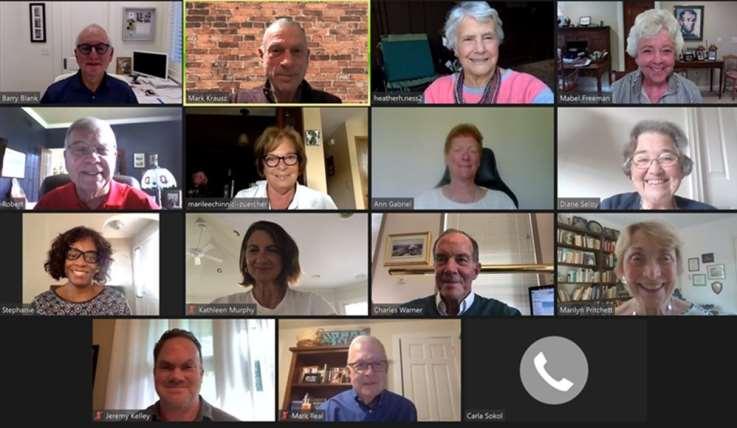
For decades our board meetings had been held in-person. With the lockdowns and social distancing required by the pandemic , we tuned to a technology previously used largely by businesses. Her’s a screen grab of our first board meeting using Zoom which is now ubiquitous.
2020-2021
Due to the Coronavirus pandemic, the Crichton Club, like millions of individuals, companies, and organizations worldwide, employed the new technology of virtual video meetings to present our speakers. This technology forever changed, in unimaginable ways, the way the world works, educates, and communicates.
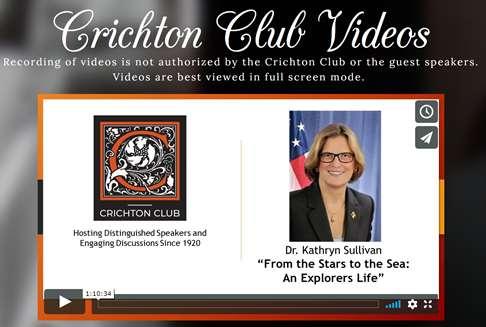
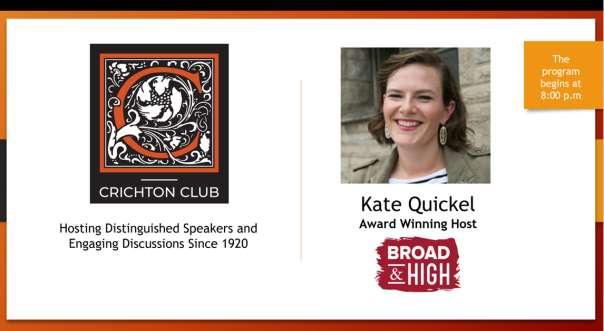
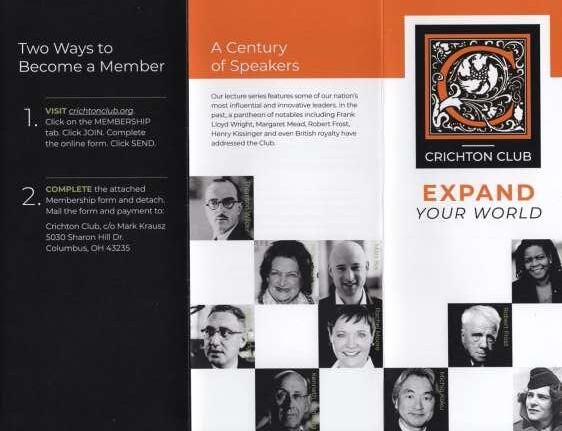
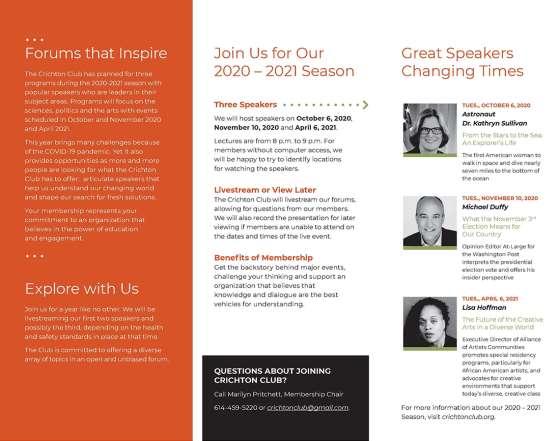
The club happily resumes the presentation of live speakers at the Columbus Museum of Art. Masking restriction were in force until our third speaker of the season.
Amy Vitale, National Geographic photographer. "Photography of Hope."
Erica Armstrong Dunbar, Historian and author. "The Case for Harriet Tubman on the $20 Bill."
Daniel Pink, Best-selling author. "The Science of Regret and What it Teaches Us About the Good Life."
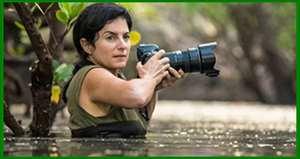
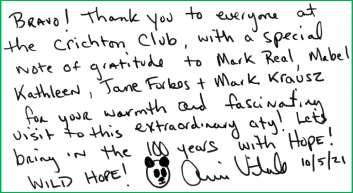
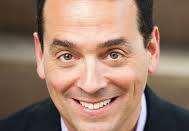

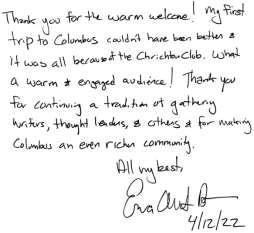
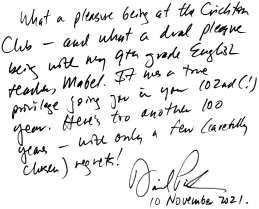
2021-2022
AMY VITALE: National Geographic photographer. "Photography of Hope." October 5, 2021. Vitale received the Daniel Pearl Award for Outstanding Reporting and was named Magazine Photographer of the Year by the National Press Photographer’s Association. She is a five-time recipient of World Press Photos, including 1st Prize for her 2018 National Geographic magazine story on Kenya and its magnificent elephants. She will share her photos and stories of Africa that illustrate her belief in the enduring power of the human spirit.
DANIEL PINK, Best-selling author. "The Science of Regret and What it Teaches Us About the Good Life." Pink has conducted 20 years of research into big ideas which are reshaping our work, transforming our business, and changing our lives He promises to share his next big research project with us on what he labels the misunderstood emotion of regret – his next book soon to be published. His books have sold millions of copies and been translated into 40 languages.
ERICA ARMSTRONG DUNBAR, historian and author. "The Case for Harriet Tubman on the $20 Bill." A leading American historian, National Book Award Finalist and sought-after media advisor, Erica Armstrong Dunbar will speak on the courageous life of Harriet Tubman and her contributions to American freedom, which underlie the effort to place her picture on the $20 bill. Dunbar has risen to become one of the nation’s leading authorities on the lives of women of African descent during the late eighteenth and nineteenth centuries. She brought to life the vivid portrayal of women of color in the HBO drama, “The Gilded Age,” through her role as co-executive producer. More recently she served as an on-air contributor and advisor to the Ken Burns documentary on Benjamin Franklin, which aired on PBS in early April.
Several of her books have received national acclaim including Never Caught - The Washingtons’ Relentless Pursuit of Their Runaway Slave, Ona Judge, which was named a National Book Award Finalist in 2017, and She Came to Slay: The Life and Times of Harriet Tubman.
Dunbar is the Charles and Mary Beard Distinguished Professor of History at Rutgers University. She holds her Ph.D. from Columbia University. She also leads the Association of Black Women Historians as the national director. In these capacities, she is able to correct the historical record on enslaved women and tell their stories, which have been marginalized or stereotyped in the past. Dunbar is the Charles & Mary Beard Distinguished Professor of History at Rutgers University, the National Director of the Association of Black Women Historians, and a national book award finalist. She is a sought-after media commentator and has written several books on black women of historic significance.
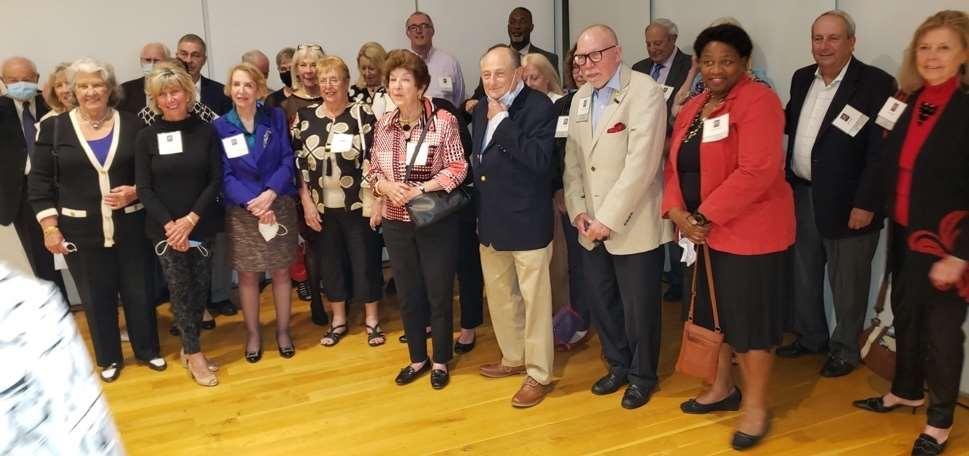
These 28 new members joined scores of stalwart members to kick off our 102nd season.
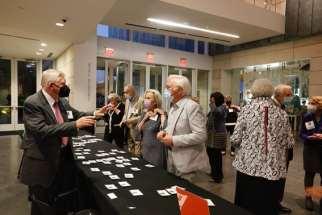
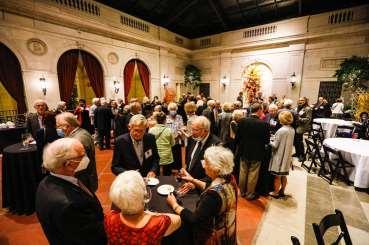
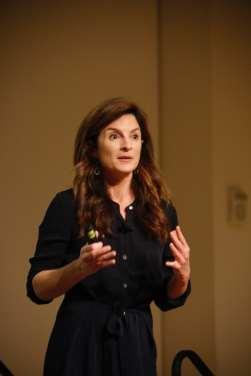



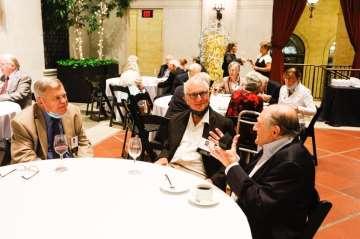
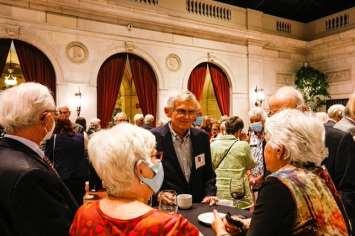

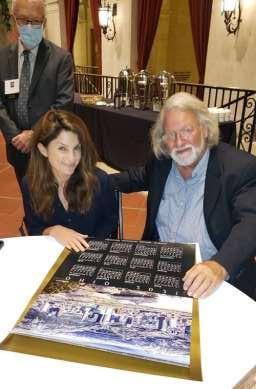
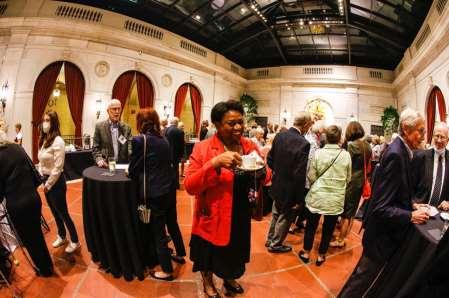
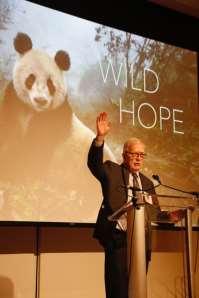
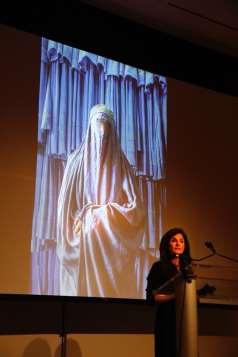

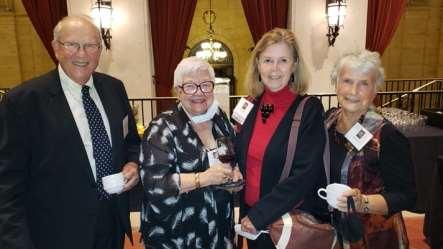
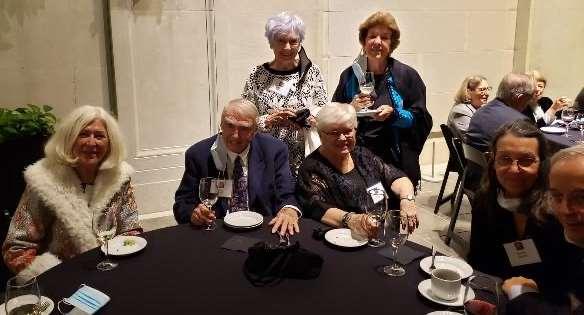
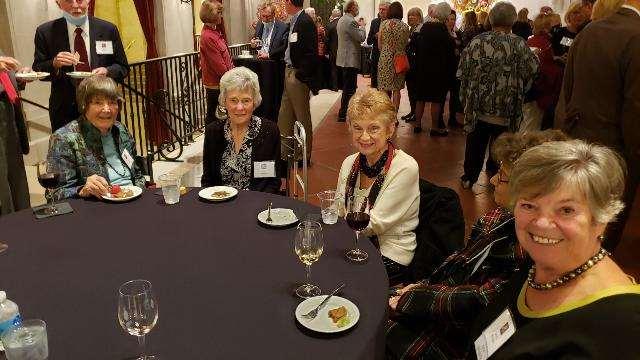
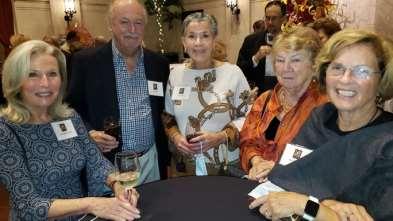
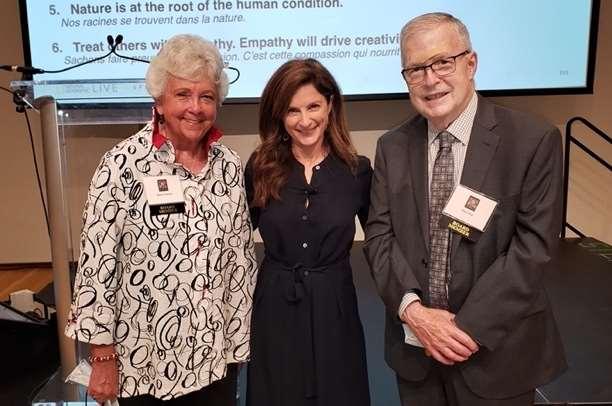
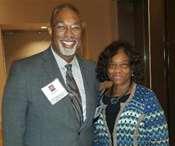
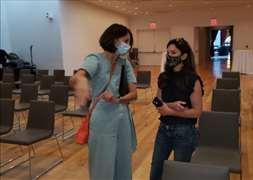
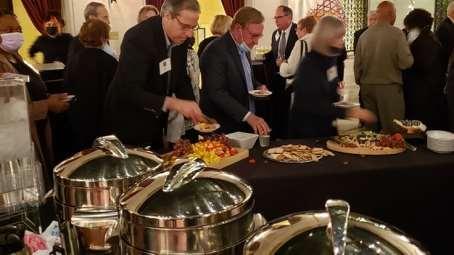
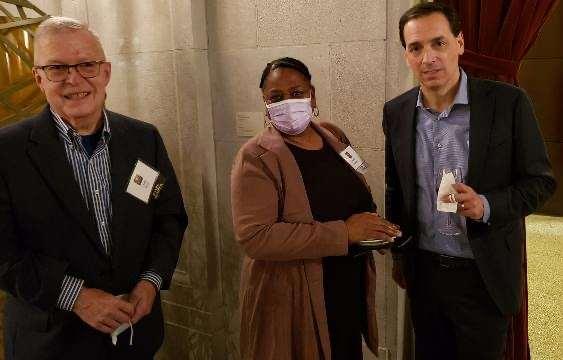
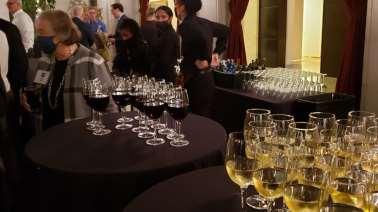
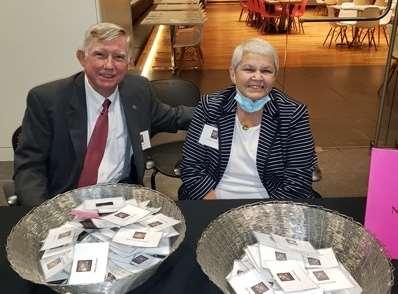

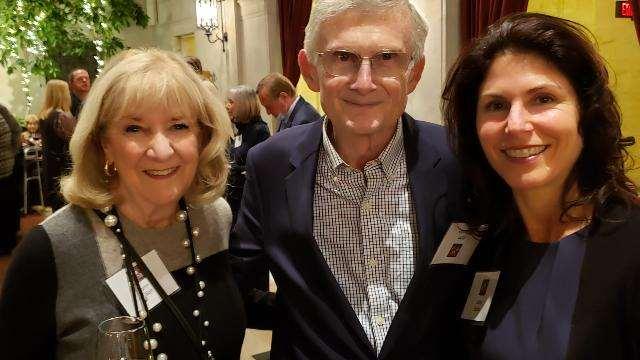
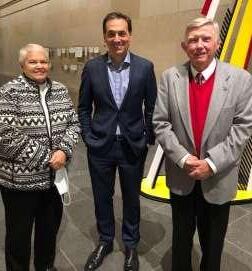
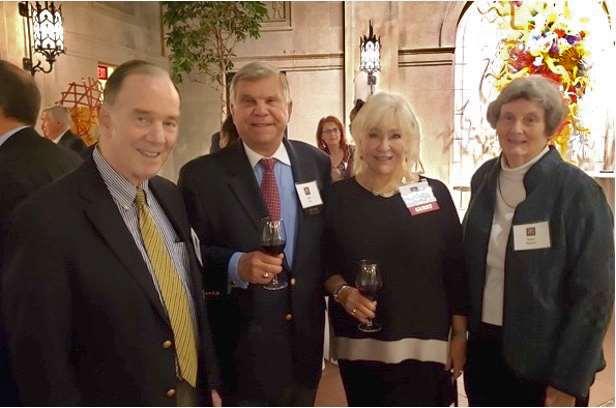
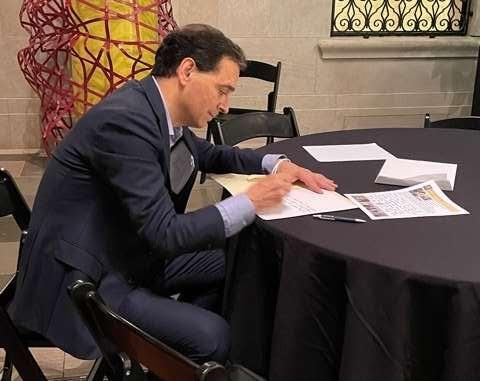
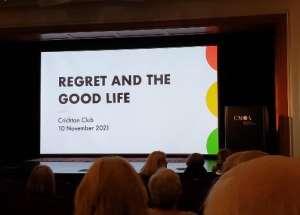

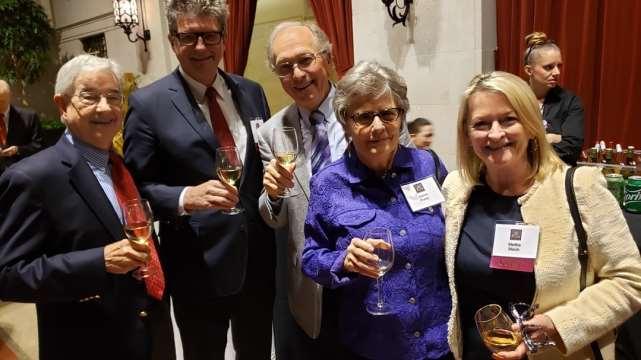
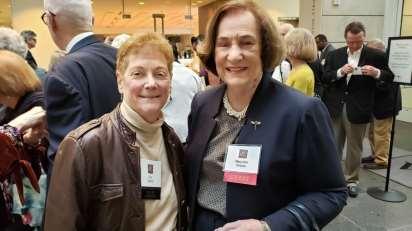
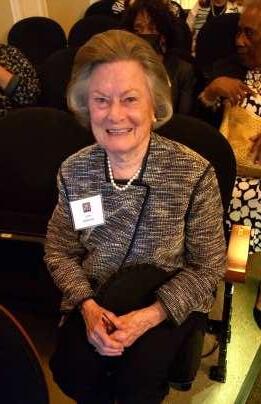
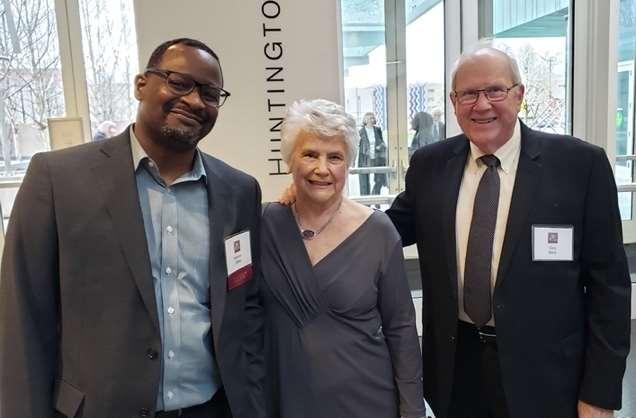


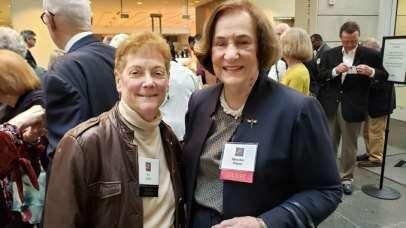
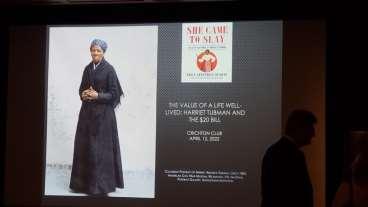
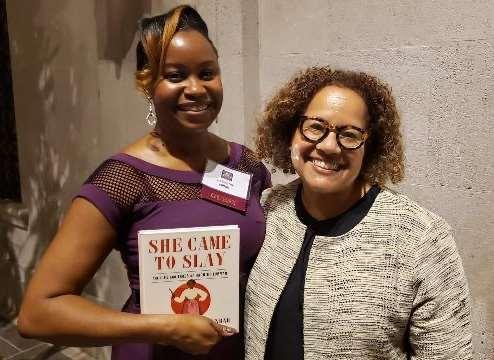
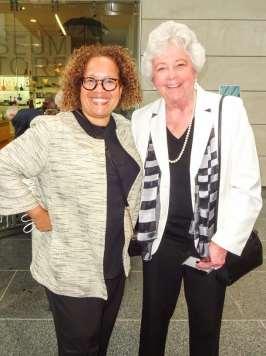

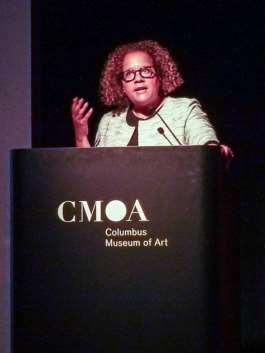
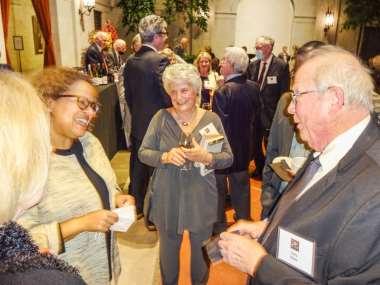
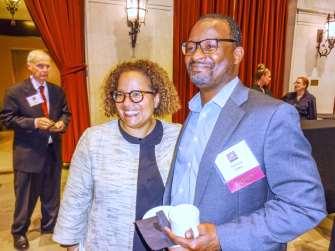
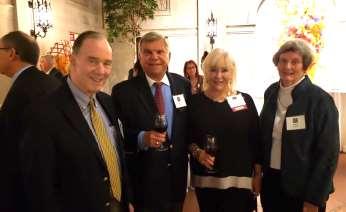
2021-2022
With the lifting of mask restrictions, we were able to resume the tradition of hosting a pre-lecture dinner for our speakers. This one was held at Columbus State’s Cameron Mitchell Culinary Institute.
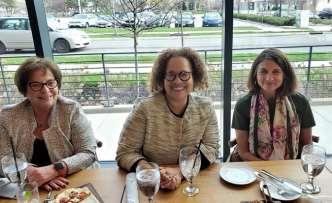



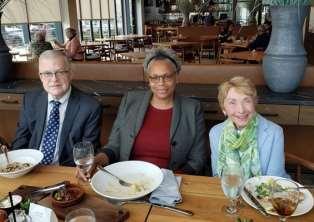

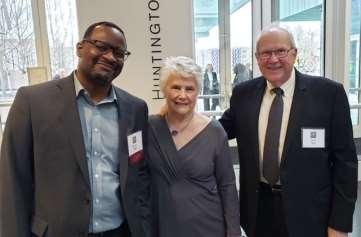

2021-2022
In mid-September of 2021, we were able to also resume our new member welcome parties. Jim Ginter opened his lovely home for the event and new and current members enjoyed a great party with an opportunity to meet each other.
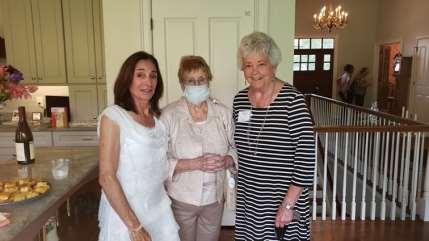
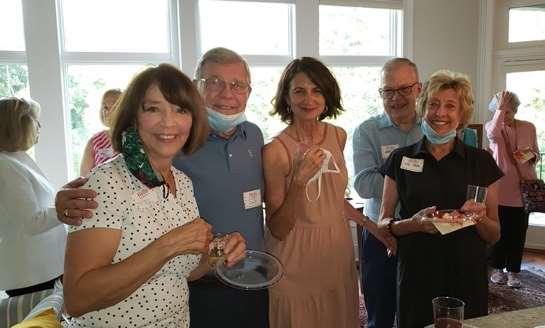
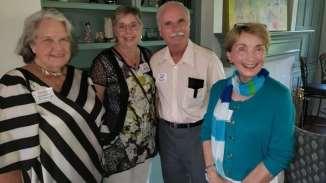
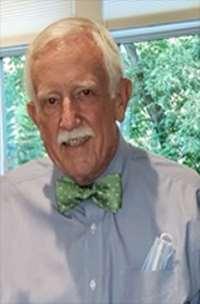

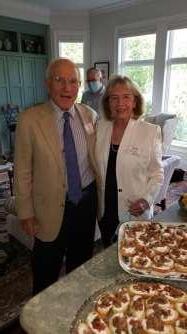
Our host, Jim Ginther
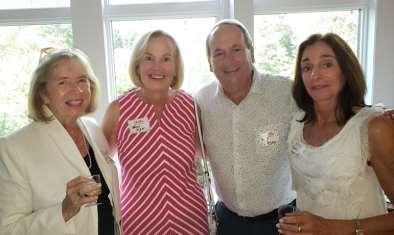
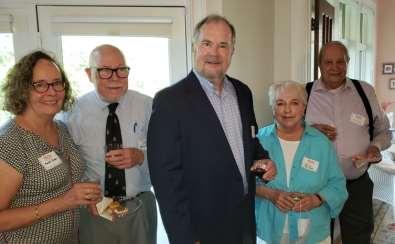
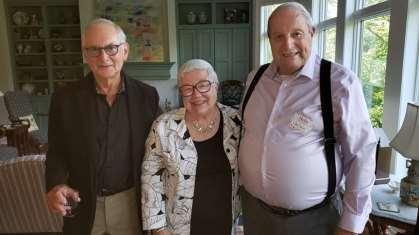
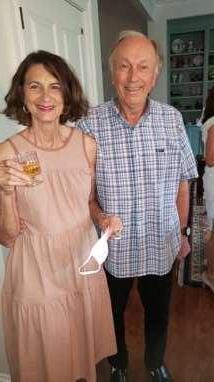
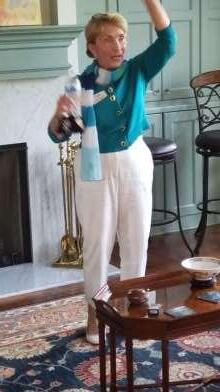


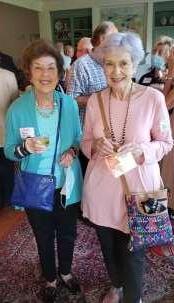

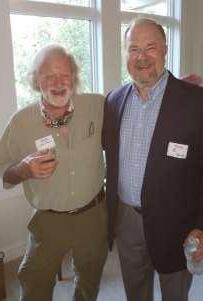
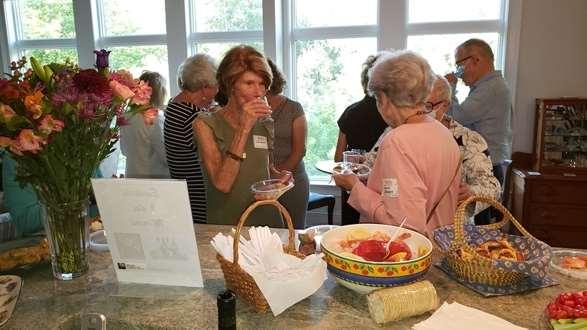
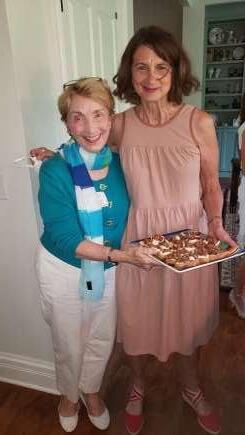
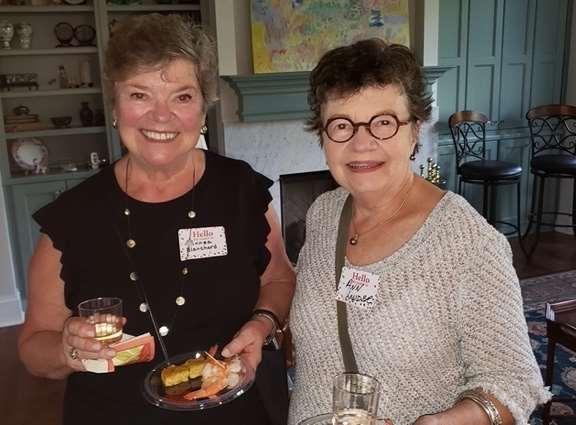
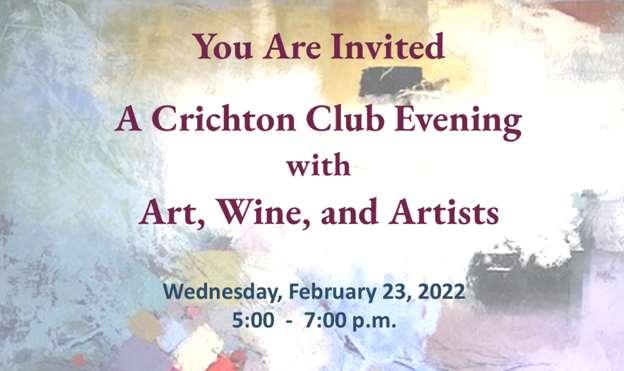

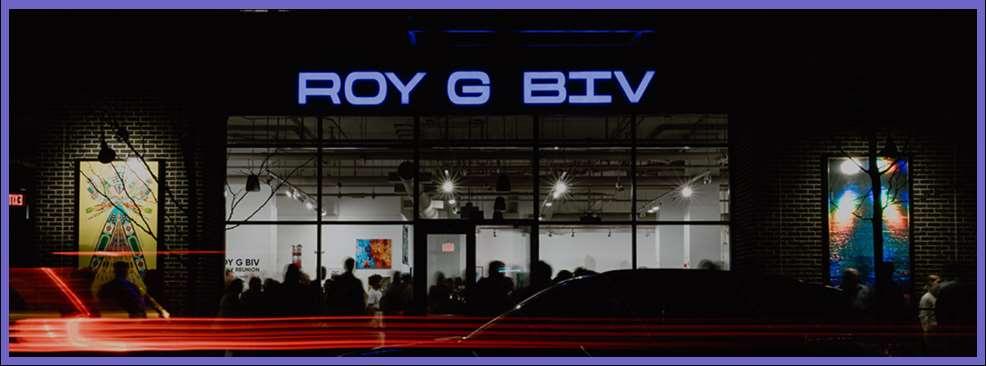
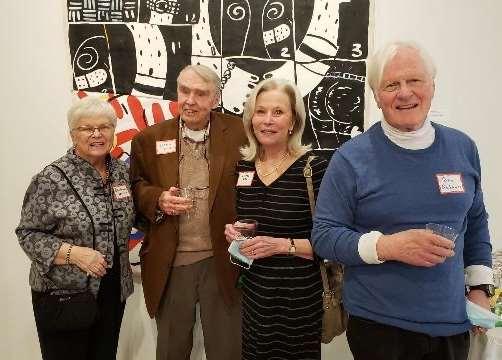
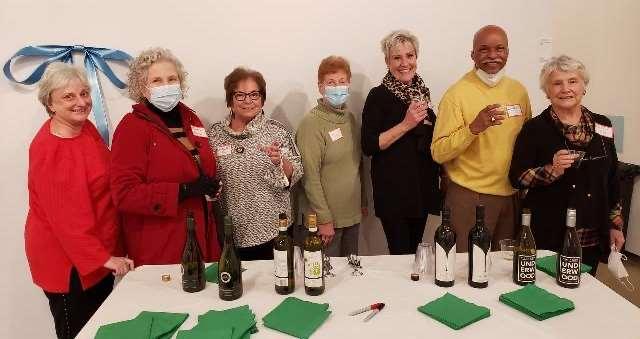

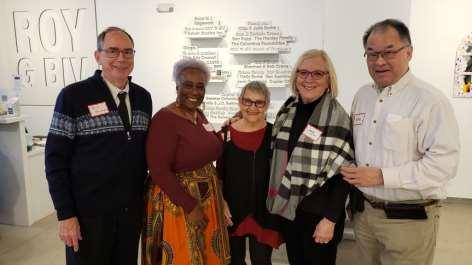
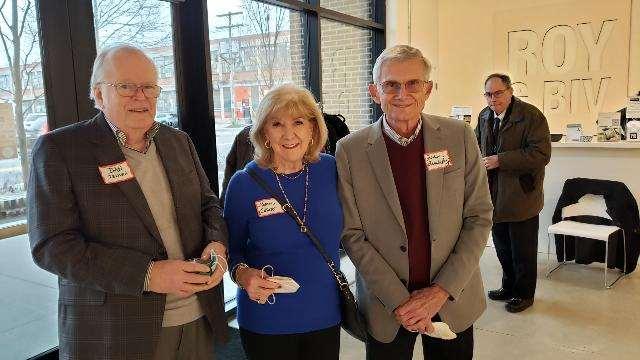
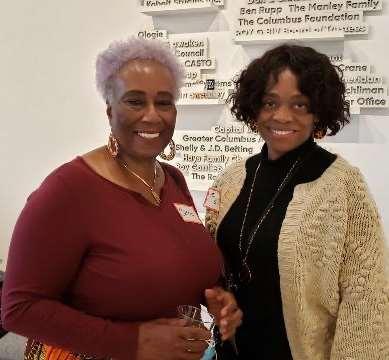
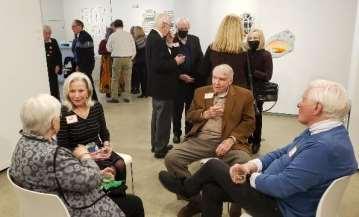
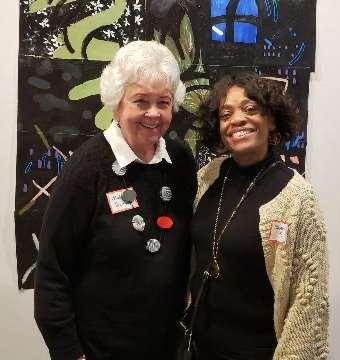

21-2022


A New Tradition Begins
At the final board meeting of Mabel Freeman’s term as president, she was presented with a framed copy of the clubs very first board meeting. They were written in a beautiful backhand in blue, probably a fountain pen. The picture will be passed on to each succeeding president to display and hold for safekeeping.
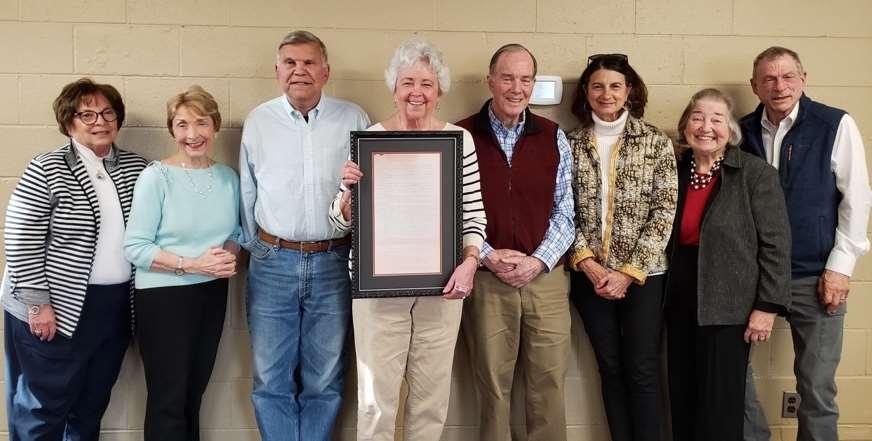
Board of Directors
2022- 2023
Marilyn Pritchett - President
Diane Selby – Vice President
Rai Goerler – Secretary
Ann Gabriel – Treasurer
Barry Blank
John Brownley
Marilee Chinnici-Zuercher
Bob Fry
David Graham
Jeremy Kelley
Mark Krausz
Heather Ness
Constance Alexa-Oulanoff
Stephanie Sanders
Charlie Warner
Harris Wood

Board of Directors
2023 – 2024
Marilyn Pritchett – President
Diane Selby – Vice President
Rai Goerler – Secretary
Ann Gabriel – Treasurer
Barry Blank
John Brownley
Marilee Chinnici-Zuercher
David Graham
Jeremy Kelley
Ann Louder
Heather Ness
Constance Alexa-Oulanoff
Stephanie Sanders
Charlie Warner
Harris Wood

2022-2024
Reflections
103rd and 104th Seasons

Serving as president of Crichton Club puts one in a constellation of pretty amazing people. Happily, we had a renewed sense of that a year ago at our Once in a Century Party!
As I noted that night, we came together to mark a truly remarkable fact that Crichton Club had reached 100 years in fact, 104 years old, the celebration delayed because the Covid pandemic (starting in 2020) made such celebrations too risky to hold until then!Earlier that year, I’d commented that few things in America last so long another local exception being the Horseshoe at Ohio State but even it, I dared say is only a structure of concrete that once built, can be added to with more building materials. The pyramids have, in fact, lasted thousands of years!
But Crichton Club is, if anything, more remarkable! Knowing that humans get thousands of thoughts per minute, the fact that THIS IDEA in then-little 1920 Columbus, Ohio, was designed to have people come together to enjoy each other’s company and hear notable experts discuss noteworthy ideas of their day has lasted!
This, even while we change ideas of fashion/good government/food/ architecture continuously Mr. Google tells us that only ½ of 1% of organizations manage to last 100 years. And yet this is an IDEA that we continue to hold dear!
And happily enough, we’re named after a young Scottish adventurer and renaissance man, James Crichton, who lived only 22 years from 1560-1582 whose legacy is still giving us ideas and adding DASH to our days!
Proof that even good ideas require shepherding to survive, we honored that evening 10 wonderful past presidents, a terrific set of women who have used their considerable skills and energy to sustain this organization, that’s roughly 100,000 tasks each solving problems, creating energy, attracting members!
In short, Crichton Club leadership is a very busy world!
Marilyn Pritchett, President
And the major glory of this illustrious Once-in-a-Century evening was the introduction of the Crichton Chronicle, a remarkable compendium of Crichton Club history, created through hundreds of hours of research by Board member Mark Krausz and artist member Darlene Yeager-Torre. Among its treasured capabilities, as we learned, are our ability to scan year by year to review speakers and their topics (with brief summaries). That allows us insights from Margaret Mead to Thornton Wilder, from photographer Margaret Bourke White to Henry Kissinger to Jefferson historian Annette Gordon-Reed and Whole New Mind cultural thinker Daniel Pink along with over-the-shoulder reflections of their terms in office from many of our recent presidents. Members were delighted to see the wonderment this new resource provides.
Beyond this remarkable season-opening event, what I will most remember (along with the 1000’s of happy and engaging interactions with Crichton Club members that I trust readers of this essay will echo) are the wonderful speakers we had a dashing and talented group to light our post-Covid years! Among those of us privileged to have added leadership of the Club to our lives is the sense of ADVENTURE & DISCOVERY that happens as the Program Committee explores intriguing topics and then finds speakers to bring those topics to light. It requires inspiration and delving, weighing members’ potential interest and speaker availability and cost!
During my first year as president, the earlier Program Committee had settled upon Drs. Lonnie and Ellen Mosely Thompson (explorers of Arctic and other frozen locations where ice cores detail remarkable environmental histories), Richard Wittman (the Indiana Jones of stolen art) and Haben Girma, the amazing deaf/blind young woman who “conquered” Harvard Law School--along with salsa dancing and surf boarding! Our team then had the excitement of introducing these celebrities to our members.
Corollary to these exciting speakers is, of course, the realities of Crichton Club’s Financial Health Clear that dues alone were clearly inadequate to cover costs as speakers began asking for substantially greater fees, President Mabel Freeman renewed an earlier effort by President Laurie Hill (for the 90th Anniversary) of a Speakers Fund. Named Speakers Fund 2.0 and led by Board member Bob Fry, this effort has gained a significant response from Crichton Club members.
And there is ever the Recruitment of Members we love having 50-year members and delight as well in having new members joining each year! Our ongoing challenge is connecting with those who will delight in being part of Crichton Club –just like those of us who already love it! Again, this year we’ve had 250 members, which continues as our nearly standard number. Our hope is that with Covid morphing yearly as a chronic rather than pandemic level threat, that we can once again build to even greater numbers.
With the addition of high quality, emailed newsletters in the last several years, made possible by significantly enlarged online capabilities (dues paying, event registration, etc.) we’ve enjoyed much improved contact and connection with members! Beyond that, our actual speaker events include a wonderful range of photography and video that reveal the incredible range of experiences our speakers bring to us from the National Geographic photographer’s in-depth work in Africa to climate scientist Thompsons’ views of the icy slopes of South American mountains and the amazing video of our deaf-blind Harvard Law School graduate learning to surf! These splendid views are part of the taping of each speaker’s presentation and made available for members unable to be physically present the evening of the program.
Amidst all the planning, implementing and evaluating, there are delightful quips, personalities and newly viewed skills and accomplishments of these bright and accomplished people! It’s a treat to hear of their activities with cherished family and friends, passions for travel, long histories of community service, love of biking, hiking, sailing, swimming, well-honed knowledge and skills in leadership in seemingly every area of knowledge (corporate finance, law, teaching, justice, government, history, archiving, mentoring, technology, and communication!!) Is there any discipline not represented among this remarkable crew?! There is not a dull moment being with them!
Thank you ALL for a very memorable two years! I wouldn’t have missed this experience or the people I did it with. No one does these tasks alone. And as my late husband wisely invoked Winston Churchill: “We make a living by what we get. We make a life by what we give.”

2022-2023
Dr. Lonnie Thompson and Dr. Ellen Mosley-Thompson, “Icy Secrets and Retreating Glaciers: Past, Present and Future Societal Impacts” October 11, 2022
Robert Wittman, “The United States vs Art Thieves – True Tales from the FBI’s Real Indiana Jones” November 2, 2022
Haben Girma, “A Conversation with Haben Girma: The Deafblind Woman Who Conquered Harvard Law" April 11, 2023
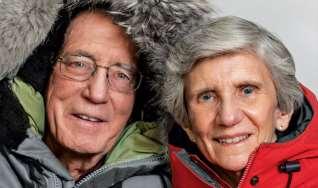
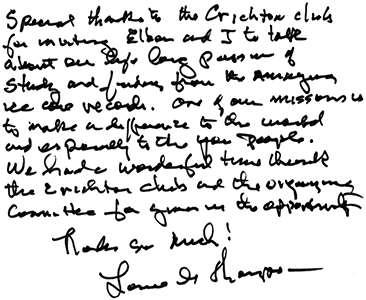
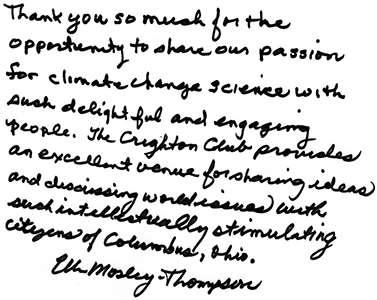


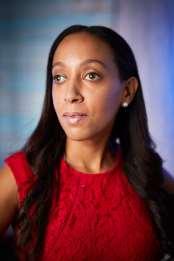
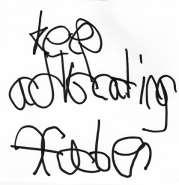
2022-2023
Lonnie G. Thompson, Ph.D. is one of the world’s foremost authorities on paleoclimatology and glaciology. He has led 64 expeditions during the last 45 years, conducting ice-core drilling programs in the Polar Regions as well as on the high mountain glaciers in 16 countries including China, Peru, Russia, Tanzania and Papua, Indonesia. Thompson and his team were the first to develop lightweight solar-powered drilling equipment for the acquisition of histories from ice fields in the high Andes and on Mount Kilimanjaro. The results from these ice-core-derived climate histories have been published in more than 260 articles. He has received numerous honors and awards including: the John and Alice Tyler Prize for Environmental Achievement, he was selected by Time magazine and CNN as one of Americas Best in science and medicine, he is a member of the National Academy of Sciences, the U.S. National Medal of Science, the highest honor the U.S. awards to American scientists, the Seligman Crystal award, the highest professional award given in Glaciology, the Benjamin Franklin Medal in Earth and Environmental Science, the International Science and Technology Cooperation Award, elected fellow of the American Academy of Arts and Sciences, and the Mendel Medal
Ellen Mosley-Thompson, Ph.D. uses the chemical and physical properties preserved in cores collected from both polar ice sheets and high mountain glaciers to reconstruct Earth’s complex climate history. These records confirm that Earth’s climate has moved outside the range of natural variability experienced over at least the last 2000 years. She has led nine expeditions to Antarctica and six to Greenland to retrieve ice cores. In 2010 she led the ice core drilling project on Bruce Plateau (Antarctic Peninsula), a U.S. contribution to the International Polar Year, where her team collected a 448-meter core to bedrock. She has published 144 peer-reviewed papers and is the recipient of 57 research grants as either the Principal or Co-Principal Investigator. She is an elected Member of the National Academy of Sciences, the American Academy of Arts and Sciences, and the American Philosophical Society. She is an elected Fellow of the American Geophysical Union and the American Association for the Advancement of Science. She has received numerous scholarly awards including The Dan David Prize, the Benjamin Franklin Medal, and the Gregor Mendel Medal. In 2022 Lonnie and Ellen were awarded the BBVA Foundation: Frontiers of Knowledge Award in the Climate Change
Robert Wittman joined the FBI as a Special Agent in 1988. As a result of specialized training in art, antiques, jewelry and gem identification, he served as the FBI’s investigative expert involving cultural property crime. In fact, based on his unique experience, Mr. Wittman co-authored the FBI Cultural Property Investigative Manual, in addition to creating the National Art Crime Team.
He has represented the United States throughout the world conducting investigations and instructing international police and museums in recovery and use of high value asset security techniques in more than 20 countries. He has also served as an expert witness in multiple state and federal investigations.
Mr. Wittman is the recipient of numerous awards and commendations including: the Order of Merit for Distinguished Service-Officer Level, presented by the President of Peru, the White Cross of Law Enforcement Merit with Distinction, by the government of Spain, the Director's Award for Outstanding Contributions in Law Enforcement from the U.S. Department of Justice, and the Robert Burke Award for Cultural Property Protection from the Smithsonian Institution.
Mr. Wittman is the author of his New York Times bestselling memoir “PRICELESS: How I Went Undercover to Rescue the World’s Stolen Treasures.” His second book, “THE DEVIL’S DIARY: Alfred Rosenberg and the Stolen Secrets of the Third Reich” is a worldwide best seller published in 29 languages in more than 30 countries.
He was featured in the History Channel series “Lost History’ and recently filmed an investigation into the lost artifacts of General George Custer’s brigade at the battle of Little Big Horn in Montana.
2022-2023
By the FBI’s accounting, Mr. Wittman recovered over $300 million dollars-worth of art and antiquities. They include, the golden armor of an ancient Peruvian warrior king, the Rodin sculpture that inspired the Impressionist movement, a rare Civil War battle flag carried into battle by one of the nation’s first African American regiments, an original copy of the Bill of Rights and he cracked the scam that rocked the PBS series Antiques Roadshow.
The breadth of Wittman’s international exploits is unmatched: He was always undercover, and usually unarmed, to catch art thieves, scammers, and dangerous black-market traders in Paris, Philadelphia, Rio, Santa Fe, Miami, Madrid and many other locations.
He has recovered paintings by Rockwell and Rembrandt, Pissarro, Monet and Picasso. In his final case, Mr. Wittman took on his greatest challenge: working undercover to track the vicious criminals behind what is widely considered to be the world’s most audacious and costly art theft of all.
The Wall Street Journal called him “a living legend” and The London Times dubbed him “the most famous art detective in the world.”
Haben Girma was the first Deafblind person to graduate from Harvard Law School. Haben Girma is a human rights lawyer advancing disability justice. President Obama named her a White House Champion of Change. She received the Helen Keller Achievement Award, a spot on the Forbes 30 Under 30 list, and TIME100 Talks. President Bill Clinton, Prime Minister Justin Trudeau, and Chancellor Angela Merkel have all honored her. Ms. Girma believes disability is an opportunity for innovation, and she teaches organizations the importance of choosing inclusion. The New York Times, Oprah Magazine, and TODAY Show featured her memoir, Haben: The Deafblind Woman Who Conquered Harvard Law.
Ms. Girma was born and raised in the San Francisco Bay Area, where she currently lives. Her memoir takes readers on adventures around the world, including her parents’ homes in Eritrea and Ethiopia, building a school under the scorching Saharan sun, training with a guide dog in New Jersey, climbing an iceberg in Alaska, fighting for blind readers at a courthouse in Vermont, and talking with President Obama at The White House. Warm, funny, thoughtful, and uplifting, this captivating book is a testament to Ms. Girma determination to resist isolation and find the keys to connection.
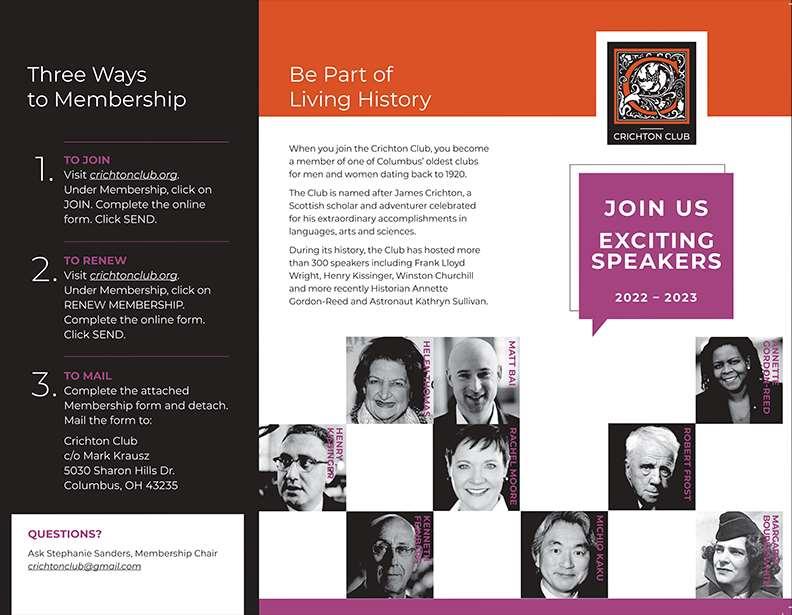
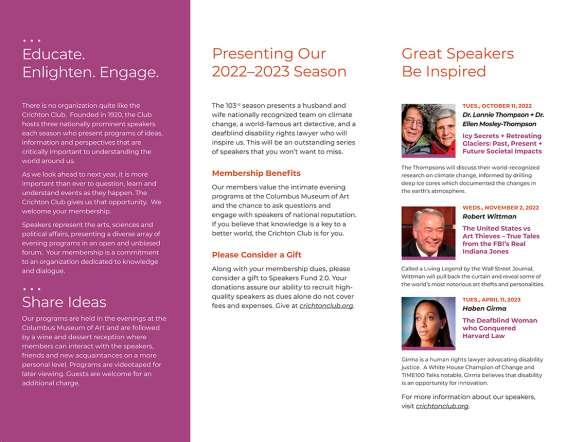
The Dr. Lonnie Thompson and Dr. Ellen Mosley-Thompson Lecture and Reception
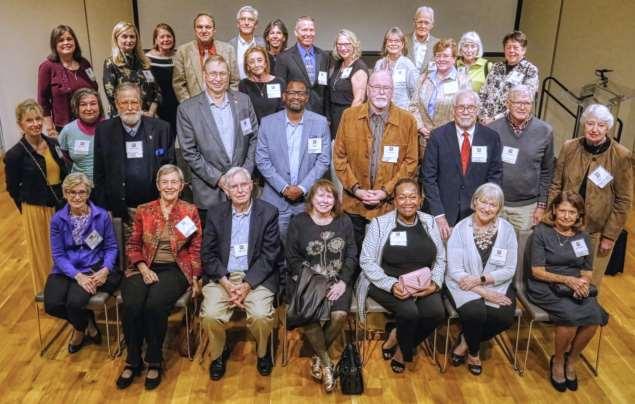

Our new members for the 104th season.
Sound check before the lecture.
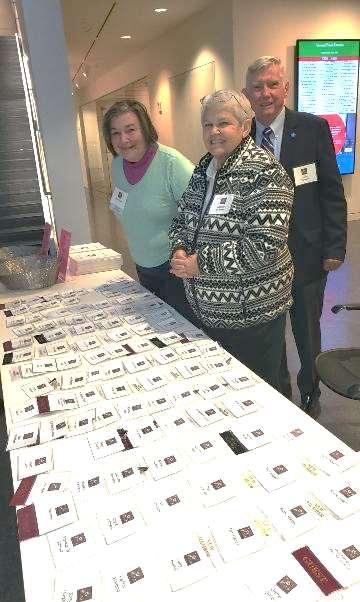
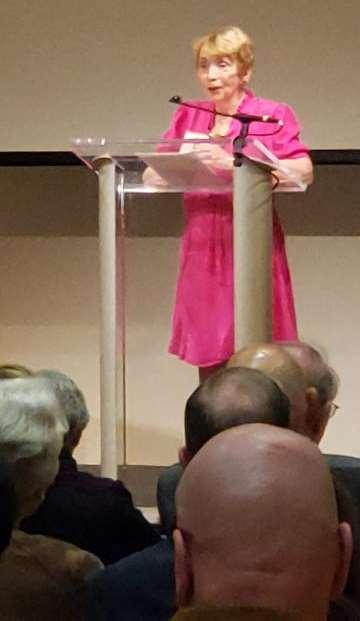

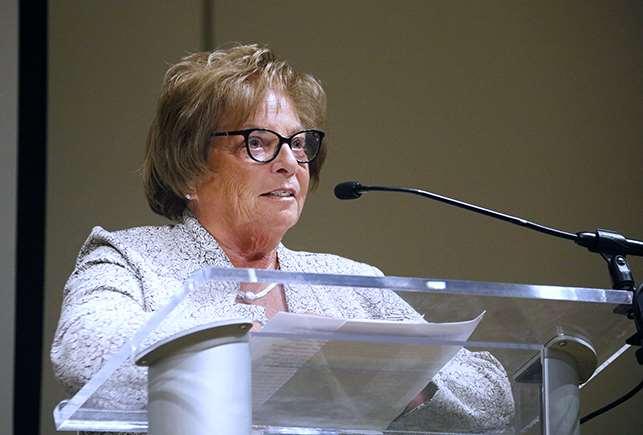
(?), Charlene and Tim O’Donnell at the welcome desk.
President, Marilyn Pritchett welcomes new and returning members.
Program chair, Marilee Chinnici-Zuercher, introduces the Thompsons.
The Thompsons happily responded to numerous questions during the Q&A session.
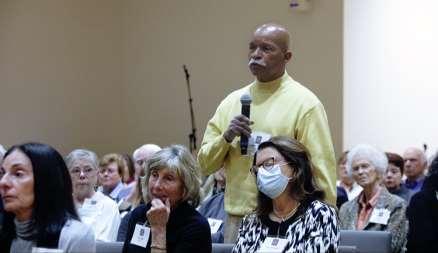

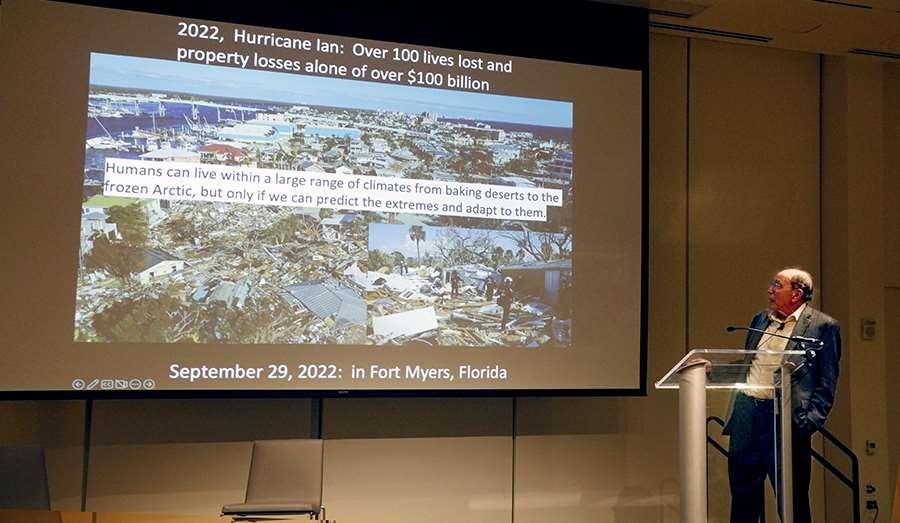
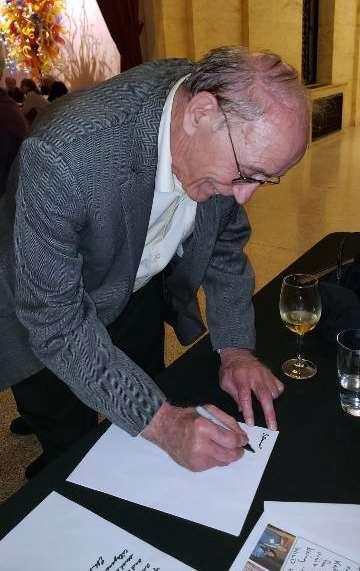

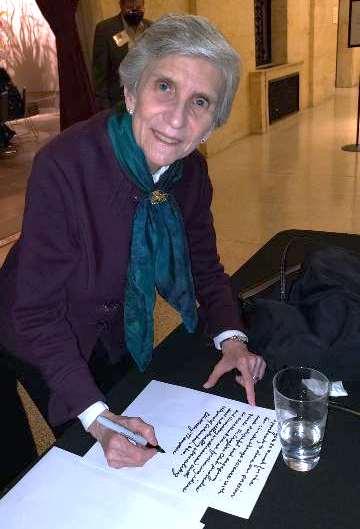

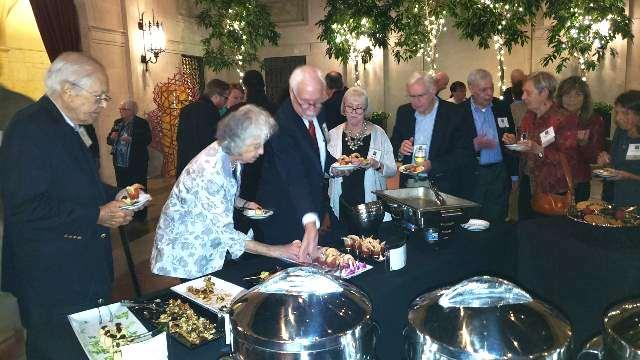
Dr. Ellen Mosley-Thompson signs the Crichton Chronicle.
Dr. Lonnie Thompson signs the Crichton Chronicle.

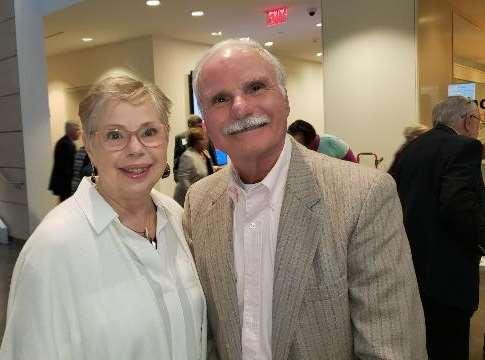

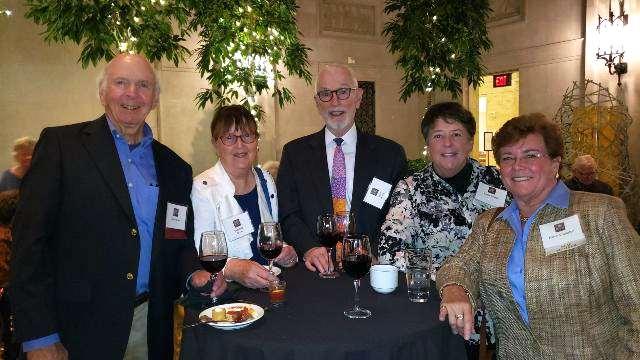
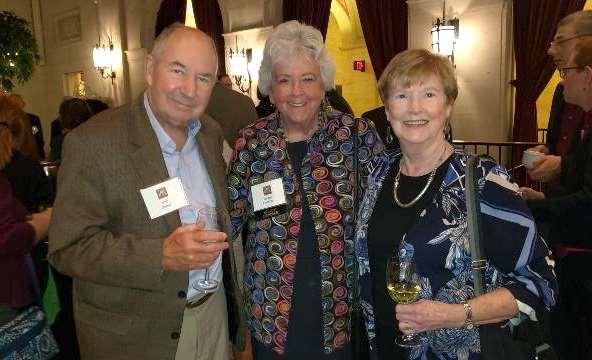
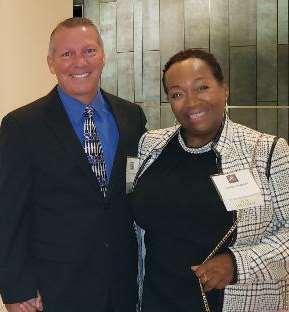
Crichton Chronicle co-editor Darlene Yeager Torre and husband, Sam Torre.
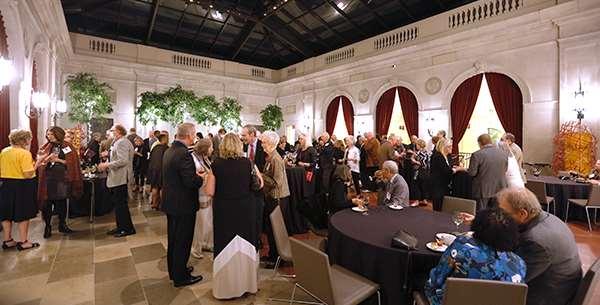

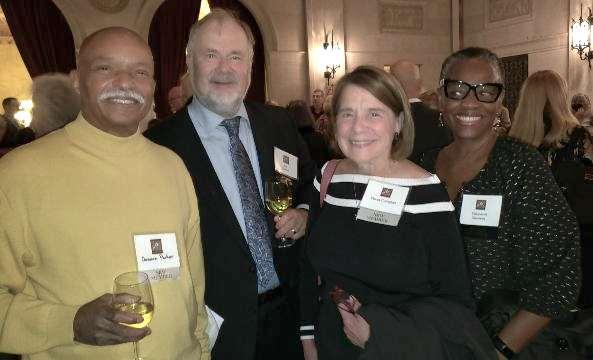
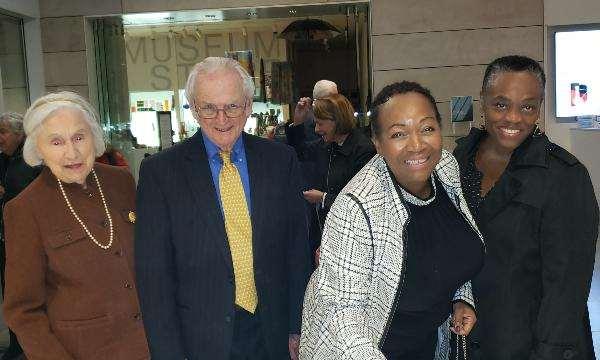
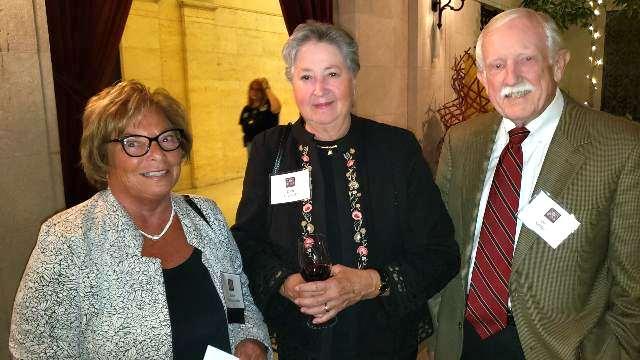
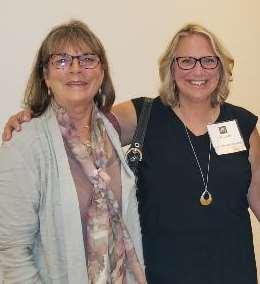
Robert K. Wittman Lecture and Reception

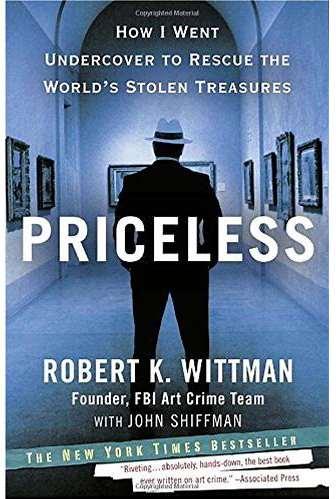

2022-2023


For more than 30 years the Columbus Museum of Art has been the event home for Crichton Club. For many of those years, Nanette Maciejunes, served as executive director of the museum and a loyal member of the club.
In October of 2022, Ms. Maciejunes announced her retirement from the museum. To honor her, President Pritchett gave a special recognition to her during our November lecture event. She was profusely thanked for her extraordinary leadership of the growing museum and her participation in the club. A hearty standing ovation ensued.


Nanette Maciejunes


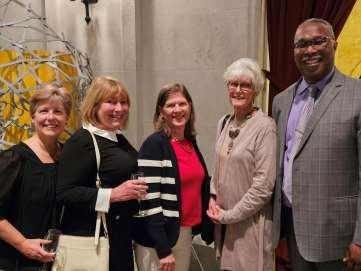
2022-2023
Mid-Winter Event - Art Access Gallery

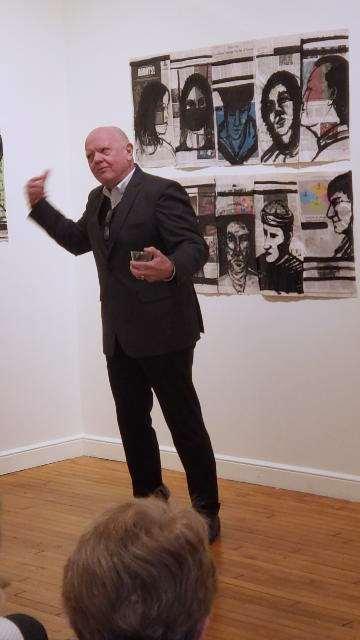
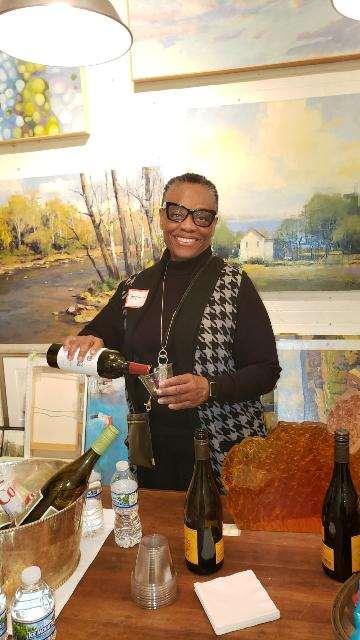
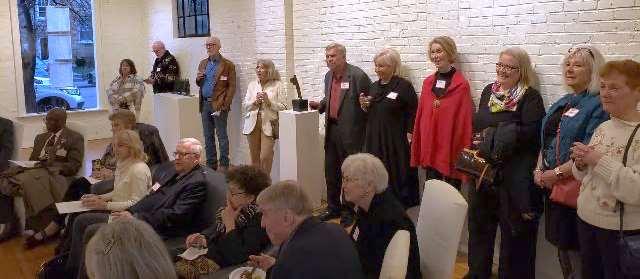
In February the club holds a social event at interesting locations. (L) Barb Unverferth, Art Access gallery owner. Artist and Otterbein College professor and Guggenheim Fellow, Nicholas Hill, spoke about his striking portraits of individuals lost to Covid.
2022-2023
Haben Girma Lecture and Reception
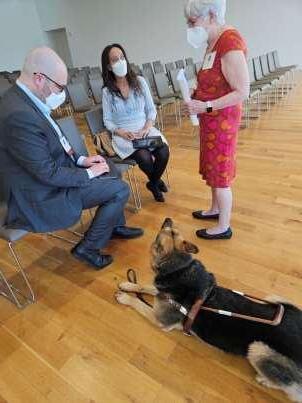
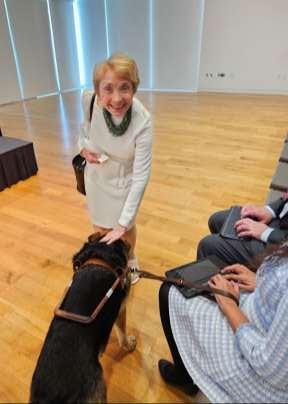
(Left) Peg Neal, program committee coordinator for the event, discusses final program details with Dr. Girma and her assistant, Gordon Byrnes. (Right) Mylo is Dr. Girma’s dear friend, guide dog, and guardian. Club president, Marilyn Pritchett, tries to charm Mylo in an effort to get him to join the club.
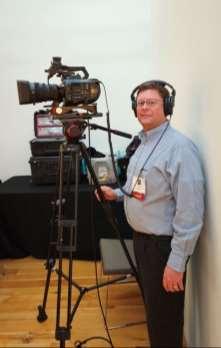
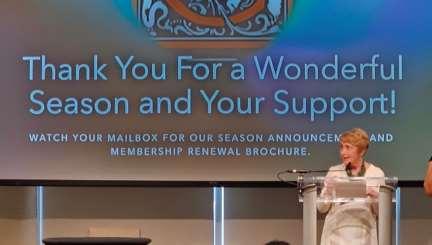
(L) Greg Lawyer, creative director and producer for OCALI, provided the camera crew for the event. THANKS! (L
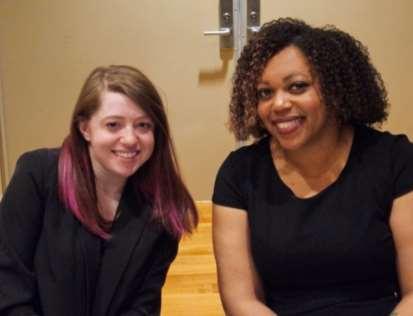
ASL interpreters, Denny Stark and Shawnese Allie. These talented sign language specialists were present to translate for our many deaf and/or blind guests.


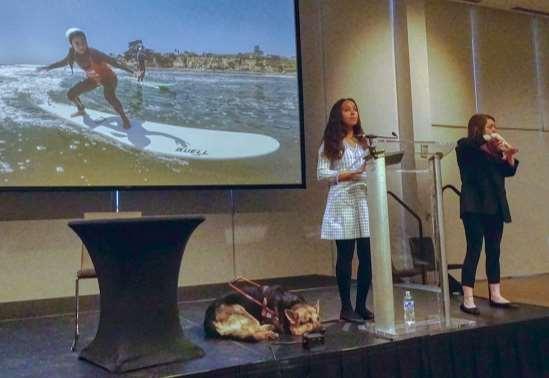

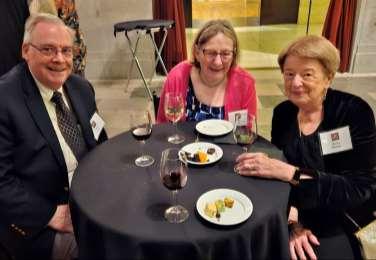
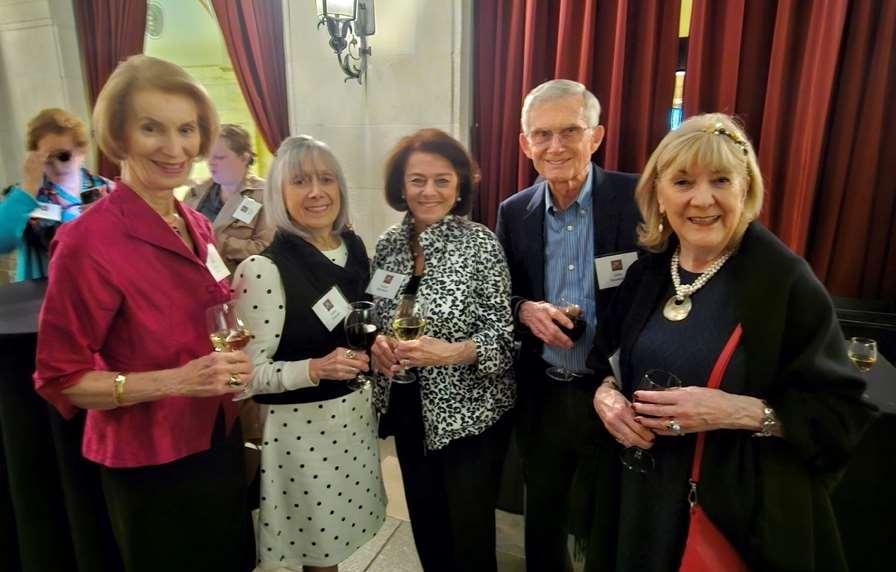
A Once in a Century Party!
Jane Forbes, President 2018-2020, had originally planned a huge gala to celebrate our 100th Anniversary in 2020, but the global COVID pandemic scuttled those plans. As COVID retreated and feeling “better late than never,” President Marilyn Pritchett and her board resurrected the planned 2020 celebration with A once in a Century Party. The Event Committee (above) did an outstanding job. (L to R) Crista DeVore, Carolyn Christy (Event Chair), Marilyn Pritchett, Melinda Sadar, Ann Lowder, Gayle Pattison, Jan Wade, Mark Krausz.
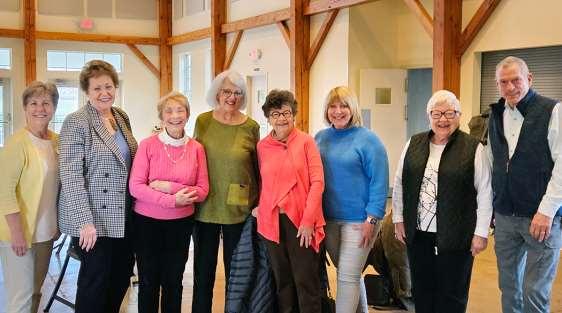
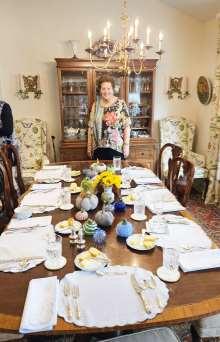
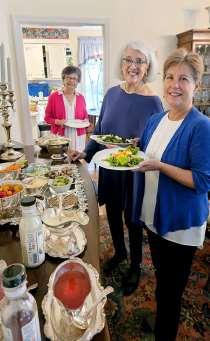
Celebration Chair, Carolyn Christy, held a fabulous luncheon at her lovely home to thank the party committee for their hard work.
On A Personal Note . . .
Crichton Club and My Family
By Carolyn Thomas Christy
“Mom and Dad are going out tonight!” is not a statement that we heard frequently during my school years. My dad, David Harris Thomas, occasionally went to KitKat Club, a men’s lecture group, or to a Vestry meeting which I noticed because he would not be there to help me understand my math homework. My mother, Virginia Tice Thomas, had all her meetings during the daytime when my siblings and I were engaged at school. Therefore, as unaccustomed as we were to our parents going out together on a school night, when my mother appeared radiant in a long ball gown and a fur wrap and my father sporting a tuxedo - it was memorable.
Smiling, they wished us good night, waved to our sitter, and were off for a lecture and dancing. I have no idea when they arrived home from Crichton Club, having been in dreamland for some time. I believe that they did this about four times a year in the 1940’s. One of my clearest childhood memories of my pretty mother as a young woman is her twirling in our front hall with long white gloves and a rustling grey taffeta floor-length gown as my father squired her out the door.
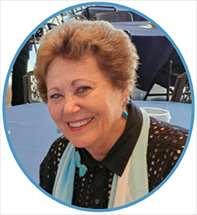
My grandmother, Katherine Tice, was staying with us on one of these Crichton Club evenings when I was a teen I believe she shared that she and her husband, Edward, had been active in Crichton Club as it endeavored to bring together town and gown. In the1950’s, widows did not socialize as we are free to enjoy today so she no longer attended.
In 1965, when I was a newlywed and a teacher at Columbus School for Girls, my husband, H. Richard Wood, and I were invited to join Crichton Club. By this time the dancing no longer followed the lectures but the tradition of four wonderful speakers annually was going strong as was the formal attire. My parents were still attending. I have heard some remarkable and famous individuals speak over these five decades. After retirement, I served a decade on the Crichton Club board and this last year I was honored to chair the 100th Anniversary Party. Gradually the customs have relaxed along with society, and we now have three speakers, but they are still excellent We have an opportunity to meet others in the community who are interested in hearing a broad array of speakers on a wide range of topics.
In their turn, my children became accustomed to Crichton Club evenings when homework needed to be mastered early before I disappeared in a gown. When my son, Harris R. Wood, settled in Columbus after college he joined Crichton Club and for 32 years has attended with his wife, Jennifer. Today Harris serves on the board of Crichton Club.
Last year Harris’ son, Henry Wood, then a high school senior, attended Crichton Club with his mother when Harris was out of town. To my astonishment, Henry, the youngest person in the room filled with 200 people, raised his hand and asked a question of the speaker. It appears that if Henry returns to Columbus following college that he will be interested in becoming a Crichton Club member.
There are probably other families with five generations coming together to hear good speakers at Crichton Club, even if we are no longer dancing into the night or dining together before the lectures. This is just one family’s history.
Ms. Christy served as committee chair for our memorable Party of the Century in September 2023. -ED.
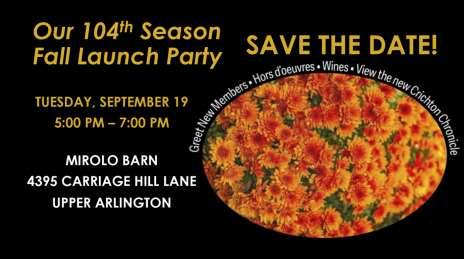
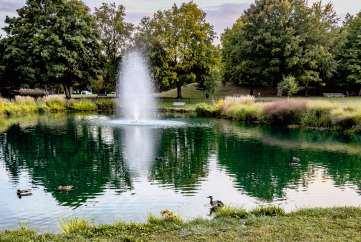
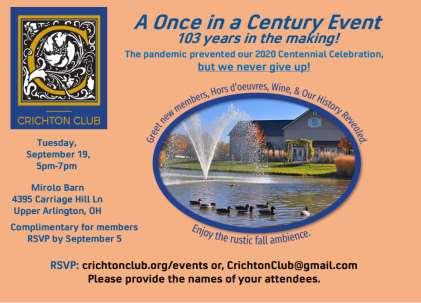
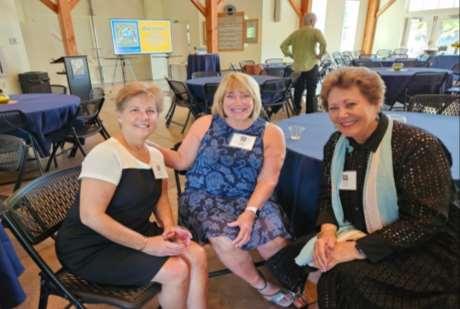
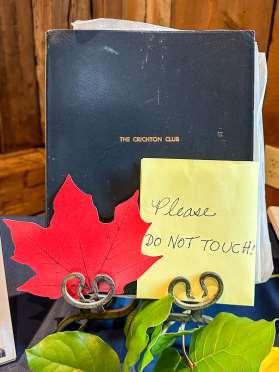

Predecessors to the Digital Crichton Chronicle
(Left) The original leather-bound autograph book with speaker signatures obtained from 1920 to 2019. (Right) The History and Autograph book that compiled our history, speaker biographies, and signature copies for our 90th Anniversary during the 20092010 season. This important work was led by President, Laurie Hill, with major contributions by Marilyn Scanlan, President 1993-1995 who researched and authored the history section.
Committee members Crista DeVore, Gayle Pattison, and Carolyn Christy, enjoy a quick respite just before the doors open.
2023-2024

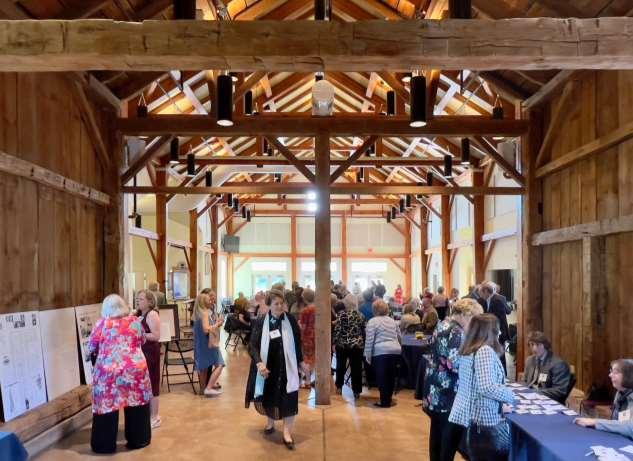
2023-2024
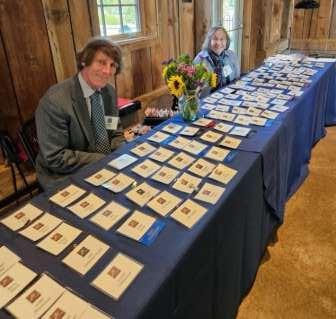
Paul Hysell and Elizabeth Chrisman provided the name tags and welcoming smiles at the celebration and all of our events 2022-2024. Talk about organized!

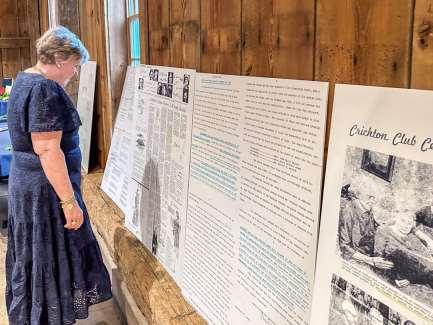
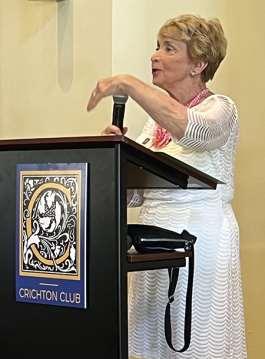

President, Marilyn Pritchett welcomes all to “The Party of The Century.”
2023-2024

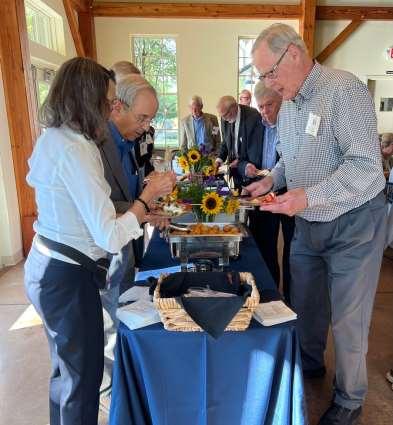

2023-2024
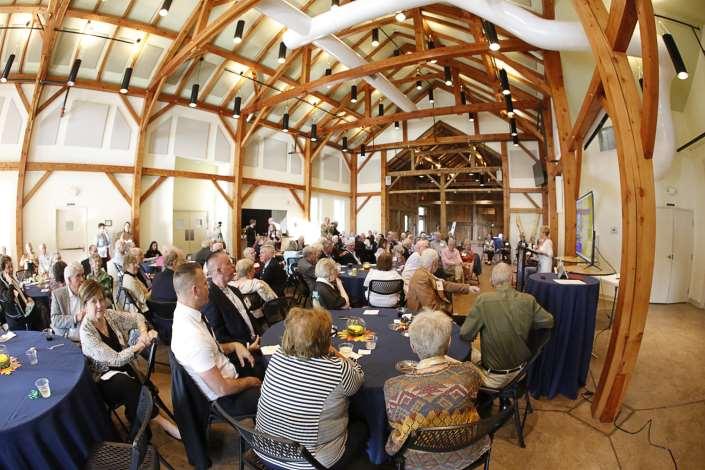
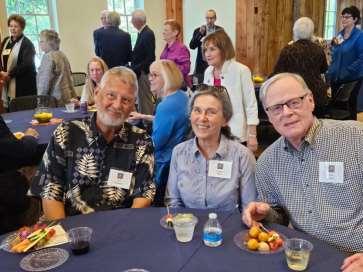

2023-2024
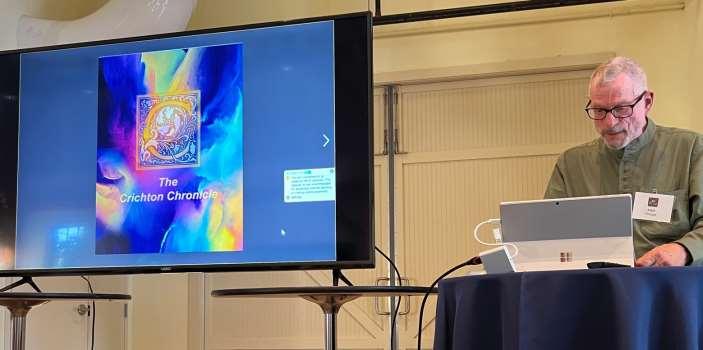
A highlight of the celebration was the video “reveal” of The Crichton Chronicle. It was co-authored by Darlene Yeager Torre and Mark Krausz. Building on the original signature book and the 2009-2010 hard copy, the Chronicle digitized and enhanced those works and updates the period from 2011 to present.
Chronicle presenter, Mark Krausz, with Mike Bruce holding the mic. Mark jokingly referred to Mr. Bruce as the “Mike stand.”

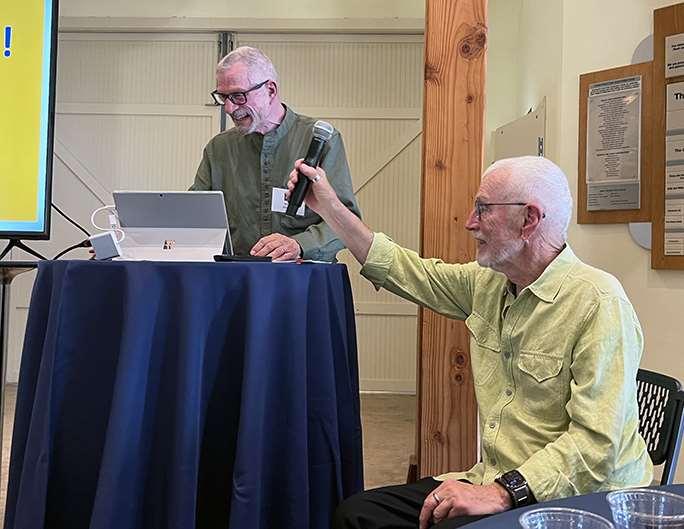
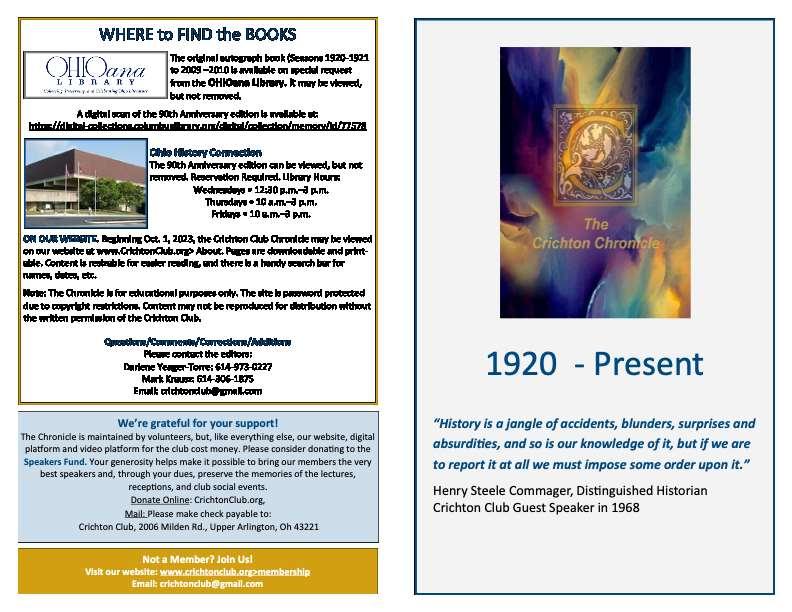

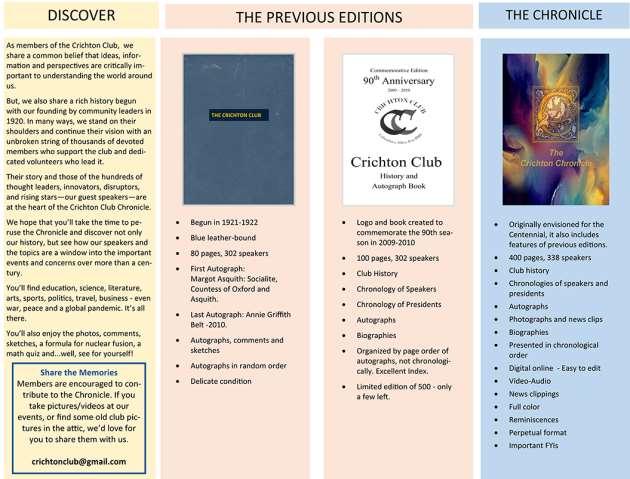
2023-2024
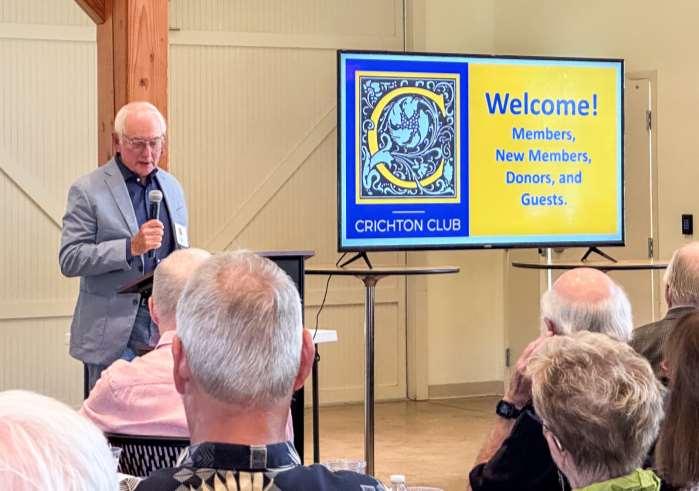
Given the ever-increasing costs for venue and speaker expenses, the club reactivated the Speakers Fund. Launched under the leadership of Mabel Freeman, President 2020-2022, and originally chaired by Bob Fry, the fund is an important part of our ability to present renowned speakers at the Columbus Museum of Art. Shown above, Dr. Barry Blank, current fund chair, provides the attendees with an update on the fund’s status.

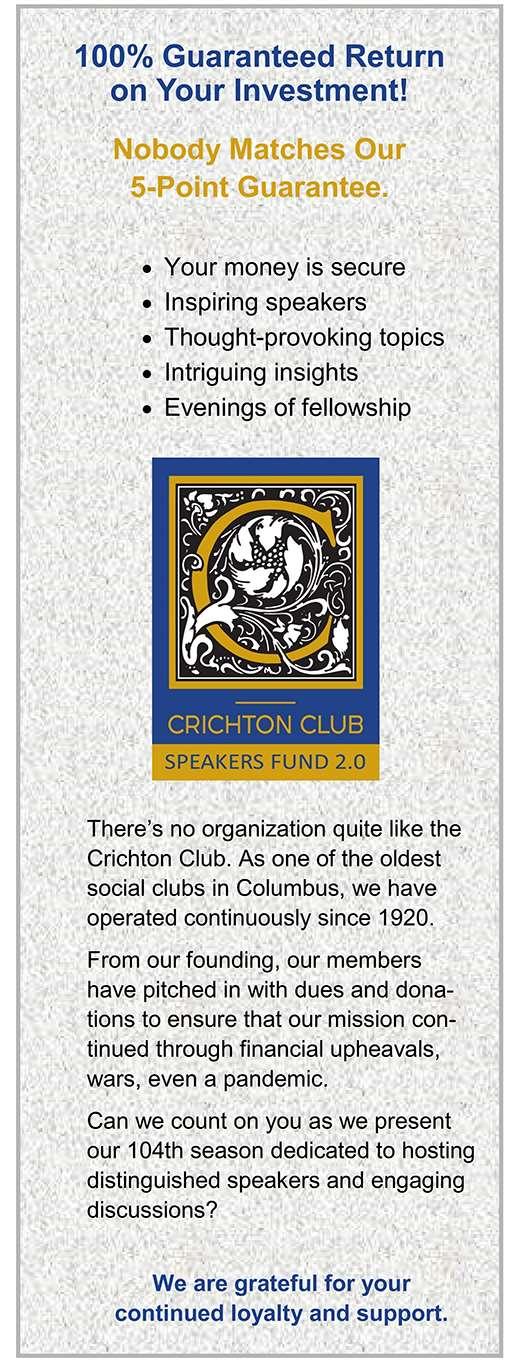

2023-2024
We Honor Our Past Presidents
To thank and recognize our living past presidents, Marilyn Pritchett, President 2023-2024, extended an invitation to the celebration to all of them. Their recounting of some of their highlights in office provided the attendees with inspiration and much laughter.
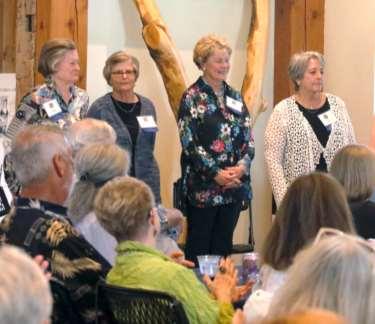
(L to R) Jane Mykrantz (1966-1968), Joanne Frantz (1985-1986), Susan Quintenz (1989-1981), Nina Hoppes (1991-2001)

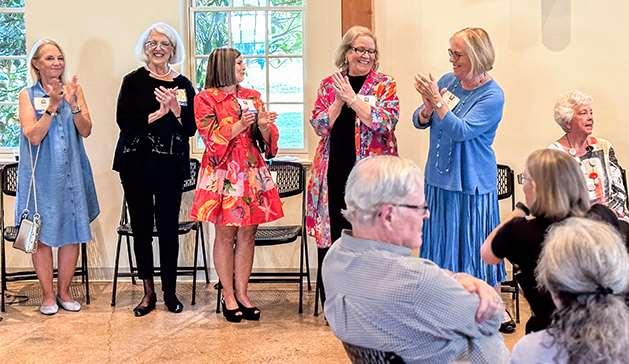
(Left to Right) Laurie Hill, 2008-2010, Melinda Sadar, 2010-2012, Sheila Cohen, 2014-2016, Katharine Moore, 2016-2018, Jane Forbes, 2018-2020, Mabel Freeman, 2020-2022 (seated)
2023-2024

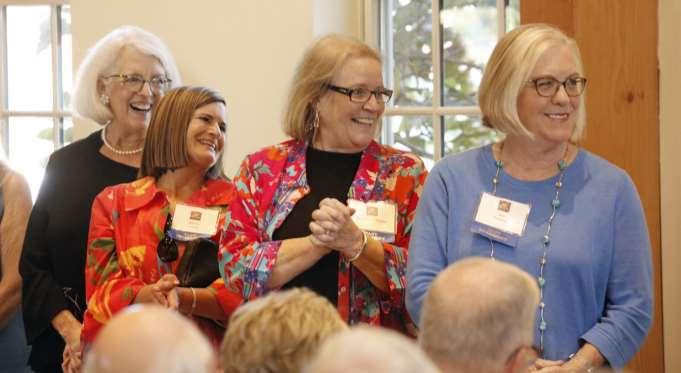
2023-2024
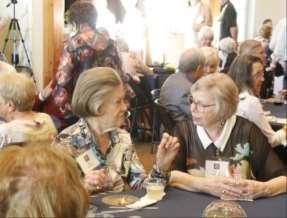
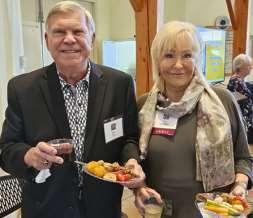
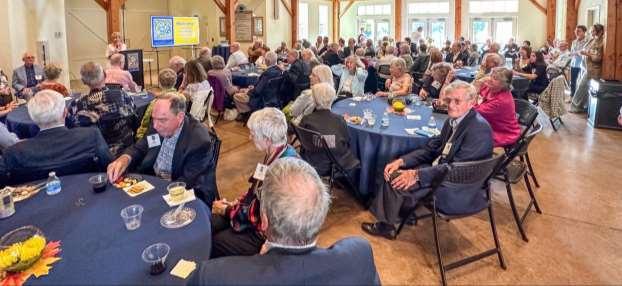
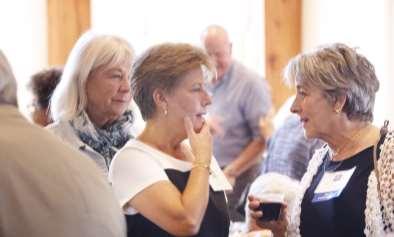

Jane Mykrantz, president 1966-68, chats with Crichton Chronicle co-editor Darlene Yeager Torre.
Speakers Fund, Chair Emeritus, Bob Fry with Jan Quatman
2023-2024




Where would we be without name tags! Tim and Charlene O’Donnell handled that task and staffed the welcome table with warm welcomes at events 2020-2022.



2023-2024
Anne “Dede” Neal Petri, President/CEO of the Olmsted Network: « The Genius of Place: A look at the legacy of Frederick Law Olmstead” October 4, 2023
Anthony Jack – Assistant Professor of Education at Harvard and Author: “How Do Poor Students Manage at Prestigious Universities?” November 14, 2023
Catherine Grace Katz - The Daughters of Yalta: The Churchills, Roosevelts, and Harrimans – Love and War. April 10, 2024
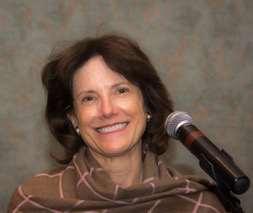


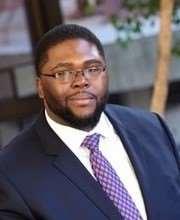
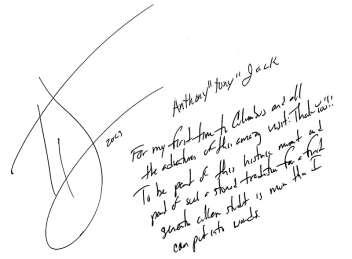
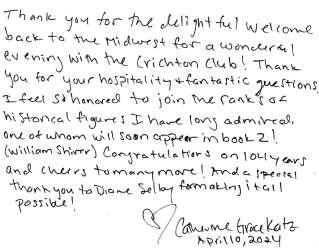
2023-2024
Anne “Dede” Neal Petri is the President/CEO of the Olmsted Network (formerly the National Association for Olmsted Parks). Founded in 1980, the Olmsted Network is the only national organization dedicated solely to advancing the life and legacy of Frederick Law Olmsted and the Olmsted firm. The Olmsted Network also served as the managing partner of Olmsted 200, the bicentennial in 2022 of the birth of Frederick Law Olmsted.
Before coming to the Network, she was the 42nd president of The Garden Club of America, a national nonprofit founded in 1913 with 18,000 club members around the country. In 1995, she co-founded the American Council of Trustees and Alumni (ACTA), a non-profit dedicated to higher education, serving as president from 2003 – 2016.
She also served as General Counsel and Congressional Liaison for the National Endowment for the Humanities and worked as a First Amendment and communications lawyer and Senior Vice President of the Recording Industry Association of America. She graduated Phi Beta Kappa and magna cum laude from Harvard College with an A.B. in American history and literature (where she was first introduced to Frederick Law Olmsted) and received her J.D. from Harvard Law School where she was the first woman President of the Harvard Journal on Legislation.
She has served on the boards of many cultural and civic organizations including Friends of the National Arboretum, U.S. Capitol Historical Society, Lady Bird Johnson Wildflower Center, Casey Trees, National Association for Olmsted Parks, and the Paine Art Center and Gardens. She was president of All Hallows Guild, Washington National Cathedral, and chairman of its Garden Committee, spearheading the restoration of the Olmsted Woods. She currently serves on the boards of the Aldo Leopold Foundation and Mount Vernon Ladies' Association.
She has authored or co-authored studies including Restoring the Olmsted Woods, Ecological Restoration Magazine, University of WI Arboretum (2003); Washington National Cathedral Gardens: A Guide for Families; Profiles, Handbook of American Women’s History (Sage Publications 2000); and Losing America’s Memory (ACTA, 2000). In 2017, Rowman & Littlefield published her book, What’s a Parent to Do? How to Help Your Child Select the Right College.
When Anthony Jack arrived at his first year of university amongst peers talking about their travels abroad, and their lavish summer homes he wondered: “where are all the other poor students?” Since then, he’s made it his career to study the effects of being a poor student on a rich campus. He is a Junior Fellow at the Harvard Society of Fellows and an assistant professor of education at the Harvard Graduate School of Education. He holds the Shutzer assistant professorship at the Harvard Radcliffe Institute. His scholarship appears in the Common Reader, Du Bois Review, Social Problems, Sociological Forum, and Sociology of Education and has earned awards from the American Educational Studies Association, American Sociological Association, Association for the Study of Higher Education, Eastern Sociological Society, and the Society for the Study of Social Problems. Jack held fellowships from the Ford Foundation and the National Science Foundation and was a National Academy of Education/Spencer Foundation Dissertation Fellow.
His first book, The Privileged Poor: How Elite Colleges Are Failing Disadvantaged Students, was awarded the 2020 Mirra Komarovsky Book Award, the 2019 CEP Mildred Garcia Award for Exemplary Scholarship, and the Thomas J. Wilson Memorial Prize and was also named a finalist for the 2019 C. Wright Mills Award and a NPR Book’s Best Book of 2019.
As an Assistant Professor of Education at Harvard, Anthony breaks underprivileged students down into two categories the “privileged poor”, low-income students at upper-crest academies; and the “doubly disadvantaged”, those studying at public, typically distressed schools and how both groups experience a distraction from learning. How can you best support all students, regardless of income? In this talk, Anthony
2023-2024
addresses how it’s not just enough to get in to school: he covers the costs of social exclusion lower-income students face, and offers some new, nuanced insights on what excellence and equity in schools looks like.
Dr. Jack joined Boston University’s Wheelock College of Education & Human Development’s Educational Leadership and Policy Studies in 2023. Its graduate programs are designed to help increase access and success for first-generation and historically underrepresented groups. His research on the experiences and needs of these students is intended to help address ongoing questions of equity and access in post-secondary education.
Catherine Grace Katz
Tensions during the Yalta Conference in February 1945 threatened to tear apart the wartime alliance among Franklin Roosevelt, Winston Churchill, and Joseph Stalin just as victory was close at hand. Catherine Grace Katz uncovers the dramatic story of the three young women who were chosen by their fathers to travel with them to Yalta, each bound by fierce family loyalty, political savvy, and intertwined romances that powerfully colored these crucial days.
Kathleen Harriman was a champion skier, war correspondent, and daughter of U.S. Ambassador to the Soviet Union Averell Harriman. Sarah Churchill, an actress-turned-RAF officer, was devoted to her brilliant father, who depended on her astute political mind. Roosevelt’s only daughter, Anna, chosen instead of her mother Eleanor to accompany the president to Yalta, arrived there as keeper of her father’s most damaging secrets. Situated in the political maelstrom that marked the transition to a post- war world, The Daughters of Yalta is a remarkable story of fathers and daughters whose relationships were tested and strengthened by the history they witnessed and the future they crafted together.
Catherine Grace Katz is a writer and historian from Chicago. She graduated from Harvard in 2013 with a BA in History and received her MPhil in Modern European History from Christ’s College, University of Cambridge in 2014, where she wrote her dissertation on the origins of modern counterintelligence practices. After graduating, Catherine worked in finance in New York City before a very fortuitous visit to the bookstore in the lobby of her office in Manhattan led her to return to history and writing. She is currently pursuing her JD at Harvard Law School. The Daughters of Yalta is her first book.
“Skillfully written and meticulously researched, it’s an extraordinary work that reveals the human side underlying the politics…The Daughters of Yalta is a thoroughly engrossing book, as acute about the contentious politics of the day as it is about the remarkable daughters who participated.”
The Wall Street Journal
“In Catherine Grace Katz’s detailed behind the scenes account, she skillfully marshals diaries, letters, oral histories and memoirs…Entertaining history packed with vivid personalities, jockeying aides and insider observations about a pivotal moment in history.”
The New York Times
2023-2024
Anne “Dede” Neal Petri Lecture and Reception


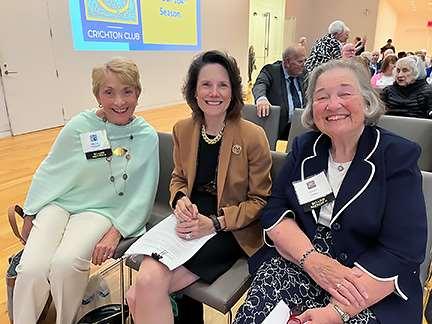
2023-2024
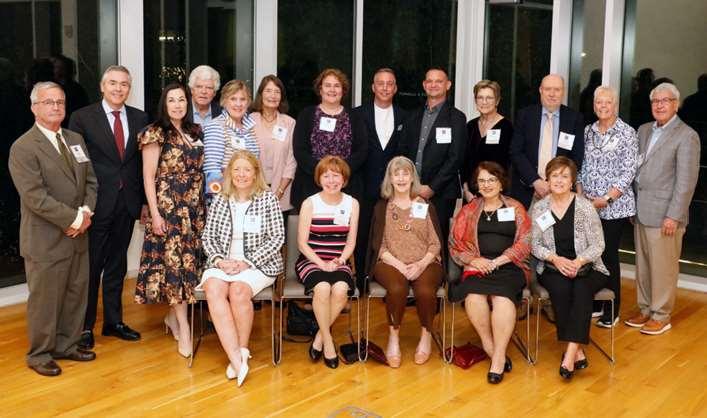
Some of our new members for the 2023-2024 season.
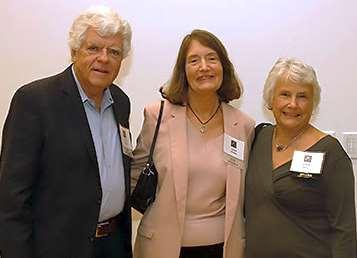
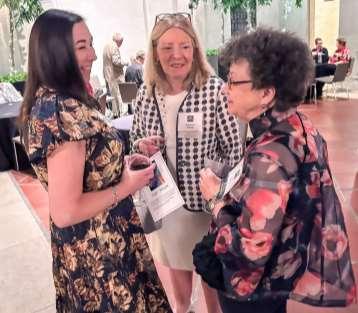
2023-2024
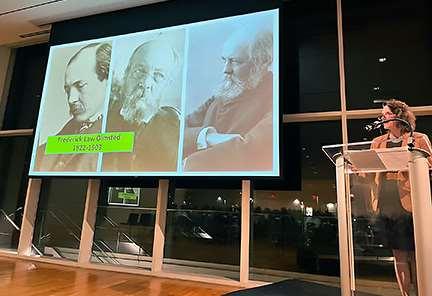

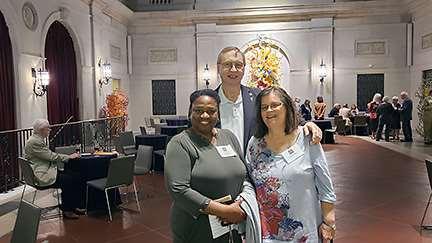
2023-2024
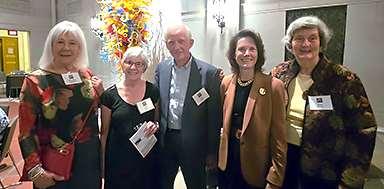
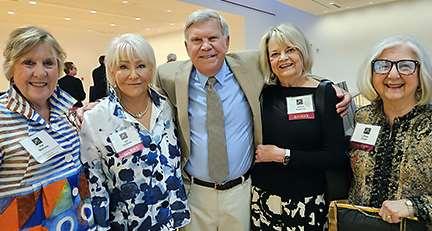
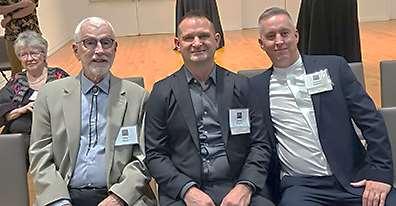
2023-2024
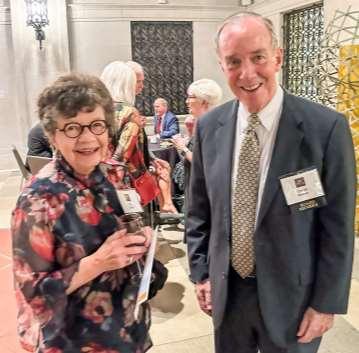

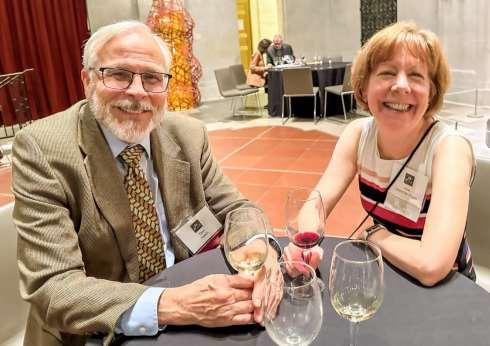
Dr. Anthony Jack Lecture and Reception
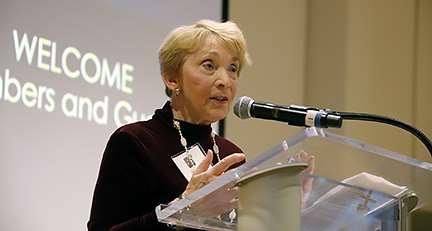
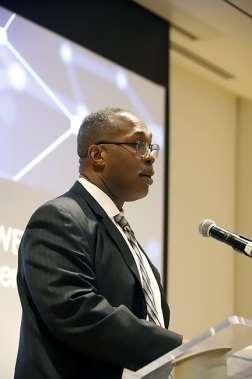
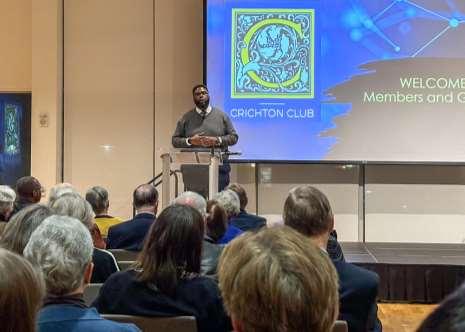
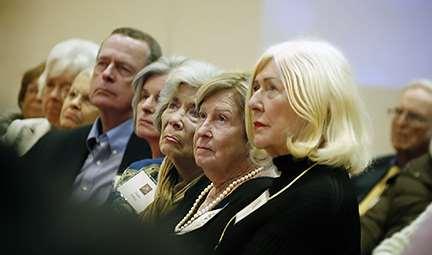
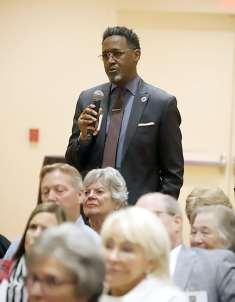

2023-2024
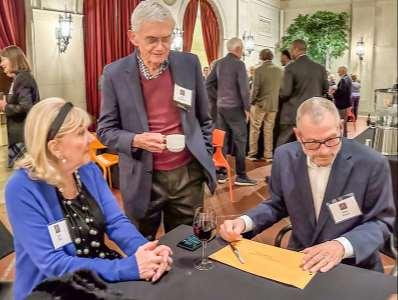

Crichton Chronicle co-editor, Mark Krausz, watches as Dr. Jack signs a page.
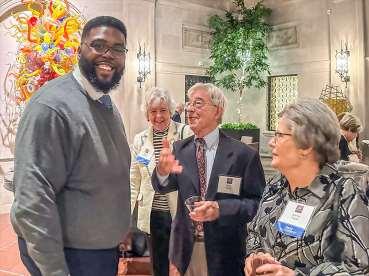
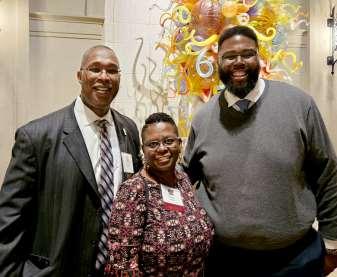
2023-2024
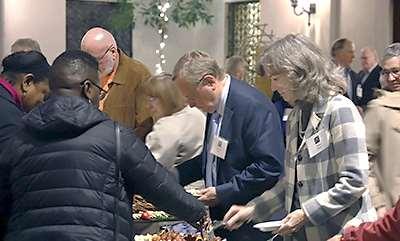
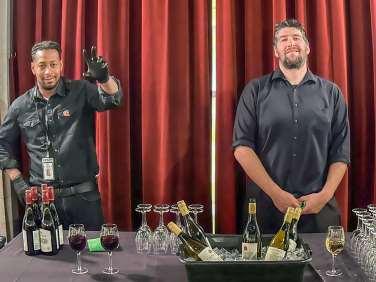

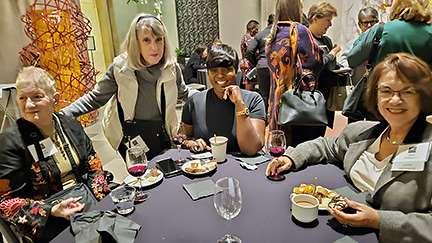
2023-2024
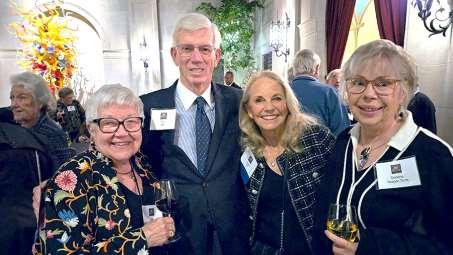
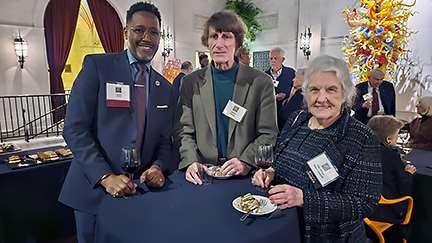

2023-2024
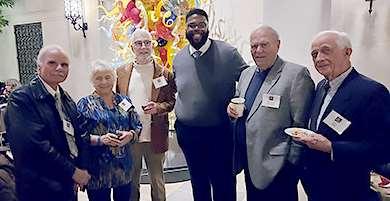
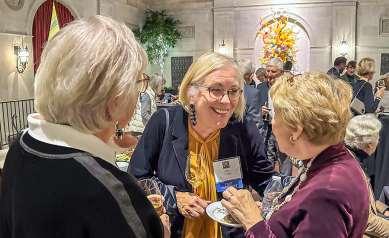
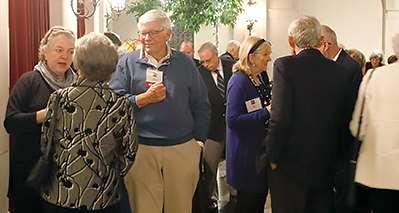
2023-2024
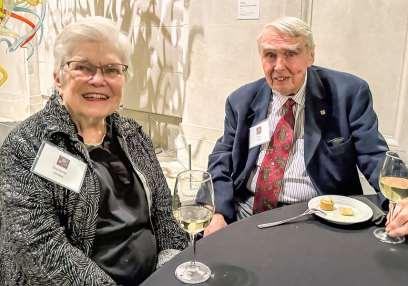

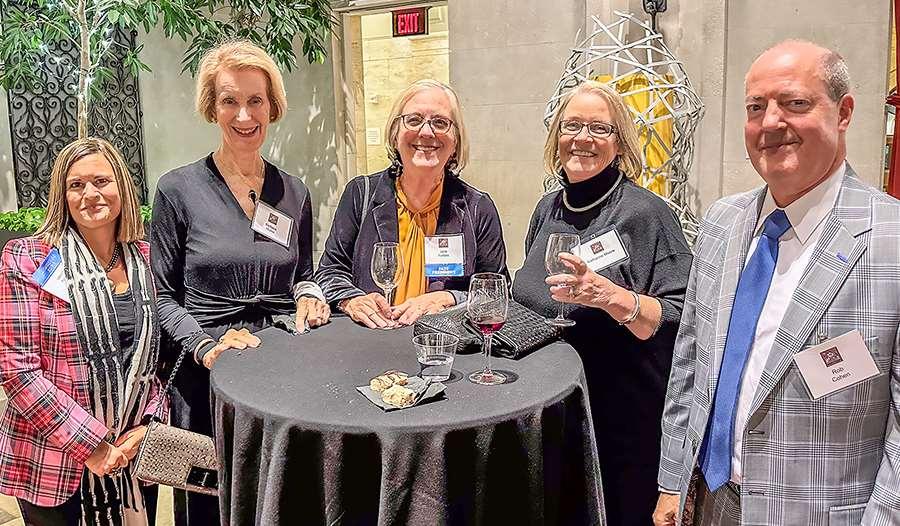
2023-2024
Mid-Winter Event – Sip and Mingle at the Good Haus

The Good Haus in German Village is a wonderful facility under the direction of the Jefferson Center. For our MidWinter event this year, we enjoyed a wine and hors d’oeuvres reception and a presentation by Dr. Rebecca F. Kemper, CEO of the Columbus Landmarks Foundation.
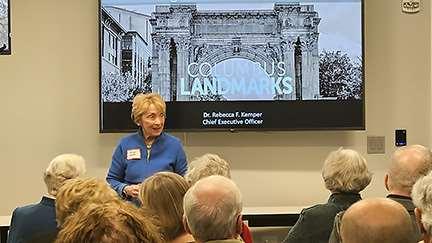
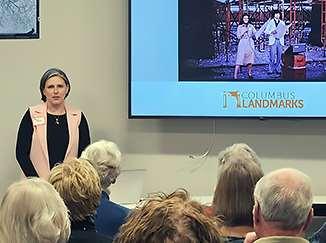
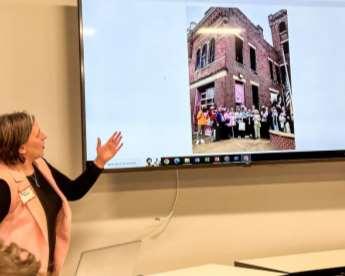
Dr. Kemper explains the principles and practices that have made the foundation so effective.

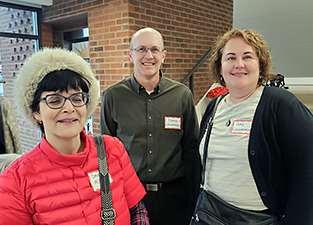
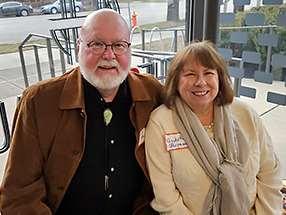
2023-2024



Catherine Grace Katz Lecture and Reception
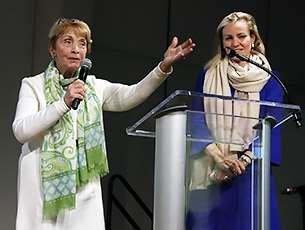
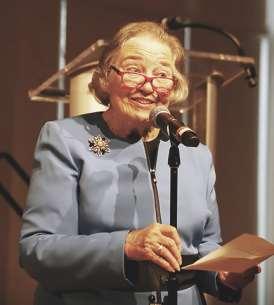
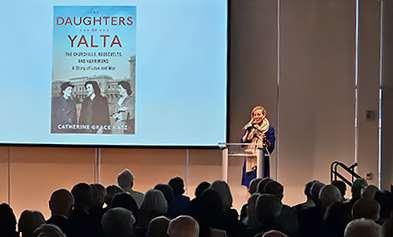
Vice President, Diane Selby introduces Dr. Katz.
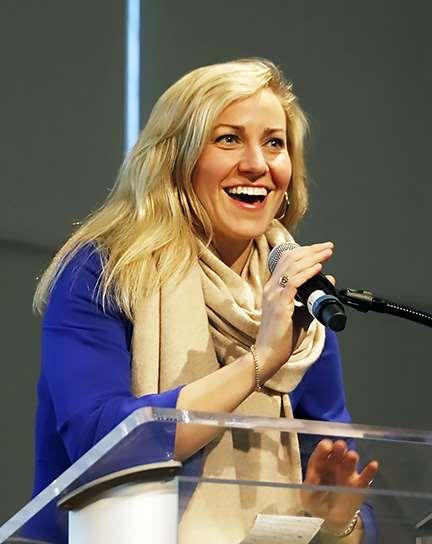

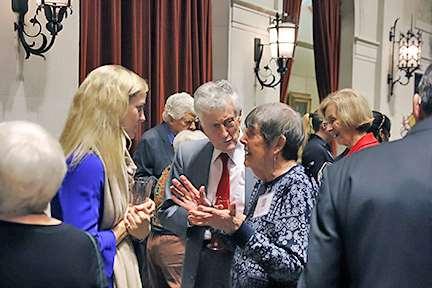
Dr. Katz happily signs a page for the Crichton Chronicle.
2023-2024


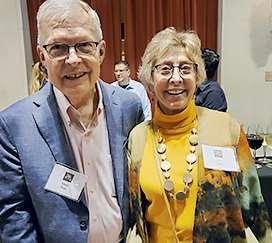
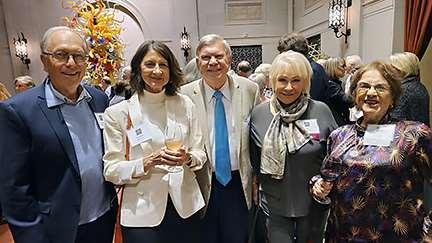
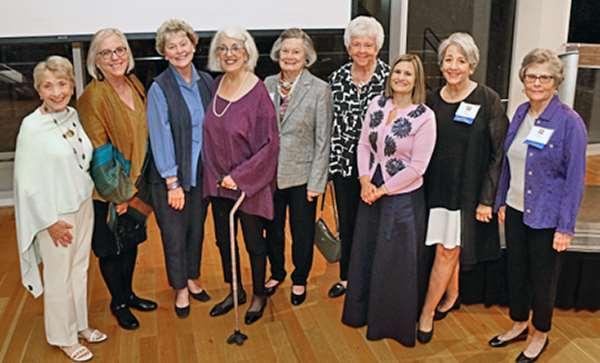
A number of former club presidents were present for our big season finale.
L to R: Marilyn Pritchett, Jane Forbes, Susan Quintenz, Melinda Sadar, Jane Mykrantz, Mabel Freeman, Sheila Cohen, Nina Hoppes, Joanne Frantz.
We are grateful to our members who generously lent their time and photographic skills to capture our wonderful speakers, lectures, and events:
Rod Chu
Larry Hamill, Larry Hamill Photography, Inc.
Mark Krausz
Darlene Yeager-Torre
Club members are welcome to submit their photographs and captions to Mark Krausz at mskcol1@gmail.com

Scholar, Scientist, Astronaut, Explorer, Crichton Club Member
